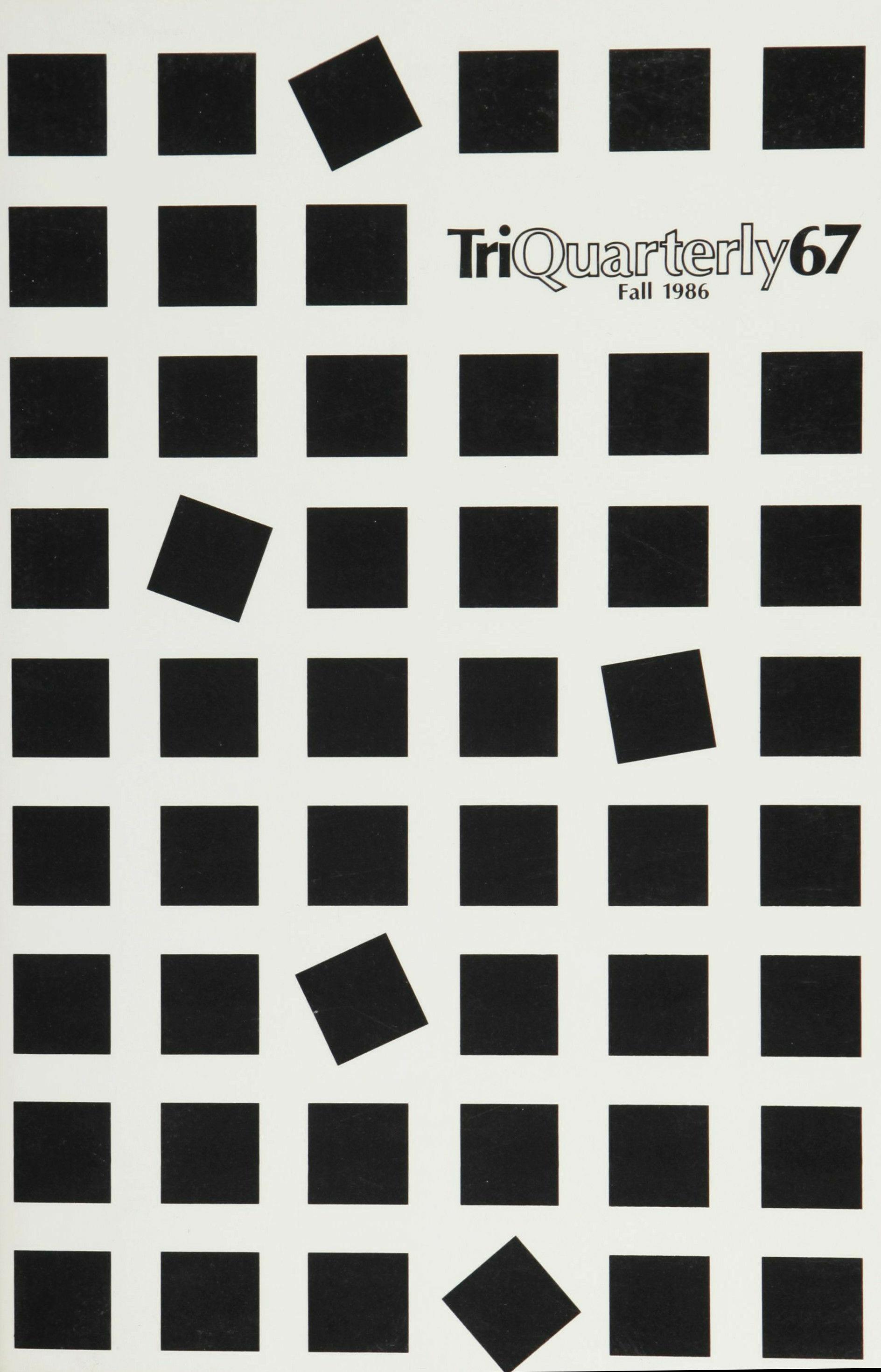
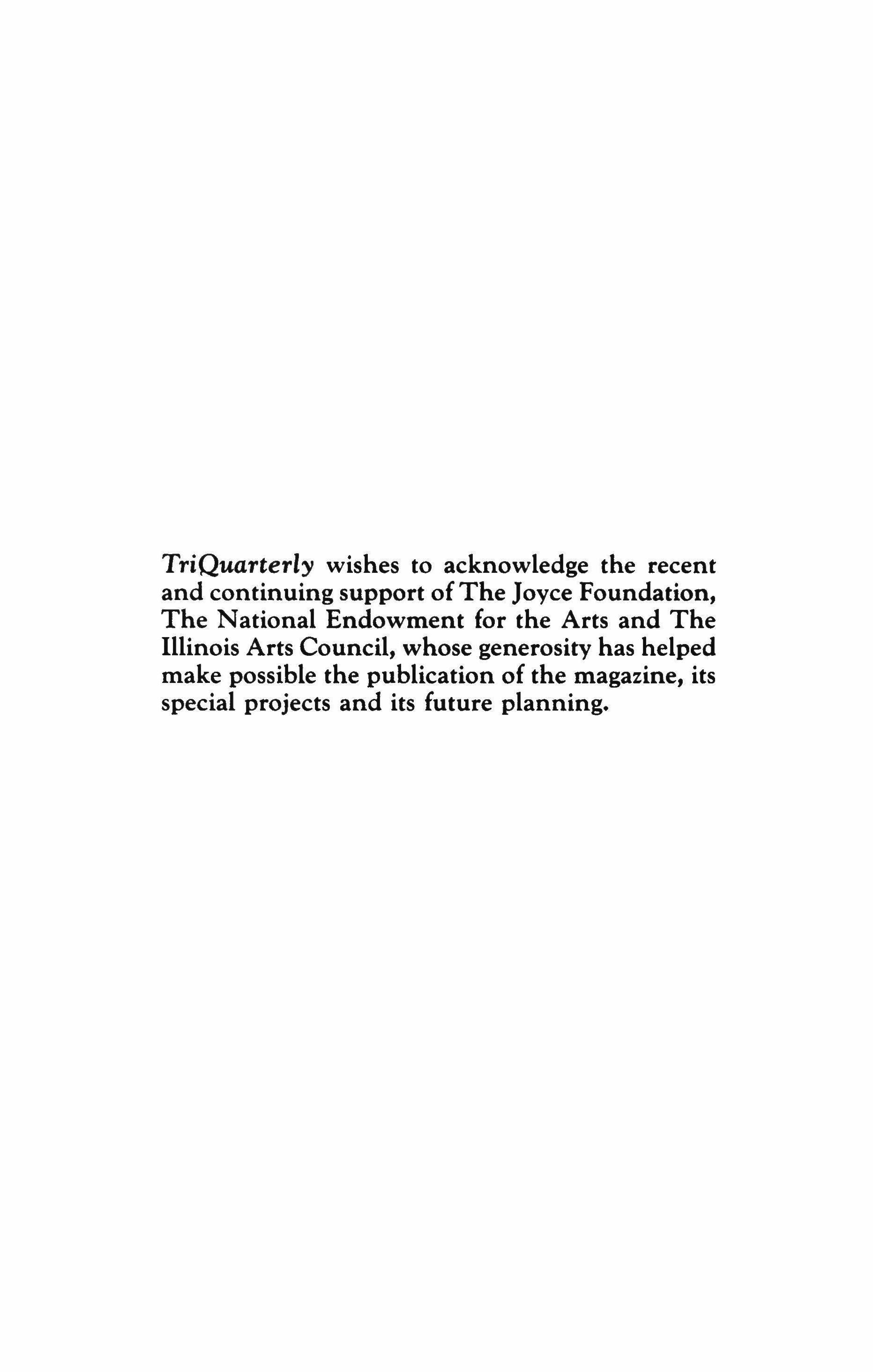
TriQuarterly wishes to acknowledge the recent and continuing support of The Joyce Foundation, The National Endowment for the Arts and The Illinois Arts Council, whose generosity has helped make possible the publication of the magazine, its special projects and its future planning.
Associate Editor Susan Hahn

Editor
Reginald Gibbons
Managing Editor Janet Vander Kelen
Special Projects Editor Fred Shafer
TriQuarterly Fellow
David Myers
Advisory Editors
Executive Editor Bob Perlongo
Design Director Gini Kondziolka
Editorial Assistants
Catherine Ferreira, Diane James, Erin O'Malley, Amy Rosenzweig, Paula Stewart
Robert Alter, Michael Anania, Elliott Anderson, Terrence Des Pres, Gloria Emerson, Richard Ford, George Garrett, Gerald Graff, Francine du Plessix Gray, Michael S. Harper, David Hayman, Bill Henderson, Maxine Kumin, Elizabeth Pochoda, Michael Ryan
TRIQUARTERLY IS AN INTERNATIONAL JOURNAL OF WRITING, ART AND CULTURAL INQUIRY PUBLISHED IN THE FALL, WINTER AND SPRING AT NORTHWESTERN UNIVERSITY.
Subscription rates-Individuals: one year $16; two years $28; life $150. Institutions: one year $26; two years $44; life $300. Foreign subscriptions $4 per year additional. Price of single copies varies. Sample copies $4. Correspondence and subscriptions should be addressed to TriQuarterlv. NORTHWESTERN UNIVERSITY. 1735 Benson Avenue. Evanston, Illinois 60201. Phone: (312) 491-3490. The editors invite submissions of fiction, poetry and literary essays, which must be received between October I and May 31; manuscripts received between June I and September 30 will not be read. No manuscripts will be returned unless accompanied by a stamped, self-addressed envelope. All manuscripts accepted for publication become the property of TriQuarter1v, unless otherwise indicated. Copyright © 1986 by TriQuarterlv. All rights reserved. The views expressed in this magazine are to be attributed to the writers, not the editors or sponsors. Printed in the United States of America by Thomson-Shore, typeset by Sans Serif.
National distributor to retail trade: B. DeBoer, 113 East Centre Street-Rear, Nutley, New Jersey 07110 (201·667-9300). Distributor for West Coast trade: Bookpeople, 2929 Fifth Street, Berkeley, California 94710 (415-549-3030). Midwest: Bookslinger, 213 East Fourth Street, St. Paul, Minnesota 55101 (612·221·0429); and Prairie News Agency, 2404 West Hirsch Street, Chicago, Illinois 60622 (312·384-5350).
Reprints of issues II-IS of TriQuarterlv are available in full format from Kraus Reprint Company, Route 100, Millwood, New York 10546, and all issues in microfilm from University Microfilms International, 300 North Zeeb Road. Ann Arbor, Michigan 48106. ISSN: 0041-3097.
Fall 1986
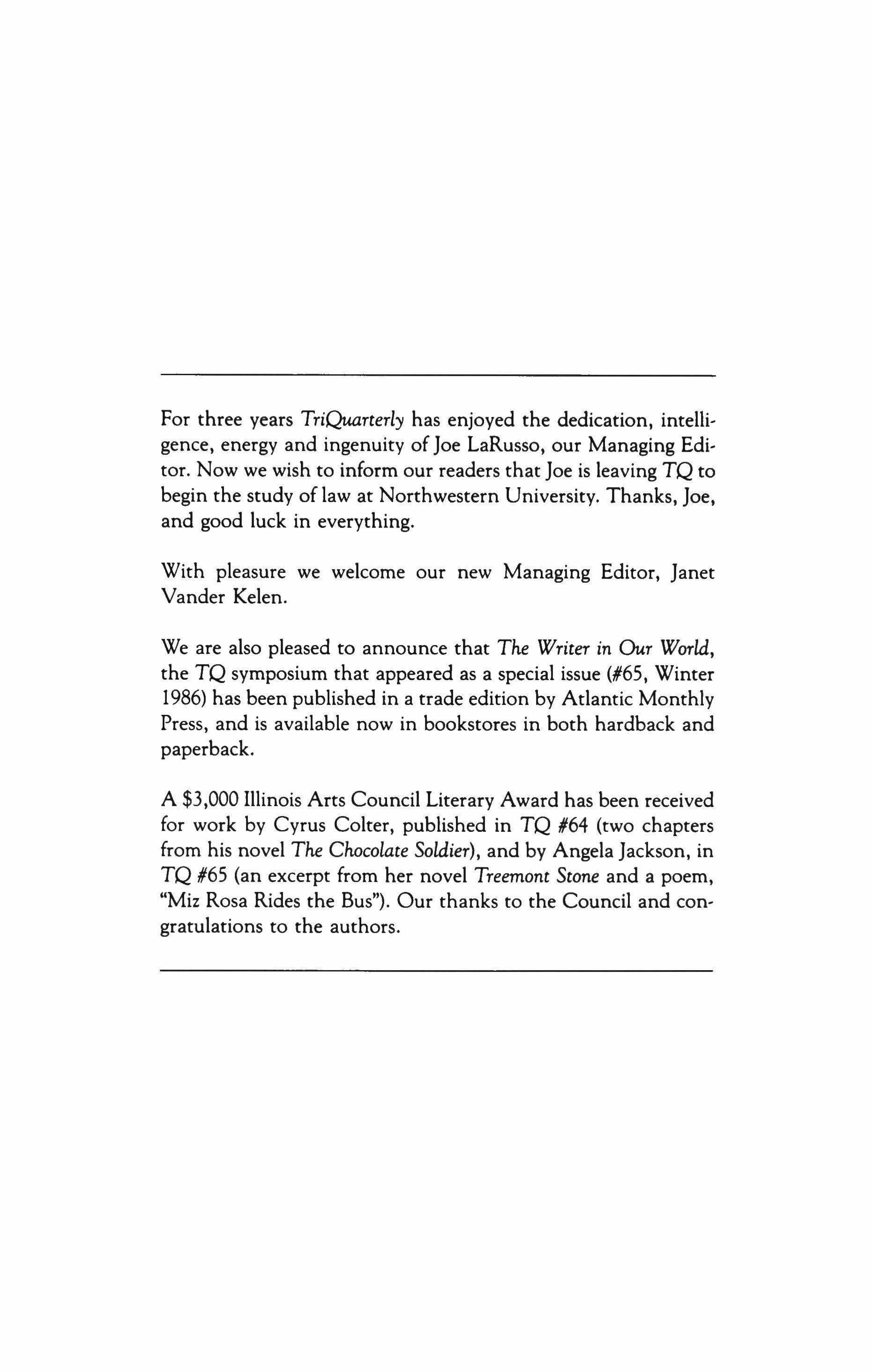
For three years TriQuarterly has enjoyed the dedication, intelligence, energy and ingenuity of Joe LaRusso, our Managing Editor. Now we wish to inform our readers that Joe is leaving TQ to begin the study of law at Northwestern University. Thanks, Joe, and good luck in everything.
With pleasure we welcome our new Managing Editor, Janet Vander Kelen.
We are also pleased to announce that The Writer in Our World, the TQ symposium that appeared as a special issue (#65, Winter 1986) has been published in a trade edition by Atlantic Monthly Press, and is available now in bookstores in both hardback and paperback.
A $3,000 Illinois Arts Council Literary Award has been received for work by Cyrus Colter, published in TQ #64 (two chapters from his novel The Chocolate Soldier), and by Angela Jackson, in TQ #65 (an excerpt from her novel Treemont Stone and a poem, "Miz Rosa Rides the Bus"). Our thanks to the Council and congratulations to the authors.

Contents STORIES The Next Day ••••..••.••.••.••••.•....• 5 Janet Desaulniers In the Air, Over Our Heads .•.••....•.•••• 19 Amy Herrick Yukon. 41 Carol Emshwiller Wolfe County 48 Martha Bennett Stiles SPECIAL SECTION: W. S. DI PIERO The Apricot Trees (poem) 69 The Cellar Twenty Years Later (poem) 71 The Adoration (poem) 72 The Bugler (poem) 74 Leopardi's "Alia Luna" (poem) ...•.••...... 75 The Reading (poem) ...•..•.•.....••.•..• 76 The Gemini (poem) •..•......••.....••..• 78 Work (essay) ..••••..•..••.....•..•..•••. 79 William James and Henry James (essay) 93 POEMS An American Describes a New Sect •..••.••• 111 Brendan Galvin Canary; Genie's Prayer Under the Kitchen Sink .....•....•..•..•..•..•...•.•...•• 113 Rita Dove Crepuscolo; Last Visit to 198 Cathedral Road .• 116 Dannie Abse Black and White Tulips 119 Larry Moffi The Fields of Light .••....••..•..•.....•. 120 Mairi MacInnes The Food Pickers of Saigon ........••.•... 122 Walter McDonald 3

REVIEWS: Last Poems, Paul Celani In It, Stephen Berg; Objects of Desire, Adrian Forty; The Language of Advertising, Torben Vestergaard and Kim Schroder; Critique of Commodity Aesthetics, W. F. Haug (reviewed by Reginald Gibbons); The Harvard Book of Contemporary Poetry, Helen Vendler, editor (reviewed by Larry Kart)
Correggio's "10" ...•...................•. 124 John R. Reed Green Hornet; Old Concord Cemetery. 126 Joyce Carol Oates I'd
Help You;
She Says; From a Window; Do Not Want to Die for Us; Sleep Well 128 Ryszard Krynicki Seeing What Isn't There .••.•••••••••••••• 130 William Hunt The Outsider •........••...•••••••••••.. 131 Teresa Cader The Condolence ••••.••••.••...•........ 133 Timothy Dekin The Scale 134 Paul Breslin Like Two Dogs Barking. 135 Mary Gray Hughes Gratitude: A Folk Tale ..................• 137 Morton Marcus AUTOBIOGRAPHY From Departures 139 Paul Zweig
Forgotten; I Can't
Yes,
172 AN EXCHANGE WITH CYNTHIA OZICK ....••••............•• 187 CONTRIBUTORS 193 Cover design by Gini Kondziolka 4
The Next Day
Janet Desaulniers
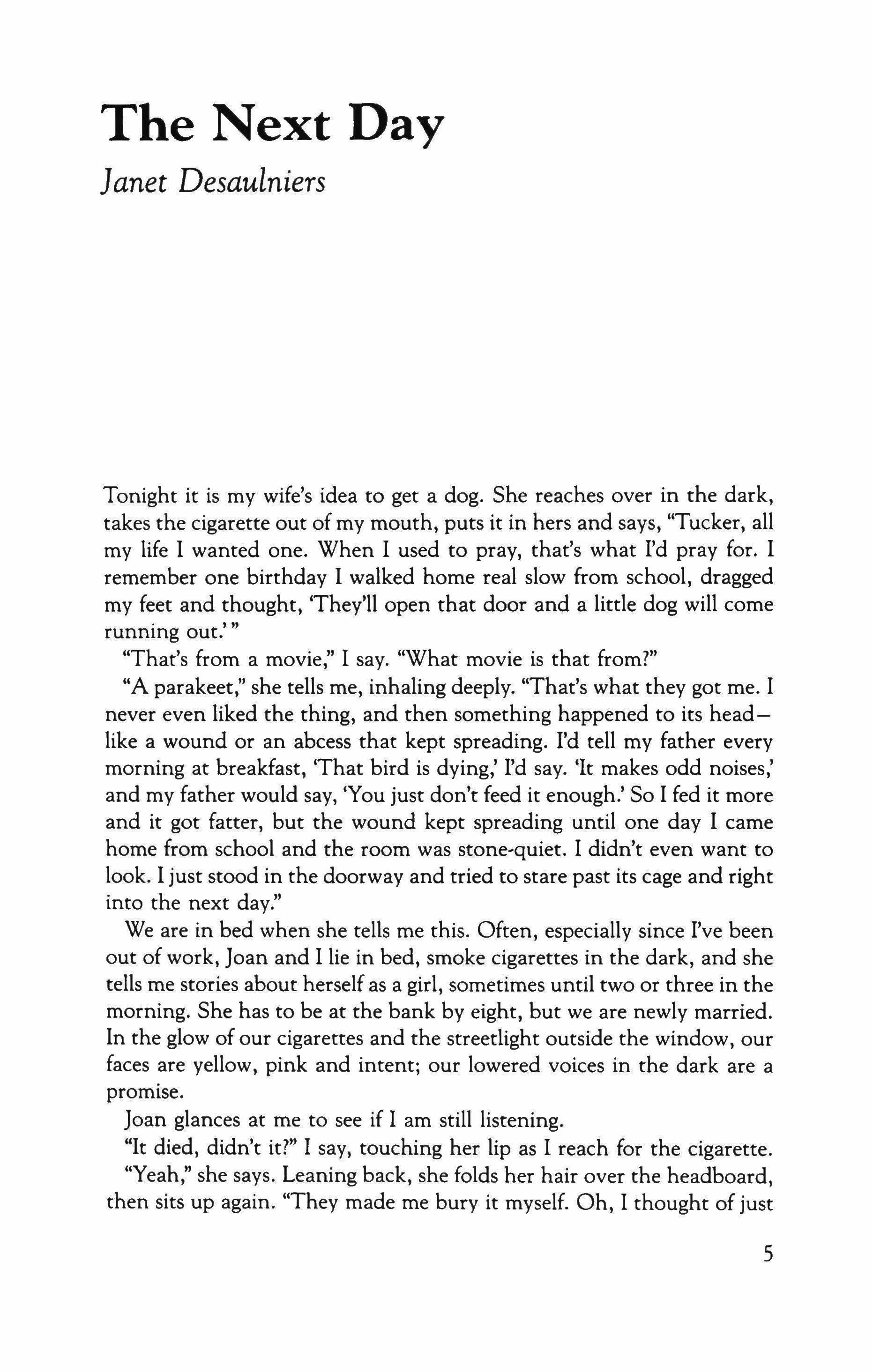
Tonight it is my wife's idea to get a dog. She reaches over in the dark, takes the cigarette out of my mouth, puts it in hers and says, "Tucker, all my life I wanted one. When I used to pray, that's what I'd pray for. I remember one birthday I walked home real slow from school, dragged my feet and thought, 'They'll open that door and a little dog will come running out.'''
"That's from a movie," I say. "What movie is that from?"
"A parakeet," she tells me, inhaling deeply. "That's what they got me. I never even liked the thing, and then something happened to its headlike a wound or an abcess that kept spreading. I'd tell my father every morning at breakfast, 'That bird is dying,' I'd say. 'It makes odd noises,' and my father would say, 'You just don't feed it enough.' So I fed it more and it got fatter, but the wound kept spreading until one day I came home from school and the room was stone-quiet. I didn't even want to look. I just stood in the doorway and tried to stare past its cage and right into the next day."
We are in bed when she tells me this. Often, especially since I've been out of work, Joan and I lie in bed, smoke cigarettes in the dark, and she tells me stories about herself as a girl, sometimes until two or three in the morning. She has to be at the bank by eight, but we are newly married. In the glow of our cigarettes and the streetlight outside the window, our faces are yellow, pink and intent; our lowered voices in the dark are a promise.
Joan glances at me to see if I am still listening. "It died, didn't it?" I say, touching her lip as I reach for the cigarette. "Yeah," she says. Leaning back, she folds her hair over the headboard, then sits up again. "They made me bury it myself. Oh, I thought of just
5
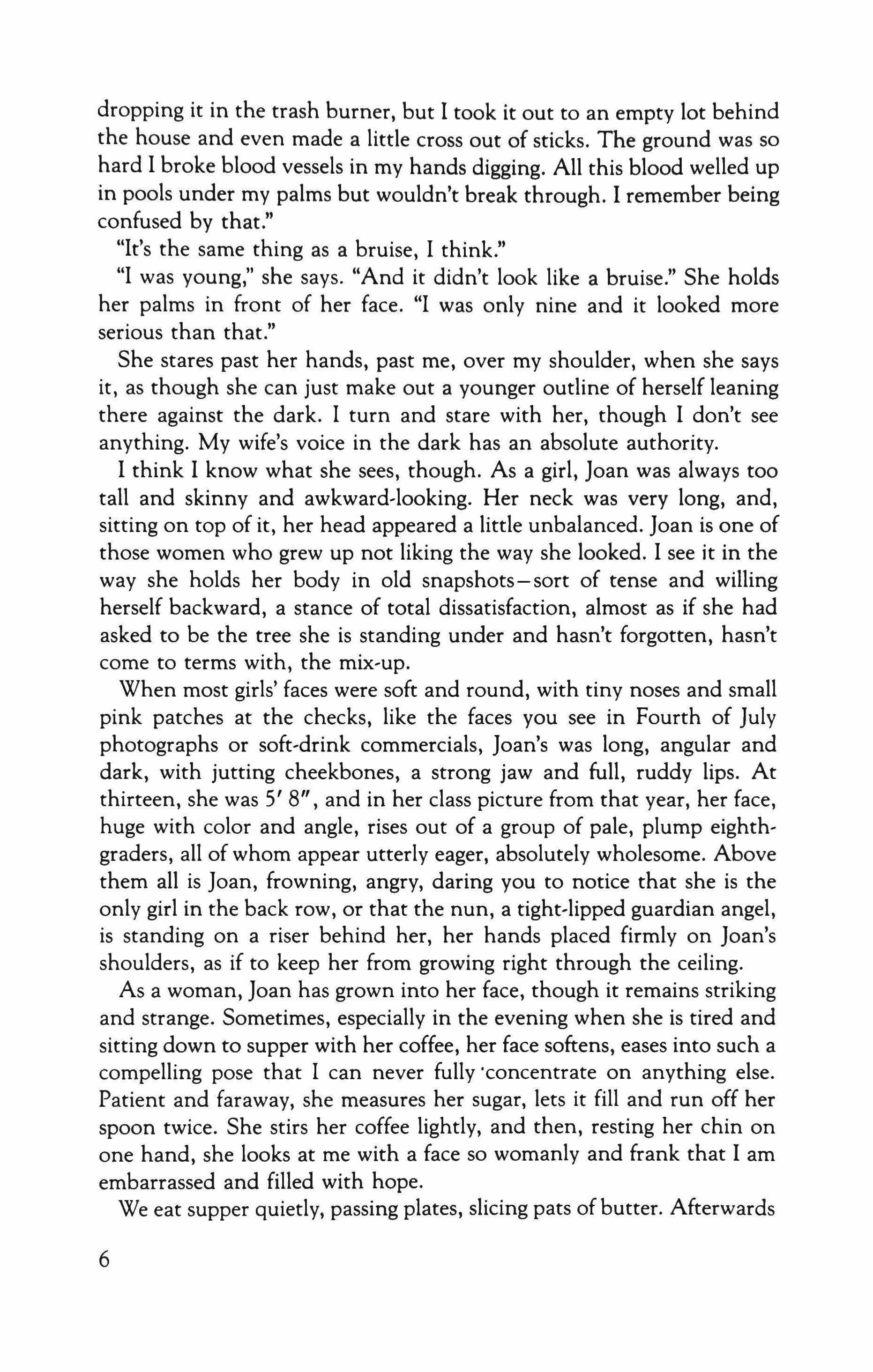
dropping it in the trash burner, but I took it out to an empty lot behind the house and even made a little cross out of sticks. The ground was so hard I broke blood vessels in my hands digging. All this blood welled up in pools under my palms but wouldn't break through. I remember being confused by that."
"It's the same thing as a bruise, I think."
"I was young," she says. "And it didn't look like a bruise." She holds her palms in front of her face. "I was only nine and it looked more serious than that."
She stares past her hands, past me, over my shoulder, when she says it, as though she can just make out a younger outline of herself leaning there against the dark. I turn and stare with her, though I don't see anything. My wife's voice in the dark has an absolute authority.
I think I know what she sees, though. As a girl, Joan was always too tall and skinny and awkward-looking. Her neck was very long, and, sitting on top of it, her head appeared a little unbalanced. Joan is one of those women who grew up not liking the way she looked. I see it in the way she holds her body in old snapshots-sort of tense and willing herself backward, a stance of total dissatisfaction, almost as if she had asked to be the tree she is standing under and hasn't forgotten, hasn't come to terms with, the mix-up.
When most girls' faces were soft and round, with tiny noses and small pink patches at the checks, like the faces you see in Fourth of July photographs or soft-drink commercials, Joan's was long, angular and dark, with jutting cheekbones, a strong jaw and full, ruddy lips. At thirteen, she was 5' 8", and in her class picture from that year, her face, huge with color and angle, rises out of a group of pale, plump eighthgraders, all of whom appear utterly eager, absolutely wholesome. Above them all is Joan, frowning, angry, daring you to notice that she is the only girl in the back row, or that the nun, a tight-lipped guardian angel, is standing on a riser behind her, her hands placed firmly on Joan's shoulders, as if to keep her from growing right through the ceiling.
As a woman, Joan has grown into her face, though it remains striking and strange. Sometimes, especially in the evening when she is tired and sitting down to supper with her coffee, her face softens, eases into such a compelling pose that I can never fully 'concentrate on anything else. Patient and faraway, she measures her sugar, lets it fill and run off her spoon twice. She stirs her coffee lightly, and then, resting her chin on one hand, she looks at me with a face so womanly and frank that I am embarrassed and filled with hope.
We eat supper quietly, passing plates, slicing pats of butter. Afterwards
6
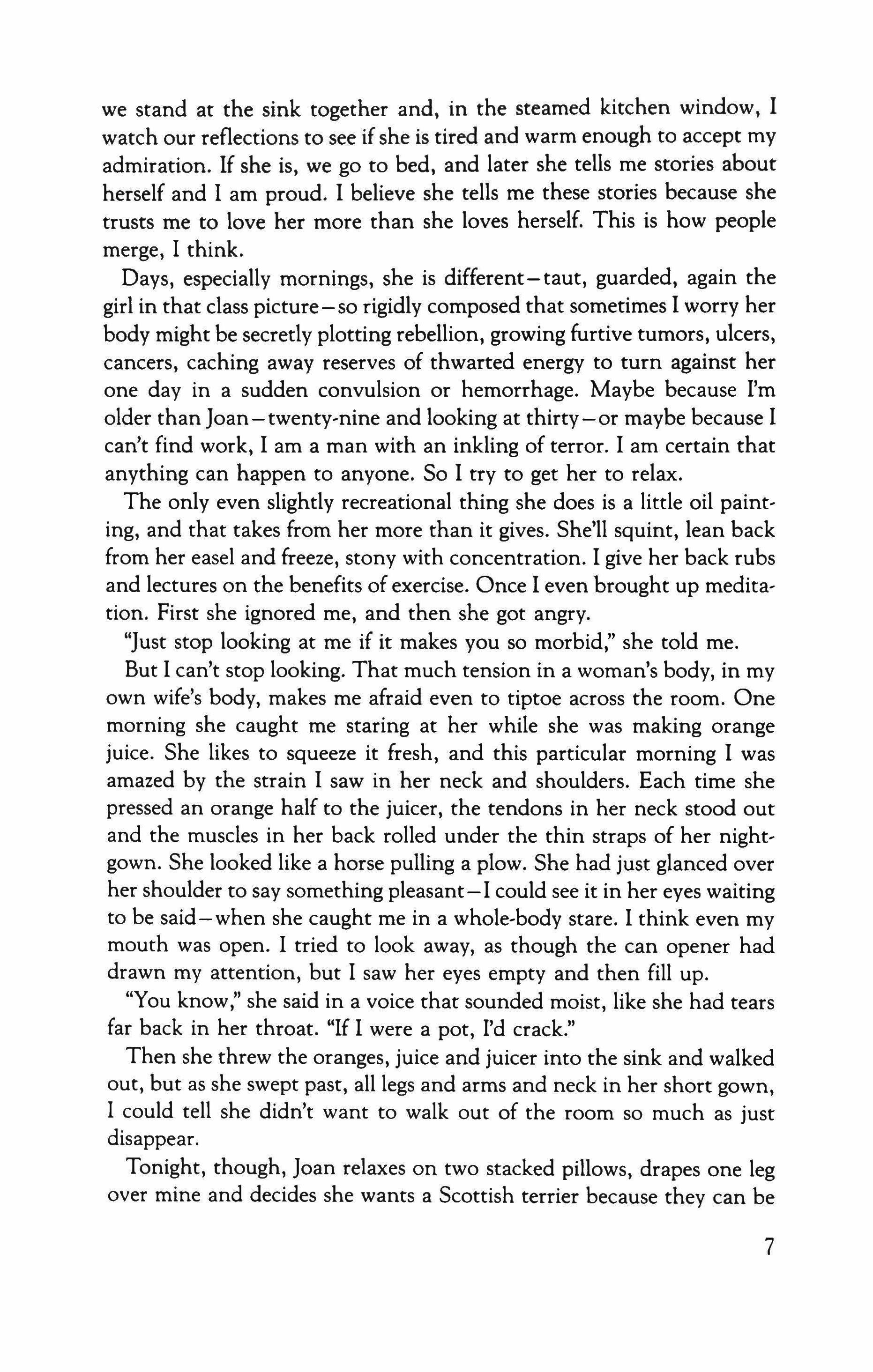
we stand at the sink together and, in the steamed kitchen window, I watch our reflections to see if she is tired and warm enough to accept my admiration. If she is, we go to bed, and later she tells me stories about herself and I am proud. I believe she tells me these stories because she trusts me to love her more than she loves herself. This is how people merge, I think.
Days, especially mornings, she is different-taut, guarded, again the girl in that class picture-so rigidly composed that sometimes I worry her body might be secretly plotting rebellion, growing furtive tumors, ulcers, cancers, caching away reserves of thwarted energy to turn against her one day in a sudden convulsion or hemorrhage. Maybe because I'm older than [oan=rwenrv-nine and looking at thirty-or maybe because I can't find work, I am a man with an inkling of terror. I am certain that anything can happen to anyone. So I try to get her to relax.
The only even slightly recreational thing she does is a little oil paint, ing, and that takes from her more than it gives. She'll squint, lean back from her easel and freeze, stony with concentration. I give her back rubs and lectures on the benefits of exercise. Once I even brought up meditation. First she ignored me, and then she got angry.
"Just stop looking at me if it makes you so morbid," she told me.
But I can't stop looking. That much tension in a woman's body, in my own wife's body, makes me afraid even to tiptoe across the room. One morning she caught me staring at her while she was making orange juice. She likes to squeeze it fresh, and this particular morning I was amazed by the strain I saw in her neck and shoulders. Each time she pressed an orange half to the juicer, the tendons in her neck stood out and the muscles in her back rolled under the thin straps of her night, gown. She looked like a horse pulling a plow. She had just glanced over her shoulder to say something pleasant - I could see it in her eyes waiting to be said-when she caught me in a whole-body stare. I think even my mouth was open. I tried to look away, as though the can opener had drawn my attention, but I saw her eyes empty and then fill up.
"You know," she said in a voice that sounded moist, like she had tears far back in her throat. "If I were a pot, I'd crack."
Then she threw the oranges, juice and juicer into the sink and walked out, but as she swept past, all legs and arms and neck in her short gown, I could tell she didn't want to walk out of the room so much as just disappear.
Tonight, though, Joan relaxes on two stacked pillows, drapes one leg over mine and decides she wants a Scottish terrier because they can be
7

dignified and comic simultaneously, and because of one that an old lady brings into the bank with her.
"She makes him wear this ridiculous plaid jacket," she tells me. "Normally I hate dogs in coats, but with this one I can tell he's embarrassed and trying to make the best of it. I think he's even embarrassed by the old woman."
She stubs out the cigarette and draws the sheet over us. I lie next to her and decide to look for a Scottish terrier. I decide to stop making cabinets, which is what I do when I'm out of work, and make calls to every kennel in the four-state area.
The cheapest Scottish terrier I find is six years old and costs $150. Puppies go for $250. I've been out of work for nine weeks and sold one cabinet to my second cousin, so Joan and I drive out into the country early one Saturday morning and pick the runt of a litter of shepherdcollie mix out of what looks like an old horse trough.
"That one," Joan says, and she looks good saying it. She doesn't try to hide that her face is announcing this is the puppy she'd waited for that birthday afternoon. I am proud of her. I think, "This is my wife and this is our dog and now I will drive us all home." We've only been married eight months and already in my mind the words, wife, husband, marriage, toll with tradition and reputation.
She decides to call him "Larry Hochstetler" after the farm kid with dirty hands and hair who lifts him from the trough to her arms. Immediately, Larry seems a frightened but adaptable puppy. He squeals when he is taken from his mother, then rests his muzzle on the slope of Joan's neck and shoulder, closes his eyes. I want to beam at her, standing there nuzzling the puppy in a rectangle of light that falls through the doorway of the shed. She looks warm and young and still a little sleepy around the eyes. Instead, I trace crosshatch lines in the dirt floor with the toe of my shoe. The kid pats Larry's rump twice, and Joan reaches out to run her hand through the kid's hair so that it stands up spiky and surprised. His mother, who had met us at the car and led us down a steep hill looking straight, full-breasted and strong in a sleeveless yellow dress and rough shoes, pulls her arms around her waist and smiles.
I watch Joan's face over the dog's ears, and when she looks over them, thanking me with her eyes, I take my hands out of my pockets and step forward too quickly, as if I were falling.
When Joan sees this, she stops smiling, hikes Larry farther up on her shoulder and sends the mother a familiar glance. Both women's expressions change to something humorous, tolerant.
8
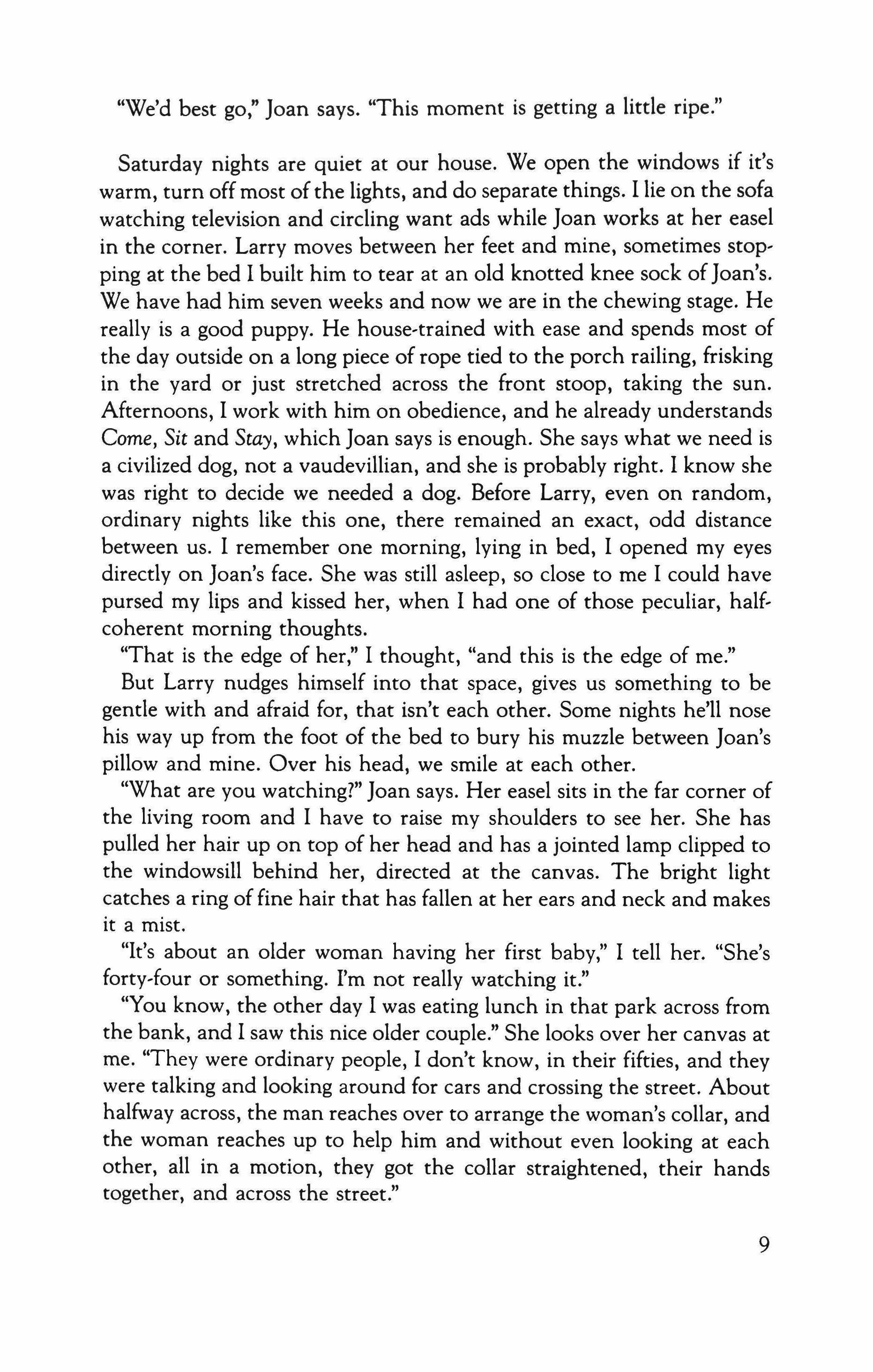
"We'd best go," Joan says. "This moment is getting a little ripe."
Saturday nights are quiet at our house. We open the windows if it's warm, turn off most ofthe lights, and do separate things. I lie on the sofa watching television and circling want ads while Joan works at her easel in the corner. Larry moves between her feet and mine, sometimes stopping at the bed I built him to tear at an old knotted knee sock ofJoan's. We have had him seven weeks and now we are in the chewing stage. He really is a good puppy. He house-trained with ease and spends most of the day outside on a long piece of rope tied to the porch railing, frisking in the yard or just stretched across the front stoop, taking the sun. Afternoons, I work with him on obedience, and he already understands Come, Sit and Stay, which Joan says is enough. She says what we need is a civilized dog, not a vaudevillian, and she is probably right. I know she was right to decide we needed a dog. Before Larry, even on random, ordinary nights like this one, there remained an exact, odd distance between us. I remember one morning, lying in bed, I opened my eyes directly on Joan's face. She was still asleep, so close to me I could have pursed my lips and kissed her, when I had one of those peculiar, halfcoherent morning thoughts.
"That is the edge of her," I thought, "and this is the edge of me."
But Larry nudges himself into that space, gives us something to be gentle with and afraid for, that isn't each other. Some nights he'll nose his way up from the foot of the bed to bury his muzzle between Joan's pillow and mine. Over his head, we smile at each other.
"What are you watching?" Joan says. Her easel sits in the far corner of the living room and I have to raise my shoulders to see her. She has pulled her hair up on top of her head and has a jointed lamp clipped to the windowsill behind her, directed at the canvas. The bright light catches a ring of fine hair that has fallen at her ears and neck and makes it a mist.
"It's about an older woman having her first baby," I tell her. "She's forty-four or something. I'm not really watching it."
"You know, the other day I was eating lunch in that park across from the bank, and I saw this nice older couple." She looks over her canvas at me. "They were ordinary people, I don't know, in their fifties, and they were talking and looking around for cars and crossing the street. About halfway across, the man reaches over to arrange the woman's collar, and the woman reaches up to help him and without even looking at each other, all in a motion, they got the collar straightened, their hands together, and across the street."
9
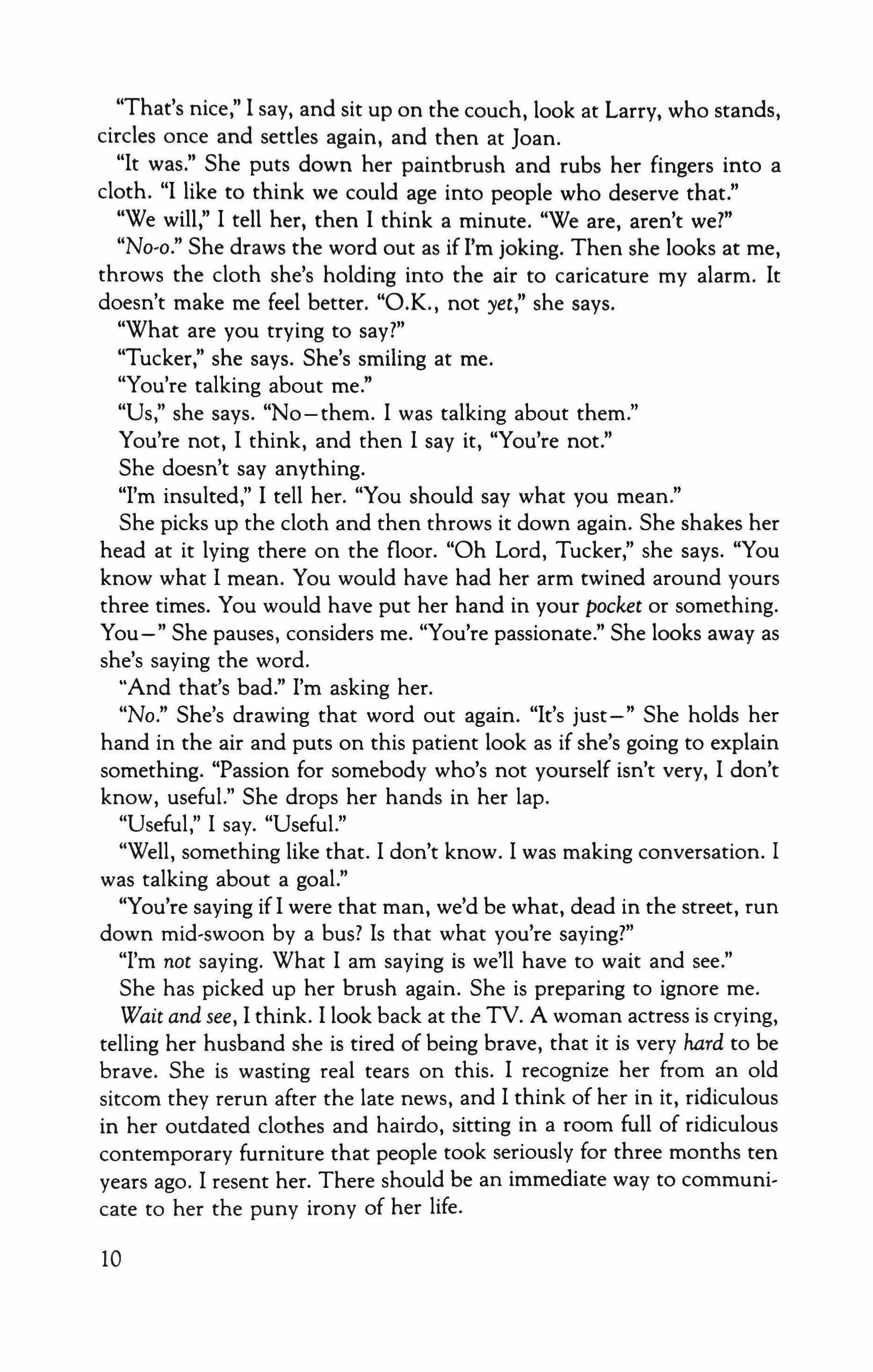
"That's nice," I say, and sit up on the couch, look at Larry, who stands, circles once and settles again, and then at Joan.
"It was." She puts down her paintbrush and rubs her fingers into a cloth. "I like to think we could age into people who deserve that."
"We will," I tell her, then I think a minute. "We are, aren't we?"
"No-o" She draws the word out as if I'm joking. Then she looks at me, throws the cloth she's holding into the air to caricature my alarm. It doesn't make me feel better. "O.K., not yet," she says.
"What are you trying to say?"
"Tucker," she says. She's smiling at me.
"You're talking about me."
"Us," she says. "No-them. I was talking about them."
You're not, I think, and then I say it, "You're not."
She doesn't say anything.
"I'm insulted," I tell her. "You should say what you mean."
She picks up the cloth and then throws it down again. She shakes her head at it lying there on the floor. "Oh Lord, Tucker," she says. "You know what I mean. You would have had her arm twined around yours three times. You would have put her hand in your pocket or something. You -" She pauses, considers me. "You're passionate." She looks away as she's saying the word.
"And that's bad." I'm asking her.
"No." She's drawing that word out again. "It's just -" She holds her hand in the air and puts on this patient look as if she's going to explain something. "Passion for somebody who's not yourself isn't very, I don't know, useful." She drops her hands in her lap.
"Useful," I say. "Useful."
"Well, something like that. I don't know. I was making conversation. I was talking about a goal."
"You're saying if I were that man, we'd be what, dead in the street, run down mid-swoon by a bus? Is that what you're saying?"
"I'm not saying. What I am saying is we'll have to wait and see."
She has picked up her brush again. She is preparing to ignore me.
Wait and see, I think. I look back at the TV. A woman actress is crying, telling her husband she is tired of being brave, that it is very hard to be brave. She is wasting real tears on this. I recognize her from an old sitcom they rerun after the late news, and I think of her in it, ridiculous in her outdated clothes and hairdo, sitting in a room full of ridiculous contemporary furniture that people took seriously for three months ten years ago. I resent her. There should be an immediate way to communicate to her the puny irony of her life.
10
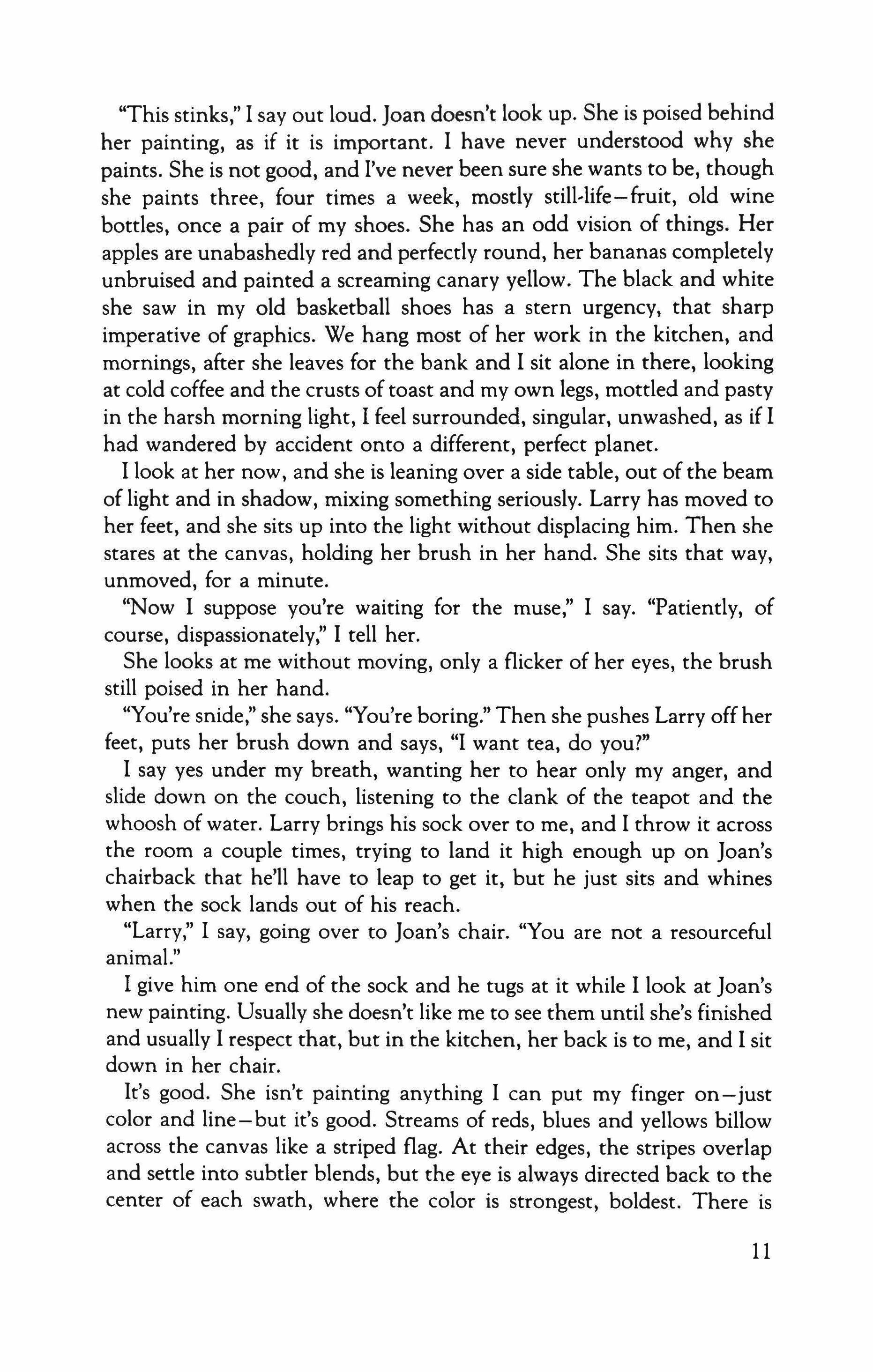
"This stinks," I say out loud. Joan doesn't look up. She is poised behind her painting, as if it is important. I have never understood why she paints. She is not good, and I've never been sure she wants to be, though she paints three, four times a week, mostly still-life=fruit, old wine bottles, once a pair of my shoes. She has an odd vision of things. Her apples are unabashedly red and perfectly round, her bananas completely unbruised and painted a screaming canary yellow. The black and white she saw in myoid basketball shoes has a stern urgency, that sharp imperative of graphics. We hang most of her work in the kitchen, and mornings, after she leaves for the bank and I sit alone in there, looking at cold coffee and the crusts of toast and my own legs, mottled and pasty in the harsh morning light, I feel surrounded, singular, unwashed, as if I had wandered by accident onto a different, perfect planet.
I look at her now, and she is leaning over a side table, out of the beam of light and in shadow, mixing something seriously. Larry has moved to her feet, and she sits up into the light without displacing him. Then she stares at the canvas, holding her brush in her hand. She sits that way, unmoved, for a minute.
"Now I suppose you're waiting for the muse," I say. "Patiently, of course, dispassionately," I tell her.
She looks at me without moving, only a flicker of her eyes, the brush still poised in her hand.
"You're snide," she says. "You're boring." Then she pushes Larry off her feet, puts her brush down and says, "I want tea, do you?"
I say yes under my breath, wanting her to hear only my anger, and slide down on the couch, listening to the clank of the teapot and the whoosh of water. Larry brings his sock over to me, and I throw it across the room a couple times, trying to land it high enough up on Joan's chairback that he'll have to leap to get it, but he just sits and whines when the sock lands out of his reach.
"Larry," I say, going over to Joan's chair. "You are not a resourceful animal."
I give him one end of the sock and he tugs at it while I look at Joan's new painting. Usually she doesn't like me to see them until she's finished and usually I respect that, but in the kitchen, her back is to me, and I sit down in her chair.
It's good. She isn't painting anything I can put my finger on - just color and line-but it's good. Streams of reds, blues and yellows billow across the canvas like a striped flag. At their edges, the stripes overlap and settle into subtler blends, but the eye is always directed back to the center of each swath, where the color is strongest, boldest. There is
11
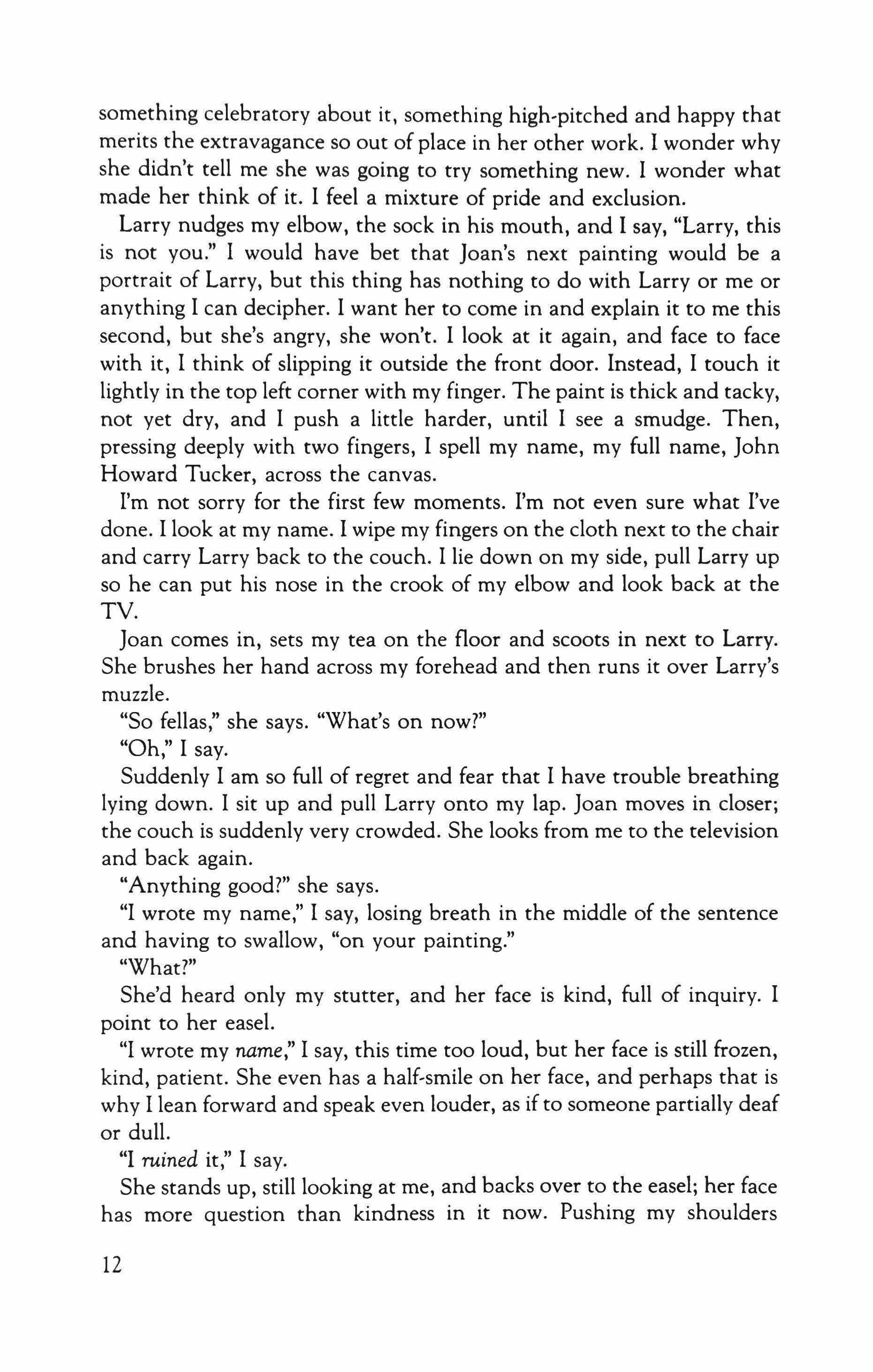
something celebratory about it, something high-pitched and happy that merits the extravagance so out of place in her other work. I wonder why she didn't tell me she was going to try something new. I wonder what made her think of it. I feel a mixture of pride and exclusion.
Larry nudges my elbow, the sock in his mouth, and I say, "Larry, this is not you." I would have bet that Joan's next painting would be a portrait of Larry, but this thing has nothing to do with Larry or me or anything I can decipher. I want her to come in and explain it to me this second, but she's angry, she won't. I look at it again, and face to face with it, I think of slipping it outside the front door. Instead, I touch it lightly in the top left corner with my finger. The paint is thick and tacky, not yet dry, and I push a little harder, until I see a smudge. Then, pressing deeply with two fingers, I spell my name, my full name, John Howard Tucker, across the canvas.
I'm not sorry for the first few moments. I'm not even sure what I've done. I look at my name. I wipe my fingers on the cloth next to the chair and carry Larry back to the couch. I lie down on my side, pull Larry up so he can put his nose in the crook of my elbow and look back at the TV.
Joan comes in, sets my tea on the floor and scoots in next to Larry. She brushes her hand across my forehead and then runs it over Larry's muzzle.
"So fellas," she says. "What's on now?"
"Gh," I say.
Suddenly I am so full of regret and fear that I have trouble breathing lying down. I sit up and pull Larry onto my lap. Joan moves in closer; the couch is suddenly very crowded. She looks from me to the television and back again.
"Anything good?" she says.
"I wrote my name," I say, losing breath in the middle of the sentence and having to swallow, "on your painting." "What?"
She'd heard only my stutter, and her face is kind, full of inquiry. I point to her easel.
"I wrote my name," I say, this time too loud, but her face is still frozen, kind, patient. She even has a half-smile on her face, and perhaps that is why I lean forward and speak even louder, as if to someone partially deaf or dull.
"I ruined it," I say.
She stands up, still looking at me, and backs over to the easel; her face has more question than kindness in it now. Pushing my shoulders
12
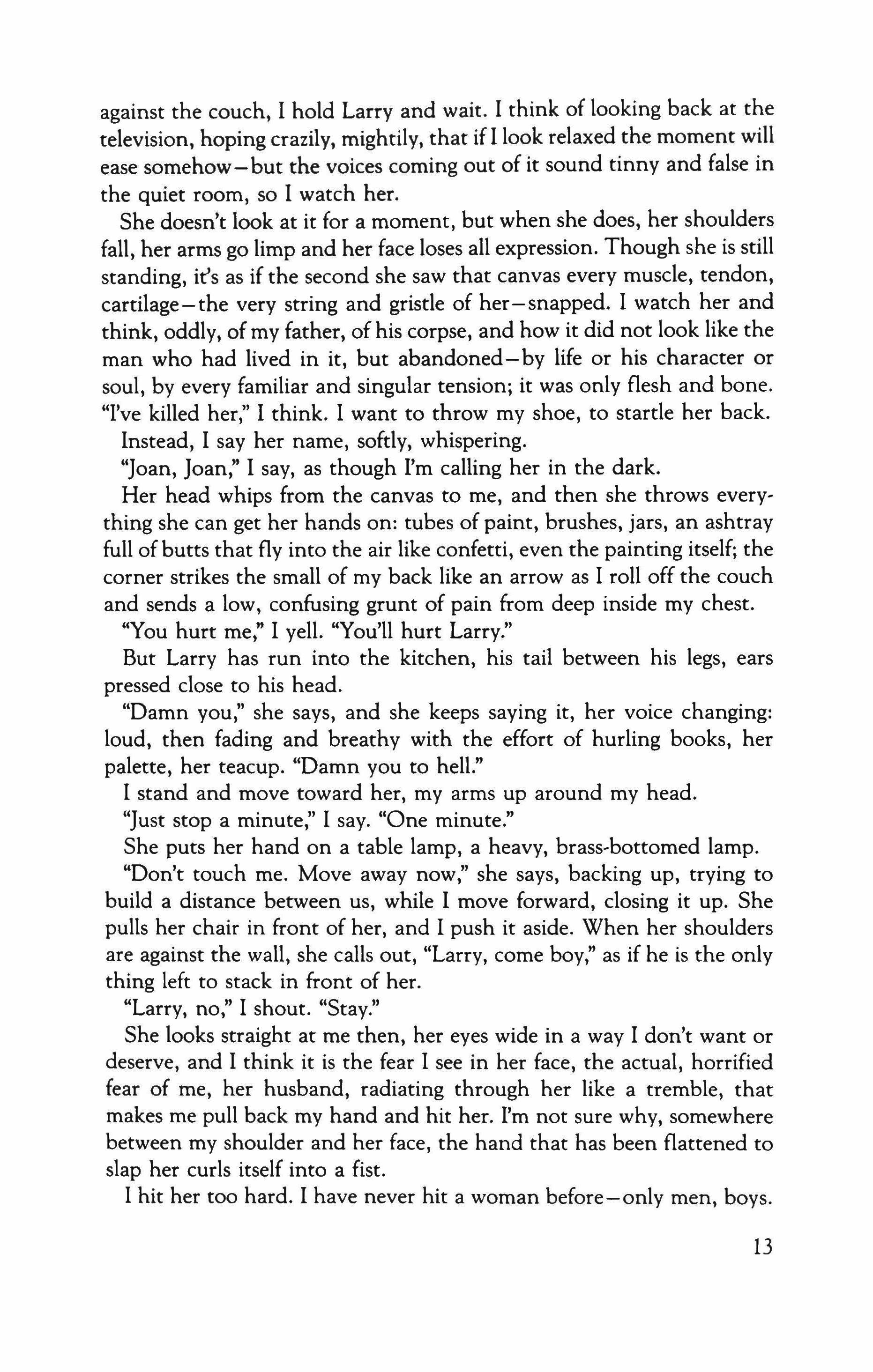
against the couch, I hold Larry and wait. I think of looking back at the television, hoping crazily, mightily, that if I look relaxed the moment will ease somehow-but the voices coming out of it sound tinny and false in the quiet room, so I watch her.
She doesn't look at it for a moment, but when she does, her shoulders fall, her arms go limp and her face loses all expression. Though she is still standing, it's as if the second she saw that canvas every muscle, tendon, cartilage-the very string and gristle of her-snapped. I watch her and think, oddly, of my father, of his corpse, and how it did not look like the man who had lived in it, but abandoned - by life or his character or soul, by every familiar and singular tension; it was only flesh and bone. "I've killed her," I think. I want to throw my shoe, to startle her back.
Instead, I say her name, softly, whispering.
"Joan, Joan," I say, as though I'm calling her in the dark.
Her head whips from the canvas to me, and then she throws everything she can get her hands on: tubes of paint, brushes, jars, an ashtray full of butts that fly into the air like confetti, even the painting itself; the corner strikes the small of my back like an arrow as I roll off the couch and sends a low, confusing grunt of pain from deep inside my chest.
"You hurt me," I yell. "You'll hurt Larry."
But Larry has run into the kitchen, his tail between his legs, ears pressed close to his head.
"Damn you," she says, and she keeps saying it, her voice changing: loud, then fading and breathy with the effort of hurling books, her palette, her teacup. "Damn you to hell."
I stand and move toward her, my arms up around my head.
"J ." I "0 ust stop a mmute, say. ne mmute.
She puts her hand on a table lamp, a heavy, brass-bottomed lamp. "Don't touch me. Move away now," she says, backing up, trying to build a distance between us, while I move forward, closing it up. She pulls her chair in front of her, and I push it aside. When her shoulders are against the wall, she calls out, "Larry, come boy," as if he is the only thing left to stack in front of her.
"Larry, no," I shout. "Stay."
She looks straight at me then, her eyes wide in a way I don't want or deserve, and I think it is the fear I see in her face, the actual, horrified fear of me, her husband, radiating through her like a tremble, that makes me pull back my hand and hit her. I'm not sure why, somewhere between my shoulder and her face, the hand that has been flattened to slap her curls itself into a fist.
I hit her too hard. I have never hit a woman before-only men, boys.
13
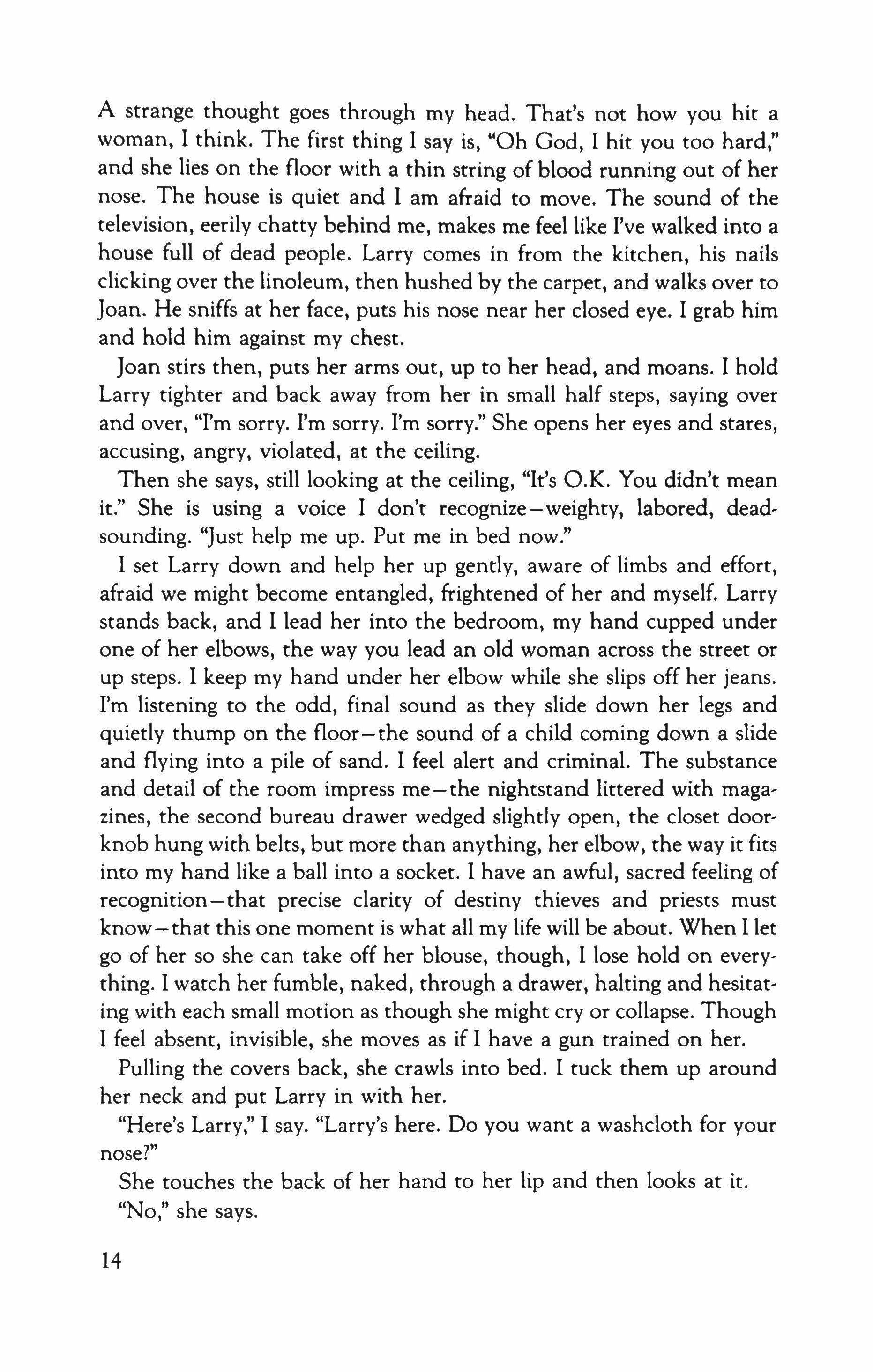
A strange thought goes through my head. That's not how you hit a woman, I think. The first thing I say is, "Oh God, I hit you too hard," and she lies on the floor with a thin string of blood running out of her nose. The house is quiet and I am afraid to move. The sound of the television, eerily chatty behind me, makes me feel like I've walked into a house full of dead people. Larry comes in from the kitchen, his nails clicking over the linoleum, then hushed by the carpet, and walks over to Joan. He sniffs at her face, puts his nose near her closed eye. I grab him and hold him against my chest.
Joan stirs then, puts her arms out, up to her head, and moans. I hold Larry tighter and back away from her in small half steps, saying over and over, "I'm sorry. I'm sorry. I'm sorry." She opens her eyes and stares, accusing, angry, violated, at the ceiling.
Then she says, still looking at the ceiling, "It's O.K. You didn't mean it." She is using a voice I don't recognize - weighty, labored, deadsounding. "Just help me up. Put me in bed now."
I set Larry down and help her up gently, aware of limbs and effort, afraid we might become entangled, frightened of her and myself. Larry stands back, and I lead her into the bedroom, my hand cupped under one of her elbows, the way you lead an old woman across the street or up steps. I keep my hand under her elbow while she slips off her jeans. I'm listening to the odd, final sound as they slide down her legs and quietly thump on the floor-the sound of a child coming down a slide and flying into a pile of sand. I feel alert and criminal. The substance and detail of the room impress me-the nightstand littered with magazines, the second bureau drawer wedged slightly open, the closet doorknob hung with belts, but more than anything, her elbow, the way it fits into my hand like a ball into a socket. I have an awful, sacred feeling of recognition-that precise clarity of destiny thieves and priests must know-that this one moment is what all my life will be about. When I let go of her so she can take off her blouse, though, I lose hold on everything. I watch her fumble, naked, through a drawer, halting and hesitating with each small motion as though she might cry or collapse. Though I feel absent, invisible, she moves as if I have a gun trained on her.
Pulling the covers back, she crawls into bed. I tuck them up around her neck and put Larry in with her.
"Here's Larry," I say. "Larry's here. Do you want a washcloth for your nose?"
She touches the back of her hand to her lip and then looks at it. "No," she says.
14
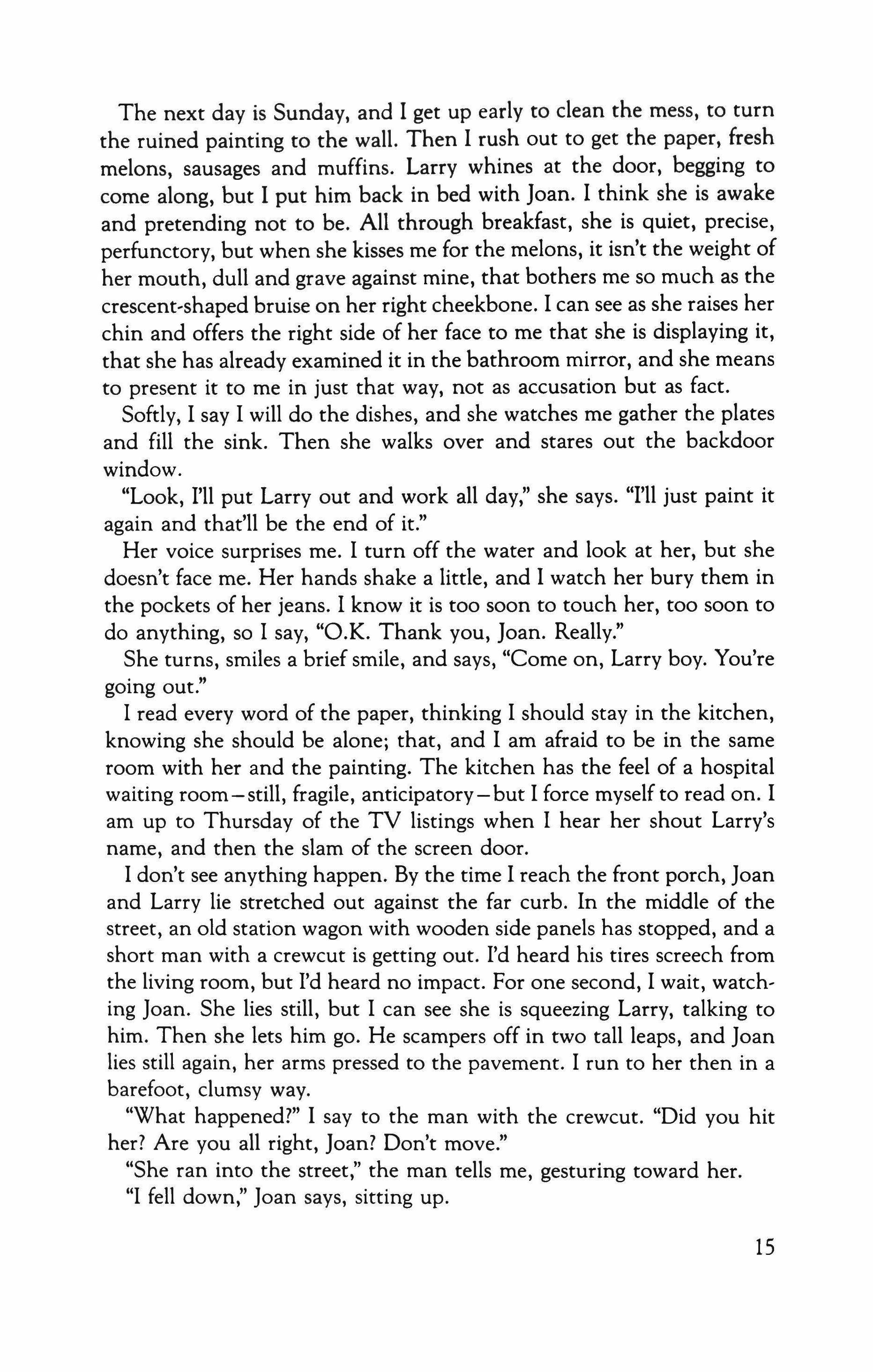
The next day is Sunday, and I get up early to clean the mess, to turn the ruined painting to the wall. Then I rush out to get the paper, fresh melons, sausages and muffins. Larry whines at the door, begging to come along, but I put him back in bed with Joan. I think she is awake and pretending not to be. All through breakfast, she is quiet, precise, perfunctory, but when she kisses me for the melons, it isn't the weight of her mouth, dull and grave against mine, that bothers me so much as the crescent-shaped bruise on her right cheekbone. I can see as she raises her chin and offers the right side of her face to me that she is displaying it, that she has already examined it in the bathroom mirror, and she means to present it to me in just that way, not as accusation but as fact.
Softly, I say I will do the dishes, and she watches me gather the plates and fill the sink. Then she walks over and stares out the backdoor window.
"Look, I'll put Larry out and work all day," she says. "I'll just paint it again and that'll be the end of it."
Her voice surprises me. I turn off the water and look at her, but she doesn't face me. Her hands shake a little, and I watch her bury them in the pockets of her jeans. I know it is too soon to touch her, too soon to do anything, so I say, "O.K. Thank you, Joan. Really."
She turns, smiles a brief smile, and says, "Come on, Larry boy. You're going out."
I read every word of the paper, thinking I should stay in the kitchen, knowing she should be alone; that, and I am afraid to be in the same room with her and the painting. The kitchen has the feel of a hospital waiting room - still, fragile, anticipatory - but I force myself to read on. I am up to Thursday of the TV listings when I hear her shout Larry's name, and then the slam of the screen door.
I don't see anything happen. By the time I reach the front porch, Joan and Larry lie stretched out against the far curb. In the middle of the street, an old station wagon with wooden side panels has stopped, and a short man with a crewcut is getting out. I'd heard his tires screech from the living room, but I'd heard no impact. For one second, I wait, watching Joan. She lies still, but I can see she is squeezing Larry, talking to him. Then she lets him go. He scampers off in two tall leaps, and Joan lies still again, her arms pressed to the pavement. I run to her then in a barefoot, clumsy way.
"What happened?" I say to the man with the crewcut. "Did you hit her? Are you all right, Joan? Don't move."
"She ran into the street," the man tells me, gesturing toward her.
"I fell down," Joan says, sitting up.
15

"Don't move," I tell her, and then I look at the man. "You were speeding, weren't you? The speed limit is fifteen on this street."
"I didn't touch her." He points to his car. "I stopped way back there. She was after the dog. She tripped."
I stare at him, my hands on my hips.
"I swear" he says, raising both hands. "Ask her."
"Oh God," Joan says. "Oh no."
Her mouth open, her face pale and slack, she is standing now, holding her arms out, as though she wants one of us to come and take them from her.
"Lord," the driver says.
From wrist to elbow, Joan's arms have been scraped raw. She swings them from the driver to me, then sits down heavily on the curb, rests her forehead on her knees, and begins to rock slowly back and forth.
"I guess she skidded," the driver says. He sounds embarrassed, toes at some loose gravel, then looks up at me. "When she tripped," he adds. I stare at him, and then I see, over his shoulder, neighbors all down the block - some still frozen on their porches, others taking the first hesitant steps across their lawns, and a whole group, housedresses, Bermuda shorts, a few kids, in determined middle-of-the-street full stride. I turn to Joan, and as I kneel beside her, I hear a woman's voice, feel it on my neck, saying, "You poor thing. We called an ambulance and it'll be just one minute."
Joan doesn't look up, just keeps rocking. I grind my knees into the street, balance one of her hands, palm up, in mine.
"It'll only be a minute," I say, touching her shoulder lightly. "Joan?"
I think I hear her say, "Don't," softly, more to the pavement than to me. "Don't." The word seems to gag her.
"Have her hold her arms up," a man's voice says. The next one I recognize-the driver of the station wagon. "Everybody should just move back and let her be."
I bend closer to Joan, wanting to have been the one to have said that, and wonder if she'll let me carry her into the house.
"Hey," I whisper. "Hey, are you all right?"
She lifts her head then, and I am startled by her calm. Though blotchy, the bruise on her cheekbone ruddy from tears or pain, her face says not one thing has happened to her. She stares at me.
"1 hate you," she says, shrugging my hand off her shoulder. "Get your hands off me."
She stands up then, and I stand with her, my hands swaying in the air
16

on either side of her. I feel the crowd sway with me, as if suddenly Joan is two stories up, threatening to jump, and we are going to catch her.
"Wait," I tell her. "Sit still a minute."
"Get." She stops as her eyes move to the people behind me. But they leave her unchanged. She could have been back at the breakfast table, pretending to pick at her melon, or dangling both legs from the top rail of a fire escape. She is certain. "Away from me." She pushes me once in the chest, hard. Then her voice cracks, but she goes on, pushes me in the chest again, and then again. "Stop looking at me. Stop doing things to me. Stop talking. Just stop, do you hear?"
I turn to the half-circle of neighbors, their curiosity knocked into something stolid, looking almost sleepy now, and I want to wave them all home to their living rooms, their kitchens, to coffee, to some intimacy that could never be acted out on a curb, when I see Larry sitting, ears erect, at the edge of our yard.
I point to him and look back at Joan.
"There's Larry," I say. "You got him in time."
"Both of you," she is shouting now, bent forward at the waist. "I hate you both."
Then everything does stop. The half-circle of neighbors widens and we all just lean back to wait. Joan turns and begins to walk up the block, away from us all. She tries to wipe her face with the back of one arm and gets blood in her hair. The driver of the station wagon walks up behind her, puts his hands on her shoulders and sits her gently back on the curb. He whispers something to her and then he pats at the blood in her hair with his handkerchief. She trembles when he does it, but she lets him.
"Why don't you all move off a little?" he calls to us. "You're upsetting her." I stare at his handkerchief.
"She's my wife," I say. "She might be in shock or something. I'm her husband."
"I'm not." She looks at the driver and then at the neighbors when she says it, and they move forward. Joan turns away then, and starts to cry hard and silently. Her arms shake in front of her, and she folds them stiffly into her lap. Two women still dressed for church come and sit beside her on the curb. The rest of the crowd closes around them.
Next to me in the street is the end of Larry's rope. I pick it up. It is wet where he chewed through it. Winding it around my hand, I follow it to the edge of our lawn where Larry still sits, and I watch a little girl run up the walk and into our house, letting the screen door slide shut behind
17

her. A second later, she comes out again, taking the last step of the porch with a small skip, Joan's purse swinging from her shoulder.
"The lady told me to," she says when she sees me.
Scooping Larry up, I see the blood on my shirt where Joan pushed me and on his fur where she squeezed him. I press him to my chest. A nearing siren is the only sound. It draws Larry's ears up, and he begins to tremble.
"I'm taking my dog in the house," I say, but no one looks up. "He's upset, and I'll be right back."
But I don't go right back. I stand at the front window holding Larry, half,hidden by the drape, and watch an ambulance pull up and two men in blue coats who wear their pants belted under their bellies like cow' boys wrap Joan's arms in gauze and then help her into the back of the van, gently, the way I'd helped her into bed the night before.
18
In the Air, Over Our Heads
Amy Herrick

Perhaps Sarah takes the apartment at this rude and disreputable end of the city as an act of curiosity. In any case, she can't afford much more. She takes the job, although it doesn't pay well, because she wants to be on hand to deliver any possible blows of reason to this dark and ignorant age. She knows she will witness much injustice and she expects to see the miserable and oppressed and mad thrown into dungeons (where they can have time to grow even more miserable and oppressed and mad). She recognizes that she is as free as one is granted to be-given the anarchy and disorder that roam the universe like wolves-and she spends the winter training her reflexes to stop on a dime. However, she doesn't sleep well, perhaps because she is not sure how much actual power you get from being free in this great light world.
Early in the spring she is assigned her first murder case. Theresa Maldonado, after eight years of having her nose broken and her teeth knocked out, finally picked up a carving knife one night and marched Luis Maldonado around the kitchen table and stabbed him five times through the heart. Sarah thinks she is ready for this. She, herself, sick of love, of raising hopes and watching them dashed, of jumping around deafened and myopic, kissing people on the mouth and later tripping over things in their darkened rooms searching for her glasses, throws herself with deadly seriousness into this case.
Theresa has a small heart-shaped face with sadness as incurably stamped on it as a postmark. If Sarah can bring in a verdict oftemporary insanity, then Theresa will walk away free. Sarah cannot imagine who would not agree that stabbing Luis was as innocent and temporarily insane an act as you're likely to get on this whirling little planet with its rivers of blood.
19
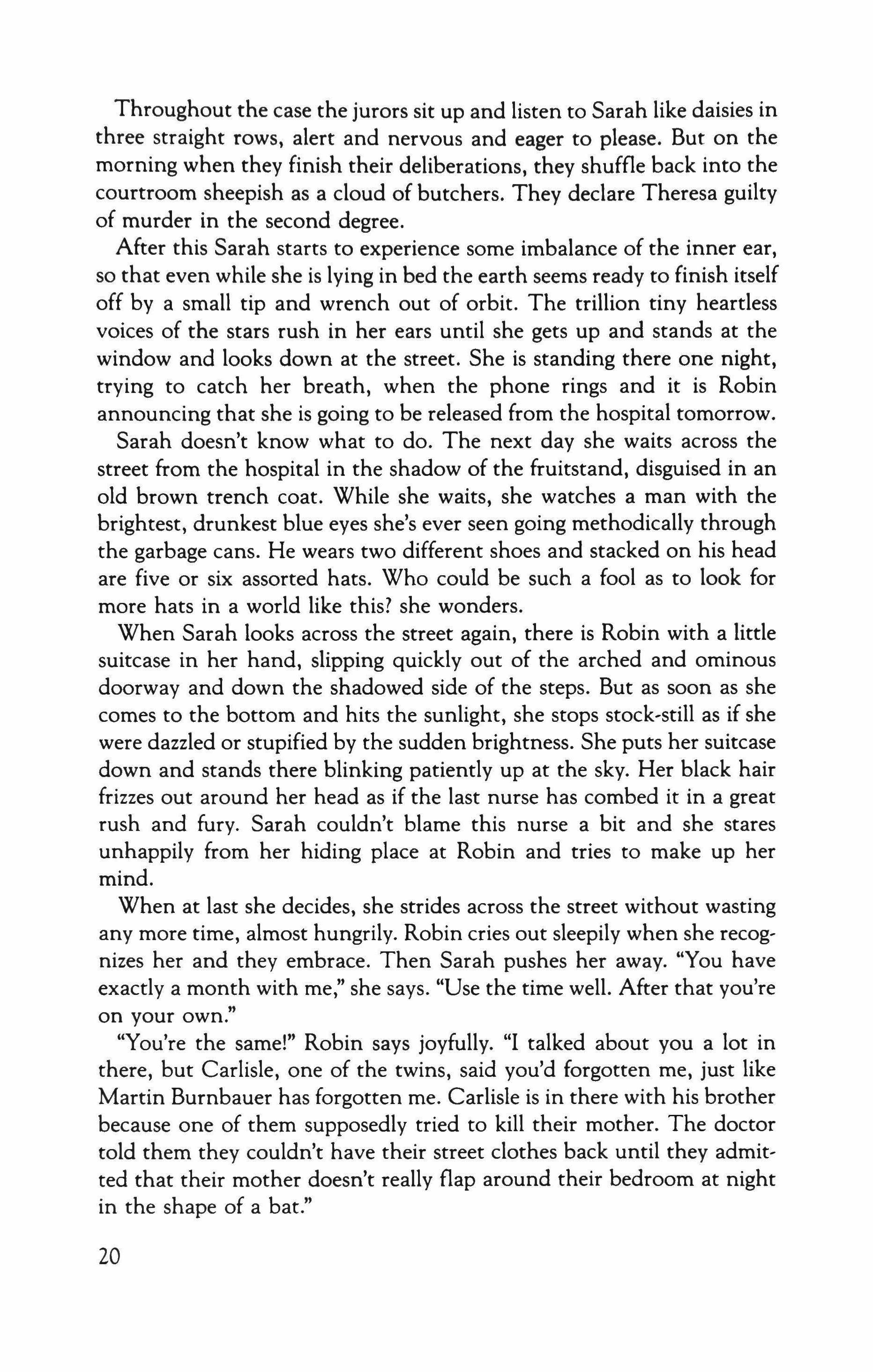
Throughout the case the jurors sit up and listen to Sarah like daisies in three straight rows, alert and nervous and eager to please. But on the morning when they finish their deliberations, they shuffle back into the courtroom sheepish as a cloud of butchers. They declare Theresa guilty of murder in the second degree.
After this Sarah starts to experience some imbalance of the inner ear, so that even while she is lying in bed the earth seems ready to finish itself off by a small tip and wrench out of orbit. The trillion tiny heartless voices of the stars rush in her ears until she gets up and stands at the window and looks down at the street. She is standing there one night, trying to catch her breath, when the phone rings and it is Robin announcing that she is going to be released from the hospital tomorrow.
Sarah doesn't know what to do. The next day she waits across the street from the hospital in the shadow of the fruitstand, disguised in an old brown trench coat. While she waits, she watches a man with the brightest, drunkest blue eyes she's ever seen going methodically through the garbage cans. He wears two different shoes and stacked on his head are five or six assorted hats. Who could be such a fool as to look for more hats in a world like this? she wonders.
When Sarah looks across the street again, there is Robin with a little suitcase in her hand, slipping quickly out of the arched and ominous doorway and down the shadowed side of the steps. But as soon as she comes to the bottom and hits the sunlight, she stops stock,still as if she were dazzled or stupified by the sudden brightness. She puts her suitcase down and stands there blinking patiently up at the sky. Her black hair frizzes out around her head as if the last nurse has combed it in a great rush and fury. Sarah couldn't blame this nurse a bit and she stares unhappily from her hiding place at Robin and tries to make up her mind.
When at last she decides, she strides across the street without wasting any more time, almost hungrily. Robin cries out sleepily when she recognizes her and they embrace. Then Sarah pushes her away. "You have exactly a month with me," she says. "Use the time well. After that you're on your own."
"You're the same!" Robin says joyfully. "I talked about you a lot in there, but Carlisle, one of the twins, said you'd forgotten me, just like Martin Burnbauer has forgotten me. Carlisle is in there with his brother because one of them supposedly tried to kill their mother. The doctor told them they couldn't have their street clothes back until they admit, ted that their mother doesn't really flap around their bedroom at night in the shape of a bat."
20
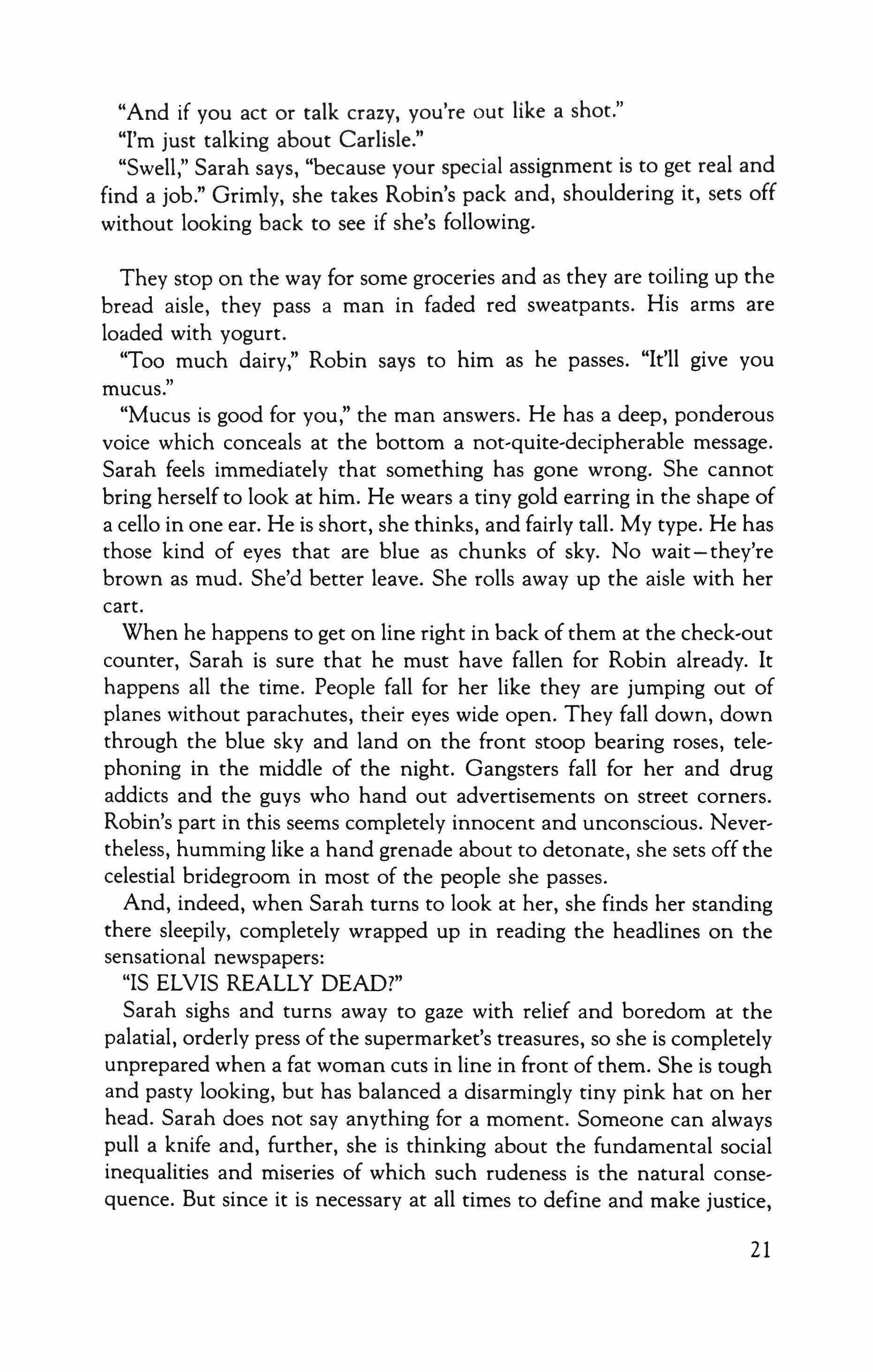
"And if you act or talk crazy, you're out like a shot."
"I'm just talking about Carlisle."
"Swell," Sarah says, "because your special assignment is to get real and find a job." Grimly, she takes Robin's pack and, shouldering it, sets off without looking back to see if she's following.
They stop on the way for some groceries and as they are toiling up the bread aisle, they pass a man in faded red sweatpants. His arms are loaded with yogurt.
"Too much dairy," Robin says to him as he passes. "It'll give you mucus."
"Mucus is good for you," the man answers. He has a deep, ponderous voice which conceals at the bottom a not-quite-decipherable message. Sarah feels immediately that something has gone wrong. She cannot bring herself to look at him. He wears a tiny gold earring in the shape of a cello in one ear. He is short, she thinks, and fairly tall. My type. He has those kind of eyes that are blue as chunks of sky. No wait - they're brown as mud. She'd better leave. She rolls away up the aisle with her cart.
When he happens to get on line right in back of them at the check-out counter, Sarah is sure that he must have fallen for Robin already. It happens all the time. People fall for her like they are jumping out of planes without parachutes, their eyes wide open. They fall down, down through the blue sky and land on the front stoop bearing roses, telephoning in the middle of the night. Gangsters fall for her and drug addicts and the guys who hand out advertisements on street corners. Robin's part in this seems completely innocent and unconscious. Nevertheless, humming like a hand grenade about to detonate, she sets off the celestial bridegroom in most of the people she passes.
And, indeed, when Sarah turns to look at her, she finds her standing there sleepily, completely wrapped up in reading the headlines on the sensational newspapers:
"IS ELVIS REALLY DEAD?"
Sarah sighs and turns away to gaze with relief and boredom at the palatial, orderly press of the supermarket's treasures, so she is completely unprepared when a fat woman cuts in line in front of them. She is tough and pasty looking, but has balanced a disarmingly tiny pink hat on her head. Sarah does not say anything for a moment. Someone can always pull a knife and, further, she is thinking about the fundamental social inequalities and miseries of which such rudeness is the natural consequence. But since it is necessary at all times to define and make justice,
21
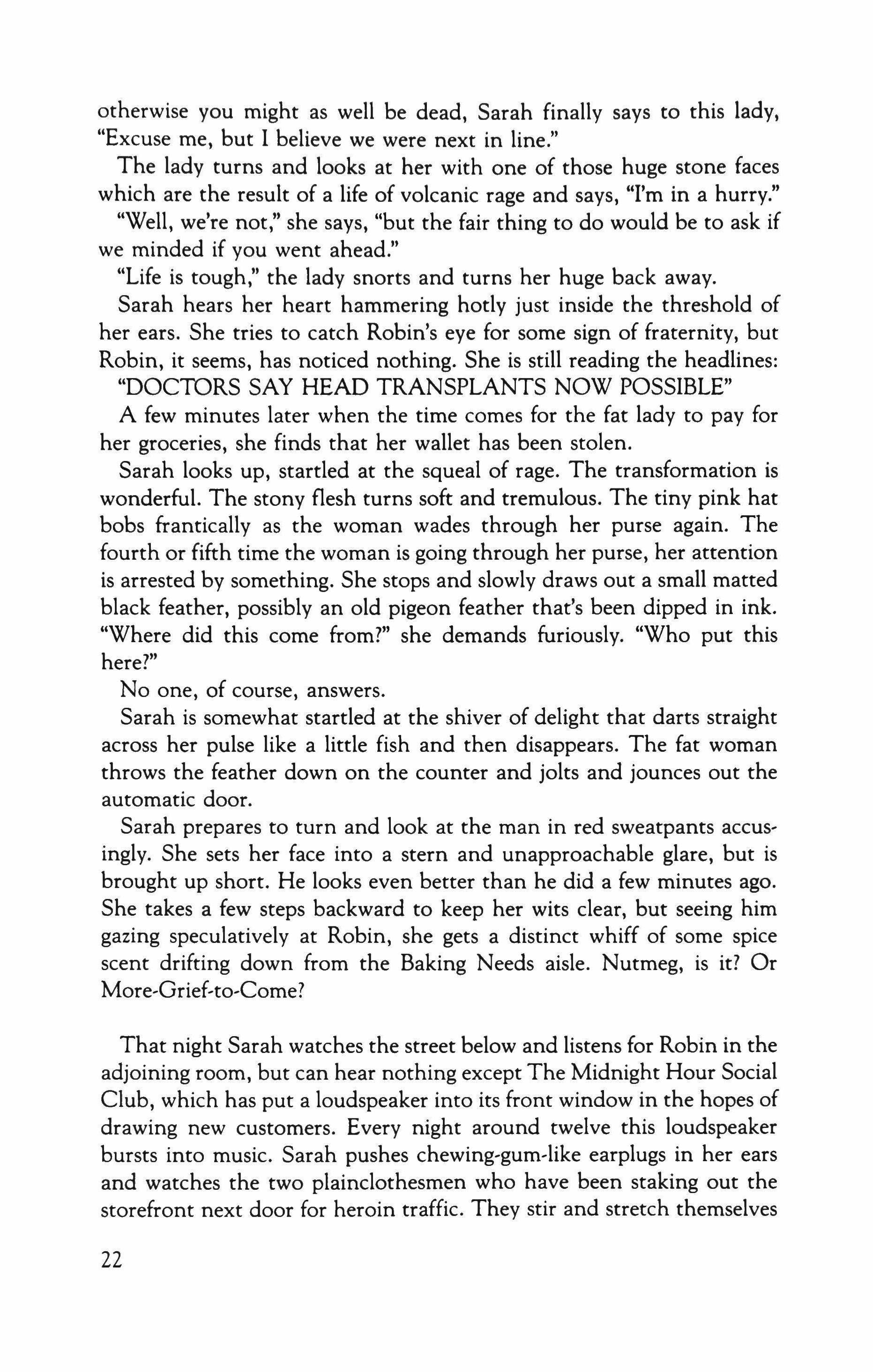
otherwise you might as well be dead, Sarah finally says to this lady, "Excuse me, but I believe we were next in line."
The lady turns and looks at her with one of those huge stone faces which are the result of a life of volcanic rage and says, "I'm in a hurry."
"Well, we're not," she says, "but the fair thing to do would be to ask if we minded if you went ahead."
"Life is tough," the lady snorts and turns her huge back away.
Sarah hears her heart hammering hotly just inside the threshold of her ears. She tries to catch Robin's eye for some sign of fraternity, but Robin, it seems, has noticed nothing. She is still reading the headlines:
"DOCTORS
SAY HEAD TRANSPLANTS NOW POSSIBLE"
A few minutes later when the time comes for the fat lady to pay for her groceries, she finds that her wallet has been stolen.
Sarah looks up, startled at the squeal of rage. The transformation is wonderful. The stony flesh turns soft and tremulous. The tiny pink hat bobs frantically as the woman wades through her purse again. The fourth or fifth time the woman is going through her purse, her attention is arrested by something. She stops and slowly draws out a small matted black feather, possibly an old pigeon feather that's been dipped in ink. "Where did this come from?" she demands furiously. "Who put this here?"
No one, of course, answers.
Sarah is somewhat startled at the shiver of delight that darts straight across her pulse like a little fish and then disappears. The fat woman throws the feather down on the counter and jolts and jounces out the automatic door.
Sarah prepares to turn and look at the man in red sweatpants accusingly. She sets her face into a stern and unapproachable glare, but is brought up short. He looks even better than he did a few minutes ago. She takes a few steps backward to keep her wits clear, but seeing him gazing speculatively at Robin, she gets a distinct whiff of some spice scent drifting down from the Baking Needs aisle. Nutmeg, is it? Or More-Grief-to-Come!
That night Sarah watches the street below and listens for Robin in the adjoining room, but can hear nothing except The Midnight Hour Social Club, which has put a loudspeaker into its front window in the hopes of drawing new customers. Every night around twelve this loudspeaker bursts into music. Sarah pushes chewing-gum-like earplugs in her ears and watches the two plainclothesmen who have been staking out the storefront next door for heroin traffic. They stir and stretch themselves
22
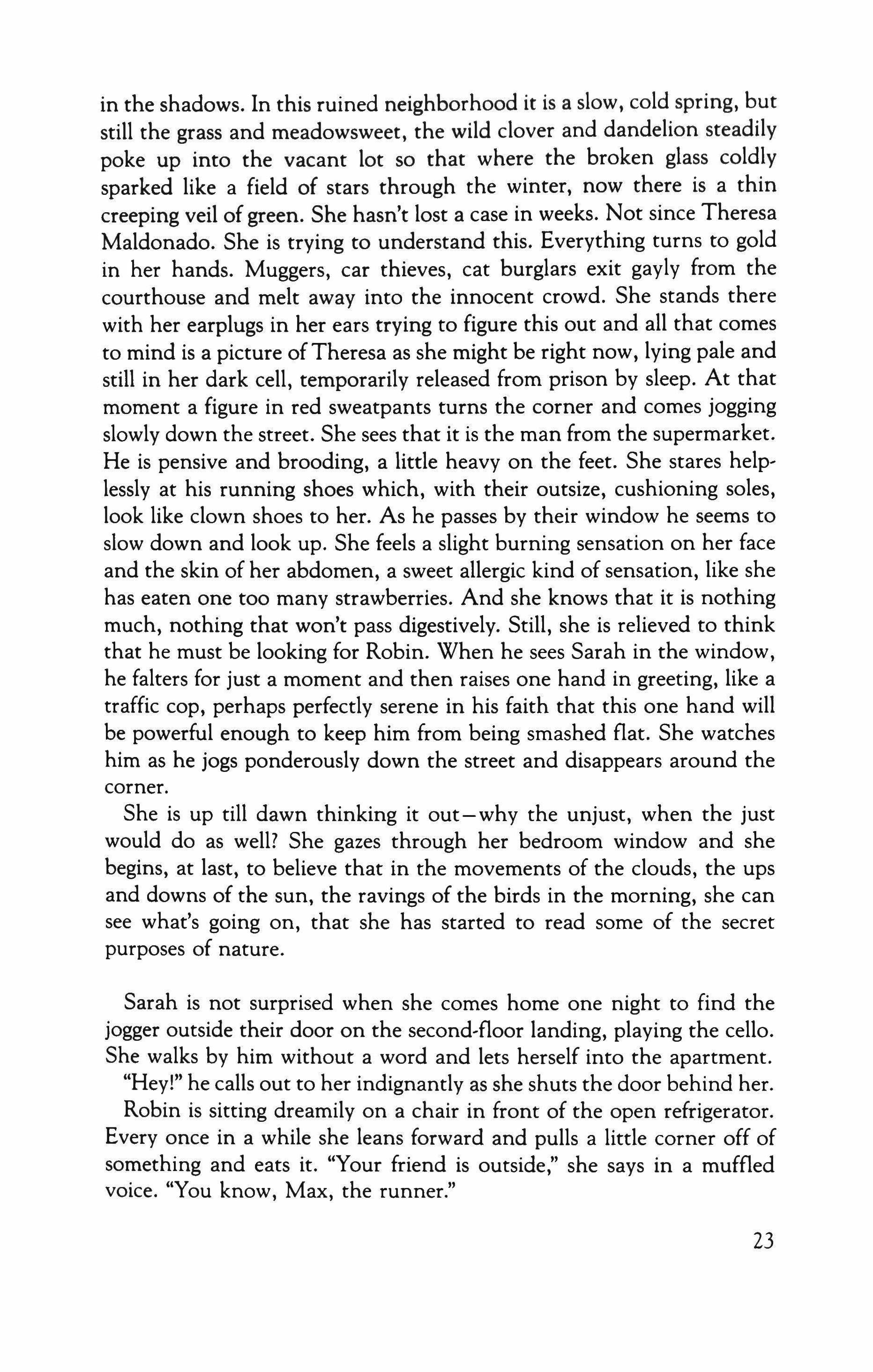
in the shadows. In this ruined neighborhood it is a slow, cold spring, but still the grass and meadowsweet, the wild clover and dandelion steadily poke up into the vacant lot so that where the broken glass coldly sparked like a field of stars through the winter, now there is a thin creeping veil of green. She hasn't lost a case in weeks. Not since Theresa Maldonado. She is trying to understand this. Everything turns to gold in her hands. Muggers, car thieves, cat burglars exit gayly from the courthouse and melt away into the innocent crowd. She stands there with her earplugs in her ears trying to figure this out and all that comes to mind is a picture ofTheresa as she might be right now, lying pale and still in her dark cell, temporarily released from prison by sleep. At that moment a figure in red sweatpants turns the corner and comes jogging slowly down the street. She sees that it is the man from the supermarket. He is pensive and brooding, a little heavy on the feet. She stares helplessly at his running shoes which, with their outsize, cushioning soles, look like clown shoes to her. As he passes by their window he seems to slow down and look up. She feels a slight burning sensation on her face and the skin of her abdomen, a sweet allergic kind of sensation, like she has eaten one too many strawberries. And she knows that it is nothing much, nothing that won't pass digestively. Still, she is relieved to think that he must be looking for Robin. When he sees Sarah in the window, he falters for just a moment and then raises one hand in greeting, like a traffic cop, perhaps perfectly serene in his faith that this one hand will be powerful enough to keep him from being smashed flat. She watches him as he jogs ponderously down the street and disappears around the corner.
She is up till dawn thinking it out - why the unjust, when the just would do as well? She gazes through her bedroom window and she begins, at last, to believe that in the movements of the clouds, the ups and downs of the sun, the ravings of the birds in the morning, she can see what's going on, that she has started to read some of the secret purposes of nature.
Sarah is not surprised when she comes home one night to find the jogger outside their door on the second-floor landing, playing the cello. She walks by him without a word and lets herself into the apartment. "Hey!" he calls out to her indignantly as she shuts the door behind her. Robin is sitting dreamily on a chair in front of the open refrigerator. Every once in a while she leans forward and pulls a little corner off of something and eats it. "Your friend is outside," she says in a muffled voice. "You know, Max, the runner."
23

"Please don't pick like that," Sarah says. "It makes my skin crawl. Just take something out and eat it. A whole thing of something." Sarah knows that this request will not be honored. Robin needs to pick as a way of getting around her mother who is now dead. But in order to please Sarah she tries. She slowly carries a whole cantaloupe on a blueand-white plate over to the sofa and lies down and cuts herself a tiny slice. She takes a rest and after that she eats another tiny slice. In the hallway, Max stops to tune his cello and then starts up again. Sarah shifts her gaze and stares in fascination at the pattern of blue-and-white roses marching around the circumference of the chipped plate. She understands that the non-causally-related objects in the area around you will generally confirm the true state of your mind. They might even predict the culmination of things if you know how to pay attention. Sarah imagines that she will be able to read the whole ruthless future here in these roses and she rejoices grimly at the power she thinks she is beginning to muster over all these secret things.
"I hope you looked for a job," Sarah says, certain that Robin has barely moved all day, knowing how easily she is transfixed now by motes of light or little cracks in the wall.
"Actually, I've been very busy, but I can't take just any job, you know. I can't concentrate well and, besides, I have to keep my feet off the ground."
Sarah knows better than to ask why this is so. "Well, then I hope you looked for a job where you can keep your feet off the floor."
"I suppose you mean a paying job. There's lots of ways to get paid, you know. I'd work for certain valuable sorts of information."
Sarah comes and stands behind Robin's head and pulls gently on her long, almost black, hair. "What is it you would consider valuable information?"
Robin looks up at Sarah and says seriously, "Well, for one thing, I'd like to know if there really are accurate records kept of everybody's good and evil deeds and to what use these records are put and I'd also like to know what happens when you die. Though there's other ways to get paid. For instance, Martin Burnbauer, my ex-husband, used to often barter the jewelry he made for things he needed-vegetables or beans. Once he got a wisdom tooth extracted in exchange for a silver bracelet."
Sarah frowns in annoyance and lets go of Robin's hair. "I don't want to hear about that creep, Burnbauer. He's gone now and good riddance. Why do you always want to be talking about him?"
A fat tear, blue against the light of the plate on her chest, slips down Robin's face and dangles clownishly from her chin.
24
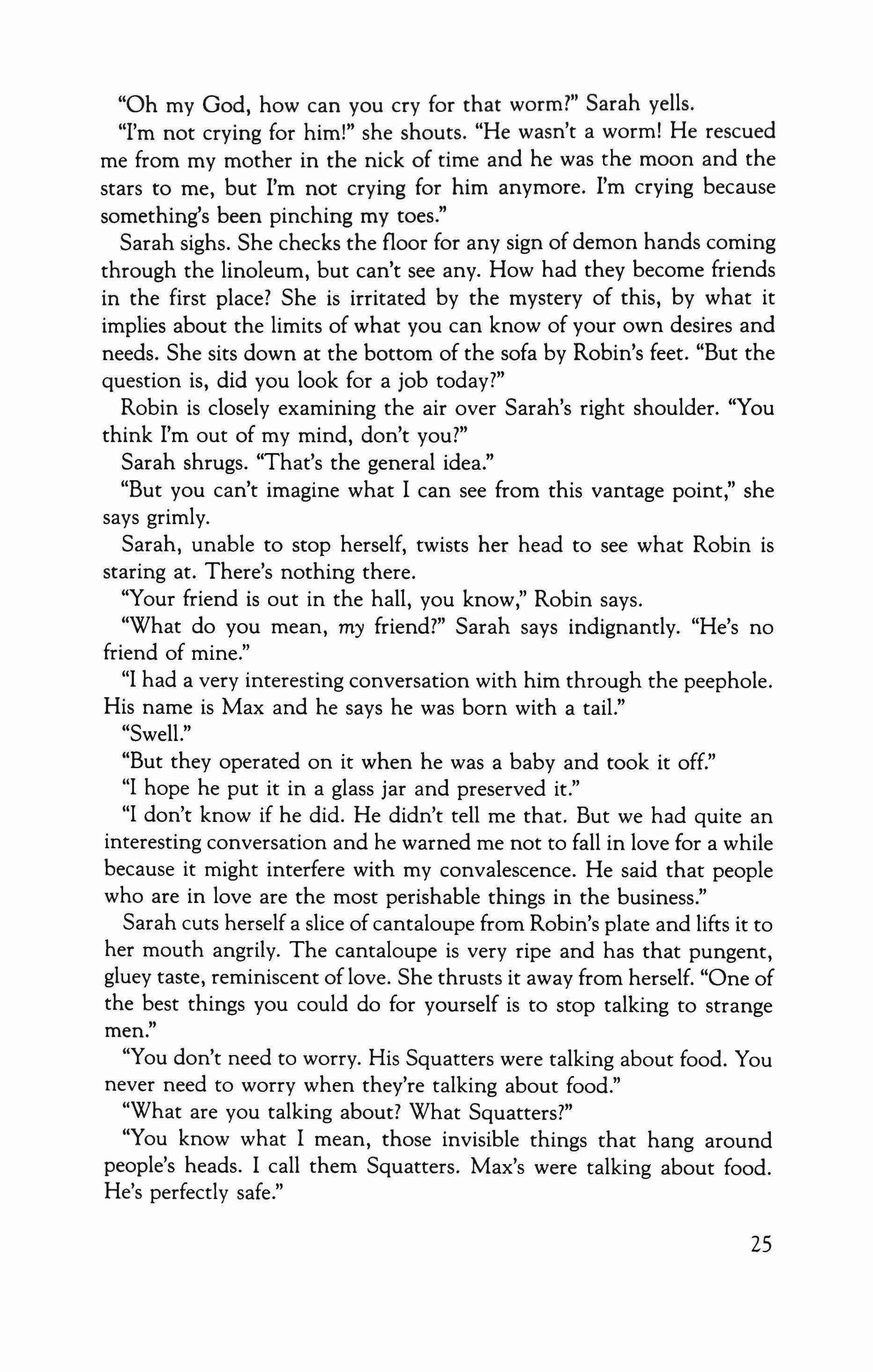
"Oh my God, how can you cry for that worm?" Sarah yells. "I'm not crying for him!" she shouts. "He wasn't a worm! He rescued me from my mother in the nick of time and he was the moon and the stars to me, but I'm not crying for him anymore. I'm crying because something's been pinching my toes."
Sarah sighs. She checks the floor for any sign of demon hands coming through the linoleum, but can't see any. How had they become friends in the first place? She is irritated by the mystery of this, by what it implies about the limits of what you can know of your own desires and needs. She sits down at the bottom of the sofa by Robin's feet. "But the question is, did you look for a job today?"
Robin is closely examining the air over Sarah's right shoulder. "You think I'm out of my mind, don't you?"
Sarah shrugs. "That's the general idea."
"But you can't imagine what I can see from this vantage point," she says grimly.
Sarah, unable to stop herself, twists her head to see what Robin is staring at. There's nothing there.
"Your friend is out in the hall, you know," Robin says. "What do you mean, my friend?" Sarah says indignantly. "He's no friend of mine."
"I had a very interesting conversation with him through the peephole. His name is Max and he says he was born with a tail."
"Swell."
"But they operated on it when he was a baby and took it off."
"I hope he put it in a glass jar and preserved it."
"I don't know if he did. He didn't tell me that. But we had quite an interesting conversation and he warned me not to fall in love for a while because it might interfere with my convalescence. He said that people who are in love are the most perishable things in the business."
Sarah cuts herself a slice of cantaloupe from Robin's plate and lifts it to her mouth angrily. The cantaloupe is very ripe and has that pungent, gluey taste, reminiscent oflove. She thrusts it away from herself. "One of the best things you could do for yourself is to stop talking to strange men."
"You don't need to worry. His Squatters were talking about food. You never need to worry when they're talking about food."
"What are you talking about? What Squatters?"
"You know what I mean, those invisible things that hang around people's heads. I call them Squatters. Max's were talking about food. He's perfectly safe."
25
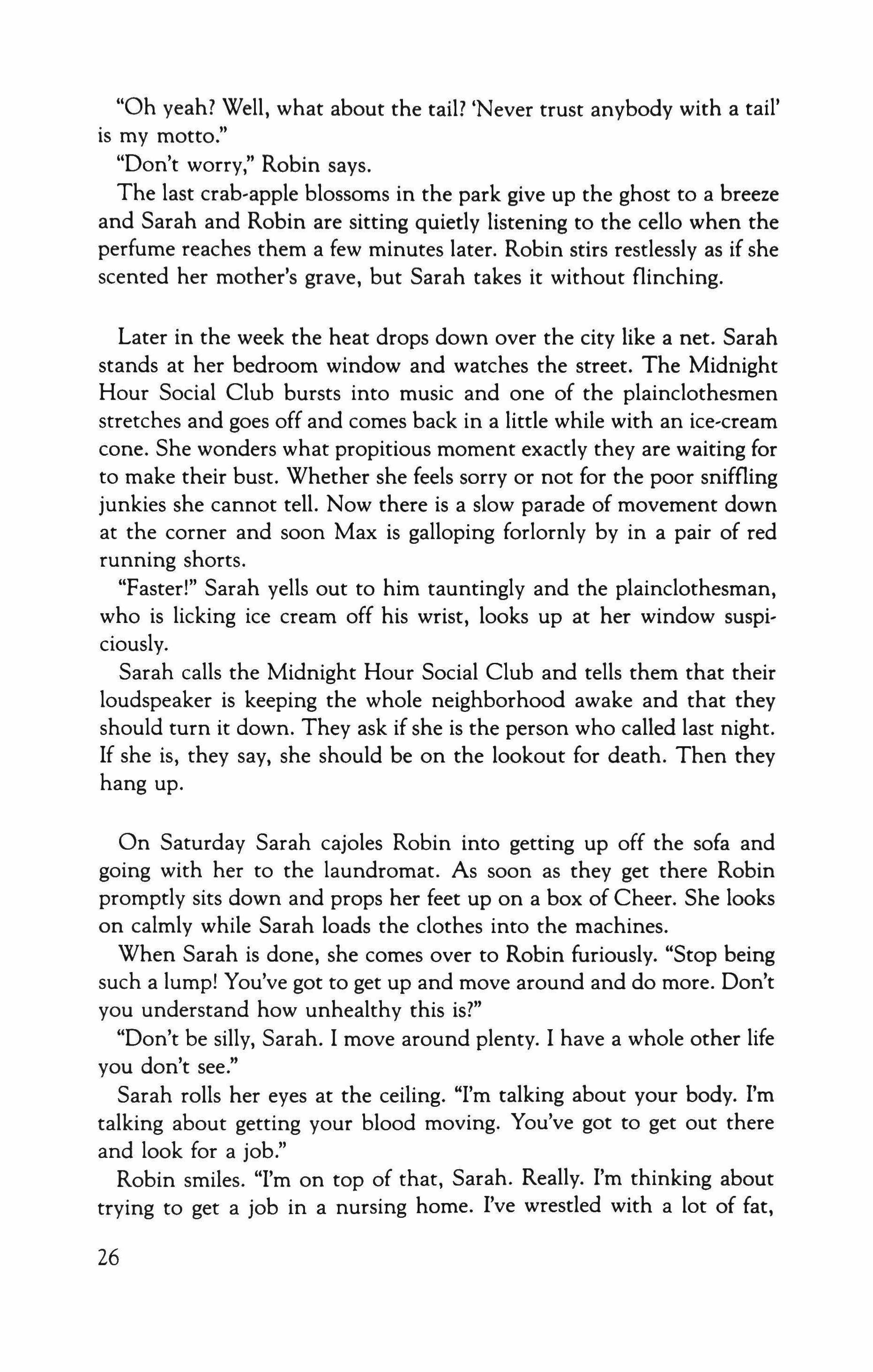
"Oh yeah? Well, what about the tail? 'Never trust anybody with a tail' is my motto."
"Don't worry," Robin says.
The last crab-apple blossoms in the park give up the ghost to a breeze and Sarah and Robin are sitting quietly listening to the cello when the perfume reaches them a few minutes later. Robin stirs restlessly as if she scented her mother's grave, but Sarah takes it without flinching.
Later in the week the heat drops down over the city like a net. Sarah stands at her bedroom window and watches the street. The Midnight Hour Social Club bursts into music and one of the plainclothesmen stretches and goes off and comes back in a little while with an ice-cream cone. She wonders what propitious moment exactly they are waiting for to make their bust. Whether she feels sorry or not for the poor sniffling junkies she cannot tell. Now there is a slow parade of movement down at the corner and soon Max is galloping forlornly by in a pair of red running shorts.
"Faster!" Sarah yells out to him tauntingly and the plainclothesman, who is licking ice cream off his wrist, looks up at her window suspiciously.
Sarah calls the Midnight Hour Social Club and tells them that their loudspeaker is keeping the whole neighborhood awake and that they should turn it down. They ask if she is the person who called last night. If she is, they say, she should be on the lookout for death. Then they hang up.
On Saturday Sarah cajoles Robin into getting up off the sofa and going with her to the laundromat. As soon as they get there Robin promptly sits down and props her feet up on a box of Cheer. She looks on calmly while Sarah loads the clothes into the machines.
When Sarah is done, she comes over to Robin furiously. "Stop being such a lump! You've got to get up and move around and do more. Don't you understand how unhealthy this is?"
"Don't be silly, Sarah. I move around plenty. I have a whole other life you don't see."
Sarah rolls her eyes at the ceiling. "I'm talking about your body. I'm talking about getting your blood moving. You've got to get out there and look for a job."
Robin smiles. "I'm on top of that, Sarah. Really. I'm thinking about trying to get a job in a nursing home. I've wrestled with a lot of fat,
26
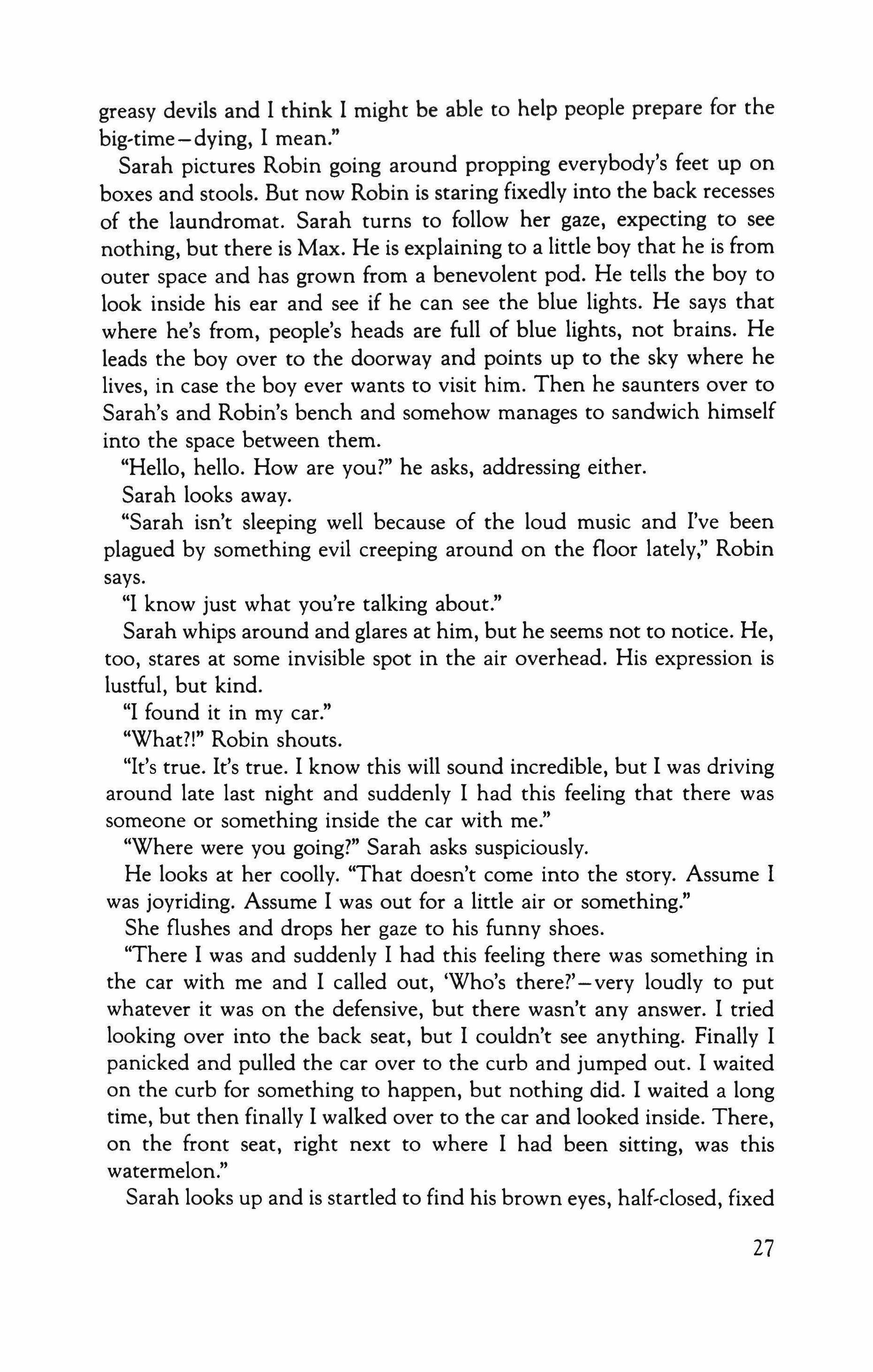
greasy devils and 1 think 1 might be able to help people prepare for the big-time=dving, 1 mean."
Sarah pictures Robin going around propping everybody's feet up on boxes and stools. But now Robin is staring fixedly into the back recesses of the laundromat. Sarah turns to follow her gaze, expecting to see nothing, but there is Max. He is explaining to a little boy that he is from outer space and has grown from a benevolent pod. He tells the boy to look inside his ear and see if he can see the blue lights. He says that where he's from, people's heads are full of blue lights, not brains. He leads the boy over to the doorway and points up to the sky where he lives, in case the boy ever wants to visit him. Then he saunters over to Sarah's and Robin's bench and somehow manages to sandwich himself into the space between them.
"Hello, hello. How are you?" he asks, addressing either.
Sarah looks away.
"Sarah isn't sleeping well because of the loud music and I've been plagued by something evil creeping around on the floor lately," Robin says.
"1 know just what you're talking about."
Sarah whips around and glares at him, but he seems not to notice. He, too, stares at some invisible spot in the air overhead. His expression is lustful, but kind.
"1 found it in my car."
"What?!" Robin shouts.
"It's true. It's true. 1 know this will sound incredible, but I was driving around late last night and suddenly I had this feeling that there was someone or something inside the car with me."
"Where were you going?" Sarah asks suspiciously.
He looks at her coolly. "That doesn't come into the story. Assume I was joyriding. Assume I was out for a little air or something."
She flushes and drops her gaze to his funny shoes.
"There I was and suddenly I had this feeling there was something in the car with me and I called out, 'Who's there?'-very loudly to put whatever it was on the defensive, but there wasn't any answer. I tried looking over into the back seat, but I couldn't see anything. Finally I panicked and pulled the car over to the curb and jumped out. I waited on the curb for something to happen, but nothing did. I waited a long time, but then finally I walked over to the car and looked inside. There, on the front seat, right next to where I had been sitting, was this watermelon."
Sarah looks up and is startled to find his brown eyes, half-closed, fixed
27
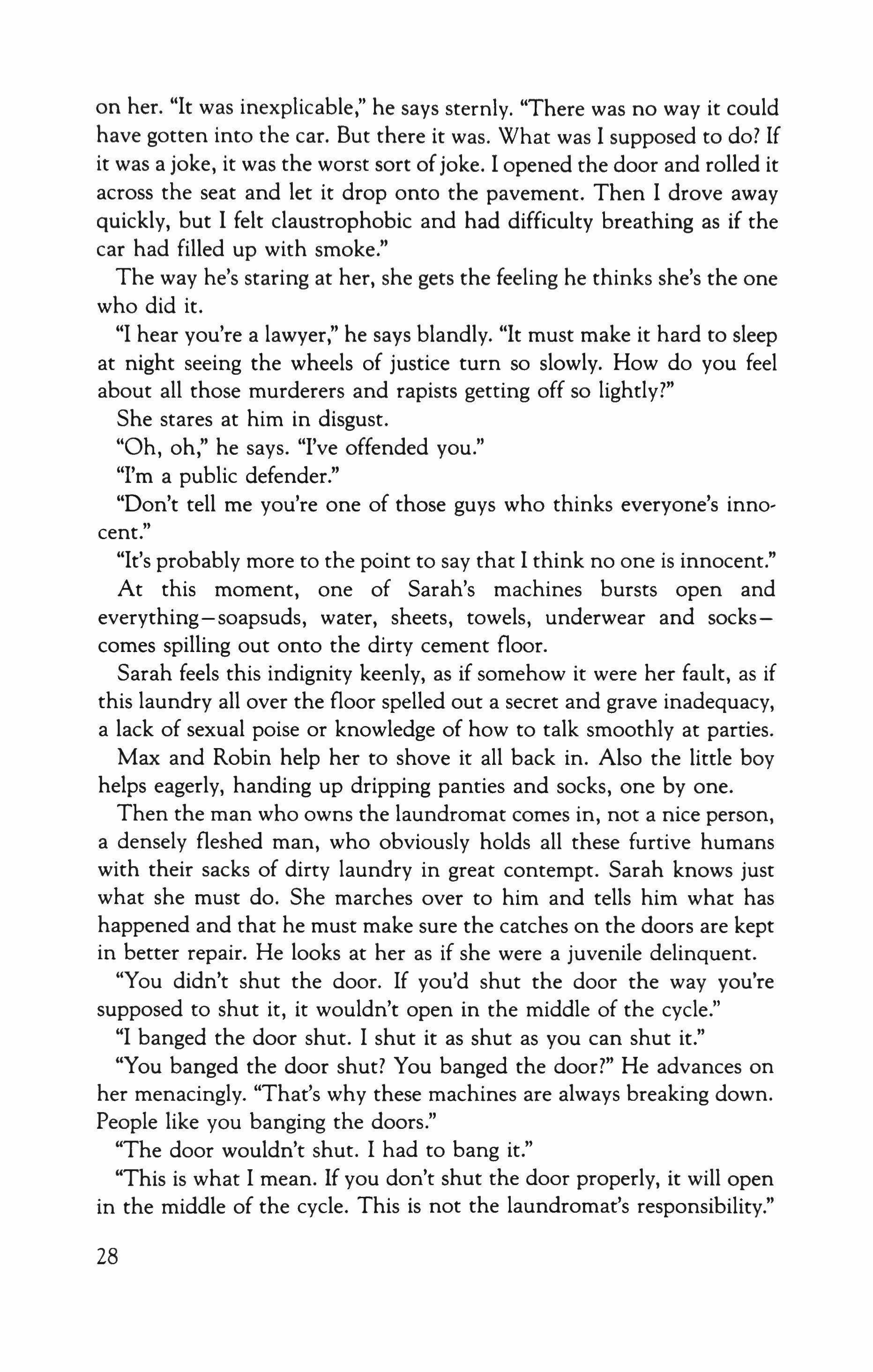
on her. "It was inexplicable," he says sternly. "There was no way it could have gotten into the car. But there it was. What was I supposed to do? If it was a joke, it was the worst sort ofjoke. I opened the door and rolled it across the seat and let it drop onto the pavement. Then I drove away quickly, but I felt claustrophobic and had difficulty breathing as if the car had filled up with smoke."
The way he's staring at her, she gets the feeling he thinks she's the one who did it.
"I hear you're a lawyer," he says blandly. "It must make it hard to sleep at night seeing the wheels of justice turn so slowly. How do you feel about all those murderers and rapists getting off so lightly?"
She stares at him in disgust.
"Oh, oh," he says. "I've offended you."
"I'm a public defender."
"Don't tell me you're one of those guys who thinks everyone's innocent."
"It's probably more to the point to say that I think no one is innocent."
At this moment, one of Sarah's machines bursts open and everything-soapsuds, water, sheets, towels, underwear and sockscomes spilling out onto the dirty cement floor.
Sarah feels this indignity keenly, as if somehow it were her fault, as if this laundry all over the floor spelled out a secret and grave inadequacy, a lack of sexual poise or knowledge of how to talk smoothly at parties.
Max and Robin help her to shove it all back in. Also the little boy helps eagerly, handing up dripping panties and socks, one by one.
Then the man who owns the laundromat comes in, not a nice person, a densely fleshed man, who obviously holds all these furtive humans with their sacks of dirty laundry in great contempt. Sarah knows just what she must do. She marches over to him and tells him what has happened and that he must make sure the catches on the doors are kept in better repair. He looks at her as if she were a juvenile delinquent.
"You didn't shut the door. If you'd shut the door the way you're supposed to shut it, it wouldn't open in the middle of the cycle."
"I banged the door shut. I shut it as shut as you can shut it."
"You banged the door shut? You banged the door?" He advances on her menacingly. "That's why these machines are always breaking down. People like you banging the doors."
"The door wouldn't shut. I had to bang it."
"This is what I mean. If you don't shut the door properly, it will open in the middle of the cycle. This is not the laundromat's responsibility."
28
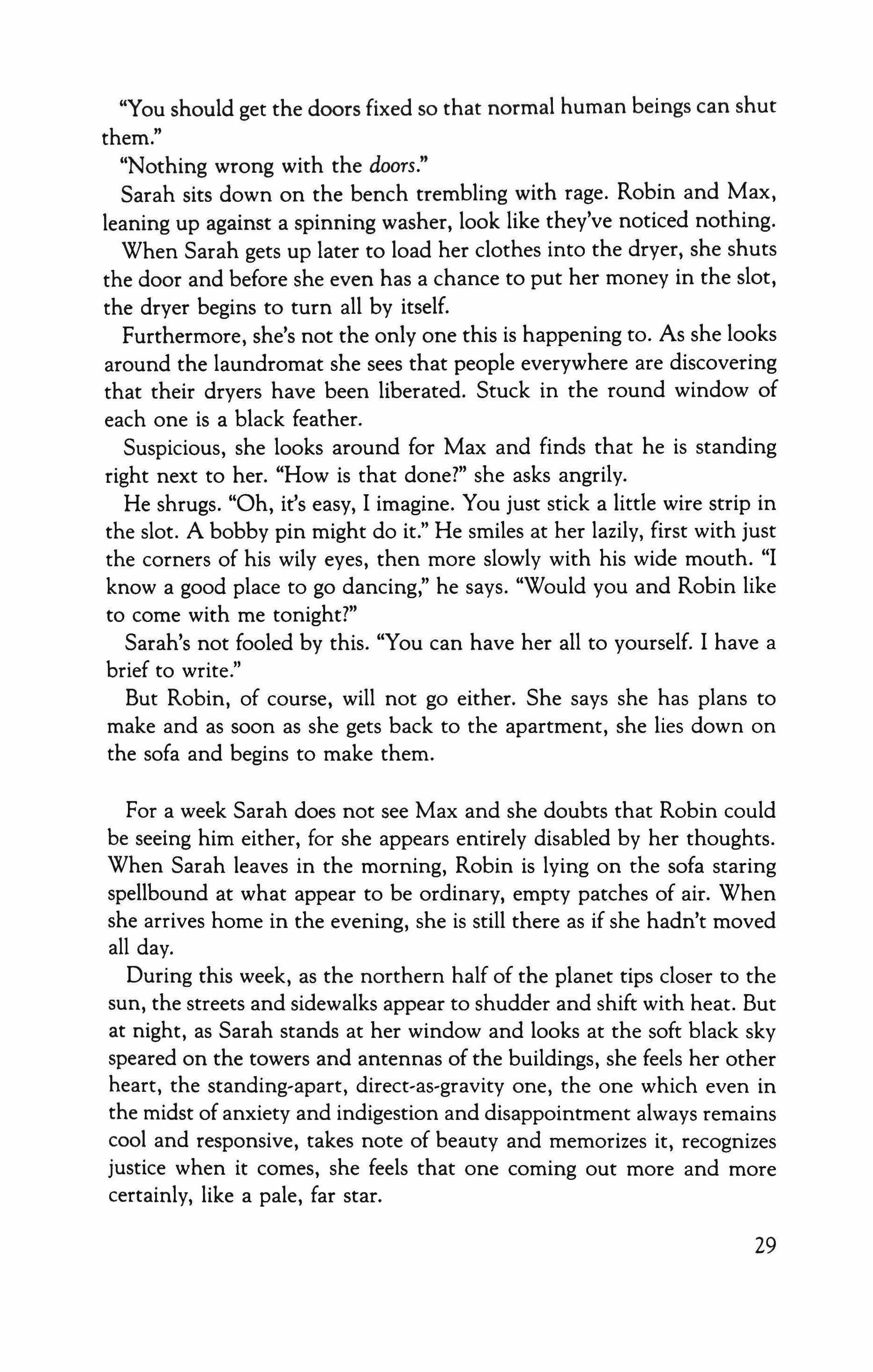
"You should get the doors fixed so that normal human beings can shut them."
"Nothing wrong with the doors."
Sarah sits down on the bench trembling with rage. Robin and Max, leaning up against a spinning washer, look like they've noticed nothing. When Sarah gets up later to load her clothes into the dryer, she shuts the door and before she even has a chance to put her money in the slot, the dryer begins to turn all by itself.
Furthermore, she's not the only one this is happening to. As she looks around the laundromat she sees that people everywhere are discovering that their dryers have been liberated. Stuck in the round window of each one is a black feather.
Suspicious, she looks around for Max and finds that he is standing right next to her. "How is that done?" she asks angrily.
He shrugs. "Oh, it's easy, I imagine. You just stick a little wire strip in the slot. A bobby pin might do it." He smiles at her lazily, first with just the corners of his wily eyes, then more slowly with his wide mouth. "I know a good place to go dancing," he says. "Would you and Robin like to come with me tonight?"
Sarah's not fooled by this. "You can have her all to yourself. I have a brief to write."
But Robin, of course, will not go either. She says she has plans to make and as soon as she gets back to the apartment, she lies down on the sofa and begins to make them.
For a week Sarah does not see Max and she doubts that Robin could be seeing him either, for she appears entirely disabled by her thoughts. When Sarah leaves in the morning, Robin is lying on the sofa staring spellbound at what appear to be ordinary, empty patches of air. When she arrives home in the evening, she is still there as if she hadn't moved all day.
During this week, as the northern half of the planet tips closer to the sun, the streets and sidewalks appear to shudder and shift with heat. But at night, as Sarah stands at her window and looks at the soft black sky speared on the towers and antennas of the buildings, she feels her other heart, the standing-apart, direct-as-gravity one, the one which even in the midst of anxiety and indigestion and disappointment always remains cool and responsive, takes note of beauty and memorizes it, recognizes justice when it comes, she feels that one coming out more and more certainly, like a pale, far star.
29
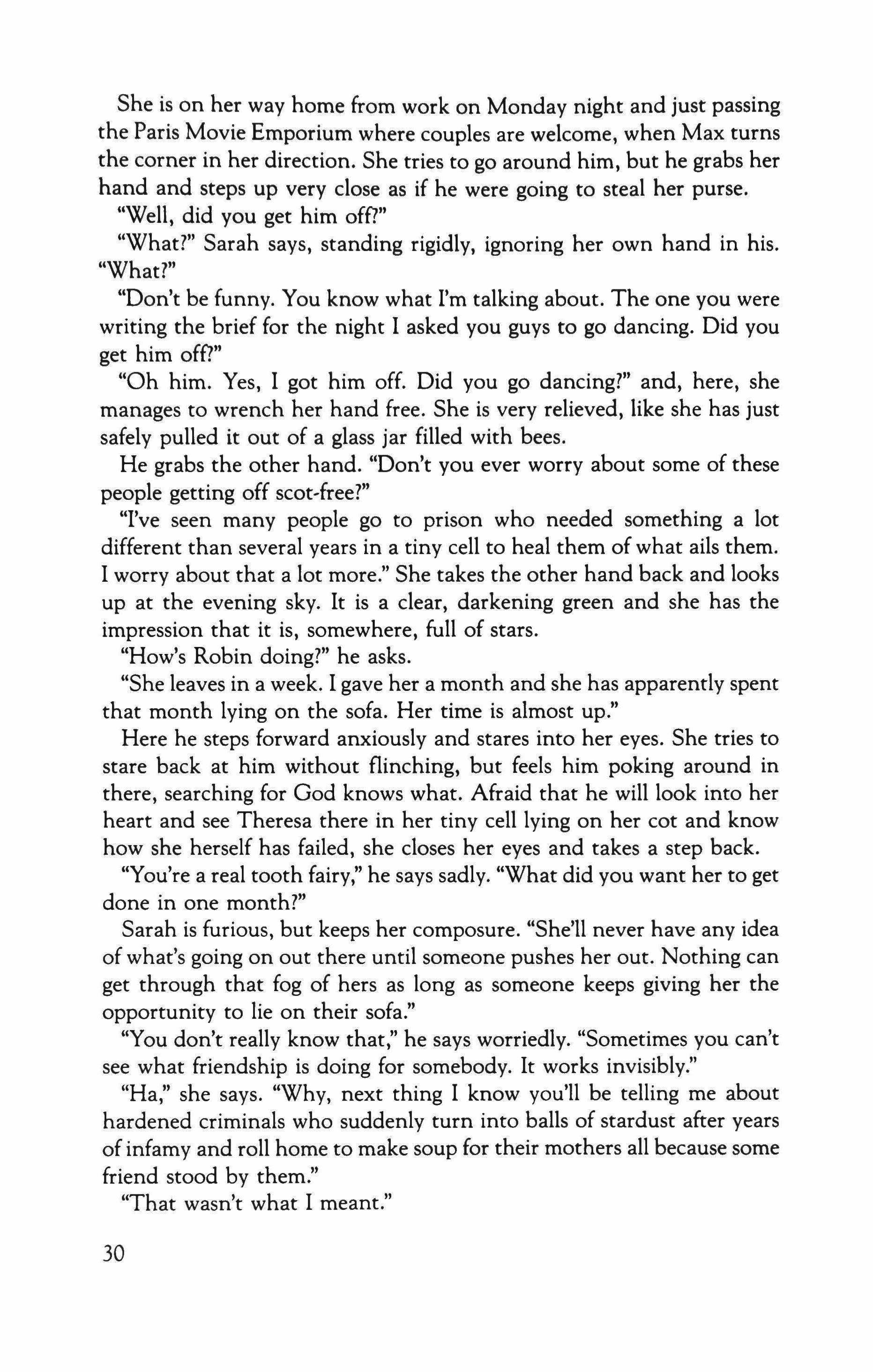
She is on her way home from work on Monday night and just passing the Paris Movie Emporium where couples are welcome, when Max turns the corner in her direction. She tries to go around him, but he grabs her hand and steps up very close as if he were going to steal her purse.
"Well, did you get him off?"
"What?" Sarah says, standing rigidly, ignoring her own hand in his. "What?"
"Don't be funny. You know what I'm talking about. The one you were writing the brief for the night I asked you guys to go dancing. Did you get him off?"
"Oh him. Yes, I got him off. Did you go dancing?" and, here, she manages to wrench her hand free. She is very relieved, like she has just safely pulled it out of a glass jar filled with bees.
He grabs the other hand. "Don't you ever worry about some of these people getting off scot-free?"
"I've seen many people go to prison who needed something a lot different than several years in a tiny cell to heal them of what ails them. I worry about that a lot more." She takes the other hand back and looks up at the evening sky. It is a clear, darkening green and she has the impression that it is, somewhere, full of stars.
"How's Robin doing?" he asks.
"She leaves in a week. I gave her a month and she has apparently spent that month lying on the sofa. Her time is almost up."
Here he steps forward anxiously and stares into her eyes. She tries to stare back at him without flinching, but feels him poking around in there, searching for God knows what. Afraid that he will look into her heart and see Theresa there in her tiny cell lying on her cot and know how she herself has failed, she closes her eyes and takes a step back.
"You're a real tooth fairy," he says sadly. "What did you want her to get done in one month?"
Sarah is furious, but keeps her composure. "She'll never have any idea of what's going on out there until someone pushes her out. Nothing can get through that fog of hers as long as someone keeps giving her the opportunity to lie on their sofa."
"You don't really know that," he says worriedly. "Sometimes you can't see what friendship is doing for somebody. It works invisibly."
"Ha," she says. "Why, next thing I know you'll be telling me about hardened criminals who suddenly turn into balls of stardust after years of infamy and roll home to make soup for their mothers all because some friend stood by them."
"That wasn't what I meant."
30
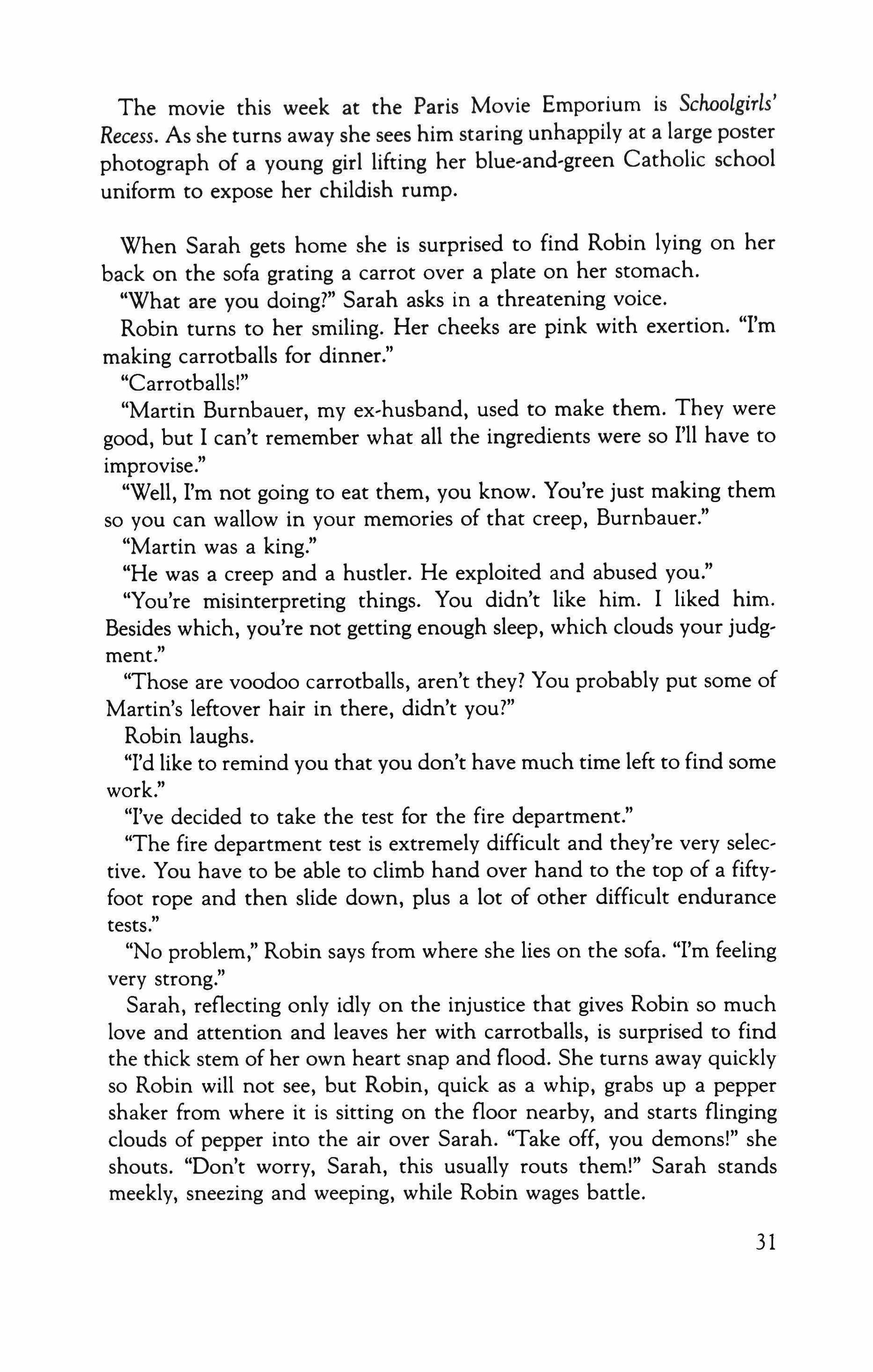
The movie this week at the Paris Movie Emporium is Schoolgirls' Recess. As she turns away she sees him staring unhappily at a large poster photograph of a young girl lifting her blue-and-green Catholic school uniform to expose her childish rump.
When Sarah gets home she is surprised to find Robin lying on her back on the sofa grating a carrot over a plate on her stomach.
"What are you doing?" Sarah asks in a threatening voice.
Robin turns to her smiling. Her cheeks are pink with exertion. "I'm making carrotballs for dinner."
"Carrotballs!"
"Martin Burnbauer, my ex-husband, used to make them. They were good, but I can't remember what all the ingredients were so I'll have to improvise."
"Well, I'm not going to eat them, you know. You're just making them so you can wallow in your memories of that creep, Burnbauer."
"Martin was a king."
"He was a creep and a hustler. He exploited and abused you."
"You're misinterpreting things. You didn't like him. I liked him. Besides which, you're not getting enough sleep, which clouds your judgment."
"Those are voodoo carrotballs, aren't they? You probably put some of Martin's leftover hair in there, didn't you?"
Robin laughs.
"I'd like to remind you that you don't have much time left to find some work."
"I've decided to take the test for the fire department."
"The fire department test is extremely difficult and they're very selective. You have to be able to climb hand over hand to the top of a fiftyfoot rope and then slide down, plus a lot of other difficult endurance tests."
"No problem," Robin says from where she lies on the sofa. "I'm feeling very strong."
Sarah, reflecting only idly on the injustice that gives Robin so much love and attention and leaves her with carrotballs, is surprised to find the thick stem of her own heart snap and flood. She turns away quickly so Robin will not see, but Robin, quick as a whip, grabs up a pepper shaker from where it is sitting on the floor nearby, and starts flinging clouds of pepper into the air over Sarah. "Take off, you demons!" she shouts. "Don't worry, Sarah, this usually routs them!" Sarah stands meekly, sneezing and weeping, while Robin wages battle.
31

When Sarah passes by the Paris Movie Emporium the next evening, she notices that the pictures on the billboards have been changed and she looks at them curiously to see what the new movie is to be about. Stuck in the top of one of the billboards is a black feather, and she is taken aback to find that all the new pictures are cutouts from women's magazines: banana-cream pies, brides, babies in diapers.
She and Robin sit out on the stoop that night and, to Sarah's disgust, she finds that all up and down the street, everyone is talking about The Black Feather. On this stoop there is a mother and baby from the third floor and some old ladies who fan themselves with tabloids. On the sidewalk in front of them, four men have just unfolded a folding table and are playing cards.
Sarah is juggling for the baby with an orange, a tennis ball and a small white leather shoe that has dropped off the baby's foot.
At first the conversation here ranges far and wide as if they could look into a glass ball and see all those tiny, sinister Russians lining the streets of Moscow or as if they could zoom right into the living room of that family where the little boy pushed his sister out the fifth-floor window, but eventually it comes round to The Black Feather.
"He makes Sarah want to spit," Robin says confidentially to the old ladies.
"Why's that?" asks the young mother, listening in.
Sarah lets the objects she is juggling fall to the ground and she glares furiously at everyone on the stoop. "Because these are just childish revenges. If you want to make people kinder and better behaved towards each other you have to make them feel welcome in the world. Revenge just makes everybody dig themselves in deeper."
"Well, I don't know," says the young mother, "sometimes I think it cheers people up and lets them get on with things."
"Oh boy," says Sarah. "Don't you see this Black Feather guy is probably just making greedier people greedier and dangerous people more dangerous. And he's certainly not doing anything to further his own course of self-improvement,"
"How do you know he's a he?" asks one of the old ladies scornfully.
Sarah shrugs, but the baby, reclining on the stoop in a paper diaper, stares up at her with that perspicaciousness of those who speak no language. Blushing, she picks up the orange, the tennis ball and the baby shoe and begins to juggle again. For a moment, the objects hang shining and suspended in the light of the streetlamp. She sees the plainclothesmen in the shadows staring suspiciously into the air at these flying items.
32
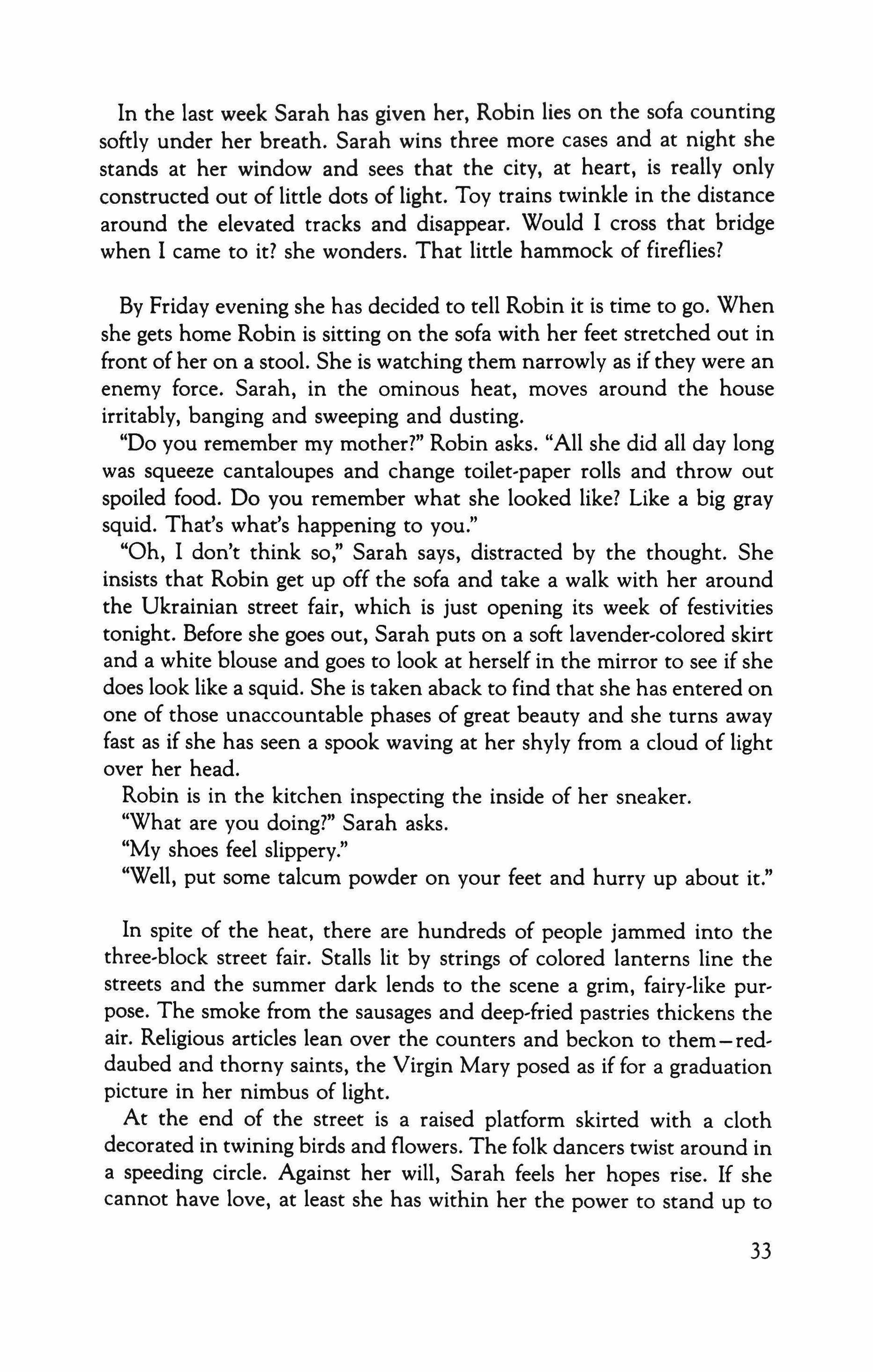
In the last week Sarah has given her, Robin lies on the sofa counting softly under her breath. Sarah wins three more cases and at night she stands at her window and sees that the city, at heart, is really only constructed out of little dots of light. Toy trains twinkle in the distance around the elevated tracks and disappear. Would I cross that bridge when I came to it? she wonders. That little hammock of fireflies?
By Friday evening she has decided to tell Robin it is time to go. When she gets home Robin is sitting on the sofa with her feet stretched out in front of her on a stool. She is watching them narrowly as if they were an enemy force. Sarah, in the ominous heat, moves around the house irritably, banging and sweeping and dusting.
"Do you remember my mother?" Robin asks. "All she did all day long was squeeze cantaloupes and change toilet-paper rolls and throw out spoiled food. Do you remember what she looked like? Like a big gray squid. That's what's happening to you."
"Oh, I don't think so," Sarah says, distracted by the thought. She insists that Robin get up off the sofa and take a walk with her around the Ukrainian street fair, which is just opening its week of festivities tonight. Before she goes out, Sarah puts on a soft lavender-colored skirt and a white blouse and goes to look at herself in the mirror to see if she does look like a squid. She is taken aback to find that she has entered on one of those unaccountable phases of great beauty and she turns away fast as if she has seen a spook waving at her shyly from a cloud of light over her head.
Robin is in the kitchen inspecting the inside of her sneaker.
"What are you doing?" Sarah asks.
"My shoes feel slippery."
"Well, put some talcum powder on your feet and hurry up about it."
In spite of the heat, there are hundreds of people jammed into the three-block street fair. Stalls lit by strings of colored lanterns line the streets and the summer dark lends to the scene a grim, fairy-like purpose. The smoke from the sausages and deep-fried pastries thickens the air. Religious articles lean over the counters and beckon to them - reddaubed and thorny saints, the Virgin Mary posed as if for a graduation picture in her nimbus of light.
At the end of the street is a raised platform skirted with a cloth decorated in twining birds and flowers. The folk dancers twist around in a speeding circle. Against her will, Sarah feels her hopes rise. If she cannot have love, at least she has within her the power to stand up to
33

the anarchy and disorder of the world, to name what is fair and bear it company.
Behind her she hears Robin cry out as if she saw something coming too. When Sarah turns she sees a little boy, perhaps four years old, standing in front of them, stock still in terror. Obviously lost, he scans the crowd desperately with dark, bright eyes. He seems to feel instinctively, like a bird that has flipped prematurely out of its nest and crashed into the grass, that he had better not move. He whimpers and tries to look around without moving his head. He is dressed to kill with a plastic sword tucked into his black pirate sash and a red bandanna tied around his head.
Sarah is tempted by doubt as she stands there. It seems to her that she sees the expanding and contracting universe replaying this scene, mercilessly, again and again. At last, however, she takes a step towards him. Out of the corner of her eye, she sees Robin step forward too. Before they can reach him, his mother appears.
They know she is the mother because she is holding in her hand a plastic pirate ship. Her pink sundress is too tight and the straps cut into the soft flesh over her breast. She is scanning the crowd desperately and her eyes are strained with fear, but when she sees the child at last, all emotion seems to drain out of her face. It goes dead and white. She rushes over to the boy and grabs his arm and with the back of her hand, slaps his face.
"Didn't I tell you to stay with me?" She slaps him again. "Didn't I?"
The little boy, at the sight of the white, blank face bending over him, closes his eyes. He whimpers each time she hits him, but other than that, stands quite still. The tiny sight of him standing there without resistance drives his mother into a fury and she slaps the side of his head.
"Do you hear me? Do you hear me?"
He nods yes, but doesn't say a word. He is concentrating on some far black sail on the blue horizon.
Sarah hears Robin give a long low hiss, but when all the breath is gone from her lungs, she seems to slump and turn away. Although this scene is taking place right here, off the curb, the space surrounding this mother and child appears theatrically bright and far away, and the great crowd on the street seems to squint and lean forward as if they watched from a high balcony.
Someone has to explain this to me, Sarah thinks. These terrible gaps in the world with no pity in them. How all around the earth tonight there are little rooms noisy with pain where torturers crush their victims'
34
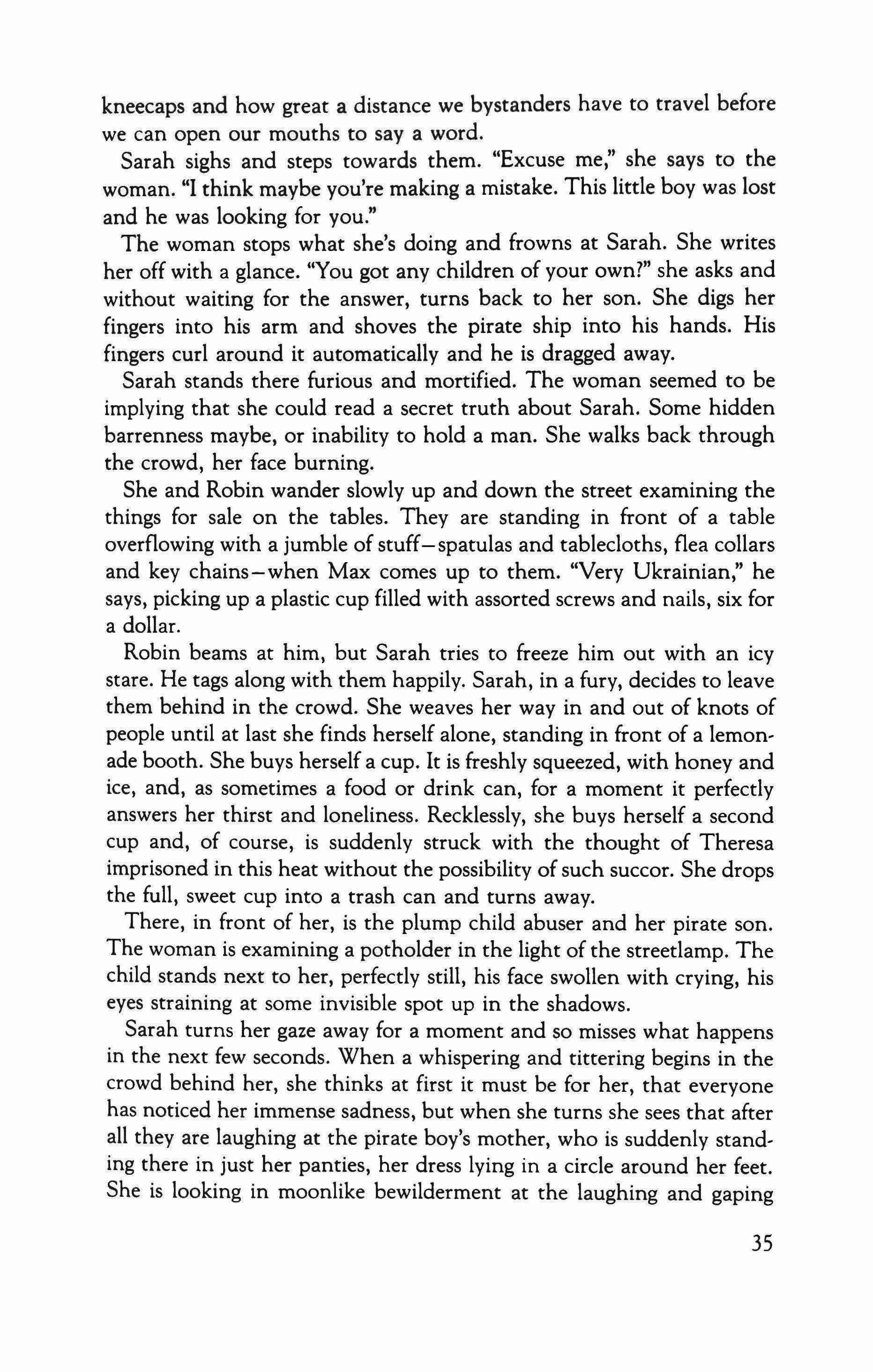
kneecaps and how great a distance we bystanders have to travel before we can open our mouths to say a word.
Sarah sighs and steps towards them. "Excuse me," she says to the woman. "I think maybe you're making a mistake. This little boy was lost and he was looking for you."
The woman stops what she's doing and frowns at Sarah. She writes her off with a glance. "You got any children of your own?" she asks and without waiting for the answer, turns back to her son. She digs her fingers into his arm and shoves the pirate ship into his hands. His fingers curl around it automatically and he is dragged away.
Sarah stands there furious and mortified. The woman seemed to be implying that she could read a secret truth about Sarah. Some hidden barrenness maybe, or inability to hold a man. She walks back through the crowd, her face burning.
She and Robin wander slowly up and down the street examining the things for sale on the tables. They are standing in front of a table overflowing with a jumble of stuff-spatulas and tablecloths, flea collars and key chains-when Max comes up to them. "Very Ukrainian," he says, picking up a plastic cup filled with assorted screws and nails, six for a dollar.
Robin beams at him, but Sarah tries to freeze him out with an icy stare. He tags along with them happily. Sarah, in a fury, decides to leave them behind in the crowd. She weaves her way in and out of knots of people until at last she finds herself alone, standing in front of a lemonade booth. She buys herself a cup. It is freshly squeezed, with honey and ice, and, as sometimes a food or drink can, for a moment it perfectly answers her thirst and loneliness. Recklessly, she buys herself a second cup and, of course, is suddenly struck with the thought of Theresa imprisoned in this heat without the possibility of such succor. She drops the full, sweet cup into a trash can and turns away.
There, in front of her, is the plump child abuser and her pirate son. The woman is examining a potholder in the light of the streetlamp. The child stands next to her, perfectly still, his face swollen with crying, his eyes straining at some invisible spot up in the shadows.
Sarah turns her gaze away for a moment and so misses what happens in the next few seconds. When a whispering and tittering begins in the crowd behind her, she thinks at first it must be for her, that everyone has noticed her immense sadness, but when she turns she sees that after all they are laughing at the pirate boy's mother, who is suddenly standing there in just her panties, her dress lying in a circle around her feet. She is looking in moonlike bewilderment at the laughing and gaping
35
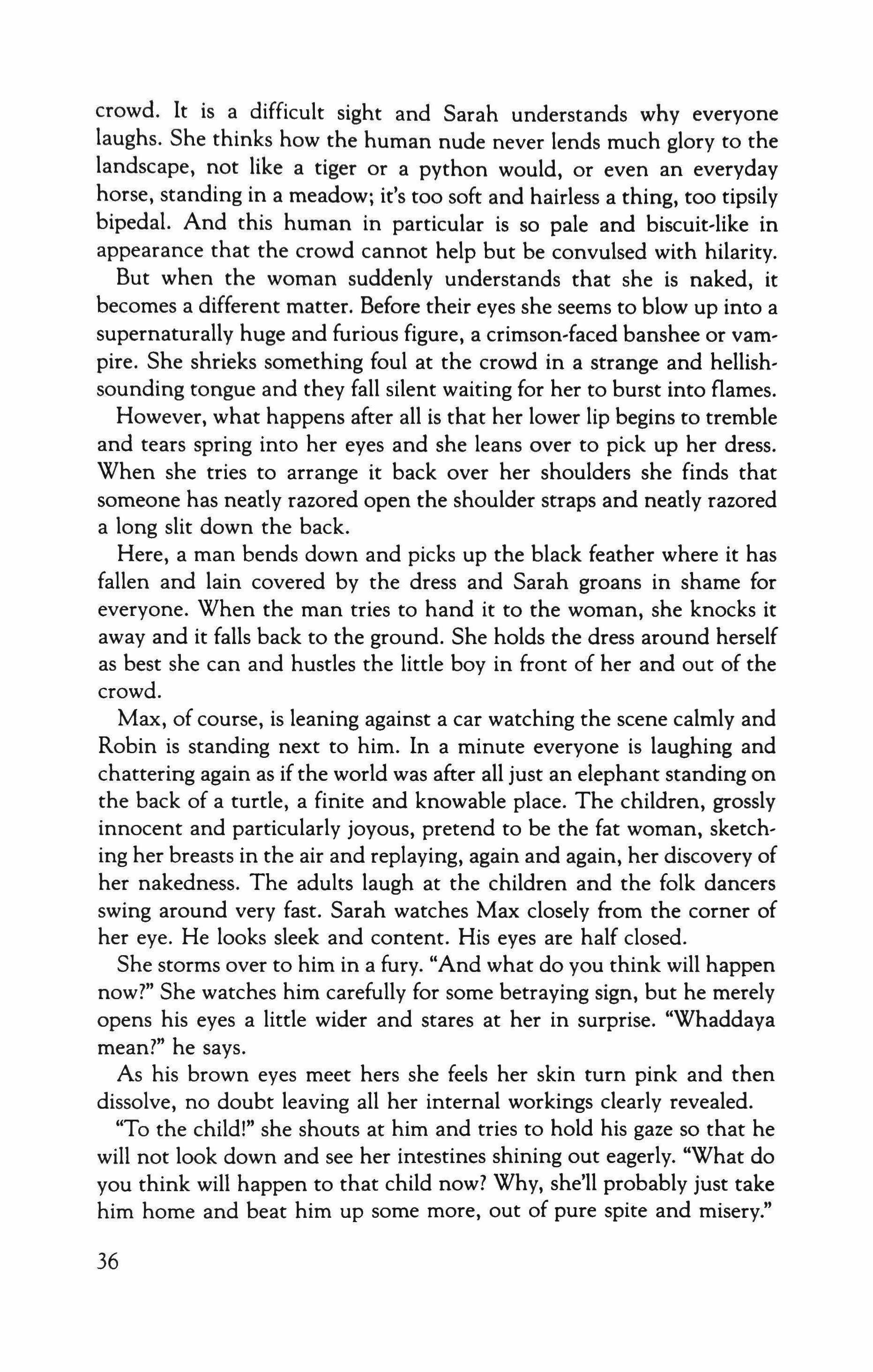
crowd. It is a difficult sight and Sarah understands why everyone laughs. She thinks how the human nude never lends much glory to the landscape, not like a tiger or a python would, or even an everyday horse, standing in a meadow; it's too soft and hairless a thing, too tipsily bipedal. And this human in particular is so pale and biscuit-like in appearance that the crowd cannot help but be convulsed with hilarity.
But when the woman suddenly understands that she is naked, it becomes a different matter. Before their eyes she seems to blow up into a supernaturally huge and furious figure, a crimson-faced banshee or vampire. She shrieks something foul at the crowd in a strange and hellish, sounding tongue and they fall silent waiting for her to burst into flames.
However, what happens after all is that her lower lip begins to tremble and tears spring into her eyes and she leans over to pick up her dress. When she tries to arrange it back over her shoulders she finds that someone has neatly razored open the shoulder straps and neatly razored a long slit down the back.
Here, a man bends down and picks up the black feather where it has fallen and lain covered by the dress and Sarah groans in shame for everyone. When the man tries to hand it to the woman, she knocks it away and it falls back to the ground. She holds the dress around herself as best she can and hustles the little boy in front of her and out of the crowd.
Max, of course, is leaning against a car watching the scene calmly and Robin is standing next to him. In a minute everyone is laughing and chattering again as if the world was after all just an elephant standing on the back of a turtle, a finite and knowable place. The children, grossly innocent and particularly joyous, pretend to be the fat woman, sketch, ing her breasts in the air and replaying, again and again, her discovery of her nakedness. The adults laugh at the children and the folk dancers swing around very fast. Sarah watches Max closely from the corner of her eye. He looks sleek and content. His eyes are half closed.
She storms over to him in a fury. "And what do you think will happen now?" She watches him carefully for some betraying sign, but he merely opens his eyes a little wider and stares at her in surprise. "Whaddaya mean?" he says.
As his brown eyes meet hers she feels her skin turn pink and then dissolve, no doubt leaving all her internal workings clearly revealed.
"To the child!" she shouts at him and tries to hold his gaze so that he will not look down and see her intestines shining out eagerly. "What do you think will happen to that child now? Why, she'll probably just take him home and beat him up some more, out of pure spite and misery."
36

He frowns and seems to think this over. "Well, that may be true," he says slowly, "but then, on the other hand, people have to tell each other things, don't you think? You can't be a witness to such things and not speak. If you don't, your heart dries up."
"I have blood in my shoes," Robin says suddenly. She has been shifting miserably from one foot to the other for several minutes now.
"What do you mean?" they both say to her sharply.
"Well, I don't know. I've been feeling something slippery in there all evening and now I've realized it's blood."
"Show me," Sarah orders.
Robin bends down obediently and takes off one of her shoes. She holds it up to the light to show them. "See," she says.
The shoe looks slightly sweaty, but there's not a trace of blood.
Sarah stares at Max as if this, too, were his fault. Then she looks at Robin. "Tomorrow your time with me is up, you know," she says gently. "You've got to go."
When they get back home, Robin goes into her room and shuts the door quietly behind her. Sarah stands at the window in the dark and watches the street. She knows what to expect. She's running it wide open and light, aboveboard. She's getting a grasp of the inner nature of things and a street like this holds no secrets from her. At ten-thirty the plainclothesmen appear to take their places in their doorways. At twelve, the Midnight Hour Social Club's loudspeaker comes on. At twelve-thirty, Max goes by.
At twelve thirty-five, the moon appears over the vacant lot, silent and critical, white and cool. Sarah greets it sternly, without even blinking. At twelve-forty, to her astonishment, Max comes galloping back up the street with a bouquet of flowers in his arms. Without even thinking about it, she leans way out to stare at him, unable to make head or tail out of the meaning of this.
He stops at the bottom of her fire escape, smiles up at her and grabs hold of the ladder which someone has foolishly left down. The plainclothesmen stare at him sleepily as he climbs up to her window.
"Well!" he says as he jumps, with a thud, into her room.
She takes a quick step backwards and finds herself in the dark, out of the light of the streetlamp.
"Why aren't you sleeping?" he asks accusingly.
She is certainly furious at this intrusion, but she also feels caught in a curious tight spot-as if at the very brief space where the tide changes, both helpless and langorous, about to be thrown back up on the beach.
37

"Insomnia," she says briefly.
"Aaah," he says. 'That would explain several things. I suppose the music from across the street doesn't help either, does it?"
She doesn't answer him.
The streetlamp hovers at his back like a pink alien spaceship, so while his outline glows brightly, he is otherwise dark and faceless. She breathes very deliberately, wanting to keep her reflexes sharp, but this plan backfires. The air is filled with an overpowering scent of summer leaves and pollen and her head swims. When, at last, she takes a step forward, she sees that it is because of the big, feathery, plucked-looking bouquet of flowers.
Well, he is surely in love, she thinks wistfully. He is standing there looking smug and yet defenseless, the way you look when you undertake to crawl up out of the sea onto land for the first time.
Sarah hears Robin open her bedroom door and step into the hallway. ICWell, go ahead," Sarah sighs. "There she is."
Sarah goes over to the window and looks out. The moon is now riding high over the tenements and the street is caught in its steady, penetrating light. Nothing will escape. It holds everything transfixed with its baleful, white glance. It seems to her she's been standing here looking out this window into the moonlight for a long, long time, when Max, whom she'd thought years gone, says sadly, "You've been misunderstanding me, I think. I brought these flowers for you."
At first these words only get to her in the way small matters do, like flies at a picnic or a shoelace coming undone or someone saying, "Please pass the pepper." And even as she realizes, with a lurch, what they must mean, and even as she is wondering, with that curious thrill with which one wonders such matters, what his kisses will be like, she knows that this will come and this will go, and maybe it will be a sweet matter, but it won't be of much importance.
Sarah is pleased to find herself so lightly snared and she thinks about how not only is the world no longer considered to be a finite place, lodged solidly in the heart of a bright-faced God, it is also no longer considered to be an infinite place, constructing itself endlessly out of an endless variety of chances and accidents. No, nowadays, it's supposedly the organization itselfof the world which is so magical, which throws off stars and gases, which creates its own energy and falls into dust and then rises up out of the dust even more terrible and complicated. She is eager to win as much power and influence as she can over the secret nature of these things.
Plainclothesman Number One shakes himself and walks off to get his
38
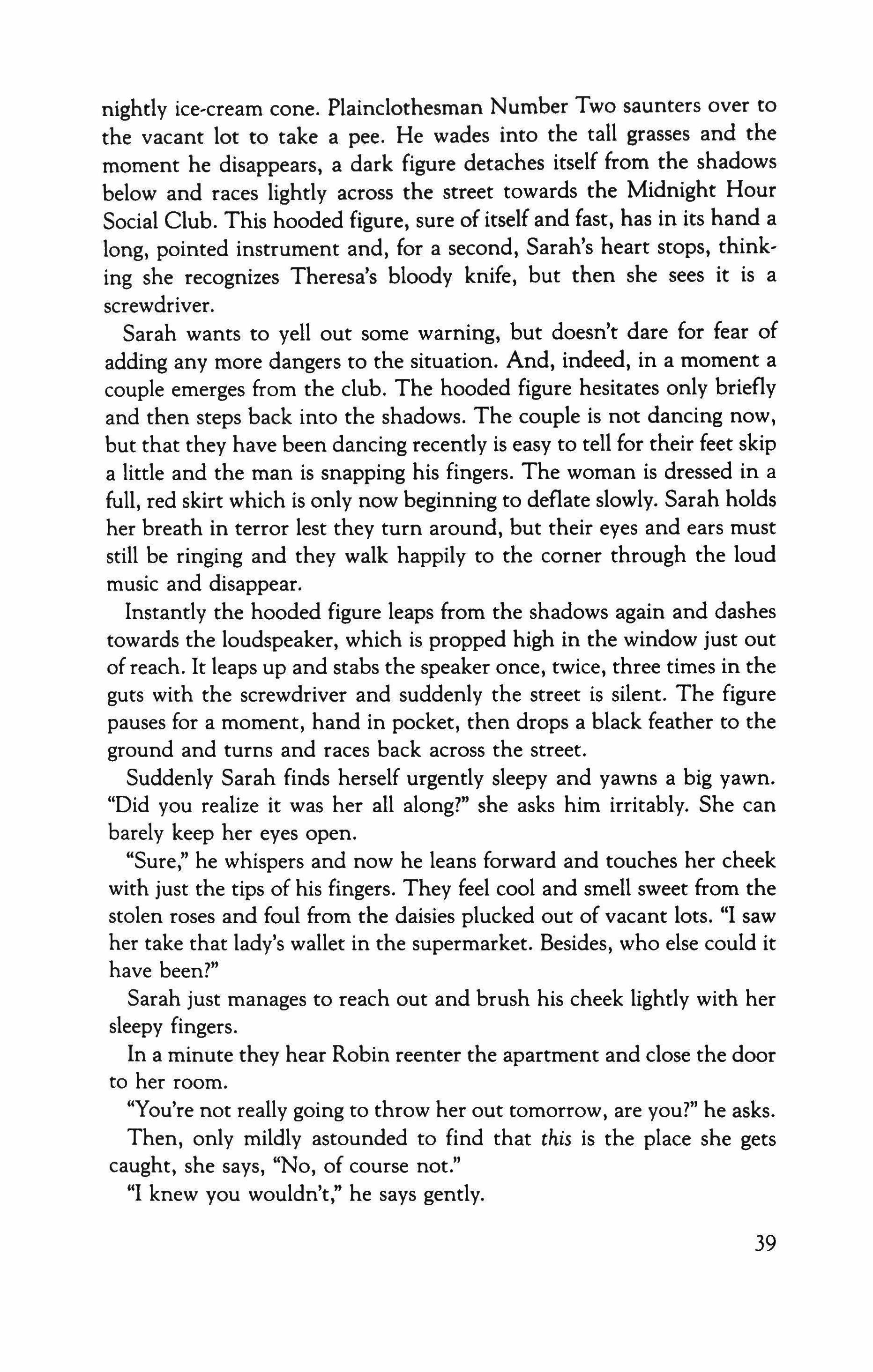
nightly ice-cream cone. Plainclothesman Number Two saunters over to the vacant lot to take a pee. He wades into the tall grasses and the moment he disappears, a dark figure detaches itself from the shadows below and races lightly across the street towards the Midnight Hour Social Club. This hooded figure, sure of itself and fast, has in its hand a long, pointed instrument and, for a second, Sarah's heart stops, thinking she recognizes Theresa's bloody knife, but then she sees it is a screwdriver.
Sarah wants to yell out some warning, but doesn't dare for fear of adding any more dangers to the situation. And, indeed, in a moment a couple emerges from the club. The hooded figure hesitates only briefly and then steps back into the shadows. The couple is not dancing now, but that they have been dancing recently is easy to tell for their feet skip a little and the man is snapping his fingers. The woman is dressed in a full, red skirt which is only now beginning to deflate slowly. Sarah holds her breath in terror lest they turn around, but their eyes and ears must still be ringing and they walk happily to the corner through the loud music and disappear.
Instantly the hooded figure leaps from the shadows again and dashes towards the loudspeaker, which is propped high in the window just out of reach. It leaps up and stabs the speaker once, twice, three times in the guts with the screwdriver and suddenly the street is silent. The figure pauses for a moment, hand in pocket, then drops a black feather to the ground and turns and races back across the street.
Suddenly Sarah finds herself urgently sleepy and yawns a big yawn. "Did you realize it was her all along?" she asks him irritably. She can barely keep her eyes open.
"Sure:' he whispers and now he leans forward and touches her cheek with just the tips of his fingers. They feel cool and smell sweet from the stolen roses and foul from the daisies plucked out of vacant lots. "I saw her take that lady's wallet in the supermarket. Besides, who else could it have been?"
Sarah just manages to reach out and brush his cheek lightly with her sleepy fingers.
In a minute they hear Robin reenter the apartment and close the door to her room.
"You're not really going to throw her out tomorrow, are you?" he asks. Then, only mildly astounded to find that this is the place she gets caught, she says, "No, of course not."
"1 knew you wouldn't," he says gently.
39
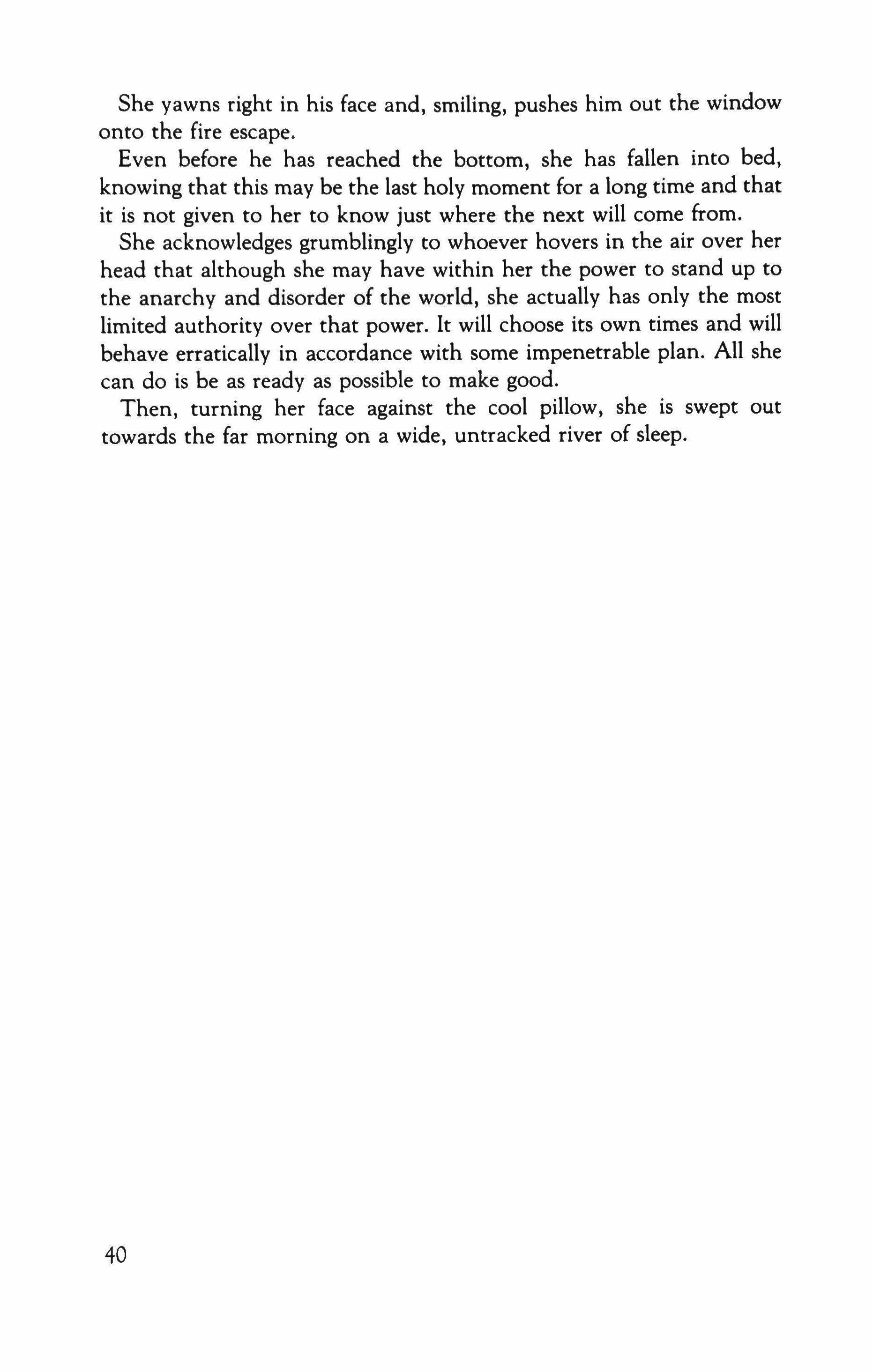
She yawns right in his face and, smiling, pushes him out the window onto the fire escape.
Even before he has reached the bottom, she has fallen into bed, knowing that this may be the last holy moment for a long time and that it is not given to her to know just where the next will come from.
She acknowledges grumblingly to whoever hovers in the air over her head that although she may have within her the power to stand up to the anarchy and disorder of the world, she actually has only the most limited authority over that power. It will choose its own times and will behave erratically in accordance with some impenetrable plan. All she can do is be as ready as possible to make good.
Then, turning her face against the cool pillow, she is swept out towards the far morning on a wide, untracked river of sleep.
40
Yukon
Carol Emshwiller

He's a dragon. He's a wolf. He's caribou. She tries to please him. She tries to keep out of his way and, at the same time, tries to get him to notice her by doing little things for him when he's gone or asleep. She needs him for warmth so they can cuddle up and he can warm her. She's afraid to leave because that's all the warmth she has. But she's afraid to stay. Is it possible to rush away when you live this far north? These high valleys never get warm. Mountain water coming down from glaciers is bright turquoise.
He's always looking at the sky or the ground or the horizon, not at her. But bits of red wool are all she has to look good in and then she never was a popular girl. If had big fur boots and hat, then maybe make a move. Make a run for it.
As valley to mountaintop might as well be ship-to-shore, sending signals. How live that way? How love?
He's a rattlesnake, but no immediate threat (that she can tell). Comes home when he feels like it, bringing dead things to eat. Holds conventional views. Passes judgment on. Everything that needs to be said, he says, already said, and she thinks he's probably right, or almost. Make him chopped liver. Make him hasenpfeffer. Make him big mugs of glogg, but might not be home till three a.m. anyway. Wait up. And always those Englemann spruce. A couple of hundred years old-even morebut still skinny. Nothing to them. She loves them, though what else is there to love? It's the only tree around.
He's a giant. He's a dwarf. She has to help him climb up onto his throne. For the love of the spruce trees, she nuzzles into his furry chest, thinking that to love him you have to love horses, spiders and raw oysters, thinking how now she's going to have a baby. Should she tell
41
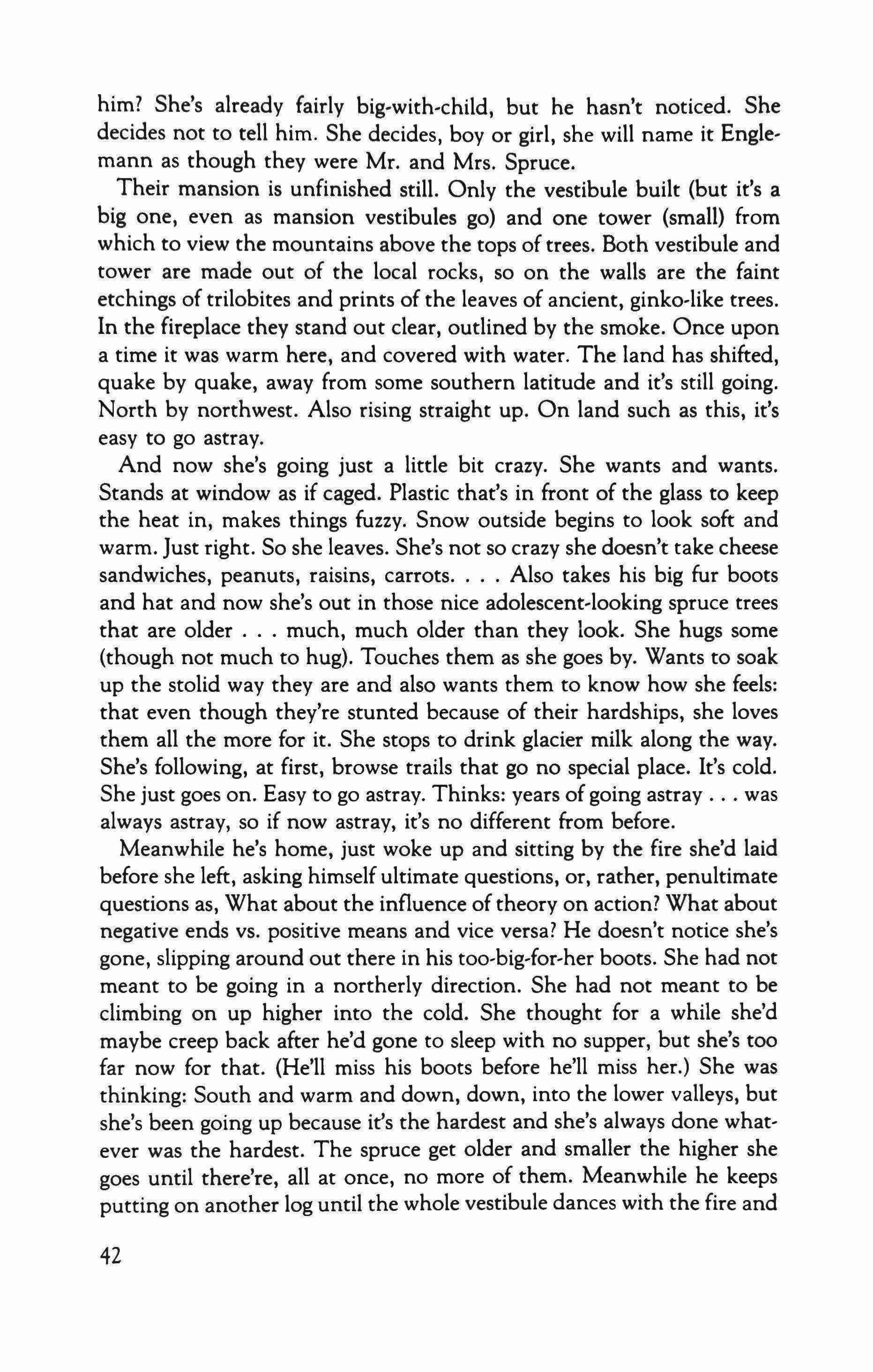
him? She's already fairly big-with-child, but he hasn't noticed. She decides not to tell him. She decides, boy or girl, she will name it Englemann as though they were Mr. and Mrs. Spruce. Their mansion is unfinished still. Only the vestibule built (but it's a big one, even as mansion vestibules go) and one tower (small) from which to view the mountains above the tops of trees. Both vestibule and tower are made out of the local rocks, so on the walls are the faint etchings of trilobites and prints of the leaves of ancient, ginko-like trees. In the fireplace they stand out clear, outlined by the smoke. Once upon a time it was warm here, and covered with water. The land has shifted, quake by quake, away from some southern latitude and it's still going. North by northwest. Also rising straight up. On land such as this, it's easy to go astray.
And now she's going just a little bit crazy. She wants and wants. Stands at window as if caged. Plastic that's in front of the glass to keep the heat in, makes things fuzzy. Snow outside begins to look soft and warm. Just right. So she leaves. She's not so crazy she doesn't take cheese sandwiches, peanuts, raisins, carrots. Also takes his big fur boots and hat and now she's out in those nice adolescent-looking spruce trees that are older much, much older than they look. She hugs some (though not much to hug). Touches them as she goes by. Wants to soak up the stolid way they are and also wants them to know how she feels: that even though they're stunted because of their hardships, she loves them all the more for it. She stops to drink glacier milk along the way. She's following, at first, browse trails that go no special place. It's cold. She just goes on. Easy to go astray. Thinks: years of going astray was always astray, so if now astray, it's no different from before.
Meanwhile he's home, just woke up and sitting by the fire she'd laid before she left, asking himself ultimate questions, or, rather, penultimate questions as, What about the influence of theory on action? What about negative ends vs. positive means and vice versa? He doesn't notice she's gone, slipping around out there in his too-big-for-her boots. She had not meant to be going in a northerly direction. She had not meant to be climbing on up higher into the cold. She thought for a while she'd maybe creep back after he'd gone to sleep with no supper, but she's too far now for that. (He'll miss his boots before he'll miss her.) She was thinking: South and warm and down, down, into the lower valleys, but she's been going up because it's the hardest and she's always done whatever was the hardest. The spruce get older and smaller the higher she goes until there're, all at once, no more of them. Meanwhile he keeps putting on another log until the whole vestibule dances with the fire and
42

he pulls off sweater after sweater, watches his giant shadow writhe along the walls, falls asleep in his chair.
If there had been flowers blooming up there on the mountains, she would have known the names of every single one. Ifbirds had called out, she'd have known which birds and would have whistled back.
Since she'd started in the morning after a sleepless night (though all her nights have been sleepless for a long time, she can hardly remember the times when she used to sleep well) Since she'd started early she gets almost all the way to the top before it's too dark to go on. She finds a kind of cairn built by summer climbers. There's a slit at the bottom big enough to slither into. She does. Sleeps, not well, but better than she's slept in a long time, dreaming: Loves me? Loves me not? and: Who (or what!) is number one in his heart? It's his boots and his hat keeps her warm enough, or almost warm enough all night, so in the morning she's, as usual, full of grateful love for him and wondering: Why hasn't he followed no matter how hard? Why hasn't he come for her by now with something nice and warm to drink? He's never done anything remotely like that, but still she wonders why he's not already there, maybe having climbed all night just for her.
She squirms out and up and, first thing, she sees she's almost to the top, so goes on up. What she thought was five minutes worth of climbing turns out to take a half an hour. At top she sits on fossils and looks out-little shivers of pleasure or of cold-eating raisins and soaking up comfort and courage from the view, this side, too, Englemann, Englemann, everywhere Englemann below her, first in the sheltered hollows and then, lower down, nothing but. Thinks: Nothing like them, and nothing like being up this high, and nothing like what it took to get this far, nothing like the cold, clear air. She even forgets she's pregnant.
Now, down in that big, stone vestibule, he is shouting, "Bacon, bacon!" Searches what few crooks and crannies there are to search, groans and spits, hisses into the corner under the king-sized bed, makes his own black coffee, spends the morning writing out new rules while she walks the col, too exhilarated to feel fear of heights. One last bit of glacier still sits in the steep pocket below her. She can tell by the old blue ice showing where the pure white snow's been blown off. She follows the ridge above and then past and then starts down, but she's being too courageous too sure of herself now, falls, slides the whole bare slope till stopped saved by one thin old Englemann, her knee twisted back behind. Hurts. Probably nothing broken though she's not sure. Waits, lying there clutching tree because of pain. She's looking straight up through the narrow, scraggly circle of branches to the sky that's cloud-
43

ing over. thinking: Tree. tree. this tree and sky. Ties her scarf tight around her leg. That helps. It's getting windier. Big black clouds off over next mountain. She must get lower and to some sheltered spot. Can't stop now. Gets up. Goes from tree to tree to tree (she's depending on them) steeply down. Thinks: If not for Englemann spruce to hang onto!
By late afternoon finds bear's cave still warm from that big body. She knows it's a bear's cave. She can smell it. She can see the footprints in the snow. people-like prints but wider. leading out. She needs the shelter now and the warmth of it. Can't go on. And she's more cold than scared. Also it's beginning to snow. She creeps in. Wedges herself among the tree roots along the left-hand side. away from the more open part of the cave. She knows the bear will come back, but she thinks she already knows how to keep away from something big (or small) and dangerous. She falls asleep. a seemingly dreamless sleep and not so full of unanswered questions about love or the lack of it.
The bear comes back at three a.m. She hears him sniffing around outside and giving little warning growls. Also he's got the hiccups. Nothing here she hasn't heard already. and many times. She's only halfawake. Before she realizes it she's told him she loves him. She's talking soft and low. He grunts, then hunkers on in, rolls to far side. back turned. (She thinks: As usual.) He lets her be. Snores. Storm goes on outside. Later (as usual) she moves close, snug against his back.
They sleep two days and nights, or so she guesses. When she wakes up later, as he's leaving, she finds he's eaten all her cheese sandwiches, carrots, peanuts and raisins, and she thinks: As usual.
She hurries to the entrance of the cave and calls out to him before he goes. Her knee hurts and maybe she's a little feverish. She speaks without thinking. That's not her usual way. but he seems a little bit safer than her own male even though he's the biggest and most masculine thing she's ever been this close to; dangerous, too. No doubt about it. She does like his looks. though: his hump, his shoulders, his yellowbrown fur Now he hangs his head low. almost to the snow, and looks back at her suspiciously, and it isn't as if she hasn't seen that same look a thousand times before. But what is there to lose? She talks to him of things she'd never dared to talk about before. "How can love last," she says, "if this goes on? How can love even begin? How can it go on and on, and we all," she says. "want undying love. Even you. though you may not think so. It's normal. And. by the way," she says, "food is love. you know. Love is food. It's how we live. It's what we live by, and you've eaten it all up."
44
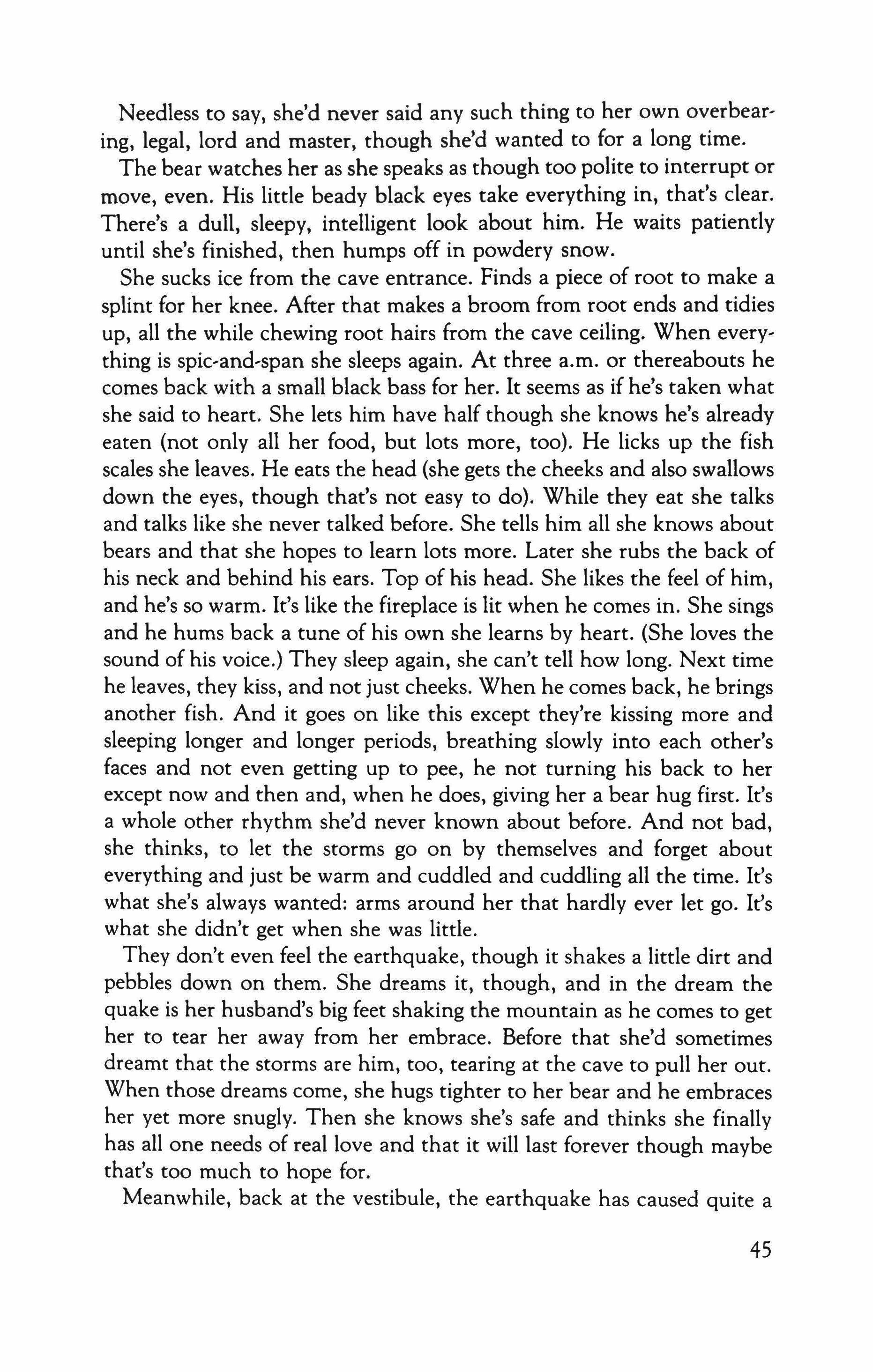
Needless to say, she'd never said any such thing to her own overbearing, legal, lord and master, though she'd wanted to for a long time.
The bear watches her as she speaks as though too polite to interrupt or move, even. His little beady black eyes take everything in, that's clear. There's a dull, sleepy, intelligent look about him. He waits patiently until she's finished, then humps off in powdery snow.
She sucks ice from the cave entrance. Finds a piece of root to make a splint for her knee. After that makes a broom from root ends and tidies up, all the while chewing root hairs from the cave ceiling. When everything is spic-and-span she sleeps again. At three a.m. or thereabouts he comes back with a small black bass for her. It seems as if he's taken what she said to heart. She lets him have half though she knows he's already eaten (not only all her food, but lots more, too). He licks up the fish scales she leaves. He eats the head (she gets the cheeks and also swallows down the eyes, though that's not easy to do). While they eat she talks and talks like she never talked before. She tells him all she knows about bears and that she hopes to learn lots more. Later she rubs the back of his neck and behind his ears. Top of his head. She likes the feel of him, and he's so warm. It's like the fireplace is lit when he comes in. She sings and he hums back a tune of his own she learns by heart. (She loves the sound of his voice.) They sleep again, she can't tell how long. Next time he leaves, they kiss, and not just cheeks. When he comes back, he brings another fish. And it goes on like this except they're kissing more and sleeping longer and longer periods, breathing slowly into each other's faces and not even getting up to pee, he not turning his back to her except now and then and, when he does, giving her a bear hug first. It's a whole other rhythm she'd never known about before. And not bad, she thinks, to let the storms go on by themselves and forget about everything and just be warm and cuddled and cuddling all the time. It's what she's always wanted: arms around her that hardly ever let go. It's what she didn't get when she was little.
They don't even feel the earthquake, though it shakes a little dirt and pebbles down on them. She dreams it, though, and in the dream the quake is her husband's big feet shaking the mountain as he comes to get her to tear her away from her embrace. Before that she'd sometimes dreamt that the storms are him, too, tearing at the cave to pull her out. When those dreams come, she hugs tighter to her bear and he embraces her yet more snugly. Then she knows she's safe and thinks she finally has all one needs of real love and that it will last forever though maybe that's too much to hope for.
Meanwhile, back at the vestibule, the earthquake has caused quite a
45
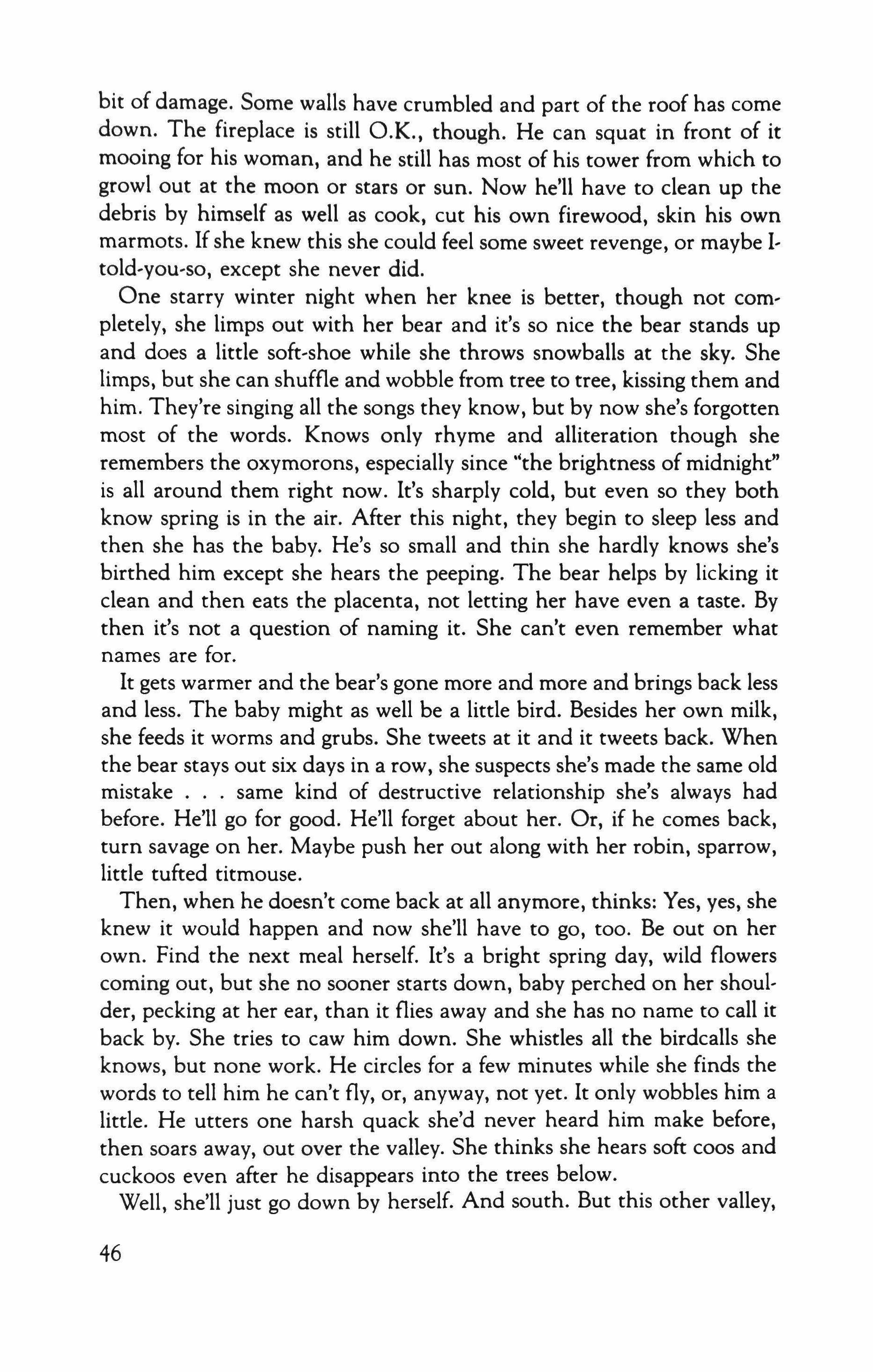
bit of damage. Some walls have crumbled and part of the roof has come down. The fireplace is still O.K., though. He can squat in front of it mooing for his woman, and he still has most of his tower from which to growl out at the moon or stars or sun. Now he'll have to clean up the debris by himself as well as cook, cut his own firewood, skin his own marmots. If she knew this she could feel some sweet revenge, or maybe Itold-you-so, except she never did.
One starry winter night when her knee is better, though not completely, she limps out with her bear and it's so nice the bear stands up and does a little soft-shoe while she throws snowballs at the sky. She limps, but she can shuffle and wobble from tree to tree, kissing them and him. They're singing all the songs they know, but by now she's forgotten most of the words. Knows only rhyme and alliteration though she remembers the oxymorons, especially since "the brightness of midnight" is all around them right now. It's sharply cold, but even so they both know spring is in the air. After this night, they begin to sleep less and then she has the baby. He's so small and thin she hardly knows she's birthed him except she hears the peeping. The bear helps by licking it clean and then eats the placenta, not letting her have even a taste. By then it's not a question of naming it. She can't even remember what names are for.
It gets warmer and the bear's gone more and more and brings back less and less. The baby might as well be a little bird. Besides her own milk, she feeds it worms and grubs. She tweets at it and it tweets back. When the bear stays out six days in a row, she suspects she's made the same old mistake same kind of destructive relationship she's always had before. He'll go for good. He'll forget about her. Or, if he comes back, turn savage on her. Maybe push her out along with her robin, sparrow, little tufted titmouse.
Then, when he doesn't come back at all anymore, thinks: Yes, yes, she knew it would happen and now she'll have to go, too. Be out on her own. Find the next meal herself. It's a bright spring day, wild flowers coming out, but she no sooner starts down, baby perched on her shoulder, pecking at her ear, than it flies away and she has no name to call it back by. She tries to caw him down. She whistles all the birdcalls she knows, but none work. He circles for a few minutes while she finds the words to tell him he can't fly, or, anyway, not yet. It only wobbles him a little. He utters one harsh quack she'd never heard him make before, then soars away, out over the valley. She thinks she hears soft coos and cuckoos even after he disappears into the trees below.
Well, she'll just go down by herself. And south. But this other valley,
46

not towards home. This time maybe not take the hard way, and maybe she's had enough hugging to last a while, though she's wondering, as usual, Where is the creature with which she can live happily ever after?
Then she sees a figure climbing up. First it's just a greenish-brown slowly moving spot, but then it becomes green and brown tweeds and corduroys. Thin, small, wiry. Has a greenish-gray beard. Alpine hat with little red feathers in it. Black-button bearish eyes. She sees them as he comes closer. Though she's never seen him before, she knows who it is. Knickers, hiking boots - the old fashioned kind. "Englemann," she says, "Englemann, Englemann." It's one of the few words she's not for' gotten never would forget though she is, by then, almost free of words. She would have to start over now from the beginning with wah, bah and boo.
He comes up the last switchback. They look at each other and smile. He has a little tuft of fragrant mountain misery in his buttonhole. He takes it out, sniffs it once, then gives it to her.
"Oh, Englemann," she says, and, "wah" and "bah" and "boo."
47
Wolfe County
Martha Bennett Stiles
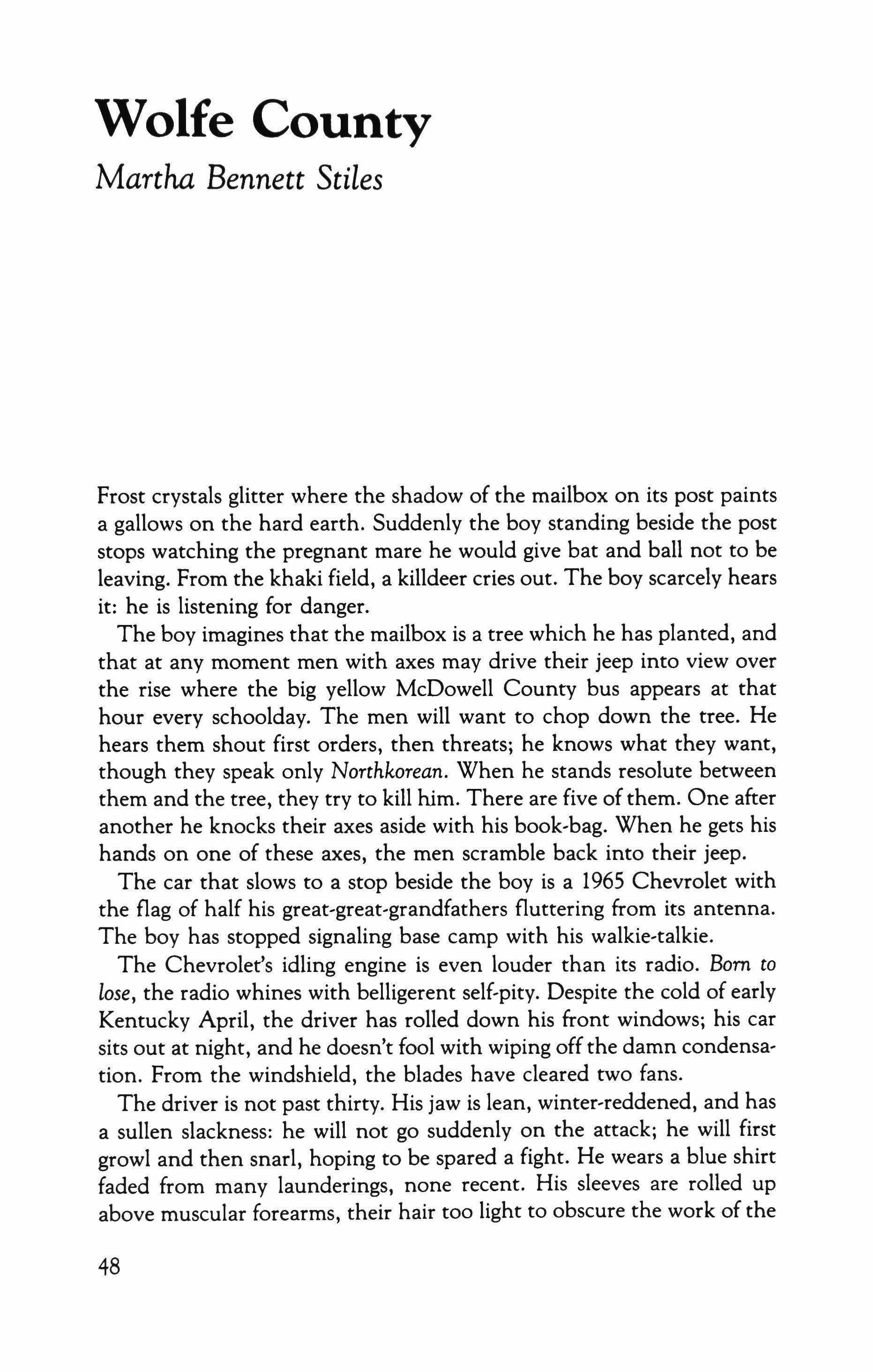
Frost crystals glitter where the shadow of the mailbox on its post paints a gallows on the hard earth. Suddenly the boy standing beside the post stops watching the pregnant mare he would give bat and ball not to be leaving. From the khaki field, a killdeer cries out. The boy scarcely hears it: he is listening for danger.
The boy imagines that the mailbox is a tree which he has planted, and that at any moment men with axes may drive their jeep into view over the rise where the big yellow McDowell County bus appears at that hour every schoolday. The men will want to chop down the tree. He hears them shout first orders, then threats; he knows what they want, though they speak only Northkorean. When he stands resolute between them and the tree, they try to kill him. There are five ofthem. One after another he knocks their axes aside with his book-bag. When he gets his hands on one of these axes, the men scramble back into their jeep.
The car that slows to a stop beside the boy is a 1965 Chevrolet with the flag of half his great-great-grandfathers fluttering from its antenna. The boy has stopped signaling base camp with his walkie-talkie.
The Chevrolet's idling engine is even louder than its radio. Born to lose, the radio whines with belligerent self-pity. Despite the cold of early Kentucky April, the driver has rolled down his front windows; his car sits out at night, and he doesn't fool with wiping offthe damn condensation. From the windshield, the blades have cleared two fans.
The driver is not past thirty. His jaw is lean, winter-reddened, and has a sullen slackness: he will not go suddenly on the attack; he will first growl and then snarl, hoping to be spared a fight. He wears a blue shirt faded from many launderings, none recent. His sleeves are rolled up above muscular forearms, their hair too light to obscure the work of the
48

Saigon tattoo artist who was probably the only person in that city who gave him his money's worth, though he spent all that he had. He eyes the boy through kinky bangs. "Hey Lang," he asks, "you talking to the mailbox?"
Lang has not seen Clint Penn since Zad Thacker fired him. Before then Clint was always riding him, asking him when he was going to learn to shoot, when he was going to learn to smoke, when he was going to stop taking orders from his mother.
"You don't have to be ashamed of it," Clint answers Lang's silence. "Some people talk to their selves; some people talk to mailboxes. If a sucker don't have a friend to talk to in all this world, I sure ain't gonna laugh at him if he talks to his mailbox."
"I've got a friend. Breck Smith is my friend."
Clint looks slowly in every direction. "You say so, Lang, I believe you."
"He lives a little way on."
"A little way. He's your best friend, huh, but you wouldn't walk a little way to talk to him long as you got the mailbox right here."
"I'm not allowed to walk on the road by myself." Hongry chil'ren, the radio mourns, anna crop in the feel. The Chevy's exhaust fumes assail Lang and he would like to back away from it, but he remembers how easily Clint is offended by anything he thinks anybody might be thinking about his car.
"Can't walk on the road without your marna," Clint says sympathetically. Lang's veins shrink. "How about ride: your marna let you ride in a automobile withouten her? I'll carry you where your friend lives."
Lang may not get in a stranger's car.
Lang thinks that his mother-he knows that his father has met Clint. Clint reaches across and opens the passenger door for him. The three right claws of the dragon on Clint's forearm grip a skull: Lang has admired this before.
"No need to make that 01' schoolbus stop twicet," Clint says.
As Lang gets in, the radio changes to a louder tune. He would like to ask Clint to turn the volume down but he is afraid this would be heard as criticism of Clint's station choice. When they get to Breck's driveway, Clint does not slow down. "Here," Lang says: "This is the-that was the place."
"I thought you said you wanted to go to school."
"Turn around here. You can turn around here."
Clint decelerates. "What's the matter-you forget something you want to tell the mailbox? You told me you wanted to go to school, didn't you? That's where I'm atakin' you."
49

Twenty miles south of Clayton, Lang sees a Texaco sign. He has been watching the gauge for twenty miles; it is close to empty. He edges nearer to his door and becomes very still. Between him and Clint the radio sings of faithless love and death in the morning. "Hey, Lang," Clint says softly. "Did you see where Zad Thacker had him a fire?" Lang watches the Texaco sign grow larger and the stillness that has numbed his knees and elbows seems to expand like freezing water. "How do you reckon that hay shed come to catch afire like that?"
Clint is waiting for an answer. Lang flushes, mumbles.
"I set that fire, Lang.
"Zad Thacker he thinks he can run me off, thinks him and his girl is too good for me. Pig shit. She ain't nuthin but country just like me. Hair on her legs that long."
Clint is no longer looking at Lang; he glowers at the road ahead. "01' Zad he come in there ahollerin', cryin' about his 'baby'. His 'baby' didn't do nuthin' with me she wasn't drippin' for. Big enough, old enough."
Clint glances Lang's way again. "I like fires, don't you?" At the bullying sarcasm in Clint's voice Lang feels his face heat again. The Texaco station slides past. "Zad's wasn't too good of a fire; wasn't nuthin in that shed but a litter of cats, and a cat don't hardly stay around a fire long enough to get warm. You take a mare, now, you set a light to her straw, she'll stay right in her stall. It's home to her. She might scream when her tail whooshes up, when those burnin' pieces drop on her back-she might thrash around, fall on her foal, maybe, when that smoke starts to choke her, but she'll stay right there where she thinks you're going to keep her safe. She trusts you. She knows you won't let nuthin hurt her, long as she's in her stall. She'll scream an' her foal will scream, but they'll be right there when the coals blank out. What's left of 'em."
Lang is refusing to look at Clint. He stares at a small asymmetrical hole in the Chevy floor, at his school shoes, at two empty beer cans and a piece of crumpled paper.
"I might just go back to McDowell County, Lang. If you want me to, I might. There wasn't enough noise to suit me when Zad's shed it burned.
"I know a barn up the road with three mares in it."
Lang will not look at Clint, but his nose is stinging; he must raise his chin or snivel. He scowls blindly out the window.
"When somebody thinks they're too good for me, that's when I get to thinkin' fire." Clint looks from the reflection of the Texaco pumps in the car's mirror to Lang's averted face and smiles. "When somebody cuts out and leaves me, that's when I get to thinkin' what good company a good fire is." Now his voice changes and the hair at the base of Lang's neck
50
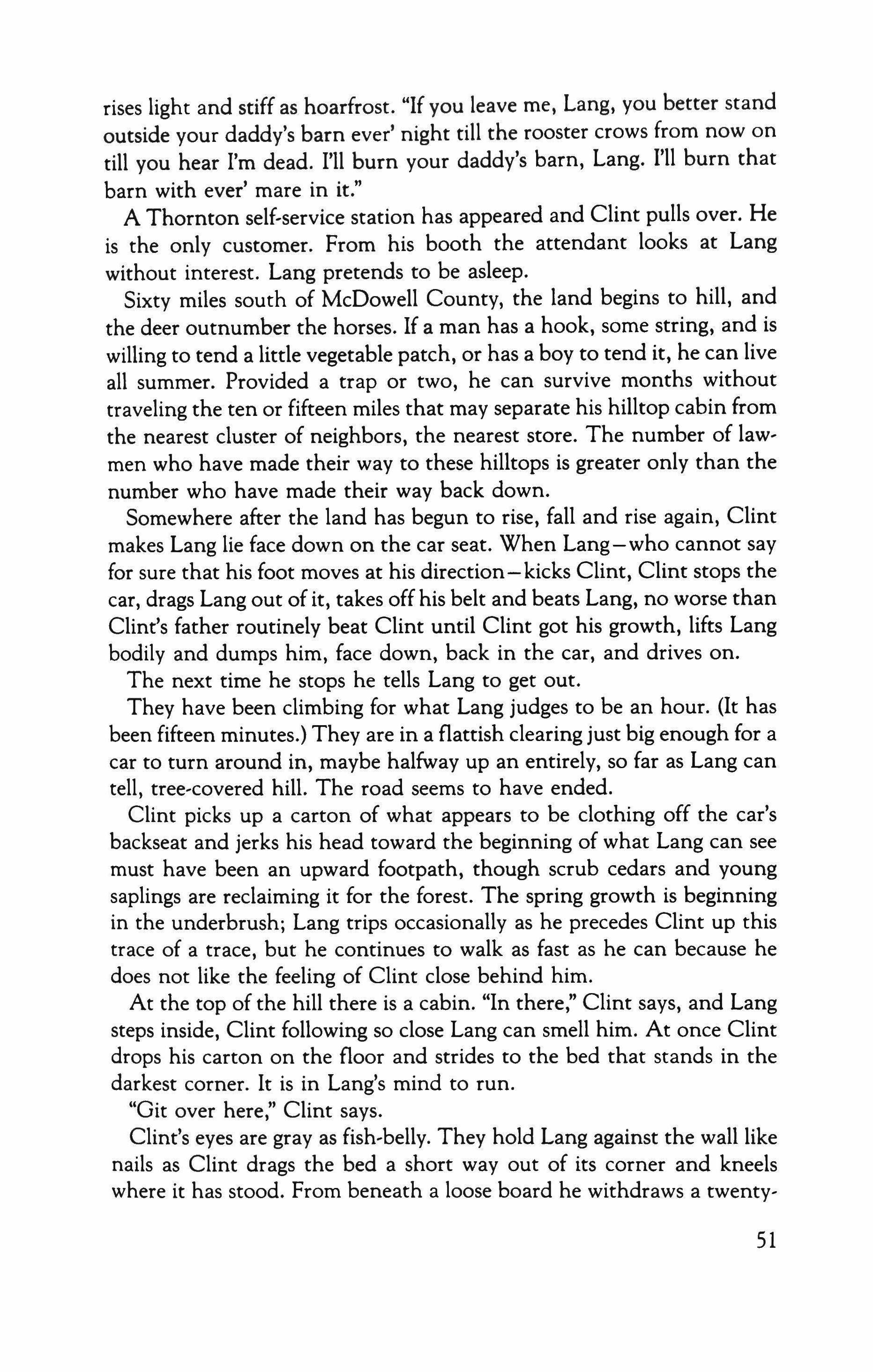
rises light and stiff as hoarfrost. "If you leave me, Lang, you better stand outside your daddy's barn ever' night till the rooster crows from now on till you hear I'm dead. I'll burn your daddy's barn, Lang. I'll burn that barn with ever' mare in it."
A Thornton self-service station has appeared and Clint pulls over. He is the only customer. From his booth the attendant looks at Lang without interest. Lang pretends to be asleep.
Sixty miles south of McDowell County, the land begins to hill, and the deer outnumber the horses. If a man has a hook, some string, and is willing to tend a little vegetable patch, or has a boy to tend it, he can live all summer. Provided a trap or two, he can survive months without traveling the ten or fifteen miles that may separate his hilltop cabin from the nearest cluster of neighbors, the nearest store. The number of lawmen who have made their way to these hilltops is greater only than the number who have made their way back down.
Somewhere after the land has begun to rise, fall and rise again, Clint makes Lang lie face down on the car seat. When Lang-who cannot say for sure that his foot moves at his direction - kicks Clint, Clint stops the car, drags Lang out of it, takes off his belt and beats Lang, no worse than Clint's father routinely beat Clint until Clint got his growth, lifts Lang bodily and dumps him, face down, back in the car, and drives on.
The next time he stops he tells Lang to get out.
They have been climbing for what Lang judges to be an hour. (It has been fifteen minutes.) They are in a flattish clearing just big enough for a car to turn around in, maybe halfway up an entirely, so far as Lang can tell, tree-covered hill. The road seems to have ended.
Clint picks up a carton of what appears to be clothing off the car's backseat and jerks his head toward the beginning of what Lang can see must have been an upward footpath, though scrub cedars and young saplings are reclaiming it for the forest. The spring growth is beginning in the underbrush; Lang trips occasionally as he precedes Clint up this trace of a trace, but he continues to walk as fast as he can because he does not like the feeling of Clint close behind him.
At the top of the hill there is a cabin. "In there," Clint says, and Lang steps inside, Clint following so close Lang can smell him. At once Clint drops his carton on the floor and strides to the bed that stands in the darkest corner. It is in Lang's mind to run.
"Git over here," Clint says.
Clint's eyes are gray as fish-belly. They hold Lang against the wall like nails as Clint drags the bed a short way out of its corner and kneels where it has stood. From beneath a loose board he withdraws a twenty-
51
two rifle and a pouch. The rifle he places on two pegs above the cabin's one window and he hangs the pouch by its drawstrings over one of these pegs. Ashes lie on the blackened stone hearth. On top of them, Clint begins to arrange kindling. "Git some wood," he says, and jerks his head toward the cabin's back door.
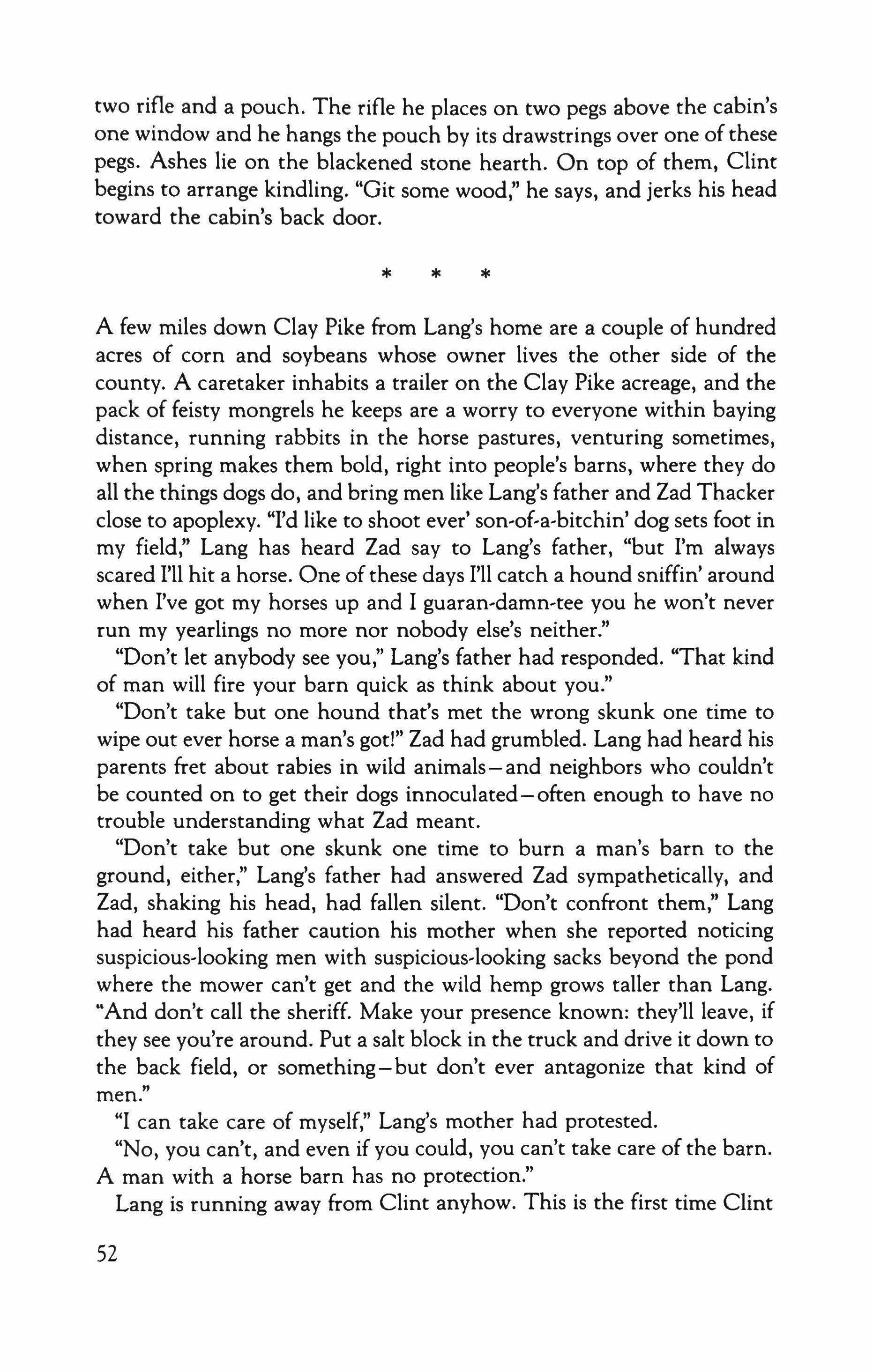
A few miles down Clay Pike from Lang's home are a couple of hundred acres of corn and soybeans whose owner lives the other side of the county. A caretaker inhabits a trailer on the Clay Pike acreage, and the pack of feisty mongrels he keeps are a worry to everyone within baying distance, running rabbits in the horse pastures, venturing sometimes, when spring makes them bold, right into people's barns, where they do all the things dogs do, and bring men like Lang's father and Zad Thacker close to apoplexy. "I'd like to shoot ever' son-of-a-bitchin' dog sets foot in my field," Lang has heard Zad say to Lang's father, "but I'm always scared I'll hit a horse. One ofthese days I'll catch a hound sniffin' around when I've got my horses up and I guaran-damn-tee you he won't never run my yearlings no more nor nobody else's neither."
"Don't let anybody see you," Lang's father had responded. "That kind of man will fire your barn quick as think about you."
"Don't take but one hound that's met the wrong skunk one time to wipe out ever horse a man's got!" Zad had grumbled. Lang had heard his parents fret about rabies in wild animals-and neighbors who couldn't be counted on to get their dogs innoculated - often enough to have no trouble understanding what Zad meant.
"Don't take but one skunk one time to burn a man's barn to the ground, either," Lang's father had answered Zad sympathetically, and Zad, shaking his head, had fallen silent. "Don't confront them," Lang had heard his father caution his mother when she reported noticing suspicious,looking men with suspicious,looking sacks beyond the pond where the mower can't get and the wild hemp grows taller than Lang. "And don't call the sheriff. Make your presence known: they'll leave, if they see you're around. Put a salt block in the truck and drive it down to the back field, or something-but don't ever antagonize that kind of men."
"I can take care of myself," Lang's mother had protested. "No, you can't, and even if you could, you can't take care of the barn. A man with a horse barn has no protection."
Lang is running away from Clint anyhow. This is the first time Clint
* * *
52
has left him alone by daylight, and he is heading down the footpath, or what used to be the footpath, when Clint's family lived here. The going is more difficult than he expected; he has already skinned one knee and torn his school pants. He stoops to lift a branch so he can duck under it and a stunning pain stabs his free arm. The shock runs clear to his armpit. He lurches backward, looking around horrified for the snake; after a few moments he realizes that he has brushed against nettles.
The pain lasts and lasts, and spit is no help. Lang keeps walking while he rubs. Once he finds the clearing, there will be a road, and though he does not know where it leads, it will, he reasons, lead somewhere that other cars are.
The barn will have to be guarded. Burying mines around it to blow Clint up, the way Northkoreans do, has to be ruled out. Even if no horse ever got loose, how would the two cats be kept off them? Once Lang has explained to his parents, they will be sure someone sits in the tackroom every night until Clint is caught, just the way they do when a mare is due to foal, except now with the light out, of course. Picturing Clint's capture, his astonishment and rage, his humiliation, Lang fails to hear Clint coming up the path.
Clint declares himselfwith a heavy slap to the side of Lang's head even before he asks where the hell Lang thinks he is going. The belt he was wearing the time Lang kicked him is coming off; Lang turns to run and gets nowhere.
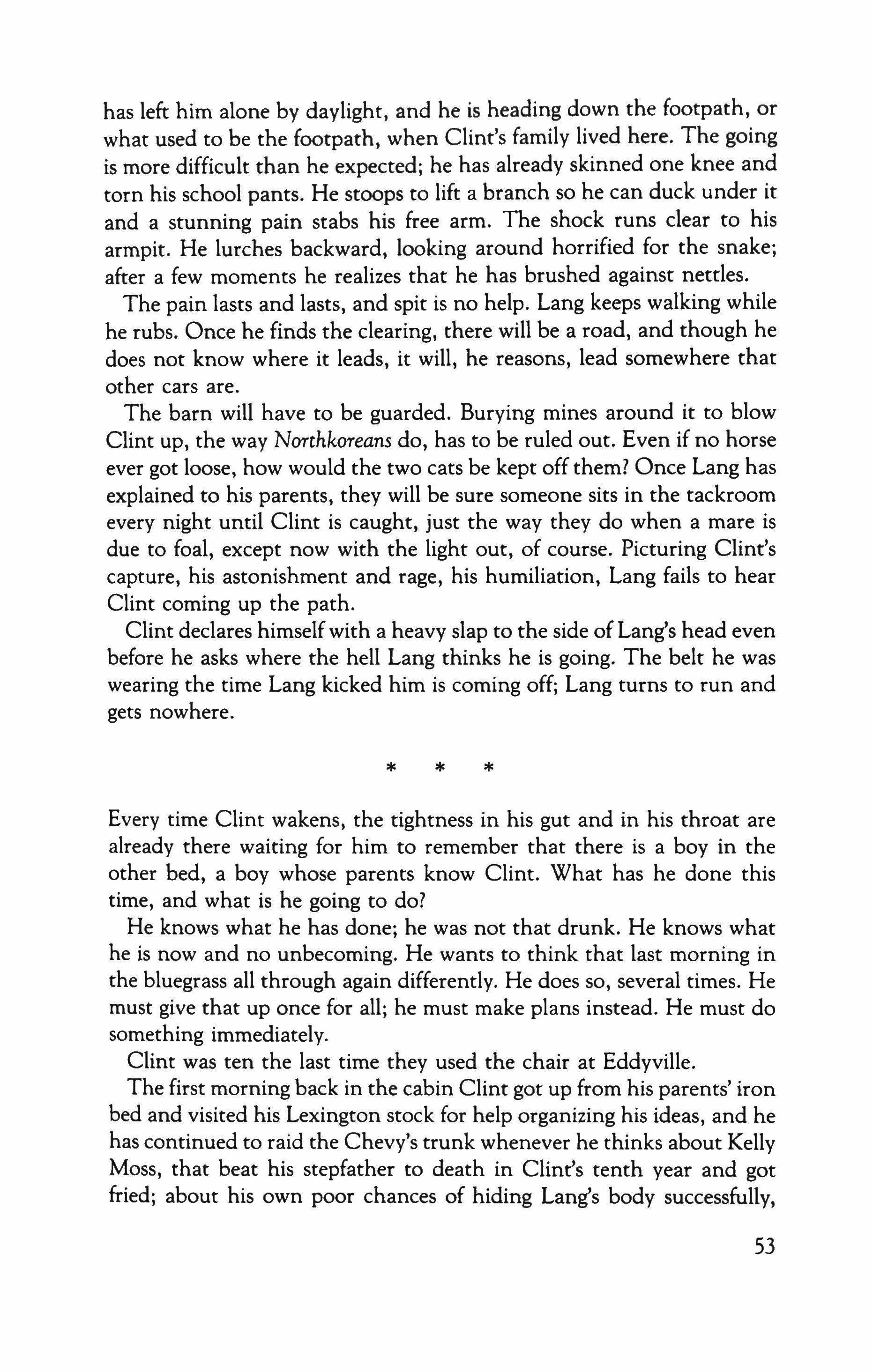
Every time Clint wakens, the tightness in his gut and in his throat are already there waiting for him to remember that there is a boy in the other bed, a boy whose parents know Clint. What has he done this time, and what is he going to do?
He knows what he has done; he was not that drunk. He knows what he is now and no unbecoming. He wants to think that last morning in the bluegrass all through again differently. He does so, several times. He must give that up once for all; he must make plans instead. He must do something immediately.
Clint was ten the last time they used the chair at Eddyville.
The first morning back in the cabin Clint got up from his parents' iron bed and visited his Lexington stock for help organizing his ideas, and he has continued to raid the Chevy's trunk whenever he thinks about Kelly Moss, that beat his stepfather to death in Clint's tenth year and got fried; about his own poor chances of hiding Lang's body successfully,
* * *
53
and poorer still of simply abandoning him and running. He must do something, immediately.
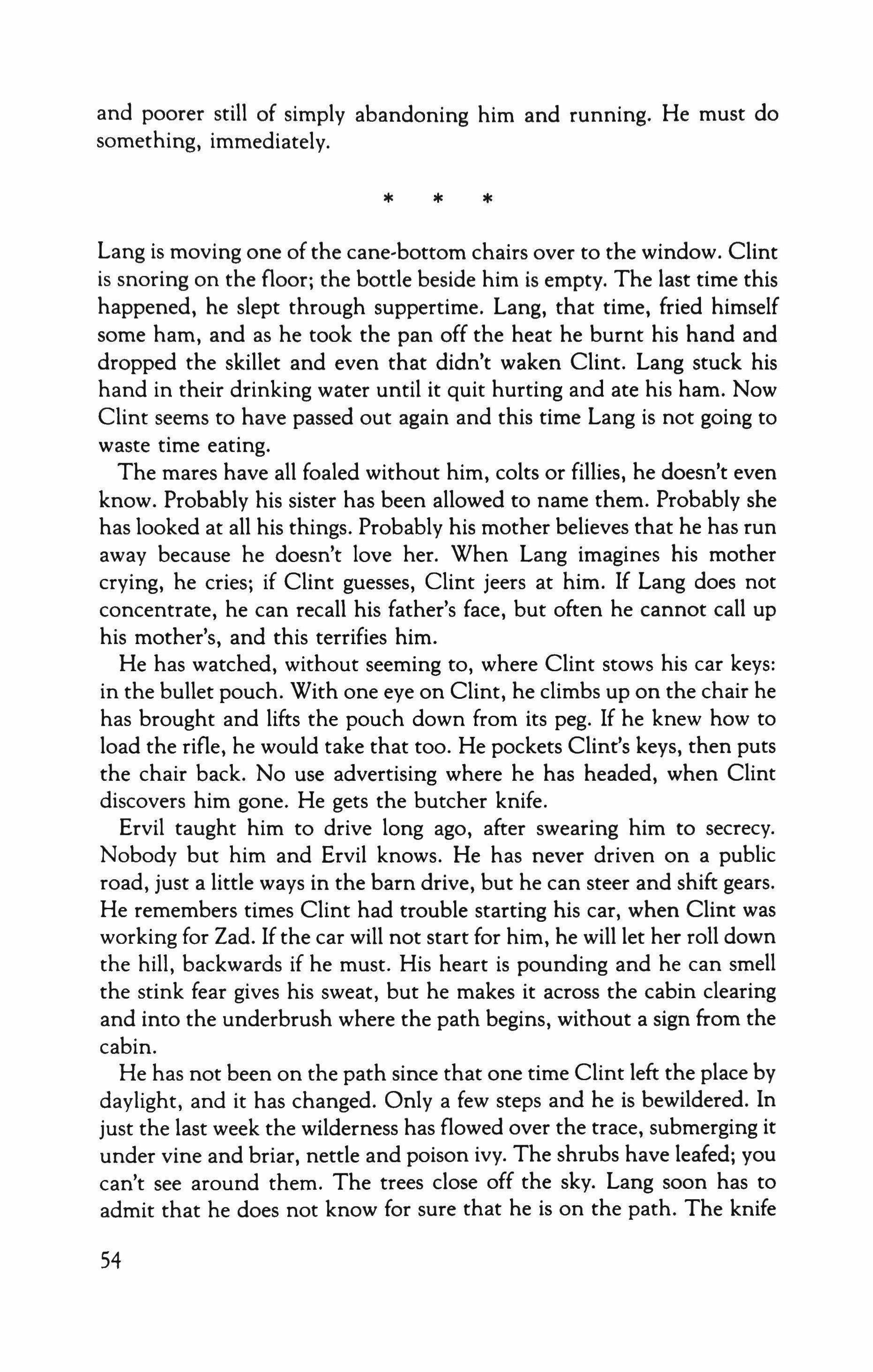
Lang is moving one of the cane-bottom chairs over to the window. Clint is snoring on the floor; the bottle beside him is empty. The last time this happened, he slept through suppertime. Lang, that time, fried himself some ham, and as he took the pan off the heat he burnt his hand and dropped the skillet and even that didn't waken Clint. Lang stuck his hand in their drinking water until it quit hurting and ate his ham. Now Clint seems to have passed out again and this time Lang is not going to waste time eating.
The mares have all foaled without him, colts or fillies, he doesn't even know. Probably his sister has been allowed to name them. Probably she has looked at all his things. Probably his mother believes that he has run away because he doesn't love her. When Lang imagines his mother crying, he cries; if Clint guesses, Clint jeers at him. If Lang does not concentrate, he can recall his father's face, but often he cannot call up his mother's, and this terrifies him.
He has watched, without seeming to, where Clint stows his car keys: in the bullet pouch. With one eye on Clint, he climbs up on the chair he has brought and lifts the pouch down from its peg. If he knew how to load the rifle, he would take that too. He pockets Clint's keys, then puts the chair back. No use advertising where he has headed, when Clint discovers him gone. He gets the butcher knife.
Ervil taught him to drive long ago, after swearing him to secrecy. Nobody but him and Ervil knows. He has never driven on a public road, just a little ways in the barn drive, but he can steer and shift gears. He remembers times Clint had trouble starting his car, when Clint was working for Zad. If the car will not start for him, he will let her roll down the hill, backwards if he must. His heart is pounding and he can smell the stink fear gives his sweat, but he makes it across the cabin clearing and into the underbrush where the path begins, without a sign from the cabin.
He has not been on the path since that one time Clint left the place by daylight, and it has changed. Only a few steps and he is bewildered. In just the last week the wilderness has flowed over the trace, submerging it under vine and briar, nettle and poison ivy. The shrubs have leafed; you can't see around them. The trees close off the sky. Lang soon has to admit that he does not know for sure that he is on the path. The knife
* * *
54
that he brought for the occasional obstruction-an inconvenient rope of honeysuckle, a nettle to take vengeance on - he is using almost continually.
From time to time he stops hacking and listens. Clint will not take him by surprise this time. He hears no human sound. He has heard no human sound since Clint brought him here that he or Clint didn't make-not a car start, not a dog bark. How far does this forest flow, over how many miles of hills, how many valleys?
By late afternoon Lang is exhausted, and he knows that he is lost. He and Clint didn't take anywhere near this long to walk from car to cabin. He has had nothing to eat or drink for hours. The woodpeckers shrieking in the trees seem to be jeering at him. He has no idea where he is. A few times he has come upon a wilting vine that he has recognized as one he cut himself-another minute further and no one alive might ever have stood where he was standing. His breath comes hard and fast; he has to keep blinking the sweat out of his eyes. The sweat on his back begins to chill him; the woods are getting darker. The realization spreads through him that he is going to spend the night in this woods. His heart begins to pound again. He wants to sit with his back against something, now. He stands still, looking for something, holding his breath against panic, and Clint steps from around a tree.
"I am going to beat the shit out of you,h Clint says, and takes the knife away from him. It is hard to swing a belt there, and Lang never has to give Clint the satisfaction of seeing him cry. Back in the clearing, Clint gets a look at all Lang's scratches and especially the welts where he fell into a nettle patch, and laughs so hard he doesn't beat him anymore. "You're lucky I didn't shoot you," he tells Lang later. "I was about to. I thought you was a bear, thrashin' around in there. I shot a bear under that very tree one time-when I was about your age," he adds cruelly. He knows that Lang's father has never taken Lang hunting.
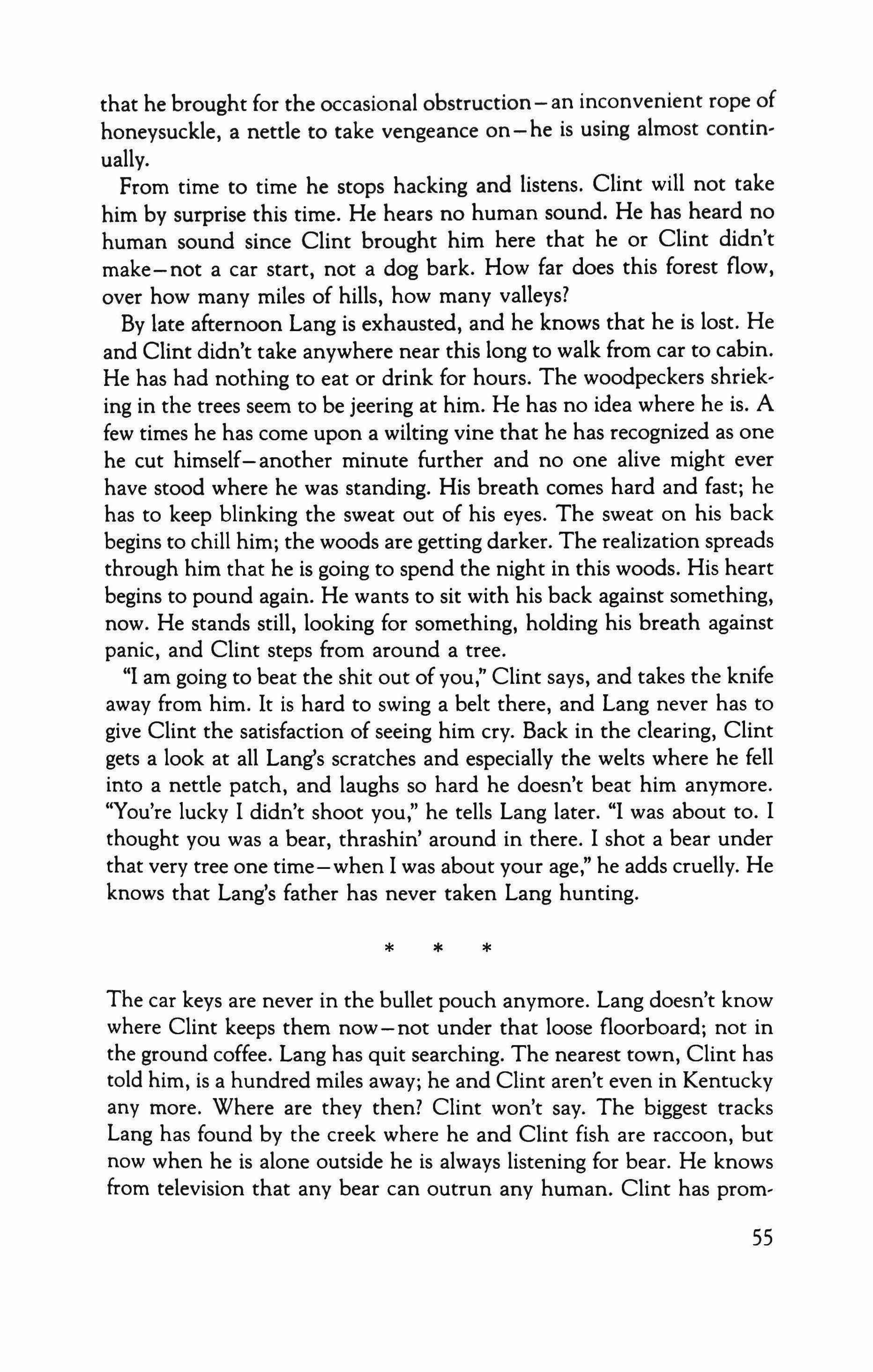
The car keys are never in the bullet pouch anymore. Lang doesn't know where Clint keeps them now-not under that loose floorboard; not in the ground coffee. Lang has quit searching. The nearest town, Clint has told him, is a hundred miles away; he and Clint aren't even in Kentucky any more. Where are they then? Clint won't say. The biggest tracks Lang has found by the creek where he and Clint fish are raccoon, but now when he is alone outside he is always listening for bear. He knows from television that any bear can outrun any human. Clint has prom-
* * *
55
ised to take him home as soon as Clint finishes the little business he came up there to do. Lang has thought a lot about what might have happened if he had got completely lost those times he tried to run away, so lost Clint never even found his body. If he had died of starvation or a bear had torn him apart, his parents never would have known they had to guard the barn, and Clint would have burnt up Lagoon and Thankless and Blithe and both yearlings and all three foals. Now that Lang has decided to wait for Clint to finish his business, not to try to run away any more, he has stopped dreaming about the mares' eyeballs exploding from the heat the way Clint has told him they do.
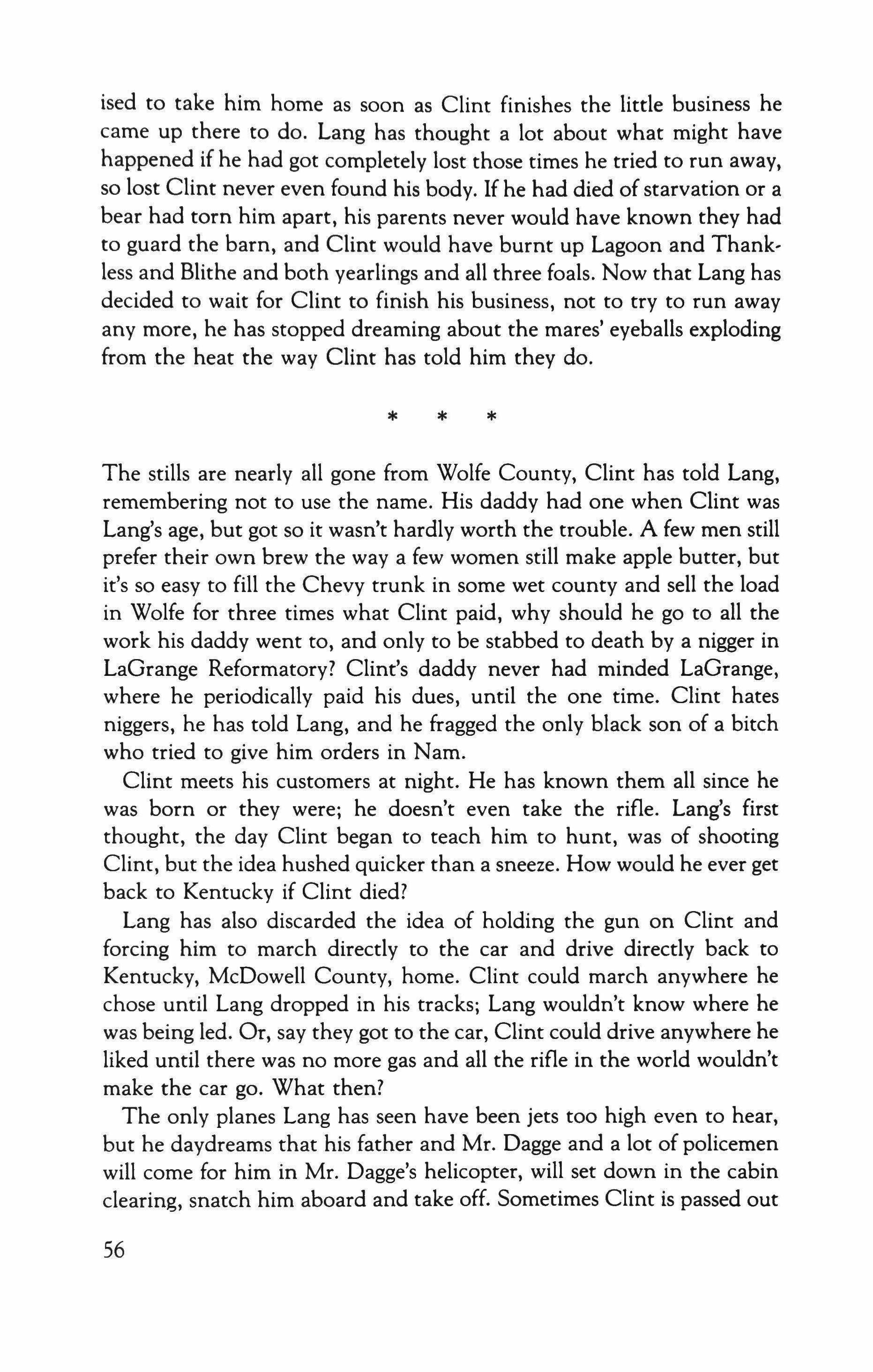
The stills are nearly all gone from Wolfe County, Clint has told Lang, remembering not to use the name. His daddy had one when Clint was Lang's age, but got so it wasn't hardly worth the trouble. A few men still prefer their own brew the way a few women still make apple butter, but it's so easy to fill the Chevy trunk in some wet county and sell the load in Wolfe for three times what Clint paid, why should he go to all the work his daddy went to, and only to be stabbed to death by a nigger in LaGrange Reformatory? Clint's daddy never had minded LaGrange, where he periodically paid his dues, until the one time. Clint hates niggers, he has told Lang, and he fragged the only black son of a bitch who tried to give him orders in Nam.
Clint meets his customers at night. He has known them all since he was born or they were; he doesn't even take the rifle. Lang's first thought, the day Clint began to teach him to hunt, was of shooting Clint, but the idea hushed quicker than a sneeze. How would he ever get back to Kentucky if Clint died?
Lang has also discarded the idea of holding the gun on Clint and forcing him to march directly to the car and drive directly back to Kentucky, McDowell County, home. Clint could march anywhere he chose until Lang dropped in his tracks; Lang wouldn't know where he was being led. Or, say they got to the car, Clint could drive anywhere he liked until there was no more gas and all the rifle in the world wouldn't make the car go. What then?
The only planes Lang has seen have been jets too high even to hear, but he daydreams that his father and Mr. Dagge and a lot of policemen will come for him in Mr. Dagge's helicopter, will set down in the cabin clearing, snatch him aboard and take off. Sometimes Clint is passed out
* * *
56
on the cabin floor so drunk he never hears them. Sometimes he runs out of the cabin after Lang, and the police shoot him.
The brooding silence of the hills in darkness overwhelms Lang. Sitting on the steps with the twenty-two on his knees, waiting for whatever may assault the garden, he tells himself that while his backbone touches the top step, no ghost can snatch him. He prays that no animal will rustle the corn and force him to move. He doesn't want to find out whether he is more afraid of the ghosts or of the beating Clint will give him if something spoils the corn.
Two weeks ago, when a waxing moon held the floating dead at bay, Lang shot a raccoon.
Clint agreed that the skin should be his. Lang imagined wearing to school the hat his mother should make of this skin, imagined telling Breck how he himself had shot the coon. Clint has told Lang that he will take Lang home when school starts again in September. Lang is worried that they may make him repeat: he has missed most of April and every bit of May.
Clint didn't tell Lang he should tan the hide, and the skin was stinking before they even finished eating the meat. Clint laughed and told Lang to bury it. Then he sat down with one of those pint bottles and Lang picked the skin up with a stick and threw it in the creek.
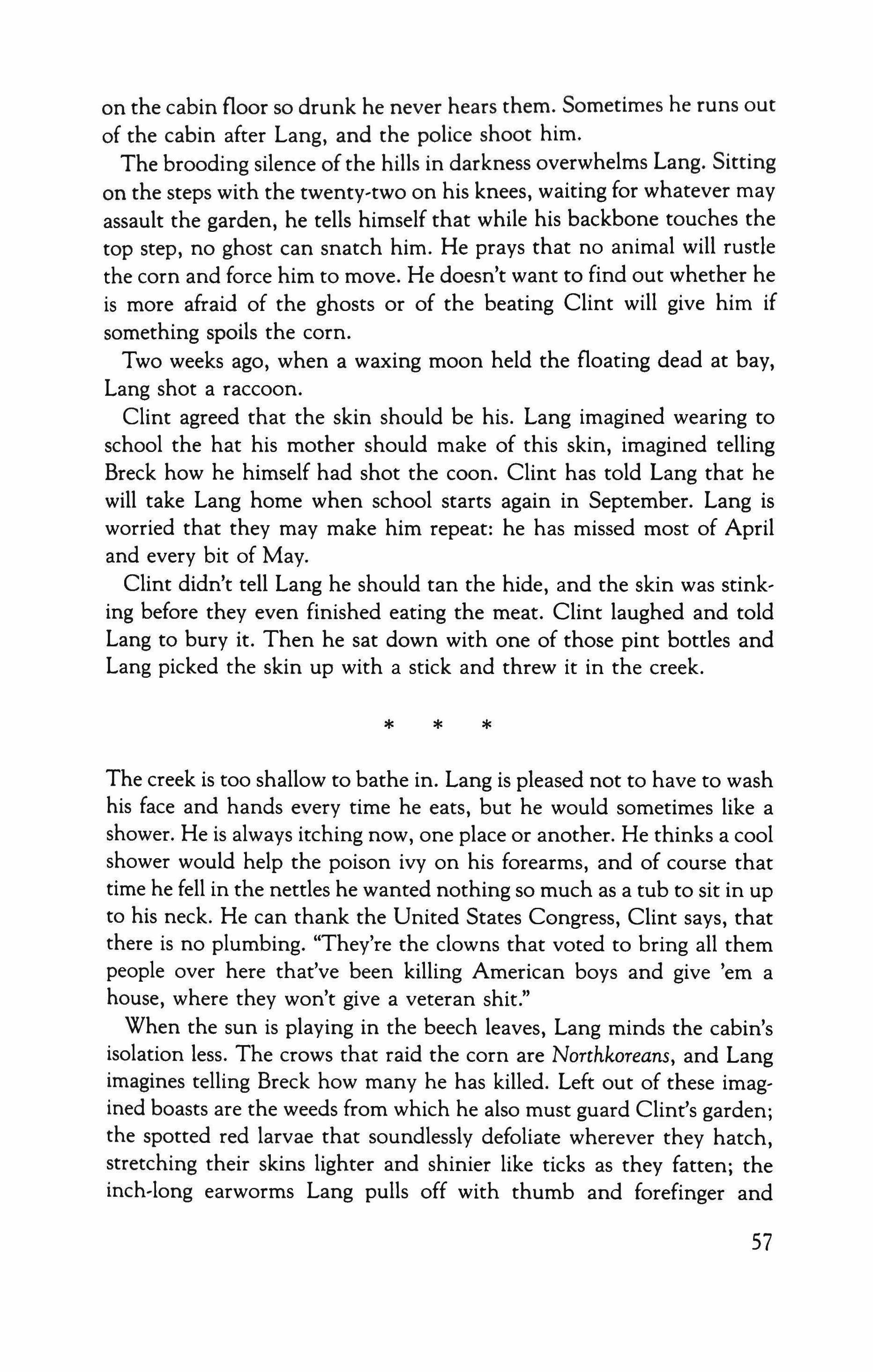
The creek is too shallow to bathe in. Lang is pleased not to have to wash his face and hands every time he eats, but he would sometimes like a shower. He is always itching now, one place or another. He thinks a cool shower would help the poison ivy on his forearms, and of course that time he fell in the nettles he wanted nothing so much as a tub to sit in up to his neck. He can thank the United States Congress, Clint says, that there is no plumbing. "They're the clowns that voted to bring all them people over here that've been killing American boys and give 'em a house, where they won't give a veteran shit."
When the sun is playing in the beech leaves, Lang minds the cabin's isolation less. The crows that raid the corn are Northkoreans, and Lang imagines telling Breck how many he has killed. Left out of these imagined boasts are the weeds from which he also must guard Clint's garden; the spotted red larvae that soundlessly defoliate wherever they hatch, stretching their skins lighter and shinier like ticks as they fatten; the inch-long earworms Lang pulls off with thumb and forefinger and
* * *
57
smashes between stones. Sometimes he imagines he is smashing Clint Penn.
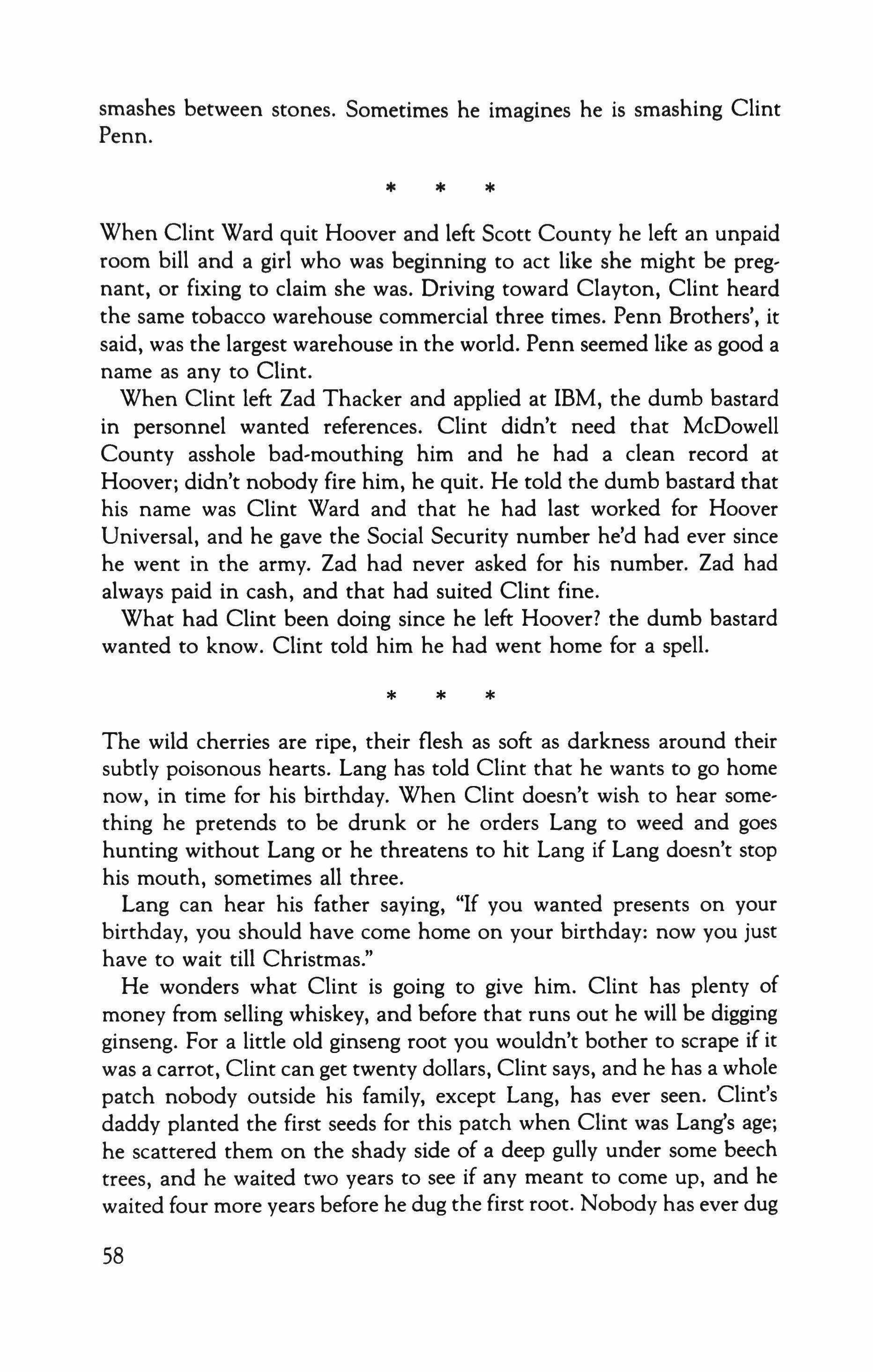
When Clint Ward quit Hoover and left Scott County he left an unpaid room bill and a girl who was beginning to act like she might be pregnant, or fixing to claim she was. Driving toward Clayton, Clint heard the same tobacco warehouse commercial three times. Penn Brothers', it said, was the largest warehouse in the world. Penn seemed like as good a name as any to Clint.
When Clint left Zad Thacker and applied at IBM, the dumb bastard in personnel wanted references. Clint didn't need that McDowell County asshole bad-mouthing him and he had a clean record at Hoover; didn't nobody fire him, he quit. He told the dumb bastard that his name was Clint Ward and that he had last worked for Hoover Universal, and he gave the Social Security number he'd had ever since he went in the army. Zad had never asked for his number. Zad had always paid in cash, and that had suited Clint fine.
What had Clint been doing since he left Hoover? the dumb bastard wanted to know. Clint told him he had went home for a spell.
The wild cherries are ripe, their flesh as soft as darkness around their subtly poisonous hearts. Lang has told Clint that he wants to go home now, in time for his birthday. When Clint doesn't wish to hear something he pretends to be drunk or he orders Lang to weed and goes hunting without Lang or he threatens to hit Lang if Lang doesn't stop his mouth, sometimes all three.
Lang can hear his father saying, "If you wanted presents on your birthday, you should have come home on your birthday: now you just have to wait till Christmas."
He wonders what Clint is going to give him. Clint has plenty of money from selling whiskey, and before that runs out he will be digging ginseng. For a little old ginseng root you wouldn't bother to scrape if it was a carrot, Clint can get twenty dollars, Clint says, and he has a whole patch nobody outside his family, except Lang, has ever seen. Clint's daddy planted the first seeds for this patch when Clint was Lang's age; he scattered them on the shady side of a deep gully under some beech trees, and he waited two years to see if any meant to come up, and he waited four more years before he dug the first root. Nobody has ever dug
* * *
* * *
58
a plant from this patch before it had four years' growth to it and its berries were blazing ripe, Clint says; that's the way to make a patch pay. His daddy's special narrow-bladed hoe hangs on a peg across from Clint's rifle just waiting for this summer's berries to flush. August is when ginseng ripens.
Anybody who would dig sang before it gets its growth and before it ripens is a fool or a son of a bitch, Clint says, but the hills are full of such. Many's the man has gone out of a morning and found every plant in a patch he'd been watching gone, not just this year's but next year's and the next's. The only lies Clint ever heard his mother tell, Clint says, were when somebody asked her where his daddy dug sang.
If anybody was to come poking around his sang, Clint says, Clint would shoot him.

Clint does not admit to himself that he has come to count on the boy's company. He wishes he had never laid eyes on him.
Clint's last Friday in Lexington he loaded his trunk. Saturday was a half workday for him, and he was planning a weekend trip to Wolfe County. Friday night a friend from his days at Hoover Universal came by. The friend's name was Odis Reavely, and he was wearing a new suit.
Clint is still wearing army pants. He has pointed out to Lang that if he had went to prison, they would have give him a suit when he got out, but since all he done was serve his country, they given him nothing. For a while after Clint got back from Nam he made enough to get by on setting tobacco every spring on a big horse-farm down near Georgetown. Then one August his mother had a fever and belly-pain that made her cry out like a woman in childbed. As Clint got her halfway down the hill this pain suddenly ended and she said her prayers had cured her, but Clint took her to the doctor and the doctor sent her to the hospital to be cut open and there she died before morning. "It was her appendix," the hospital doctor told Clint. "Why didn't you bring her in sooner?"
Then Clint did not want to stay in the cabin alone and took a job making Volkswagen parts at a Georgetown plant. That's where he met Odis.
In 1979 when gasoline started to cost more than milk and rumors of layoffs rustled through the plant, Clint quit. Nobody was going to run him off like a dog, he told Odis, but Odis stayed. Clint became Zad's hand for $2.30 an hour.
* * *
59

Clint seriously considered killing Zad the day Zad fired him in front of Milly, but when IBM told him what they paid, he saw Zad had done him a favor. He felt sorry for Odis, who was probably living somewhere on unemployment. Then Odis came to see him, in his new suit.
Clint took Odis out and showed him what was in the Chevy trunk, and, with a lordly gesture, extracted a bottle just for the two of them.
Next morning, Saturday, Clint was half an hour late punching in. By eleven he had broken three tools and a machine and told his foreman what he could do with the parts and been fired.
Wednesday morning Clint counted the empty bottles in his room. He counted them again, then went out to the Chevy for another pint. Sunday night, he remembered, he had gone for a drive. Tuesday he had slept. Monday he did not remember. He drank slowly. Perhaps not Sunday either; perhaps some of his seeming Sunday memories were only part of Tuesday's dreams. The pint still sloshed a little when he decided what he would do; he stuffed it in his pocket. Leaving the empty bottles for his landlady, he put everything he owned into his car and drove to the nearest Hardee's.
Coffee and the cold wind sluicing his face through the car window helped, but-undreamlike-his Sunday nightmare kept getting clearer and, by the time he came co the last curve before Thacker's, he had sweated through his shirt. The car in the Thacker's driveway was a jolt to his lungs.
He had meant to go by quickly, but now he eased his foot off the accelerator. He wasn't close enough to read the little round Farm Bureau Insurance sticker on the intruder's dash, but he knew whose salt-pork face he would see if the spindly figure in its dry-cleaned suit should turn away from Milly and glance in his direction. The shed was ashes all right.
Milly was pinning socks on the line and laughing up at that four-eyed shit-head, her breasts lifting and subsiding with her arms as she reached for the line, the basket, the line, a little trick she did on purpose. Clint imagined backhanding her. Where was her mother, who never let him hang around Milly two minutes? Looking out the kitchen window drooling down her warty chin, he bet: anybody that worked in a tie seemed like Jesus come back, to that pitiful family. Clint accelerated so hard he had to brake mid-curve to avoid a sycamore; when the empty beer cans rolled over and bumped his shoe he kicked them back so hard he dented them.
By this time he was in sight of the horse doctor's prissy little show-off farm.
60
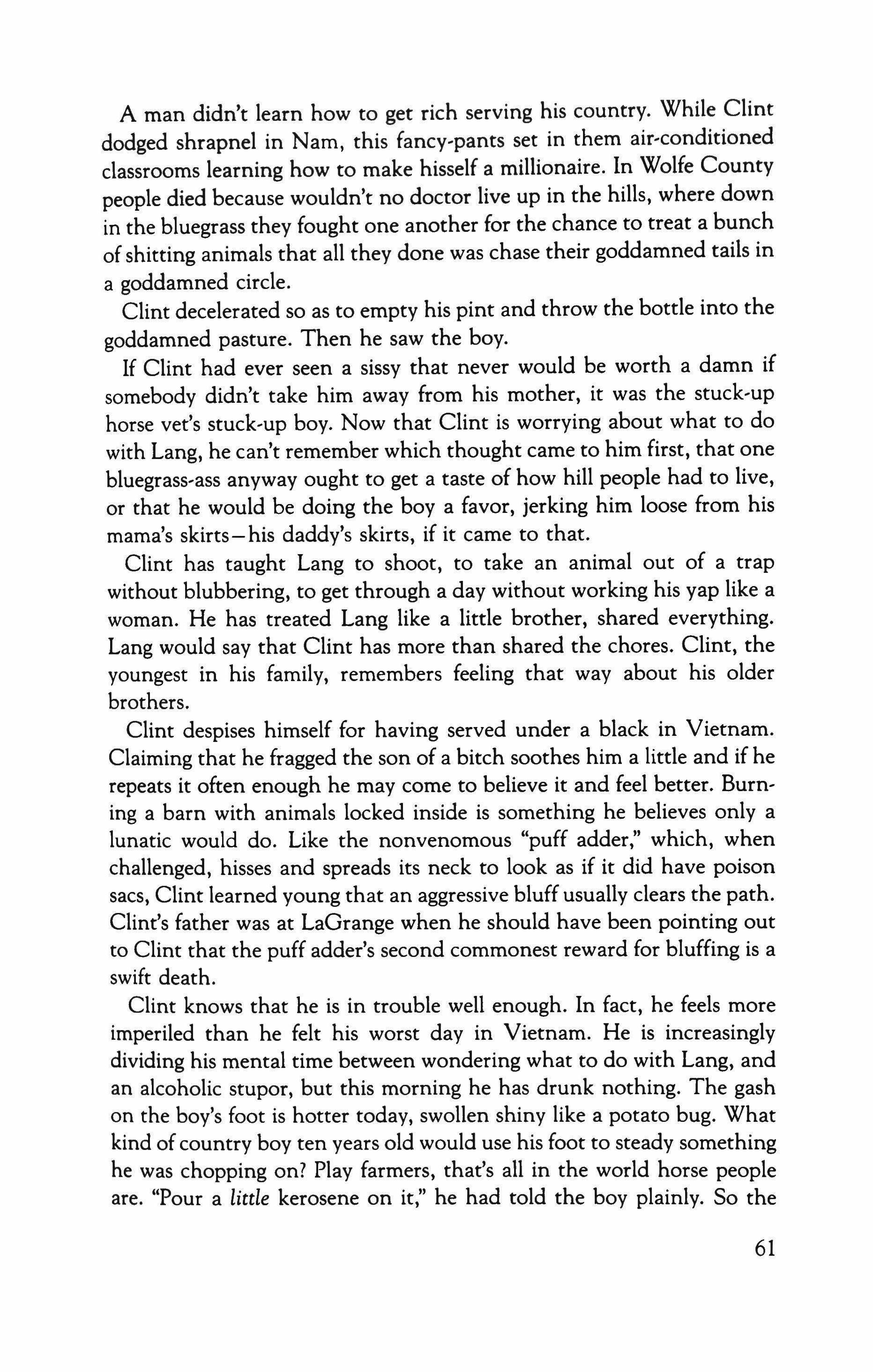
A man didn't learn how to get rich serving his country. While Clint dodged shrapnel in Nam, this fancy-pants set in them air-conditioned classrooms learning how to make hisself a millionaire. In Wolfe County people died because wouldn't no doctor live up in the hills, where down in the bluegrass they fought one another for the chance to treat a bunch of shirting animals that all they done was chase their goddamned tails in a goddamned circle.
Clint decelerated so as to empty his pint and throw the bottle into the goddamned pasture. Then he saw the boy.
If Clint had ever seen a sissy that never would be worth a damn if somebody didn't take him away from his mother, it was the stuck-up horse vet's stuck-up boy. Now that Clint is worrying about what to do with Lang, he can't remember which thought came to him first, that one bluegrass-ass anyway ought to get a taste of how hill people had to live, or that he would be doing the boy a favor, jerking him loose from his mama's skirts-his daddy's skirts, if it came to that.
Clint has taught Lang to shoot, to take an animal out of a trap without blubbering, to get through a day without working his yap like a woman. He has treated Lang like a little brother, shared everything. Lang would say that Clint has more than shared the chores. Clint, the youngest in his family, remembers feeling that way about his older brothers.
Clint despises himself for having served under a black in Vietnam. Claiming that he fragged the son of a bitch soothes him a little and if he repeats it often enough he may come to believe it and feel better. Burning a barn with animals locked inside is something he believes only a lunatic would do. Like the nonvenomous "puff adder," which, when challenged, hisses and spreads its neck to look as if it did have poison sacs, Clint learned young that an aggressive bluff usually clears the path. Clint's father was at LaGrange when he should have been pointing out to Clint that the puff adder's second commonest reward for bluffing is a swift death.
Clint knows that he is in trouble well enough. In fact, he feels more imperiled than he felt his worst day in Vietnam. He is increasingly dividing his mental time between wondering what to do with Lang, and an alcoholic stupor, but this morning he has drunk nothing. The gash on the boy's foot is hotter today, swollen shiny like a potato bug. What kind of country boy ten years old would use his foot to steady something he was chopping on? Play farmers, that's all in the world horse people are. "Pour a little kerosene on it," he had told the boy plainly. So the
61
dumb little bastard takes and douses the whole foot, and the skin blisters.
Clint personally mixed lard with soot and spread it on the wound thick as mortar, and the bleeding stopped right quick; it wasn't a bad cut. Clint has sure seen worse.
What he sees now is that he has got to have some of that yellow salve. If he could trust the boy, he would take him along to the drugstore, which would get the gunk on him twice as fast.
If he could trust Lang never to tell on him, he would take the boy down to Mountain Parkway before dark.
What Clint wants is not to walk down the brush- and gnat-choked hillside to his car, but to take a bottle and sit with his back against the walls of the darkest corner in the cabin.
Clint has seen men die of blood poisoning.
Once Lang goes home Clint will be a hunted man. He will have to leave these hills, change his name, go he does not know where. He has been trying to remember what he can of a conversation that came up one day at Hoover about South Africa. That was a place, somebody claimed, for a white man who could shoot. He could fill his tank, put Lang out in front of a hospital, or a YMCA, and take off.
Other times Clint knows that whatever he does with Lang, he can never let him go. He has become Lang's prisoner.

Clint is a liar. Lang knows that for sure. The receipt in the bag from the store where Clint bought coal-oil and flour last week said Catesbyville, Kentucky. Lang read those pale letters again and again.
Lang hasn't had his shoes on in three months, so he is surprised to discover that he can't even get his left foot into one, let alone the foot that is swollen purple. As usual, he doesn't know how much time he has. Clint never says where he's going, when he'll be back, counting on Lang's fear that if Lang starts down the path Clint will meet him.
The last thing before leaving, Clint told Lang to water the garden, where even the weeds are wilting, but the creek where Lang dipped his bucket earlier in the summer is only a trickle now. Clint would know that, if he ever helped in the garden. All Clint does anymore is drink; he has even stopped hunting, practically. He did not take notice of Lang's birthday in any way.
If the creek were halfway full, Lang could put his throbbing foot in the cool water.
* * *
62
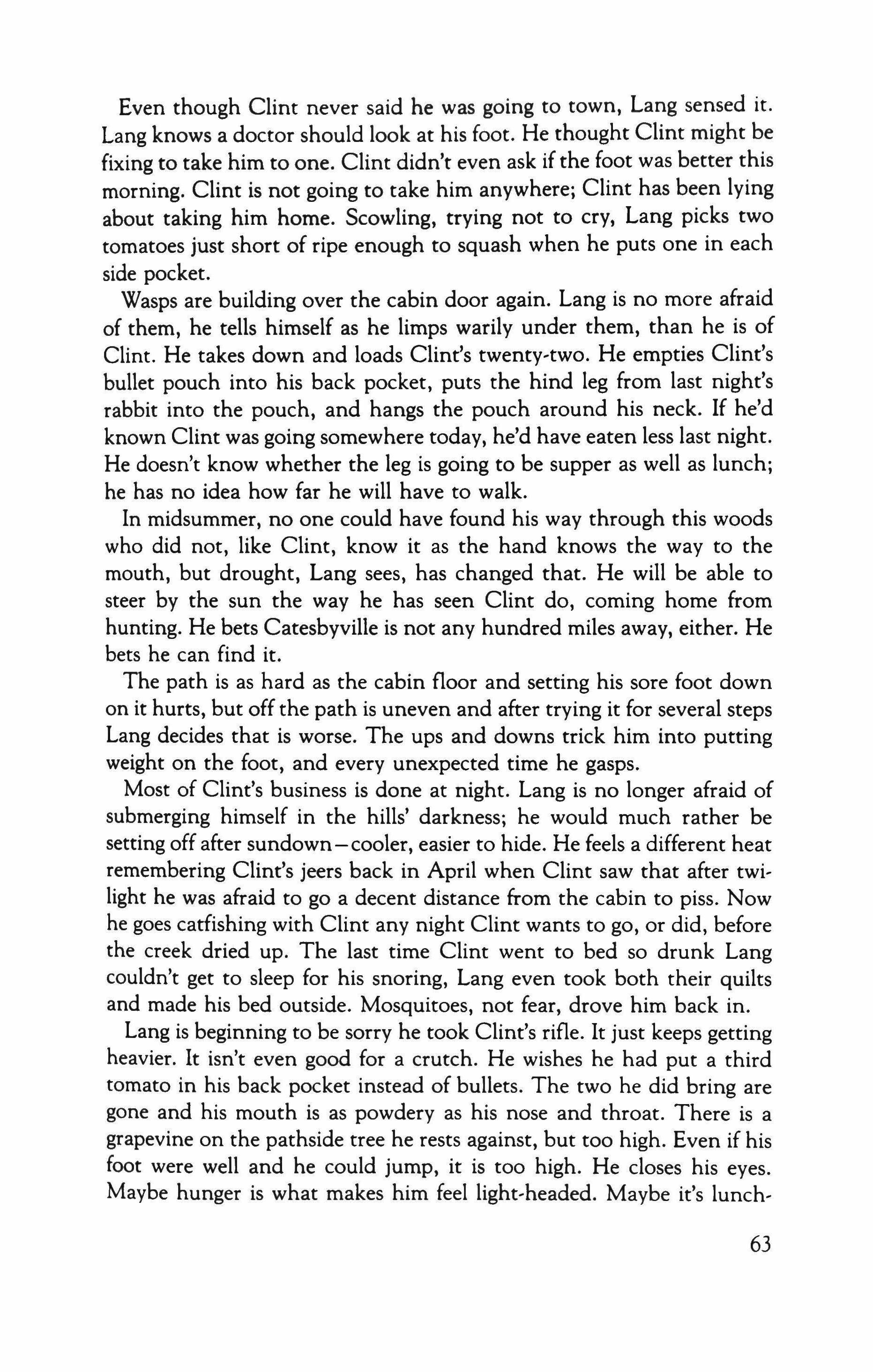
Even though Clint never said he was going to town, Lang sensed it. Lang knows a doctor should look at his foot. He thought Clint might be fixing to take him to one. Clint didn't even ask if the foot was better this morning. Clint is not going to take him anywhere; Clint has been lying about taking him home. Scowling, trying not to cry, Lang picks two tomatoes just short of ripe enough to squash when he puts one in each side pocket.
Wasps are building over the cabin door again. Lang is no more afraid of them, he tells himself as he limps warily under them, than he is of Clint. He takes down and loads Clint's twenty-two. He empties Clint's bullet pouch into his back pocket, puts the hind leg from last night's rabbit into the pouch, and hangs the pouch around his neck. If he'd known Clint was going somewhere today, he'd have eaten less last night. He doesn't know whether the leg is going to be supper as well as lunch; he has no idea how far he will have to walk.
In midsummer, no one could have found his way through this woods who did not, like Clint, know it as the hand knows the way to the mouth, but drought, Lang sees, has changed that. He will be able to steer by the sun the way he has seen Clint do, coming home from hunting. He bets Catesbyville is not any hundred miles away, either. He bets he can find it.
The path is as hard as the cabin floor and setting his sore foot down on it hurts, but off the path is uneven and after trying it for several steps Lang decides that is worse. The ups and downs trick him into putting weight on the foot, and every unexpected time he gasps.
Most of Clint's business is done at night. Lang is no longer afraid of submerging himself in the hills' darkness; he would much rather be setting off after sundown-cooler, easier to hide. He feels a different heat remembering Clint's jeers back in April when Clint saw that after twilight he was afraid to go a decent distance from the cabin to piss. Now he goes catfishing with Clint any night Clint wants to go, or did, before the creek dried up. The last time Clint went to bed so drunk Lang couldn't get to sleep for his snoring, Lang even took both their quilts and made his bed outside. Mosquitoes, not fear, drove him back in.
Lang is beginning to be sorry he took Clint's rifle. It just keeps getting heavier. It isn't even good for a crutch. He wishes he had put a third tomato in his back pocket instead of bullets. The two he did bring are gone and his mouth is as powdery as his nose and throat. There is a grapevine on the pathside tree he rests against, but too high. Even if his foot were well and he could jump, it is too high. He closes his eyes. Maybe hunger is what makes him feel light,headed. Maybe it's lunch,
63
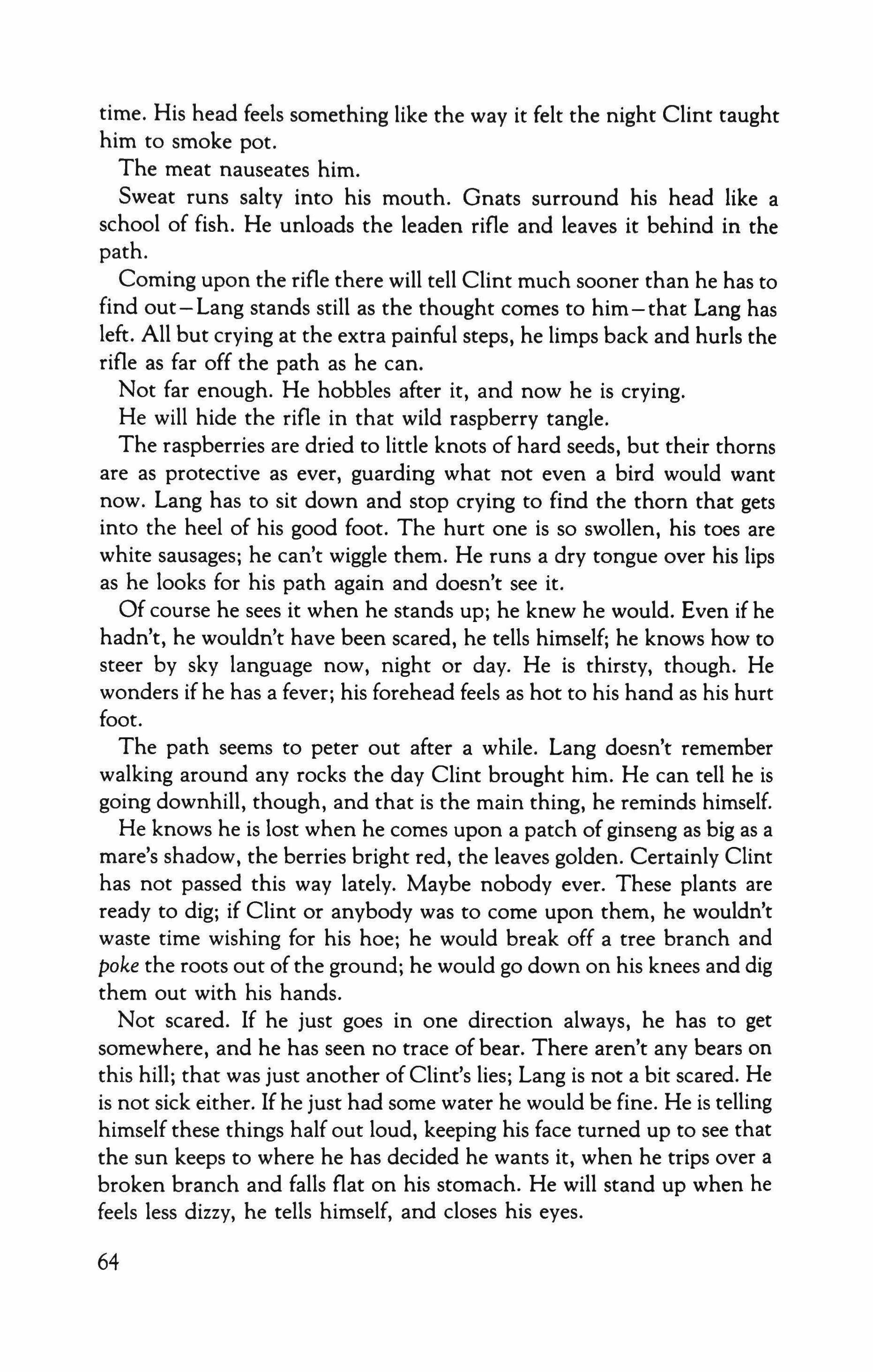
time. His head feels something like the way it felt the night Clint taught him to smoke pot.
The meat nauseates him.
Sweat runs salty into his mouth. Gnats surround his head like a school of fish. He unloads the leaden rifle and leaves it behind in the path.
Coming upon the rifle there will tell Clint much sooner than he has to find out - Lang stands still as the thought comes to him - that Lang has left. All but crying at the extra painful steps, he limps back and hurls the rifle as far off the path as he can.
Not far enough. He hobbles after it, and now he is crying. He will hide the rifle in that wild raspberry tangle.
The raspberries are dried to little knots of hard seeds, but their thorns are as protective as ever, guarding what not even a bird would want now. Lang has to sit down and stop crying to find the thorn that gets into the heel of his good foot. The hurt one is so swollen, his toes are white sausages; he can't wiggle them. He runs a dry tongue over his lips as he looks for his path again and doesn't see it.
Of course he sees it when he stands up; he knew he would. Even if he hadn't, he wouldn't have been scared, he tells himself; he knows how to steer by sky language now, night or day. He is thirsty, though. He wonders if he has a fever; his forehead feels as hot to his hand as his hurt foot.
The path seems to peter out after a while. Lang doesn't remember walking around any rocks the day Clint brought him. He can tell he is going downhill, though, and that is the main thing, he reminds himself.
He knows he is lost when he comes upon a patch of ginseng as big as a mare's shadow, the berries bright red, the leaves golden. Certainly Clint has not passed this way lately. Maybe nobody ever. These plants are ready to dig; if Clint or anybody was to come upon them, he wouldn't waste time wishing for his hoe; he would break off a tree branch and poke the roots out of the ground; he would go down on his knees and dig them out with his hands.
Not scared. If he just goes in one direction always, he has to get somewhere, and he has seen no trace of bear. There aren't any bears on this hill; that was just another of Clint's lies; Lang is not a bit scared. He is not sick either. If he just had some water he would be fine. He is telling himself these things half out loud, keeping his face turned up to see that the sun keeps to where he has decided he wants it, when he trips over a broken branch and falls flat on his stomach. He will stand up when he feels less dizzy, he tells himself, and closes his eyes.
64

When he wakens he is sweaty, stiff-necked and electrified. He has heard voices.
These are the first voices besides Clint's that Lang has heard since Clint turned his car radio off that day. He sits up to prove he isn't dreaming.
Two boys are coming up the hill. Lang's mouth opens and in his mind he hears Clint saying, When somebody else is talkin', you're the one leamin'. Clint used to tell him that all the time, before Lang caught on. One of the approaching boys is much bigger than Lang, the other no smaller. Lang's mouth closes, and though his heart is pounding like a post driver, he waits for the two boys to see him, waits for them to say the first word.
The taller boy - he is as tall as Clint, but very skinny - carries a hoe, and from its narrow blade, Lang knows what is in the sack that swings from the strap across his shoulder. The younger boy carries a pronged stick. When they see him, the boys stop in their tracks, and Lang has seen a stray cat, halted in Lang's barnyard by the sudden appearance of Lang's tabby Katisha, stare at Katisha just the way these boys are looking at him now. Lang stares back.
They are wearing overalls, the younger boy's a size too big, its legs rolled up. His shoes have burst their side stitches. Neither boy wears socks, or for that matter, a shirt. Their faces are sharp and brown as deer's. Lang sees the taller boy's eyes narrow, his Adam's apple move, and senses that he is about to be challenged. "I know where there's a whole big patch of that 'ere sang," Lang says.
65


w. S. Di Piero
Seven Poems and Two Essays

The Apricot Trees

After the toothy limbs pruned in February lay tangled on the ground, so that their snares might claw or snap shut where you walked, one branch arced up and bit your thigh, inside, and you slapped the spot where blood seeped and trailed, a red snailtrack pointing toward your belly.
After years of marriage and two years tending four trees, our share of remnants left from orchards that once shaded all these neighborhoods, the cycle led us to imagine one uncontested season of preserves and jams glowing in the cupboard, in the half-dark.
One bough I hadn't braced in time soon snapped. Late nights, to reach our door we had to lean, silent and drunk, around that torn point then stoop beneath sagging arcades of fruit, green, orange, gold succulence of summer tedium when things ripen too fast and fall.
When friends stumbled away with knobby sacks, they surely thought it no strange thing that we would leave this place, each other, and the story of the orchards, that we would give away perfection's spoils to anyone who asked. We had enough. Earlier, before the fruit
69
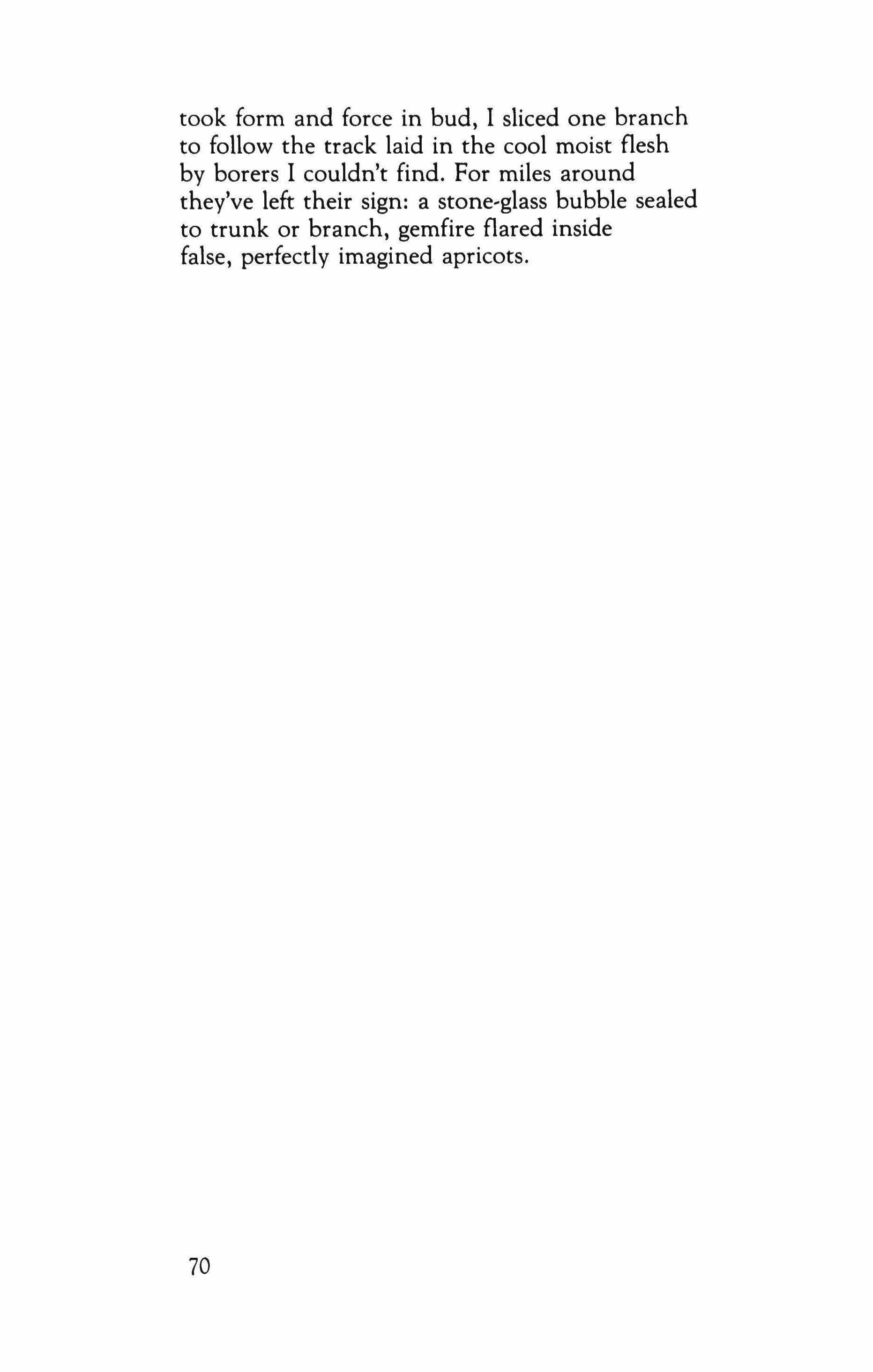
took form and force in bud, I sliced one branch to follow the track laid in the cool moist flesh by borers I couldn't find. For miles around they've left their sign: a stone-glass bubble sealed to trunk or branch, gemfire flared inside false, perfectly imagined apricots.
70
The Cellar Twenty Years Later

The twelve goofed wooden steps even now try to shrug me off, as I stoop to miss the lintel, the powdered timber, where years ago we nailed the yellow horseshoe's horns turned down against bad luck.
That's how we gave the Devil back his own smart gilded work. I must have passed beneath this sign a hundred times, baffled in the force stretched tight between rooms upstairs and dark-shining zones below.
Hugging the wall, I can feel the coal trap snap and shutter wide, then flint-streams flashing light half left outside cheered down the tin chute into the bin. I stood aslant myself, nearly pitching off the stairs into the phaseless dark.
But the horseshoe did its work, holding me in place, saved me from the fall into merely real mineral gravity. It also fixed me in this middle range, homeless, off-balance, listening to the faint songs above my head.
71
The Adoration

The black stargazer lurches closest to the crib, one hand stabbing deep shadow between the rough nest and his gift, the golden urn balanced like fruit on his open palm.
At his heels in December's feeble snowfall, the cheerless, too-white magus
cringes as if he's glimpsed unwanted and too soon his own luxuriant image in the wet churchstones bulking behind the stable. He holds no gift.
Ignored on the stubble lawn by the donkey, lambs, rooster and camels, n

their plastic skins swell and glow as the dark intensifies
the strain of light within that would explode them where they stand.
The angry third studies heaven through the grid of red and green bulbs canopied overhead like carnival, bleeding out the starlight that does not reach the off-center crib where the child, grinning and inattentive, watches His balled fist wag at nothing.
73
The Bugler

The ribbon of sound curves over the heads of mourners choired around blooms, purple sashes, folding-chairs, crimped and foiled in high winds that rock the boy's marbled shako. Listing, heels locked,
he seems made to chase each lacquered tone, stop it at the brightening point where sky soaks it up.
Or call brayed song back, suck it in, graveside, so he can make grief small once it's safe inside.
74
Leopardi's "Alia Luna"
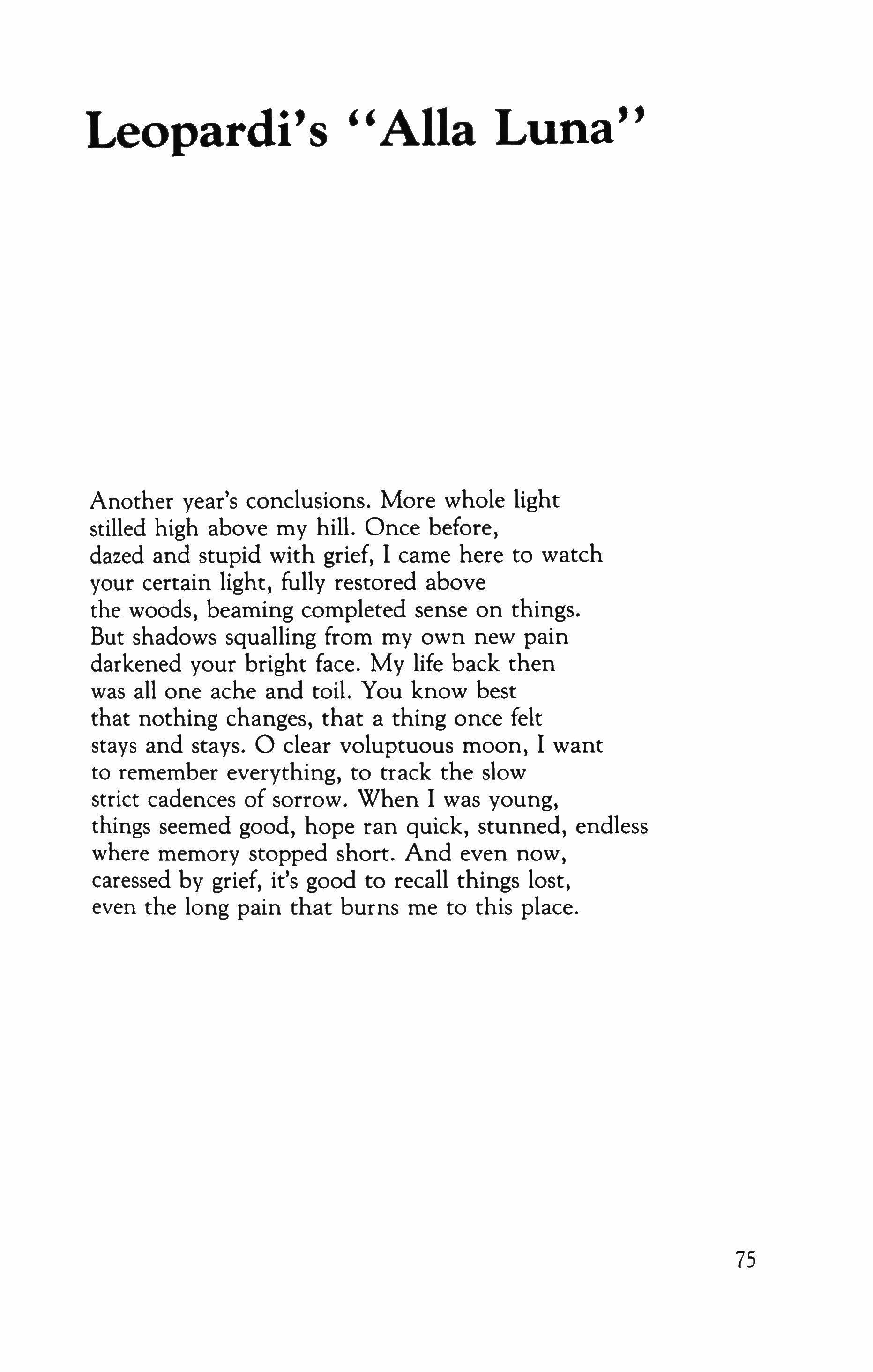
Another year's conclusions. More whole light stilled high above my hill. Once before, dazed and stupid with grief, I came here to watch your certain light, fully restored above the woods, beaming completed sense on things. But shadows squalling from my own new pain darkened your bright face. My life back then was all one ache and toil. You know best that nothing changes, that a thing once felt stays and stays. 0 clear voluptuous moon, I want to remember everything, to track the slow strict cadences of sorrow. When I was young, things seemed good, hope ran quick, stunned, endless where memory stopped short. And even now, caressed by grief, it's good to recall things lost, even the long pain that burns me to this place.
75
The Reading
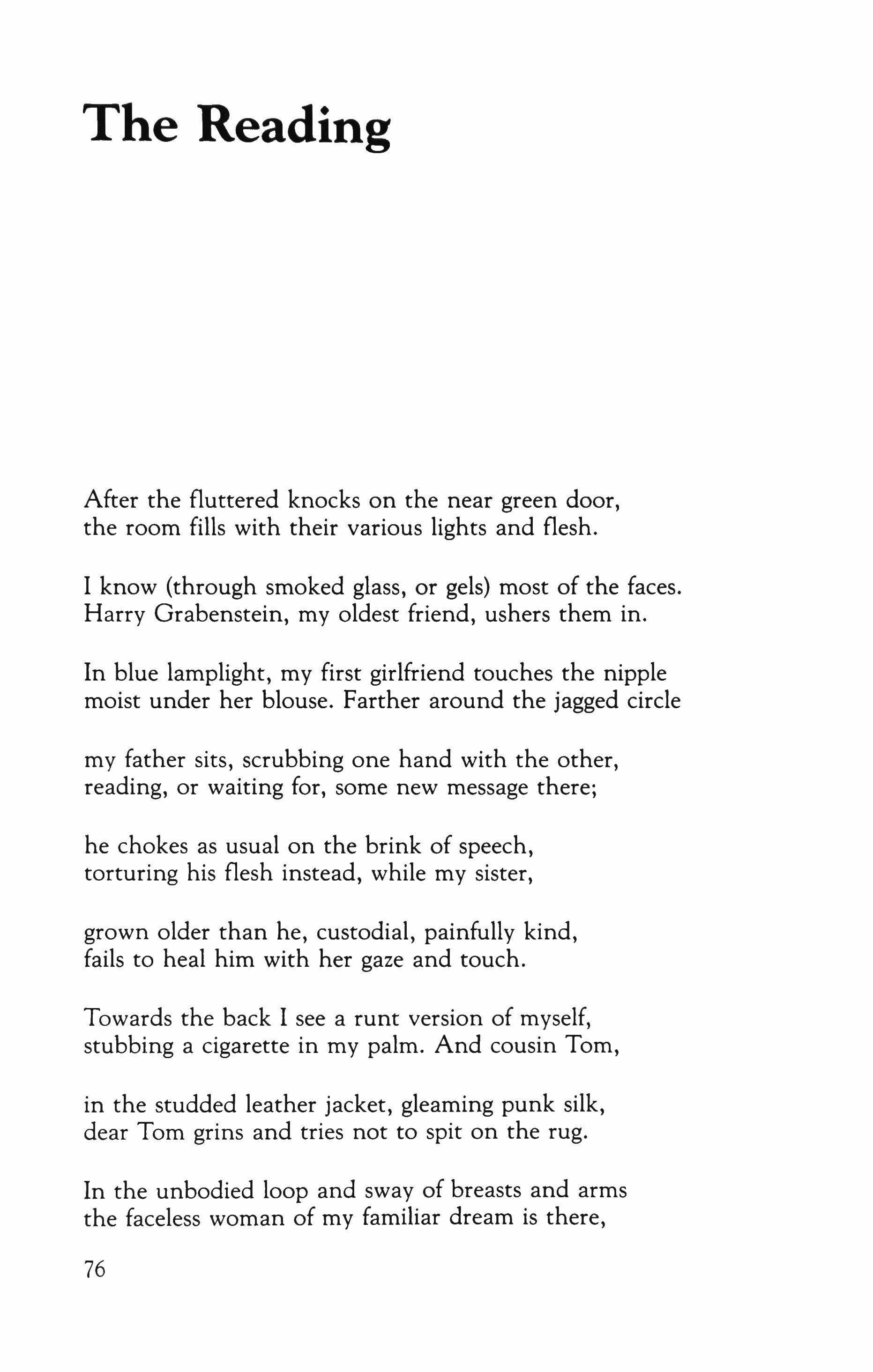
After the fluttered knocks on the near green door, the room fills with their various lights and flesh.
I know (through smoked glass, or gels) most of the faces. Harry Grabenstein, my oldest friend, ushers them in.
In blue lamplight, my first girlfriend touches the nipple moist under her blouse. Farther around the jagged circle
my father sits, scrubbing one hand with the other, reading, or waiting for, some new message there;
he chokes as usual on the brink of speech, torturing his flesh instead, while my sister,
grown older than he, custodial, painfully kind, fails to heal him with her gaze and touch.
Towards the back I see a runt version of myself, stubbing a cigarette in my palm. And cousin Tom,
in the studded leather jacket, gleaming punk silk, dear Tom grins and tries not to spit on the rug.
In the unbodied loop and sway of breasts and arms the faceless woman of my familiar dream is there,
76
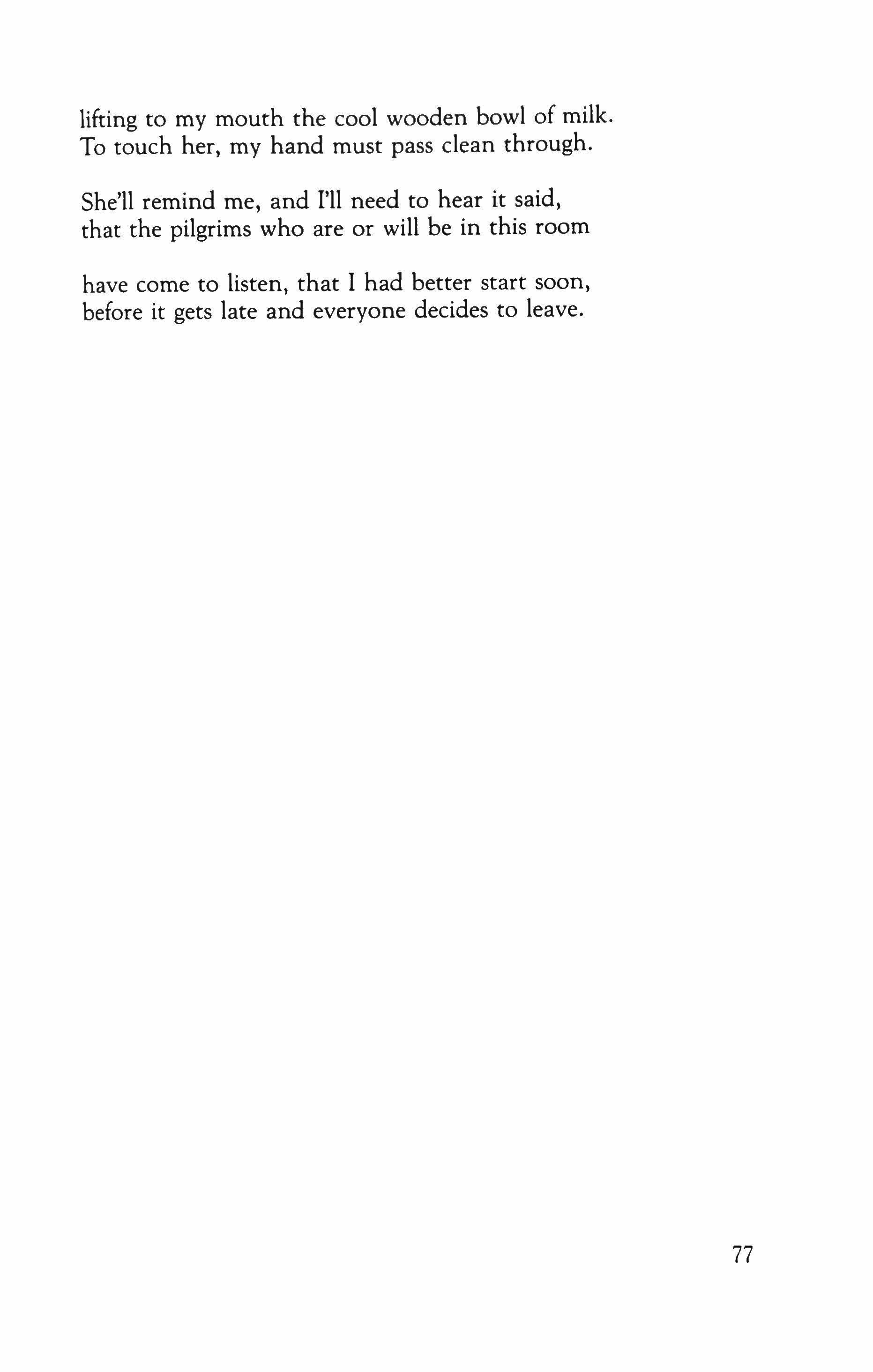
lifting to my mouth the cool wooden bowl of milk. To touch her, my hand must pass clean through.
She'll remind me, and I'll need to hear it said, that the pilgrims who are or will be in this room
have come to listen, that I had better start soon, before it gets late and everyone decides to leave.
77
The Gemini
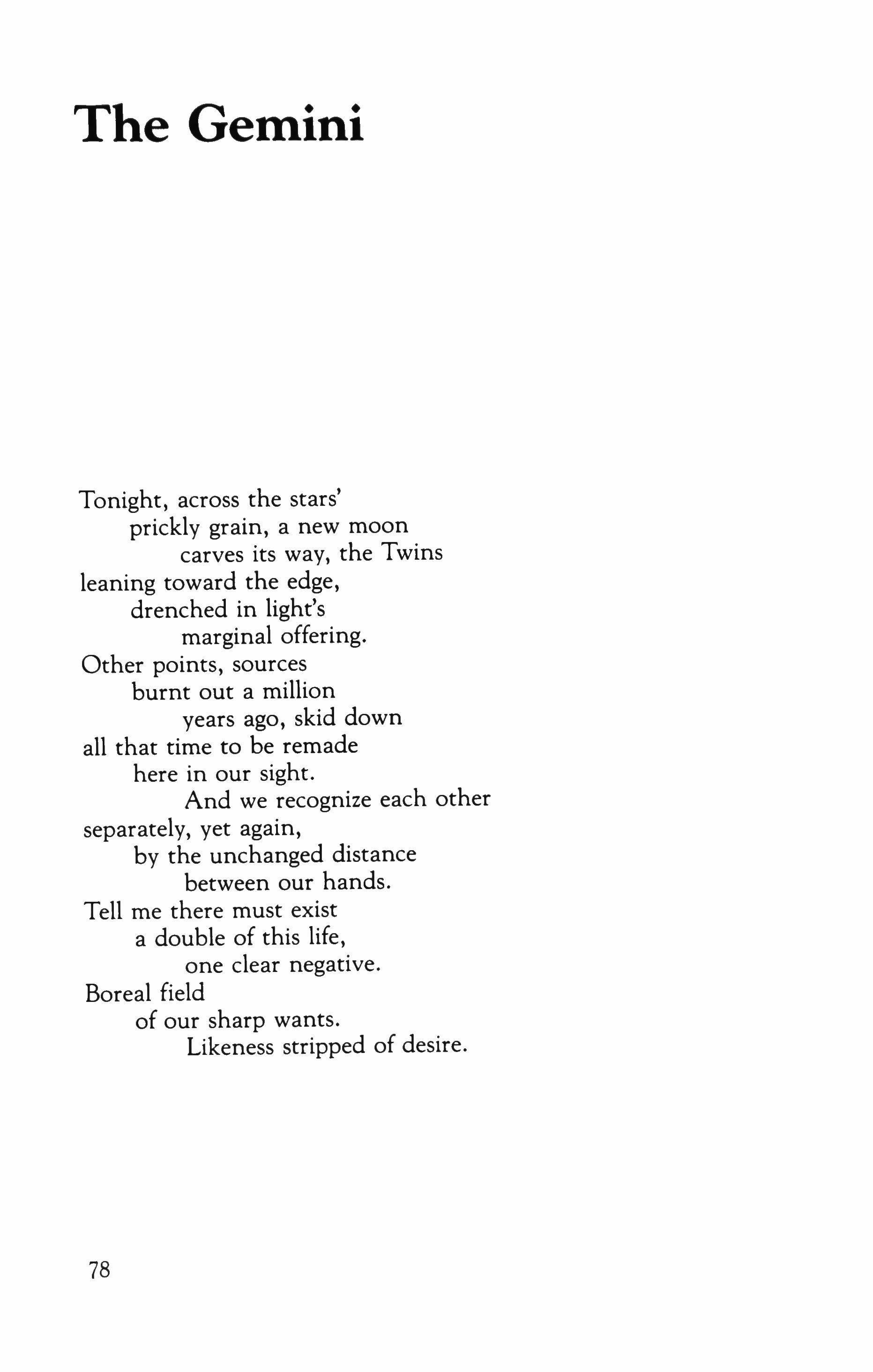
Tonight, across the stars' prickly grain, a new moon carves its way, the Twins leaning toward the edge, drenched in light's marginal offering. Other points, sources burnt out a million years ago, skid down all that time to be remade here in our sight. And we recognize each other separately, yet again, by the unchanged distance between our hands. Tell me there must exist a double of this life, one clear negative. Boreal field of our sharp wants. Likeness stripped of desire.
78
Work

One of the demanding memories of my childhood is the mysterious textured space that seemed to surround the men on my block as they went back and forth to work. To us children, "being at work" meant not just an activity but a place, a temporary habitat outside our South Philadelphia neighborhood. Work was the surround that absorbed them every morning and restored them to us at day's end, a little transfigured by dust or grease, their hands smelling of borax, their breath sour with beer or whiskey. And around them was that aura. In the mornings it should have been crisp, remade by night's passing. But something careworn and irredeemable always wrapped itself about them. None ever seemed happy or expectant, as if the work, the need and the duty of it, was a mineral substance they wore like a coat. It impressed on me, before anything else, that work was never a lightness and gaiety, but something gravid, earthborn and earthbound. The departures were built on ritual morning preparations: the clatter of cups on saucers, the gurgle of coffee perking, the familiar (and threatening) cadence of feet down the stairs, the gulps and sluicing of water through old plumbing. If life's ordinary rhythms were repeated faithfully, they were charms that helped sustain a household. Observe the ritual and you were safe against most disruptions caused by your own laziness and stupidity. If bad fortune wanted you, it would have to come get you. But break the ritual, fail in some regular observance out of weariness or distraction, and a job would be jeopardized, and consequently a household, a family extending to grandparents and possibly a bachelor aunt or uncle. Fool with the rigors of habit and you became your own bad luck.
I had no sense of the daily humiliations many of them suffered in their jobs. Some had the hot, sharp intelligence intellectuals envy, but for one
79
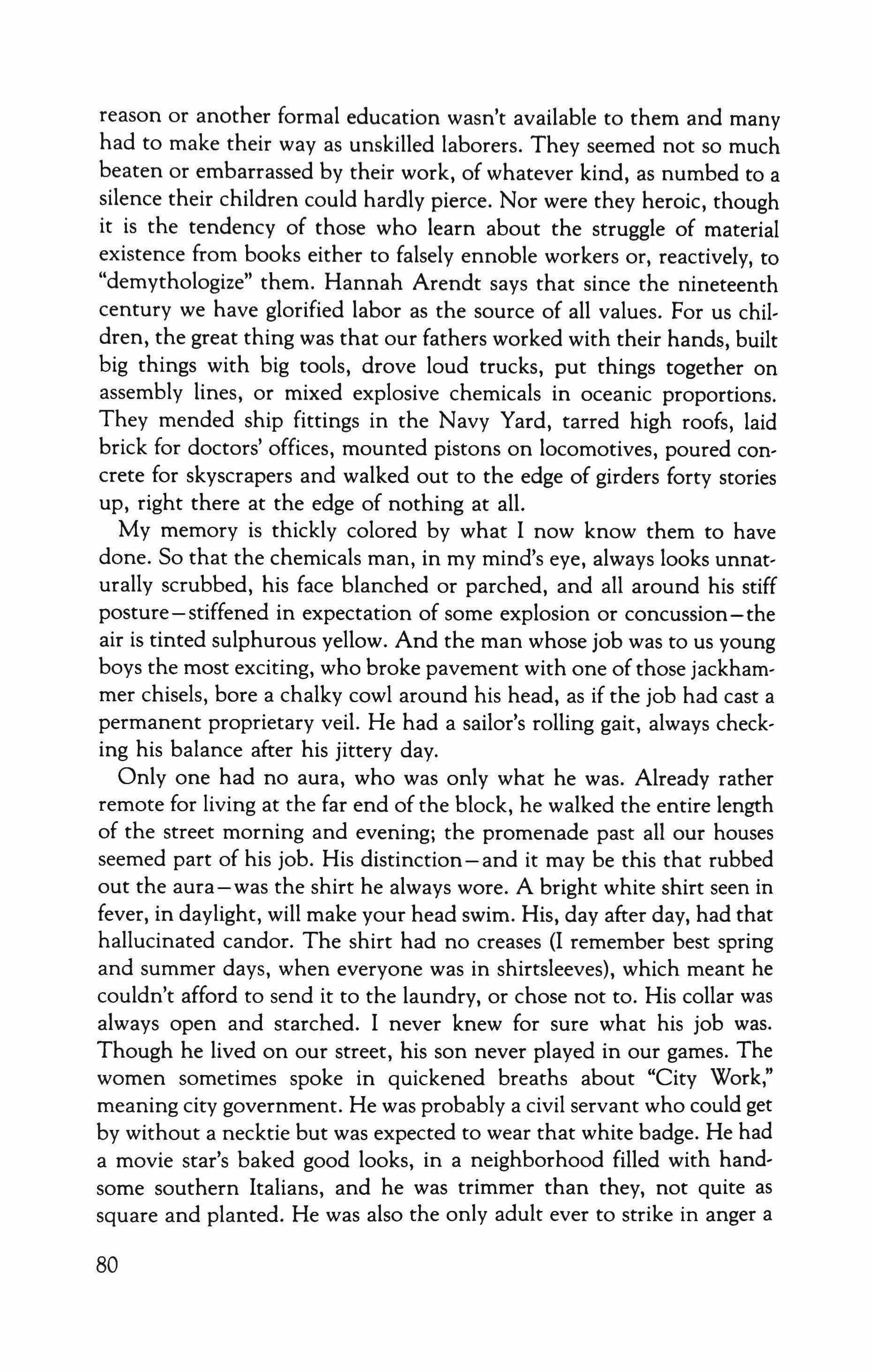
reason or another formal education wasn't available to them and many had to make their way as unskilled laborers. They seemed not so much beaten or embarrassed by their work, of whatever kind, as numbed to a silence their children could hardly pierce. Nor were they heroic, though it is the tendency of those who learn about the struggle of material existence from books either to falsely ennoble workers or, reactively, to "demythologize" them. Hannah Arendt says that since the nineteenth century we have glorified labor as the source of all values. For us children, the great thing was that our fathers worked with their hands, built big things with big tools, drove loud trucks, put things together on assembly lines, or mixed explosive chemicals in oceanic proportions. They mended ship fittings in the Navy Yard, tarred high roofs, laid brick for doctors' offices, mounted pistons on locomotives, poured concrete for skyscrapers and walked out to the edge of girders forty stories up, right there at the edge of nothing at all.
My memory is thickly colored by what 1 now know them to have done. So that the chemicals man, in my mind's eye, always looks unnaturally scrubbed, his face blanched or parched, and all around his stiff posture-stiffened in expectation of some explosion or concussion-the air is tinted sulphurous yellow. And the man whose job was to us young boys the most exciting, who broke pavement with one of those jackhammer chisels, bore a chalky cowl around his head, as if the job had cast a permanent proprietary veil. He had a sailor's rolling gait, always checking his balance after his jittery day.
Only one had no aura, who was only what he was. Already rather remote for living at the far end of the block, he walked the entire length of the street morning and evening; the promenade past all our houses seemed part of his job. His distinction - and it may be this that rubbed out the aura - was the shirt he always wore. A bright white shirt seen in fever, in daylight, will make your head swim. His, day after day, had that hallucinated candor. The shirt had no creases (I remember best spring and summer days, when everyone was in shirtsleeves), which meant he couldn't afford to send it to the laundry, or chose not to. His collar was always open and starched. 1 never knew for sure what his job was. Though he lived on our street, his son never played in our games. The women sometimes spoke in quickened breaths about "City Work," meaning city government. He was probably a civil servant who could get by without a necktie but was expected to wear that white badge. He had a movie star's baked good looks, in a neighborhood filled with handsome southern Italians, and he was trimmer than they, not quite as square and planted. He was also the only adult ever to strike in anger a
80
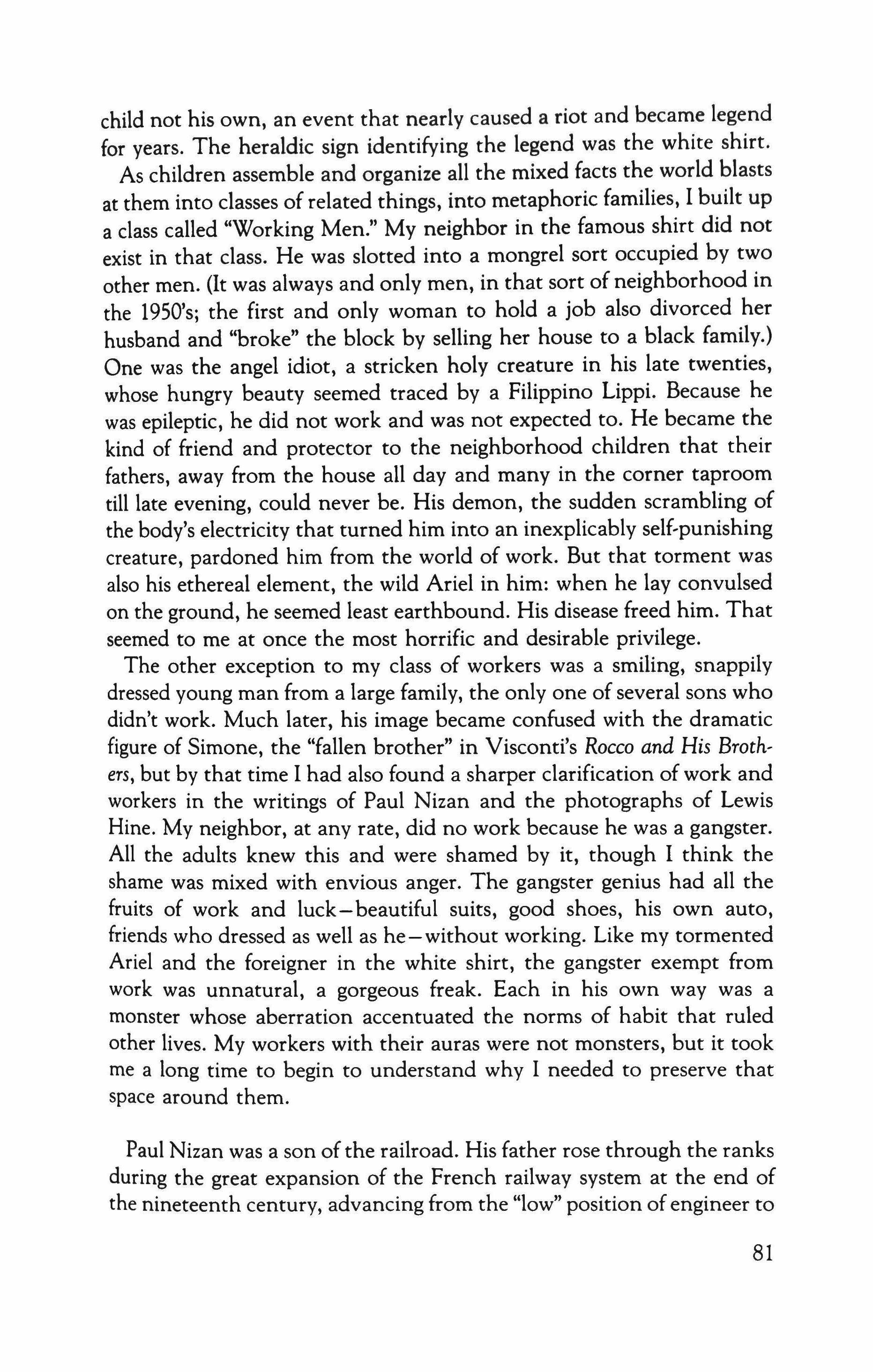
child not his own, an event that nearly caused a riot and became legend for years. The heraldic sign identifying the legend was the white shirt.
As children assemble and organize all the mixed facts the world blasts at them into classes of related things, into metaphoric families, I built up a class called "Working Men." My neighbor in the famous shirt did not exist in that class. He was slotted into a mongrel sort occupied by two other men. (It was always and only men, in that sort of neighborhood in the 1950's; the first and only woman to hold a job also divorced her husband and "broke" the block by selling her house to a black farnilv.)
One was the angel idiot, a stricken holy creature in his late twenties, whose hungry beauty seemed traced by a Filippino Lippi. Because he was epileptic, he did not work and was not expected to. He became the kind of friend and protector to the neighborhood children that their fathers, away from the house all day and many in the corner taproom till late evening, could never be. His demon, the sudden scrambling of the body's electricity that turned him into an inexplicably self-punishing creature, pardoned him from the world of work. But that torment was also his ethereal element, the wild Ariel in him: when he lay convulsed on the ground, he seemed least earthbound. His disease freed him. That seemed to me at once the most horrific and desirable privilege.
The other exception to my class of workers was a smiling, snappily dressed young man from a large family, the only one of several sons who didn't work. Much later, his image became confused with the dramatic figure of Simone, the "fallen brother" in Visconti's Rocco and His Brothers, but by that time I had also found a sharper clarification of work and workers in the writings of Paul Nizan and the photographs of Lewis Hine. My neighbor, at any rate, did no work because he was a gangster. All the adults knew this and were shamed by it, though I think the shame was mixed with envious anger. The gangster genius had all the fruits of work and luck - beautiful suits, good shoes, his own auto, friends who dressed as well as he-without working. Like my tormented Ariel and the foreigner in the white shirt, the gangster exempt from work was unnatural, a gorgeous freak. Each in his own way was a monster whose aberration accentuated the norms of habit that ruled other lives. My workers with their auras were not monsters, but it took me a long time to begin to understand why I needed to preserve that space around them.
Paul Nizan was a son of the railroad. His father rose through the ranks during the great expansion of the French railway system at the end of the nineteenth century, advancing from the "low" position ofengineer to
81

the more prestigious levels of lower management. Nizan came of age between the big wars, and his intellectual companions were writers like Sartre and Camus. Like them, he became a political writer of all tradesnovelist, essayist, polemicist. Antoine Bloye is the novel that established his small but controversial reputation. It expresses with angry clarity the structures of habit and how one destiny is determined, and ill-fortuned, by the conjunction of habit and a certain kind of economy. The structures of habit are really overlayerings of desire, palimpsest chronicles of the unhappiness which in turn replenishes habit and gives it even stricter control over life. Habit, while it seems to publicize convenience and necessity, in fact hides and seals away from us the anarchy of desire; it wrestles anarchy into daily repetitions, actions without recognitions, ritualized offerings to necessity.
Nizan introduces the story of Antoine Blove, another son of the railroad, with an epigraph from The German Ideology: "If communism is to put an end both to the 'cares' of the bourgeois and the needs of the proletarian, it is self-evident that it cannot do this without putting an end to the cause of both, 'labor'." Marx scholars note the contradiction between this remark and another that comes a few pages earlier: "Men begin to distinguish themselves from animals when they begin to produce their means of subsistence." Man is distinguished from animals because he labors, but the laboring process which is man's essential activity also binds him to larger natural cycles. Labor affects "the metabolism between man and nature." It is "an eternal necessity imposed by nature." In The Human Condition, Hannah Arendt describes the equivocation: "The fact remains that in all stages of his work [Marx] defines man as an animal laborans and then leads him into a society in which this greatest and most human power is no longer necessary." Presumably Marx intended the emancipation from labor to be the emancipation from necessity, and that is the most disarming utopian strain in his work. In the early Economic and Philosophic Manuscripts, he emphasized that labor is the expression of a human being's "sensuous nature" and in a communist society that nature could be expressed freely, not urged and constrained by necessity. In the course of his life, Antoine Blove advances beyond the menial labor his father performed and becomes a manager, a boss. In his passage he surrenders more of the opportunity to engage his sensuous nature in work; he becomes thus a stranger to his own nature, though no less enslaved to necessity.
As a teenager, studying at the School of Arts and Trades and working seasonally in the shipyards, Antoine is vital, expressive, answering the press of necessity without being reduced by his own answer. He is
82

"endowed with strengths and with vast desires he will never be able to satisfy." He studies hard, works summers to pay tuition and gladly steeps himself in his work. Once he leaves school, however, he becomes a regular wage-earner, The difference between a worker and a wage-earner is that one ideally is defined by his activity, the other by the object or consequence of the activity. Antoine soon begins to live for the future in a present muffled by habit and expectations. He wants to win with his labor the prize of normalized relations in every sector of his life-wife, home, children, things. The necessity he feels now is defined not by natural "metabolisms" but by economic and social forces, which are the devitalized codifications of those metabolisms. Obedient to what he thinks are the "new" necessities, he suffers terrible reverses: he becomes a strikebreaker, betraying the class of workers which produced him; he loses his position finally because of poor "quality control" of war mate, rial; he backslides into a modest, miserable retirement punished by regret, reviewing unexpressed desires formalized into habits.
The ambiguity of our relation to habit - it sustains and reduces us, so do we celebrate or condemn it? - is caught in Nizan's description of Antoine's daily routine at the office:
Each morning he went to his office; he hung up his umbrella or his overcoat. Winter came and then summer; first the season of derby hats, then the season of straw hats, of panamas. He sat down, lit a cigarette, and went and opened the door of the neighboring office as soon as he heard the sounds of a man, coughing, footsteps, a slight whistle, snatches of humming, the heavy sound of a body depositing its weight in an armchair. This meant the engineer had arrived.
The dull march of parallel phrases enacts what Nizan calls the "cotton wool" of habit in which workers wrap their lives. It protects, it softens the shock of the world, but it also packs us into a self-justifying indifference toward all that looms outside the laminations of habit. It is the most available vaccine against the contagion of political activism. Upon morning repetitions are laid the ritual organizations of the workday, in turn covered over by the habitual return, the evening meal and the preparations for the next morning's round. The pattern is not limited to regular wage-earners. Rilke learned from Rodin the lesson of ritual application to the task at hand. For Nizan, the layerings of habit form an emblem of mental habits, of insulation against change. It is the habit of thinking about reality in a familiar way and living, unquestioningly, by those steady lights. When Halley's Comet passes, Antoine's neighbors try to joke about the perturbation in the familiar sky, but they are obviously troubled by what they cannot control:
83
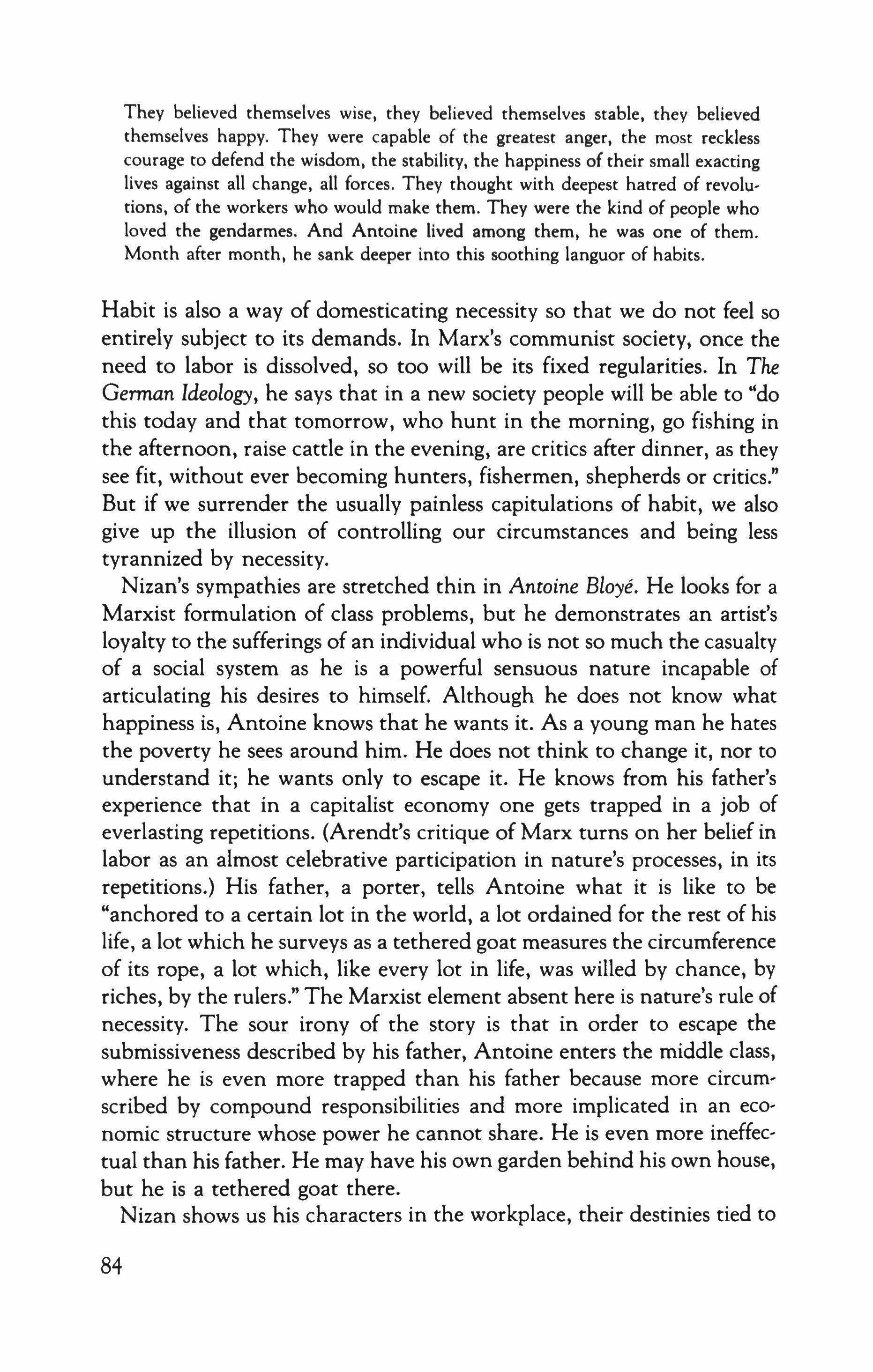
They believed themselves wise, they believed themselves stable, they believed themselves happy. They were capable of the greatest anger, the most reckless courage to defend the wisdom, the stability, the happiness of their small exacting lives against all change, all forces. They thought with deepest hatred of revolutions, of the workers who would make them. They were the kind of people who loved the gendarmes. And Antoine lived among them, he was one of them. Month after month, he sank deeper into this soothing languor of habits.
Habit is also a way of domesticating necessity so that we do not feel so entirely subject to its demands. In Marx's communist society, once the need to labor is dissolved, so too will be its fixed regularities. In The German Ideology, he says that in a new society people will be able to "do this today and that tomorrow, who hunt in the morning, go fishing in the afternoon, raise cattle in the evening, are critics after dinner, as they see fit, without ever becoming hunters, fishermen, shepherds or critics." But if we surrender the usually painless capitulations of habit, we also give up the illusion of controlling our circumstances and being less tyrannized by necessity.
Nizan's sympathies are stretched thin in Antoine Bloye. He looks for a Marxist formulation of class problems, but he demonstrates an artist's loyalty to the sufferings of an individual who is not so much the casualty of a social system as he is a powerful sensuous nature incapable of articulating his desires to himself. Although he does not know what happiness is, Antoine knows that he wants it. As a young man he hates the poverty he sees around him. He does not think to change it, nor to understand it; he wants only to escape it. He knows from his father's experience that in a capitalist economy one gets trapped in a job of everlasting repetitions. (Arendt's critique of Marx turns on her belief in labor as an almost celebrative participation in nature's processes, in its repetitions.) His father, a porter, tells Antoine what it is like to be "anchored to a certain lot in the world, a lot ordained for the rest of his life, a lot which he surveys as a tethered goat measures the circumference of its rope, a lot which, like every lot in life, was willed by chance, by riches, by the rulers." The Marxist element absent here is nature's rule of necessity. The sour irony of the story is that in order to escape the submissiveness described by his father, Antoine enters the middle class, where he is even more trapped than his father because more circumscribed by compound responsibilities and more implicated in an economic structure whose power he cannot share. He is even more ineffectual than his father. He may have his own garden behind his own house, but he is a tethered goat there.
Nizan shows us his characters in the workplace, their destinies tied to
84
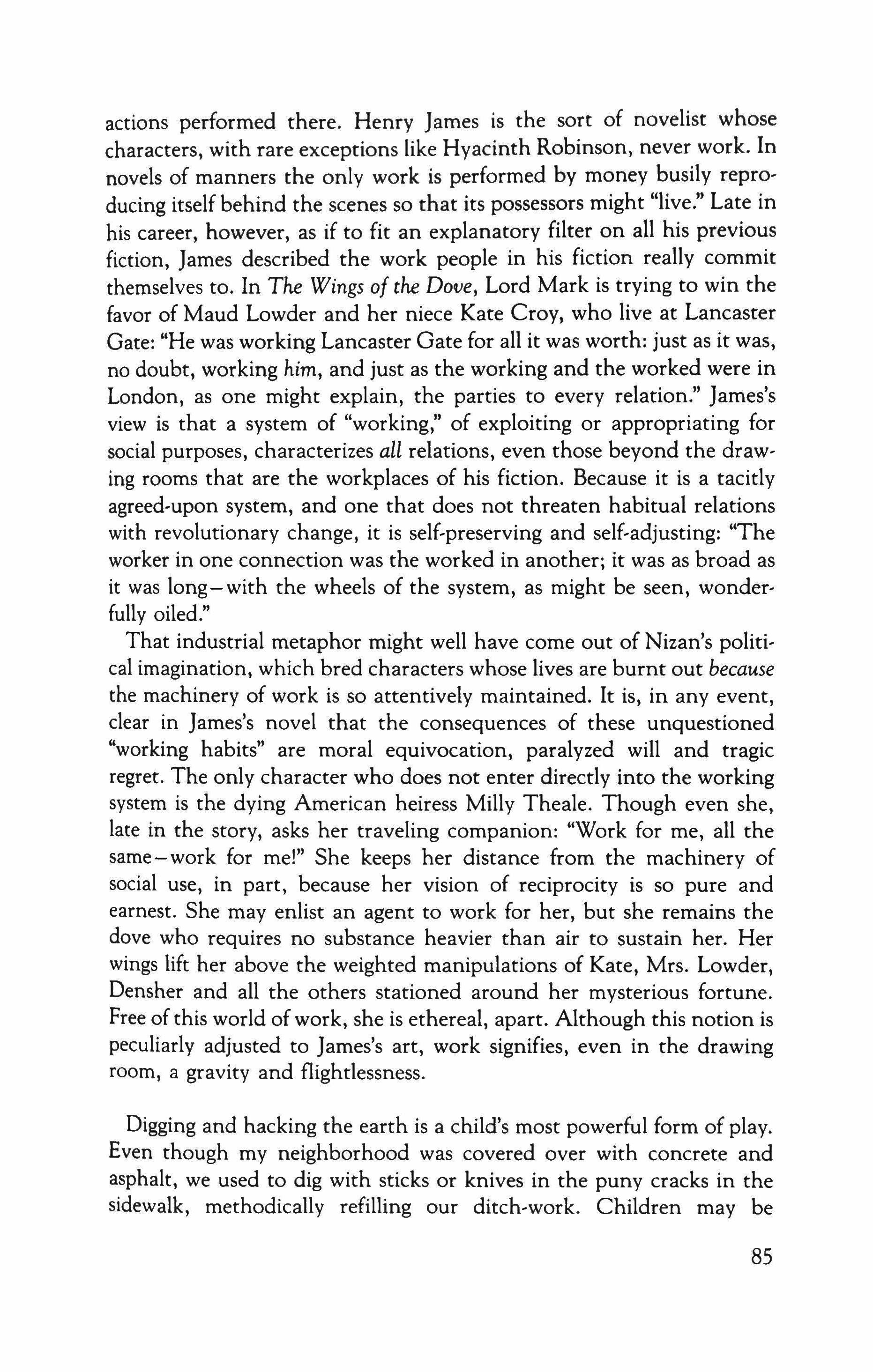
actions performed there. Henry James is the sort of novelist whose characters, with rare exceptions like Hyacinth Robinson, never work. In novels of manners the only work is performed by money busily repro' ducing itself behind the scenes so that its possessors might "live." Late in his career, however, as if to fit an explanatory filter on all his previous fiction, James described the work people in his fiction really commit themselves to. In The Wings of the Dove, Lord Mark is trying to win the favor of Maud Lowder and her niece Kate Croy, who live at Lancaster Gate: "He was working Lancaster Gate for all it was worth: just as it was, no doubt, working him, and just as the working and the worked were in London, as one might explain, the parties to every relation." James's view is that a system of "working," of exploiting or appropriating for social purposes, characterizes all relations, even those beyond the drawing rooms that are the workplaces of his fiction. Because it is a tacitly agreed-upon system, and one that does not threaten habitual relations with revolutionary change, it is self-preserving and self-adjusting: "The worker in one connection was the worked in another; it was as broad as it was long-with the wheels of the system, as might be seen, wonderfully oiled."
That industrial metaphor might well have come out of Nizan's political imagination, which bred characters whose lives are burnt out because the machinery of work is so attentively maintained. It is, in any event, clear in James's novel that the consequences of these unquestioned "working habits" are moral equivocation, paralyzed will and tragic regret. The only character who does not enter directly into the working system is the dying American heiress Milly Theale. Though even she, late in the story, asks her traveling companion: "Work for me, all the same-work for me!" She keeps her distance from the machinery of social use, in part, because her vision of reciprocity is so pure and earnest. She may enlist an agent to work for her, but she remains the dove who requires no substance heavier than air to sustain her. Her wings lift her above the weighted manipulations of Kate, Mrs. Lowder, Densher and all the others stationed around her mysterious fortune. Free of this world ofwork, she is ethereal, apart. Although this notion is peculiarly adjusted to James's art, work signifies, even in the drawing room, a gravity and flightlessness.
Digging and hacking the earth is a child's most powerful form of play. Even though my neighborhood was covered over with concrete and asphalt, we used to dig with sticks or knives in the puny cracks in the sidewalk, methodically refilling our ditch-work. Children may be
85
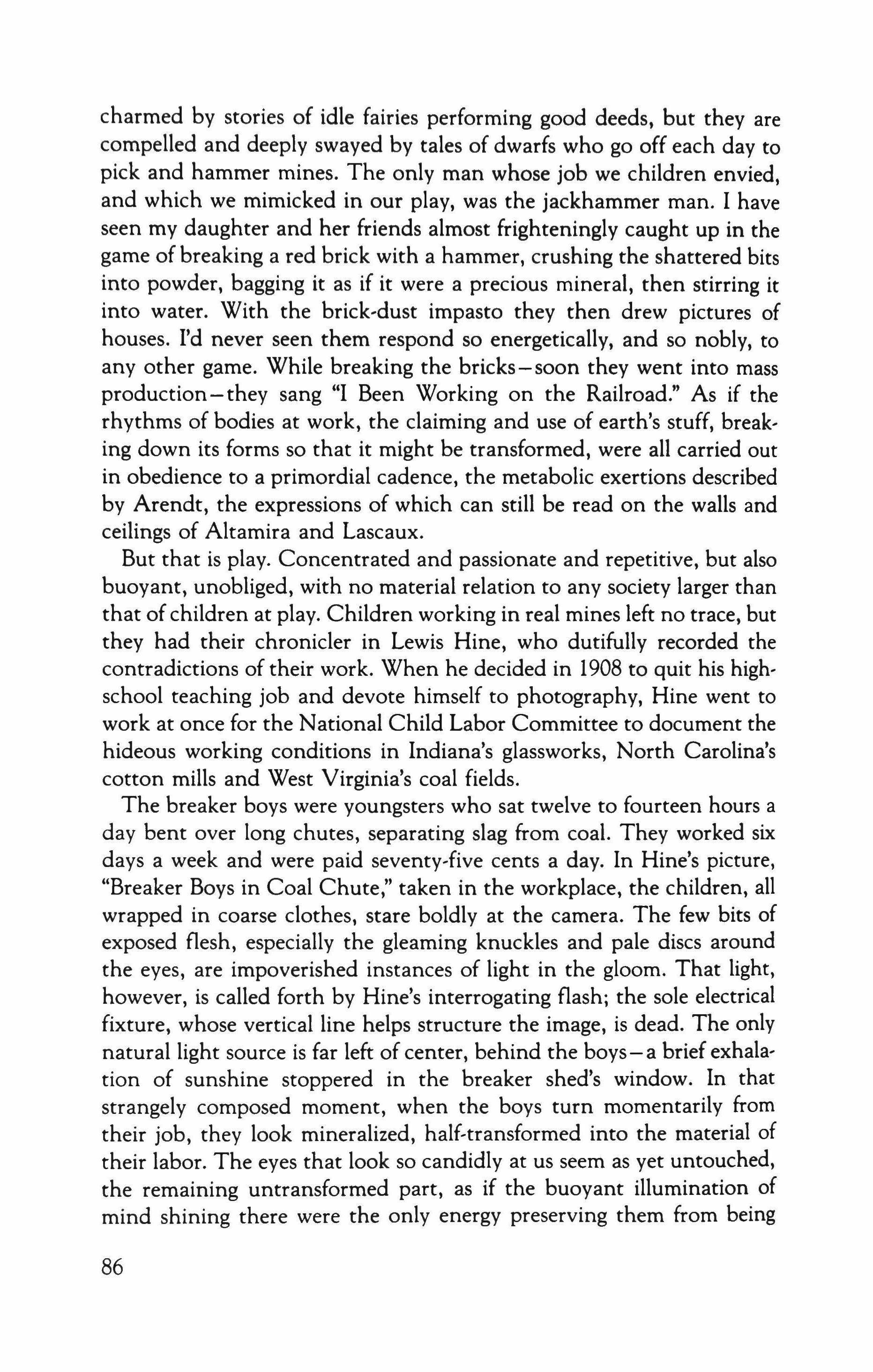
charmed by stories of idle fairies performing good deeds, but they are compelled and deeply swayed by tales of dwarfs who go off each day to pick and hammer mines. The only man whose job we children envied, and which we mimicked in our play, was the jackhammer man. I have seen my daughter and her friends almost frighteningly caught up in the game of breaking a red brick with a hammer, crushing the shattered bits into powder, bagging it as if it were a precious mineral, then stirring it into water. With the brick-dust impasto they then drew pictures of houses. I'd never seen them respond so energetically, and so nobly, to any other game. While breaking the bricks-soon they went into mass production-they sang "I Been Working on the Railroad." As if the rhythms of bodies at work, the claiming and use of earth's stuff, breaking down its forms so that it might be transformed, were all carried out in obedience to a primordial cadence, the metabolic exertions described by Arendt, the expressions of which can still be read on the walls and ceilings of Altamira and Lascaux.
But that is play. Concentrated and passionate and repetitive, but also buoyant, unobliged, with no material relation to any society larger than that of children at play. Children working in real mines left no trace, but they had their chronicler in Lewis Hine, who dutifully recorded the contradictions of their work. When he decided in 1908 to quit his highschool teaching job and devote himself to photography, Hine went to work at once for the National Child Labor Committee to document the hideous working conditions in Indiana's glassworks, North Carolina's cotton mills and West Virginia's coal fields.
The breaker boys were youngsters who sat twelve to fourteen hours a day bent over long chutes, separating slag from coal. They worked six days a week and were paid seventy-five cents a day. In Hine's picture, "Breaker Boys in Coal Chute," taken in the workplace, the children, all wrapped in coarse clothes, stare boldly at the camera. The few bits of exposed flesh, especially the gleaming knuckles and pale discs around the eyes, are impoverished instances of light in the gloom. That light, however, is called forth by Hine's interrogating flash; the sole electrical fixture, whose vertical line helps structure the image, is dead. The only natural light source is far left of center, behind the boys-a brief exhalation of sunshine stoppered in the breaker shed's window. In that strangely composed moment, when the boys turn momentarily from their job, they look mineralized, half-transformed into the material of their labor. The eyes that look so candidly at us seem as yet untouched, the remaining untransformed part, as if the buoyant illumination of mind shining there were the only energy preserving them from being
86
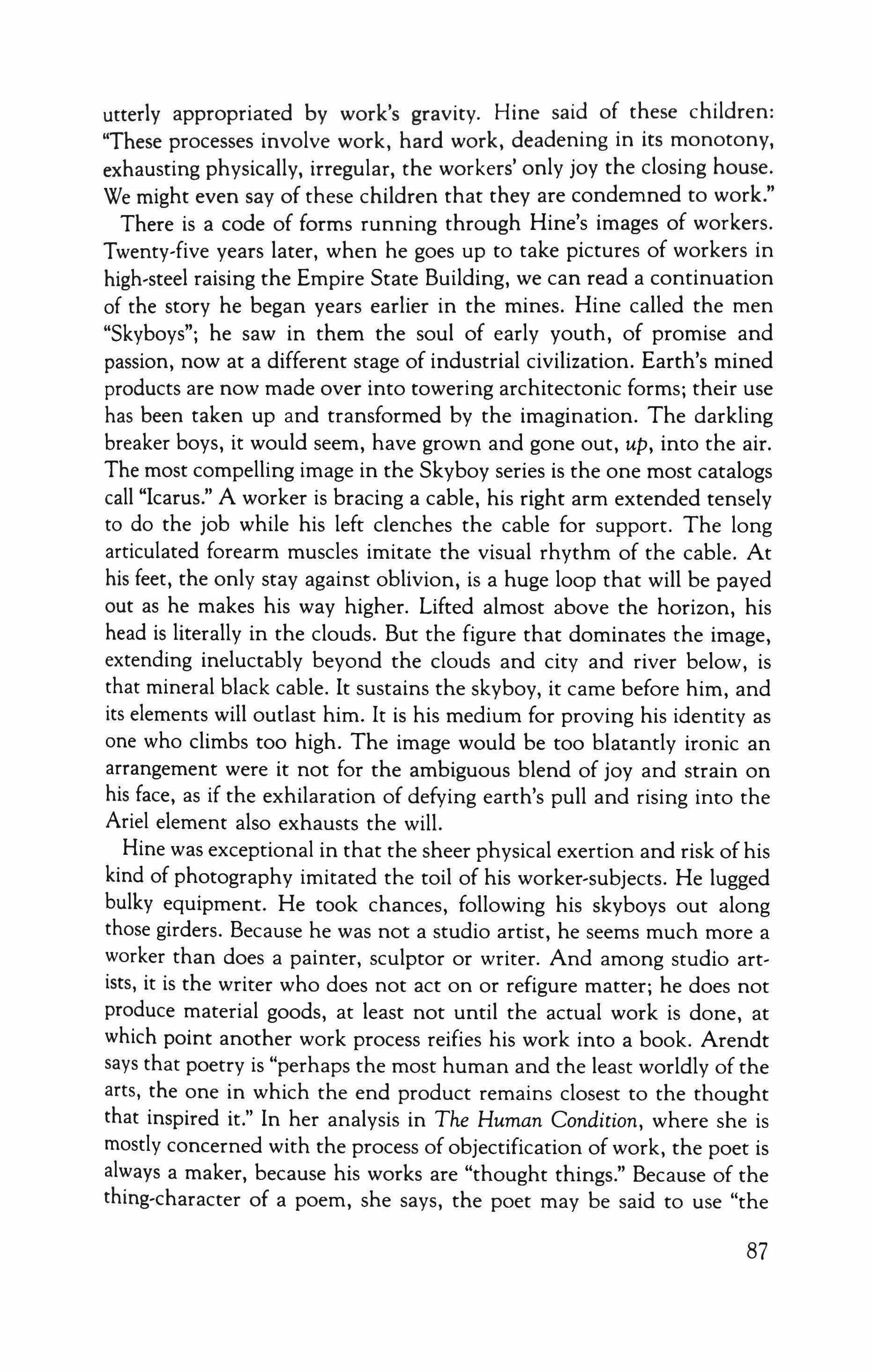
utterly appropriated by work's gravity. Hine said of these children: "These processes involve work, hard work, deadening in its monotony, exhausting physically, irregular, the workers' only joy the closing house. We might even say of these children that they are condemned to work."
There is a code of forms running through Hine's images of workers. Twenty-five years later, when he goes up to take pictures of workers in high-steel raising the Empire State Building, we can read a continuation of the story he began years earlier in the mines. Hine called the men "Skybovs"; he saw in them the soul of early youth, of promise and passion, now at a different stage of industrial civilization. Earth's mined products are now made over into towering architectonic forms; their use has been taken up and transformed by the imagination. The darkling breaker boys, it would seem, have grown and gone out, up, into the air. The most compelling image in the Skyboy series is the one most catalogs call "Icarus." A worker is bracing a cable, his right arm extended tensely to do the job while his left clenches the cable for support. The long articulated forearm muscles imitate the visual rhythm of the cable. At his feet, the only stay against oblivion, is a huge loop that will be payed out as he makes his way higher. Lifted almost above the horizon, his head is literally in the clouds. But the figure that dominates the image, extending ineluctably beyond the clouds and city and river below, is that mineral black cable. It sustains the skyboy, it carne before him, and its elements will outlast him. It is his medium for proving his identity as one who climbs too high. The image would be too blatantly ironic an arrangement were it not for the ambiguous blend of joy and strain on his face, as if the exhilaration of defying earth's pull and rising into the Ariel element also exhausts the will.
Hine was exceptional in that the sheer physical exertion and risk of his kind of photography imitated the toil of his worker-subjects. He lugged bulky equipment. He took chances, following his skyboys out along those girders. Because he was not a studio artist, he seems much more a worker than does a painter, sculptor or writer. And among studio artists, it is the writer who does not act on or refigure matter; he does not produce material goods, at least not until the actual work is done, at which point another work process reifies his work into a book. Arendt says that poetry is "perhaps the most human and the least worldly of the arts, the one in which the end product remains closest to the thought that inspired it." In her analysis in The Human Condition, where she is mostly concerned with the process of objectification of work, the poet is always a maker, because his works are "thought things." Because of the thing-character of a poem, she says, the poet may be said to use "the
87
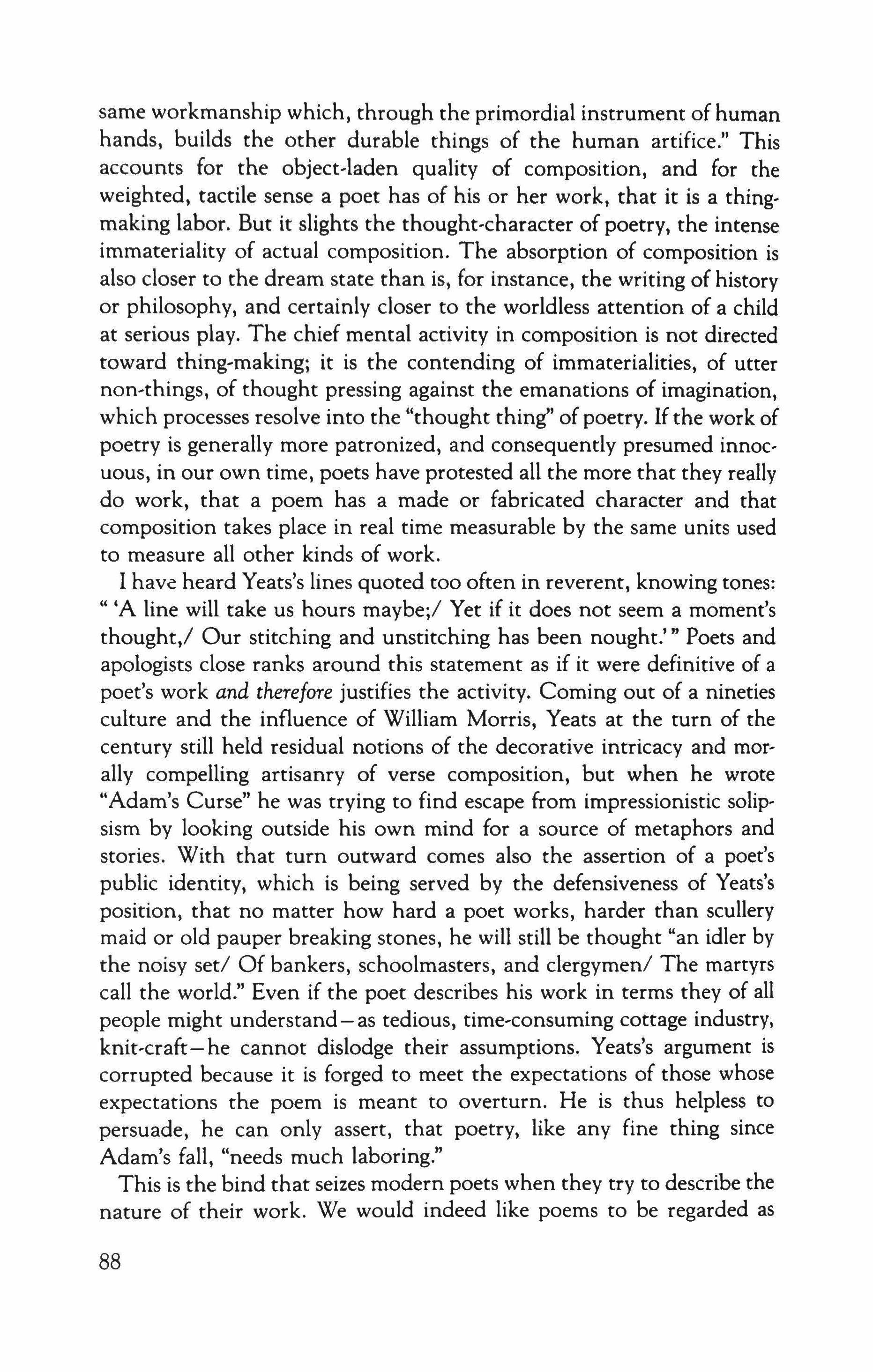
same workmanship which, through the primordial instrument of human hands, builds the other durable things of the human artifice." This accounts for the object-laden quality of composition, and for the weighted, tactile sense a poet has of his or her work, that it is a thingmaking labor. But it slights the thought-character of poetry, the intense immateriality of actual composition. The absorption of composition is also closer to the dream state than is, for instance, the writing of history or philosophy, and certainly closer to the worldless attention of a child at serious play. The chief mental activity in composition is not directed toward thing-making; it is the contending of immaterialities, of utter non-things, of thought pressing against the emanations of imagination, which processes resolve into the "thought thing" of poetry. If the work of poetry is generally more patronized, and consequently presumed innocuous, in our own time, poets have protested all the more that they really do work, that a poem has a made or fabricated character and that composition takes place in real time measurable by the same units used to measure all other kinds of work.
I have heard Yeats's lines quoted too often in reverent, knowing tones: "'A line will take us hours maybe;/ Yet if it does not seem a moment's thought,! Our stitching and unstitching has been nought.''' Poets and apologists close ranks around this statement as if it were definitive of a poet's work and therefore justifies the activity. Coming out of a nineties culture and the influence of William Morris, Yeats at the turn of the century still held residual notions of the decorative intricacy and morally compelling artisanry of verse composition, but when he wrote "Adam's Curse" he was trying to find escape from impressionistic solipsism by looking outside his own mind for a source of metaphors and stories. With that turn outward comes also the assertion of a poet's public identity, which is being served by the defensiveness of Yeats's position, that no matter how hard a poet works, harder than scullery maid or old pauper breaking stones, he will still be thought "an idler by the noisy set/ Of bankers, schoolmasters, and clergymen/ The martyrs call the world." Even if the poet describes his work in terms they of all people might understand - as tedious, time-consuming cottage industry, knit-craft - he cannot dislodge their assumptions. Yeats's argument is corrupted because it is forged to meet the expectations of those whose expectations the poem is meant to overturn. He is thus helpless to persuade, he can only assert, that poetry, like any fine thing since Adam's fall, "needs much laboring."
This is the bind that seizes modern poets when they try to describe the nature of their work. We would indeed like poems to be regarded as
88
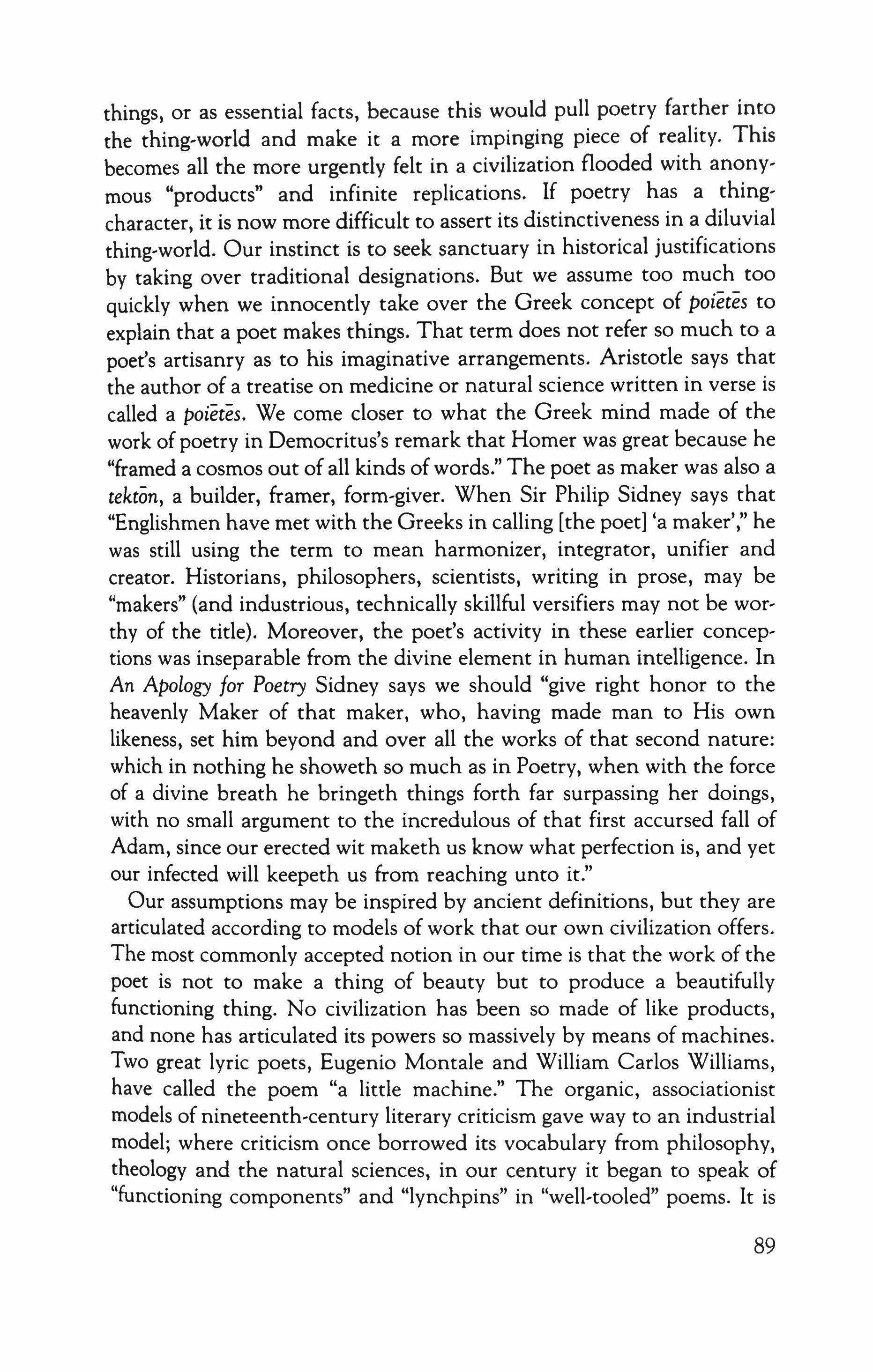
things, or as essential facts, because this would pull poetry farther into the thing-world and make it a more impinging piece of reality. This becomes all the more urgently felt in a civilization flooded with anonymous "products" and infinite replications. If poetry has a thing' character, it is now more difficult to assert its distinctiveness in a diluvial thing-world. Our instinct is to seek sanctuary in historical justifications by taking over traditional designations. But we assume too much too quickly when we innocently take over the Greek concept of poietes to explain that a poet makes things. That term does not refer so much to a poet's artisanry as to his imaginative arrangements. Aristotle says that the author of a treatise on medicine or natural science written in verse is called a poietes. We come closer to what the Greek mind made of the work of poetry in Democritus's remark that Homer was great because he "framed a cosmos out of all kinds of words." The poet as maker was also a tekton, a builder, framer, form-giver. When Sir Philip Sidney says that "Englishmen have met with the Greeks in calling [the poet] 'a maker'," he was still using the term to mean harmonizer, integrator, unifier and creator. Historians, philosophers, scientists, writing in prose, may be "makers" (and industrious, technically skillful versifiers may not be worthy of the title). Moreover, the poet's activity in these earlier conceptions was inseparable from the divine element in human intelligence. In An Apology for Poetry Sidney says we should "give right honor to the heavenly Maker of that maker, who, having made man to His own likeness, set him beyond and over all the works of that second nature: which in nothing he showeth so much as in Poetry, when with the force of a divine breath he bringeth things forth far surpassing her doings, with no small argument to the incredulous of that first accursed fall of Adam, since our erected wit maketh us know what perfection is, and yet our infected will keepeth us from reaching unto it."
Our assumptions may be inspired by ancient definitions, but they are articulated according to models of work that our own civilization offers. The most commonly accepted notion in our time is that the work of the poet is not to make a thing of beauty but to produce a beautifully functioning thing. No civilization has been so made of like products, and none has articulated its powers so massively by means of machines. Two great lyric poets, Eugenio Montale and William Carlos Williams, have called the poem "a little machine." The organic, associationist models of nineteenth-century literary criticism gave way to an industrial model; where criticism once borrowed its vocabulary from philosophy, theology and the natural sciences, in our century it began to speak of "functioning components" and "lynchpins" in "well-tooled" poems. It is
89
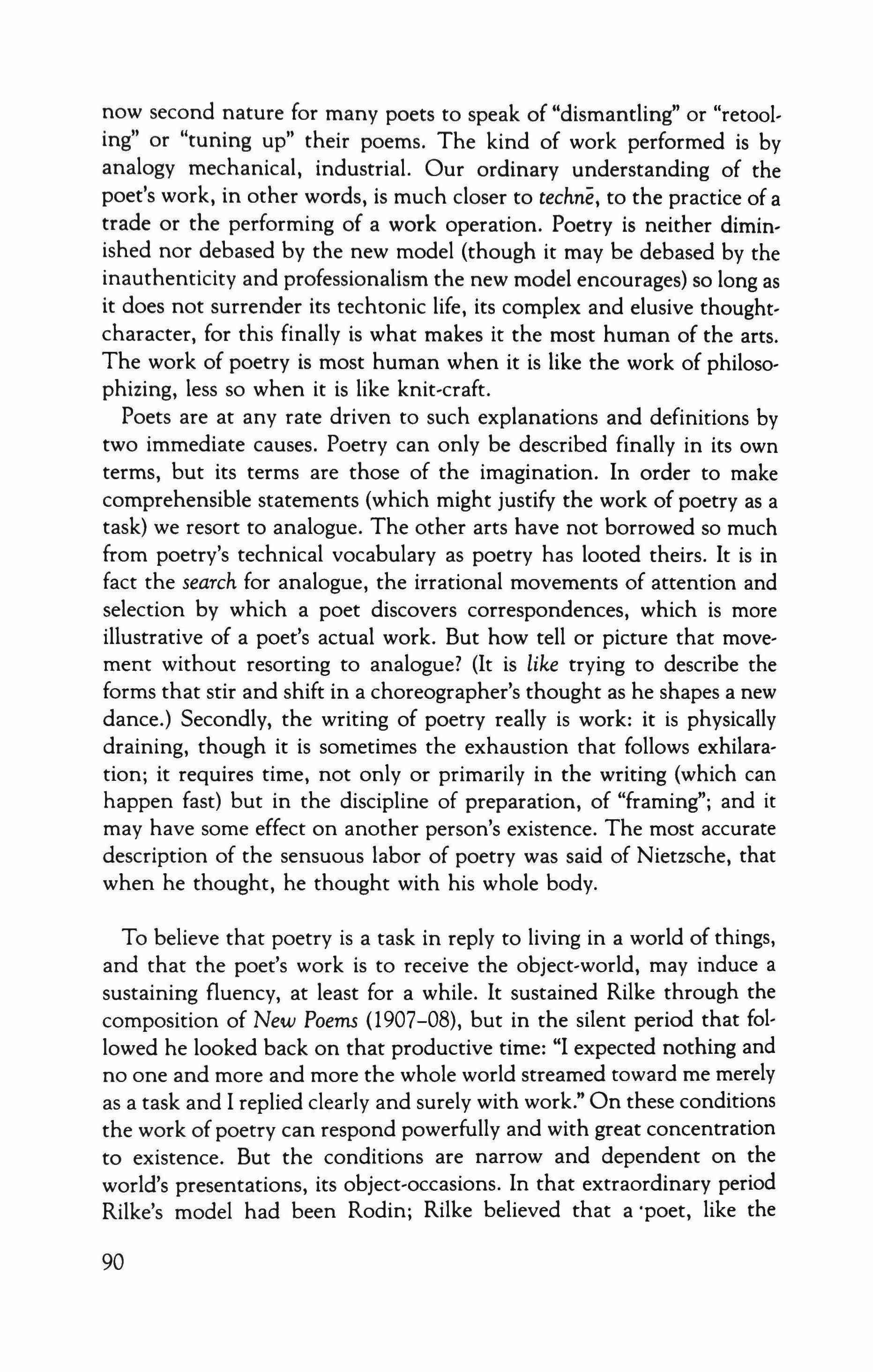
now second nature for many poets to speak of "dismantling" or "retooling" or "tuning up" their poems. The kind of work performed is by analogy mechanical, industrial. Our ordinary understanding of the poet's work, in other words, is much closer to techne, to the practice of a trade or the performing of a work operation. Poetry is neither diminished nor debased by the new model (though it may be debased by the inauthenticity and professionalism the new model encourages) so long as it does not surrender its techtonic life, its complex and elusive thoughtcharacter, for this finally is what makes it the most human of the arts. The work of poetry is most human when it is like the work of philosophizing, less so when it is like knit-craft.
Poets are at any rate driven to such explanations and definitions by two immediate causes. Poetry can only be described finally in its own terms, but its terms are those of the imagination. In order to make comprehensible statements (which might justify the work of poetry as a task) we resort to analogue. The other arts have not borrowed so much from poetry's technical vocabulary as poetry has looted theirs. It is in fact the search for analogue, the irrational movements of attention and selection by which a poet discovers correspondences, which is more illustrative of a poet's actual work. But how tell or picture that movement without resorting to analogue? (It is like trying to describe the forms that stir and shift in a choreographer's thought as he shapes a new dance.) Secondly, the writing of poetry really is work: it is physically draining, though it is sometimes the exhaustion that follows exhilaration; it requires time, not only or primarily in the writing (which can happen fast) but in the discipline of preparation, of "framing"; and it may have some effect on another person's existence. The most accurate description of the sensuous labor of poetry was said of Nietzsche, that when he thought, he thought with his whole body.
To believe that poetry is a task in reply to living in a world of things, and that the poet's work is to receive the object-world, may induce a sustaining fluency, at least for a while. It sustained Rilke through the composition of New Poems (1907-08), but in the silent period that followed he looked back on that productive time: "I expected nothing and no one and more and more the whole world streamed toward me merely as a task and I replied clearly and surely with work." On these conditions the work of poetry can respond powerfully and with great concentration to existence. But the conditions are narrow and dependent on the world's presentations, its object-occasions. In that extraordinary period Rilke's model had been Rodin; Rilke believed that a 'poet, like the
90

sculptor, could each day take up the work of answering the given object, of acting on thing-material, of laboring. Those brief years gave way to silence, however, and Rilke had to revise his understanding of the work ofpoetry. It became pure inwardness, the dissolution of the world within the soul: the poet's new industry was as a bee of the invisible. If one remains too settled in the belief that poetry is a way of working the world's occasions, the poetry may repose in asking habitual (or friendly) questions of the world; or it may become all sheeted, adversarial resistance to it, so that poems become predictably argumentative replies to the pressure exerted by the world of things.
I know the adversarial position because it has sustained me in the writing of some poems. To understand its appeal, and to understand why the work of poetry as described by Yeats still jangles me, I have had to think back to my own initial formations. Because I come from a culture of working-class Southern European Catholics, I was bred to believe that work is, in conscience and in fact, the curse of the fall from grace, and that the curse determines and defines one's life. Adam fell, brought himself down, bound to earth; existence is the struggle to rise from the earth of work that compacts life in habit. Even if you were able to choose your work, you should not assume it would be pleasurable. If you found work you liked, you were lucky, but expect no more than this. And yet, obligatory and maledicted as work was, not to work was sinful, scandalous, and only the holy idiot or gangster was exempt from its pains. Work, in effect, was the necessary reply to being in a world characterized everywhere by exertions. It also meant, for most of my men, a life in which violence physical and psychological was not only commonplace but somehow essential to the passionate life, a violence articulated, however, according to the restraints of tribal convention. My workers hurt only those in their own family. To strike a child not your own, as the man in the white shirt did, outraged all the norms of expressive passion. It was monstrous waste, obscene and uncivilized. (And it was all the more pathetic in that the boy was a delicate runt, undersized and adenoidal, with a pinwheel cowlick in the middle of his forehead.) These assumptions, too, I unknowingly carried over with me in the writing of poetry. The conviction that the work of poetry, though chosen (and by most measures unnecessary), is a dutiful adversarial engagement with the object world, and that the task of writing is a lifesustaining answer, however muted, to that world, had its roots for me in religious belief and a very localized culture. Work was the chief way of suffering redemption - a passion. But in these terms the work of writing is also a chastisement that can shrivel the imagination.
91

As a child I could read the gravities of work in the men I watched. But the reimagining or idealizing instinct let me see them as arrangements of energy, each with its aura, not to heroize them but to characterize their existence by reimaging their actual forms. Reviewing their working day, it was instinct in me to infuse their weightedness with some ethereal element. Lightened, lifted, they could be stopped and held in mind. The bricklayer on his scaffold is reshaping the sky. The ice man sails from the high black cab of his truck. My childish fancy was answering a real need, to rescue what I saw from the seductive life of habit, to see in work an ascendancy or upwarding. That instinct was really work's most important element. It was the hopeful Ariel voice asking: "Is there more toil?"
It took me perhaps too long to understand the obvious, that the economy of poetic work is not so exclusively dependent on the encounter with the world's presentations, though this is of course necessary in any representative art, but that there is a world elsewhere in every exertion. Caliban is enslaved, but Ariel does the important work. I have come to believe that the poet occupies the middle zone, mediating (but not making peace) between the two forces. The poet's workplace is what William James calls "that distributed and strungalong and flowing sort of reality which we finite beings swim in," but within this mineralized condition the poet moves toward some Edenic source of consciousness, and this movement is the work of the form-giving imagination.
As one gets older, poetry's share in the normal conditions of workthe habituations, obsessiveness, dutifulness-becomes more complex but also more regularized. The temptation then is to think ofpoetry as a job, or trade, or indeed as "work." We need common terms, of course, and work is the oldest and most efficient, and is especially apt in our industrial civilization. For me it has come to mean existence in the middle zone where the ordinary exertions of labor suck everything downward toward a leveling repetition of familiar forms, toward mannerism and the reassuring monotony of self-imitation. Contending with this is the Ariel instinct, the guiltless, unexplanatory transformations authorized by the imagination. Without the mineral counterweight, the Ariel instinct leads to alchemy, where the crude matter of existence is transformed in the poet's alembic into merely perfect worldless gold. It is the lure of gorgeous inanity. The middle zone, which exists only in the writing, is at least a provisional passage during which fact and inspiration may be unevenly, often unprettily, welded.
92
William James and Henry James

As a representative pair they are almost too available. Their personali, ties and destinies express certain conflicting traits in the American char, acter so forcefully that they nearly seem stage caricatures of pieces of the American psyche. William was the young aspiring artist "converted" to the scientific discipline he spent much of his life interrogating and whose intellectual life was changed utterly by a now-unread French philosopher. William, long before Henry, was an Internationalist who, apart from "tours" in his youth and lecture engagements late in life, stayed home to make his stake in America. Like William Carlos Williams, he chose his home ground in the suburb of a big city. By all accounts, he was a brilliant and earnest university teacher, guileless, excitable, curious, physically and intellectually energetic, full ofthe aggressively unprepossessing charm that Europeans perceive as characteristically American. His was an advocate's energy and, for all his erudition, he usually comes off as a passionately amateur explainer. The force of his personal, ity gusts through his letters, which are sometimes rude in their immediacy. When he learns his sister Alice has a breast tumor, he writes to her:
I know you've never cared for life, and to me, now at the age of nearly fifty, life and death seem singularly close together in all of us-and life a mere farce of frustration in all, so far as the realization of the innermost ideals go to which we are made respectively capable of feeling an affinity and responding.
While William, the peppery eldest son with a genius for affection, vacillated for years before deciding on a profession and did not publish his first book until he was forty-eight, the younger Henry became almost at once the prolific, industrious artist whose work, however, would seldom have the peculiar sexual charge and vivacity of William's. If
93
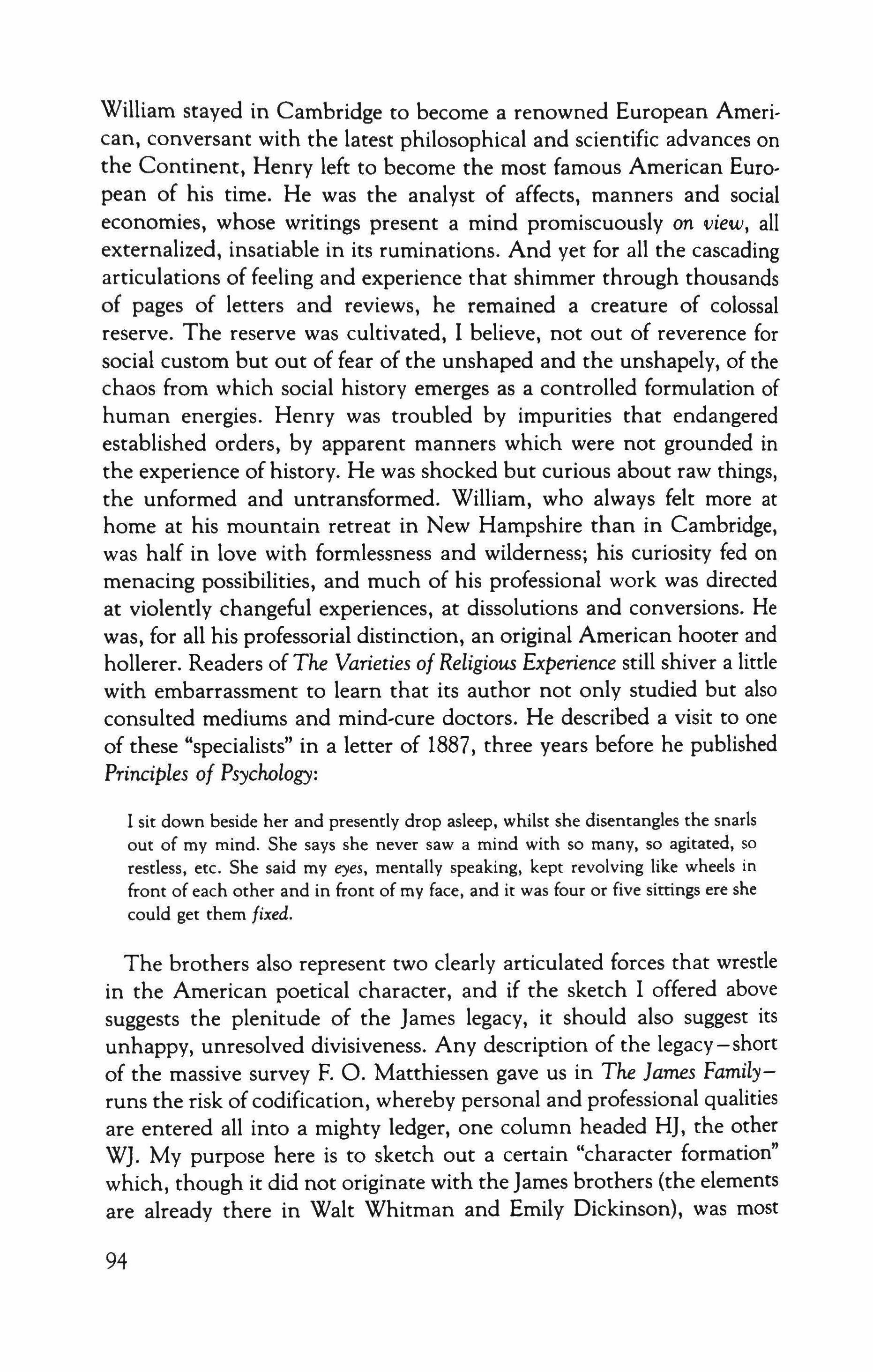
William stayed in Cambridge to become a renowned European American, conversant with the latest philosophical and scientific advances on the Continent, Henry left to become the most famous American European of his time. He was the analyst of affects, manners and social economies, whose writings present a mind promiscuously on view, all externalized, insatiable in its ruminations. And yet for all the cascading articulations of feeling and experience that shimmer through thousands of pages of letters and reviews, he remained a creature of colossal reserve. The reserve was cultivated, I believe, not out of reverence for social custom but out of fear of the unshaped and the unshapely, of the chaos from which social history emerges as a controlled formulation of human energies. Henry was troubled by impurities that endangered established orders, by apparent manners which were not grounded in the experience of history. He was shocked but curious about raw things, the unformed and untransformed. William, who always felt more at home at his mountain retreat in New Hampshire than in Cambridge, was half in love with formlessness and wilderness; his curiosity fed on menacing possibilities, and much of his professional work was directed at violently changeful experiences, at dissolutions and conversions. He was, for all his professorial distinction, an original American hooter and hollerer. Readers of The Varieties of Religious Experience still shiver a little with embarrassment to learn that its author not only studied but also consulted mediums and mind-cure doctors. He described a visit to one of these "specialists" in a letter of 1887, three years before he published Principles of Psychology:
I sit down beside her and presently drop asleep, whilst she disentangles the snarls out of my mind. She says she never saw a mind with so many, so agitated, so restless, etc. She said my eyes, mentally speaking, kept revolving like wheels in front of each other and in front of my face, and it was four or five sittings ere she could get them fixed.
The brothers also represent two clearly articulated forces that wrestle in the American poetical character, and if the sketch I offered above suggests the plenitude of the James legacy, it should also suggest its unhappy, unresolved divisiveness. Any description of the legacy-short of the massive survey F. O. Matthiessen gave us in The James Familyruns the risk of codification, whereby personal and professional qualities are entered all into a mighty ledger, one column headed HJ, the other WJ. My purpose here is to sketch out a certain "character formation" which, though it did not originate with the James brothers (the elements are already there in Walt Whitman and Emily Dickinson), was most
94

dramatically acted out in their work. That formation is, I believe, their legacy specifically to American poets. I have felt its tensions and its demands, and I see it in the poetry of my contemporaries and those who have come before.
The terms of the legacy were drawn up in a letter William wrote to Henry in 1887 (the same year he consulted that mind-cure doctor). Working to finish Principles of Psychology, he said he had "to forge every sentence in the teeth of irreducible and stubborn facts." Whitehead quotes this in Science and the Modern World to establish James's contribution to the "new color" of twentieth-century thought, namely the attempt to fuse "passionate interest in the detailed facts with equal devotion to abstract generalization." William's first aspirations were in art, but his drawings were fact-bound; what's missing is inventive, speculative, imaginative imitation in answer to the world of fact. Whatever his talent, it was not enhanced or challenged by the resistance of the given world. His ambition, which took him years to discover and attack, found its realization in psychology, where knowledge is born out of the constant mysterious encounter between irrevocable fact and the mind's attempt to generalize, to accommodate whole orders. In the essay "Reflex Action and Theism" he talks about the mind's inability to hold the general order or organization of synchronic facts, the "simply given order" of the sum of beings and events:
But can we think ofsuch a sum? Can we realize for an instant what a cross-section of all existence at a definite point of time would be? While I talk and the flies buzz, a sea-gull catches a fish at the mouth of the Amazon, a tree falls in the Adirondack wilderness, a man sneezes in Germany, a horse dies in Tartary, and twins are born in France.
We can conceive the category but we cannot fill it. Or we can dramatize the aspiration to fill it by accumulating and arranging selected facts. The project of holding in the mind serial cross sections of such matter, displayed in some kind of compelling order, was Pound's ambition in the Centes; ordered thus, mental facts in the poem would illuminate the nature ofgoodness and evil. But the Cantos is also, as many have already noted, an anthology of transformations. If the trouble in that poem is the encounter with fact, the poem's conduct is transformational. William described the thinker's problem. Henry enacted the artist's pro, cedure.
Henry's novels of the eighties, especially The Bostonians and The Princess Casamassima, met and absorbed the world of hard fact that William struggled with so obsessively, but that encounter was already beginning
95
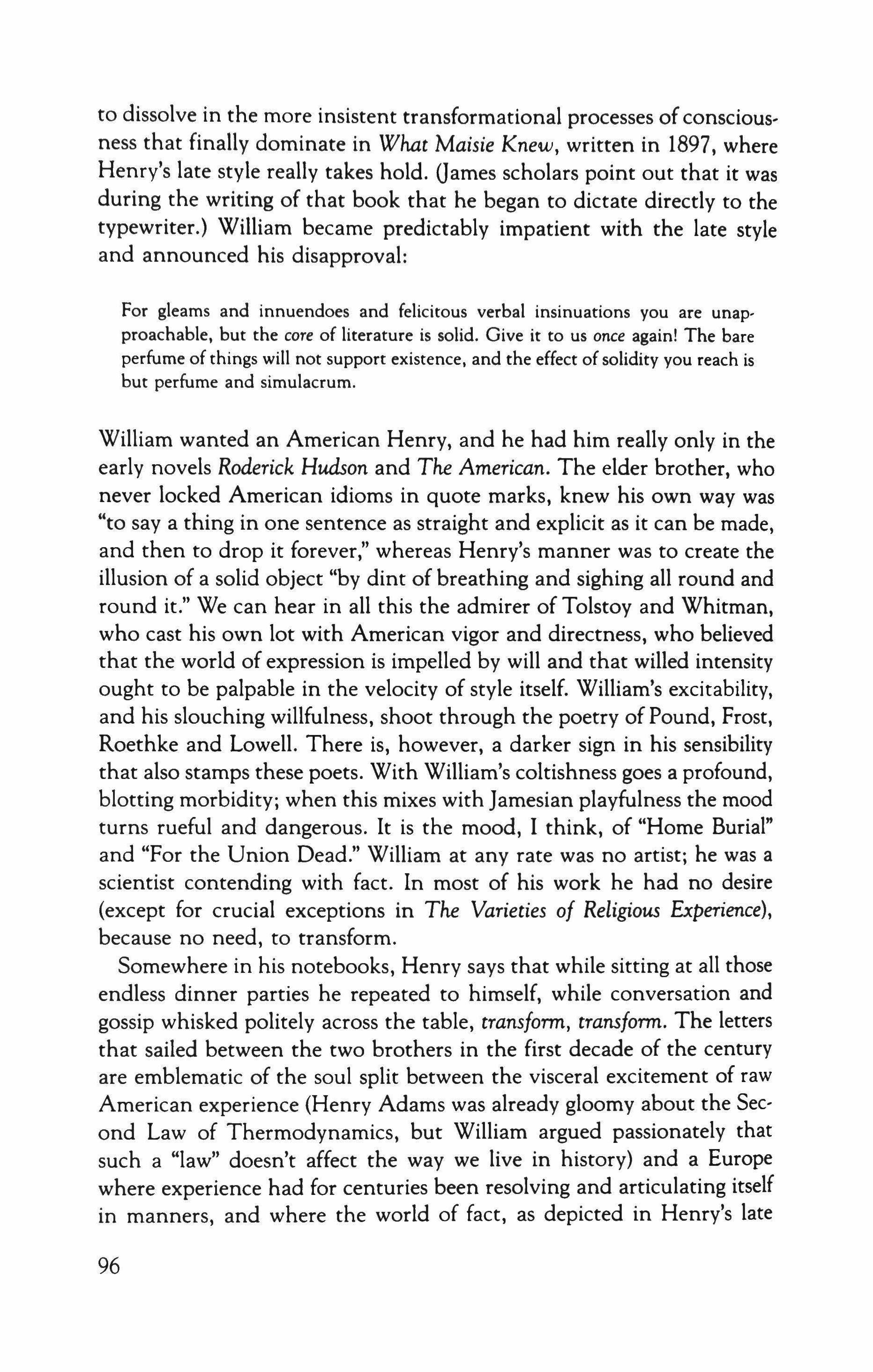
to dissolve in the more insistent transformational processes of consciousness that finally dominate in What Maisie Knew, written in 1897, where Henry's late style really takes hold. Games scholars point out that it was during the writing of that book that he began to dictate directly to the typewriter.) William became predictably impatient with the late style and announced his disapproval:
For gleams and innuendoes and felicitous verbal insinuations you are unapproachable, but the core of literature is solid. Give it to us once again! The bare perfume of things will not support existence, and the effect of solidity you reach is but perfume and simulacrum.
William wanted an American Henry, and he had him really only in the early novels Roderick Hudson and The American. The elder brother, who never locked American idioms in quote marks, knew his own way was "to say a thing in one sentence as straight and explicit as it can be made, and then to drop it forever," whereas Henry's manner was to create the illusion of a solid object "by dint of breathing and sighing all round and round it." We can hear in all this the admirer of Tolstoy and Whitman, who cast his own lot with American vigor and directness, who believed that the world of expression is impelled by will and that willed intensity ought to be palpable in the velocity of style itself. William's excitability, and his slouching willfulness, shoot through the poetry of Pound, Frost, Roethke and Lowell. There is, however, a darker sign in his sensibility that also stamps these poets. With William's coltishness goes a profound, blotting morbidity; when this mixes with Jamesian playfulness the mood turns rueful and dangerous. It is the mood, I think, of "Home Burial" and "For the Union Dead." William at any rate was no artist; he was a scientist contending with fact. In most of his work he had no desire (except for crucial exceptions in The Varieties of Religious Experience), because no need, to transform.
Somewhere in his notebooks, Henry says that while sitting at all those endless dinner parties he repeated to himself, while conversation and gossip whisked politely across the table, transform, transform. The letters that sailed between the two brothers in the first decade of the century are emblematic of the soul split between the visceral excitement of raw American experience (Henry Adams was already gloomy about the Second Law of Thermodynamics, but William argued passionately that such a "law" doesn't affect the way we live in history) and a Europe where experience had for centuries been resolving and articulating itself in manners, and where the world of fact, as depicted in Henry's late
96
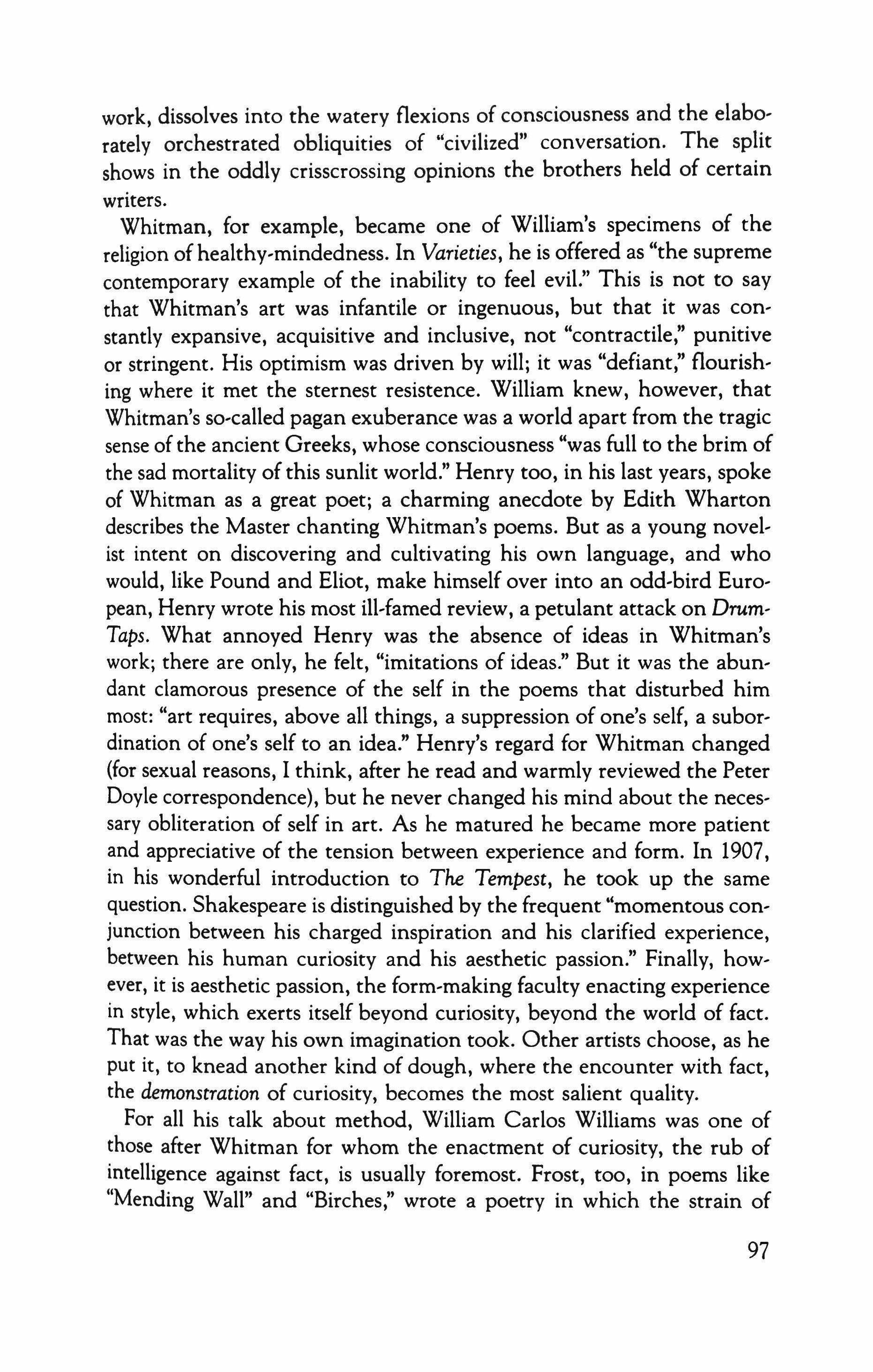
work, dissolves into the watery flexions of consciousness and the elaborately orchestrated obliquities of "civilized" conversation. The split shows in the oddly crisscrossing opinions the brothers held of certain writers.
Whitman, for example, became one of William's specimens of the religion ofhealthy,mindedness. In Varieties, he is offered as "the supreme contemporary example of the inability to feel evil." This is not to say that Whitman's art was infantile or ingenuous, but that it was con, stantly expansive, acquisitive and inclusive, not "contractile," punitive or stringent. His optimism was driven by will; it was "defiant," flourish, ing where it met the sternest resistence. William knew, however, that Whitman's so-called pagan exuberance was a world apart from the tragic sense of the ancient Greeks, whose consciousness "was full to the brim of the sad mortality of this sunlit world." Henry too, in his last years, spoke of Whitman as a great poet; a charming anecdote by Edith Wharton describes the Master chanting Whitman's poems. But as a young novel, ist intent on discovering and cultivating his own language, and who would, like Pound and Eliot, make himself over into an odd-bird European, Henry wrote his most ill-famed review, a petulant attack on Drum, Taps. What annoyed Henry was the absence of ideas in Whitman's work; there are only, he felt, "imitations of ideas." But it was the abundant clamorous presence of the self in the poems that disturbed him most: "art requires, above all things, a suppression of one's self, a subordination of one's self to an idea." Henry's regard for Whitman changed (for sexual reasons, I think, after he read and warmly reviewed the Peter Doyle correspondence), but he never changed his mind about the necessary obliteration of self in art. As he matured he became more patient and appreciative of the tension between experience and form. In 1907, in his wonderful introduction to The Tempest, he took up the same question. Shakespeare is distinguished by the frequent "momentous con, junction between his charged inspiration and his clarified experience, between his human curiosity and his aesthetic passion." Finally, how, ever, it is aesthetic passion, the form-making faculty enacting experience in style, which exerts itself beyond curiosity, beyond the world of fact. That was the way his own imagination took. Other artists choose, as he put it, to knead another kind of dough, where the encounter with fact, the demonstration of curiosity, becomes the most salient quality. For all his talk about method, William Carlos Williams was one of those after Whitman for whom the enactment of curiosity, the rub of intelligence against fact, is usually foremost. Frost, too, in poems like "Mending Wall" and "Birches," wrote a poetry in which the strain of
97
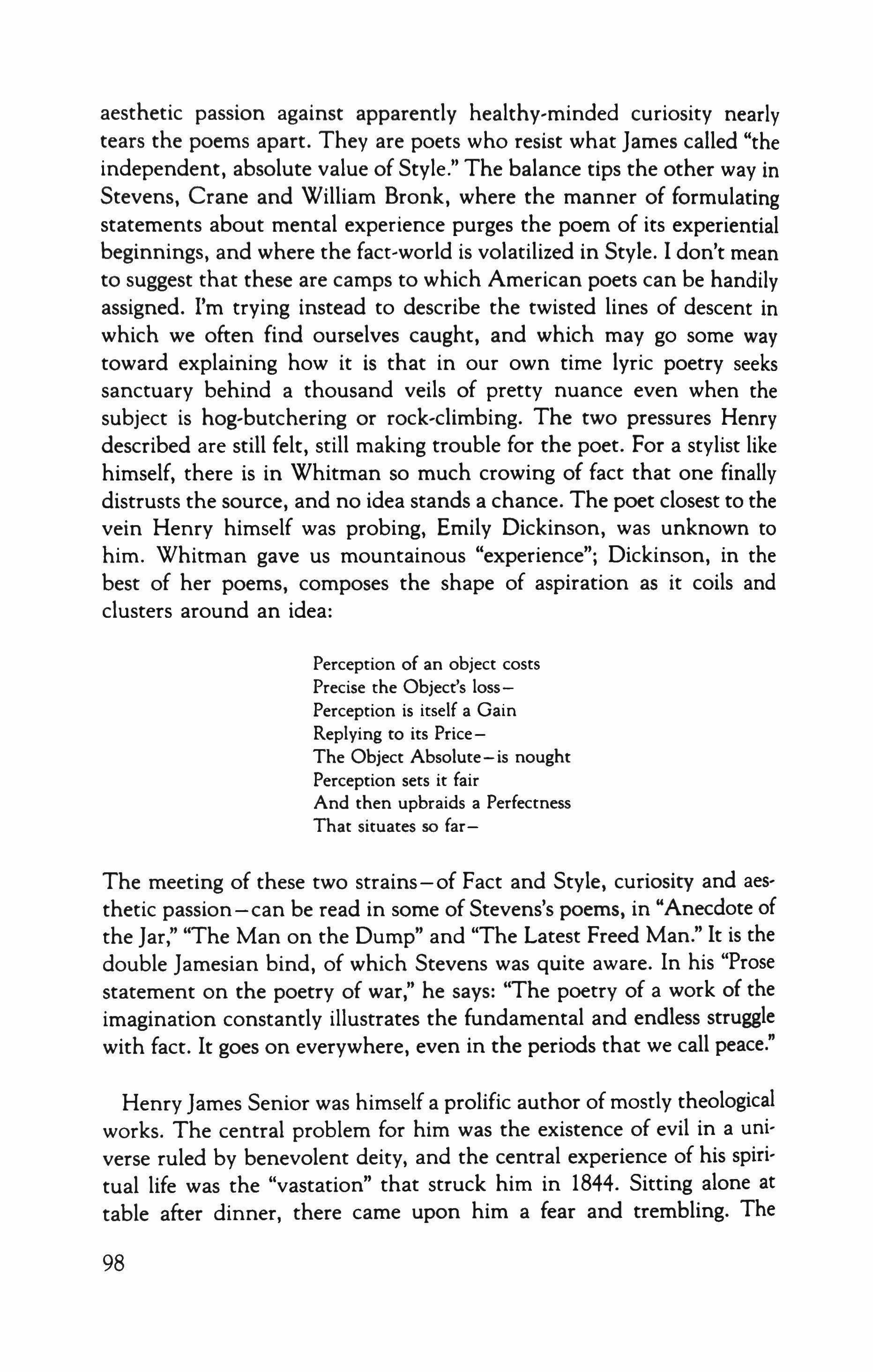
aesthetic passion against apparently healthy-minded curiosity nearly tears the poems apart. They are poets who resist what James called "the independent, absolute value of Style." The balance tips the other way in Stevens, Crane and William Bronk, where the manner of formulating statements about mental experience purges the poem of its experiential beginnings, and where the fact-world is volatilized in Style. I don't mean to suggest that these are camps to which American poets can be handily assigned. I'm trying instead to describe the twisted lines of descent in which we often find ourselves caught, and which may go some way toward explaining how it is that in our own time lyric poetry seeks sanctuary behind a thousand veils of pretty nuance even when the subject is hog-butchering or rock-climbing. The two pressures Henry described are still felt, still making trouble for the poet. For a stylist like himself, there is in Whitman so much crowing of fact that one finally distrusts the source, and no idea stands a chance. The poet closest to the vein Henry himself was probing, Emily Dickinson, was unknown to him. Whitman gave us mountainous "experience"; Dickinson, in the best of her poems, composes the shape of aspiration as it coils and clusters around an idea:
Perception of an object costs Precise the Object's lossPerception is itself a Gain Replying to its PriceThe Object Absolute-is nought Perception sets it fair And then upbraids a Perfectness That situates so far-
The meeting of these two strains-of Fact and Style, curiosity and aesthetic passion - can be read in some of Stevens's poems, in "Anecdote of the Jar," "The Man on the Dump" and "The Latest Freed Man." It is the double Jamesian bind, of which Stevens was quite aware. In his "Prose statement on the poetry of war," he says: ''The poetry of a work of the imagination constantly illustrates the fundamental and endless struggle with fact. It goes on everywhere, even in the periods that we call peace."
Henry James Senior was himself a prolific author of mostly theological works. The central problem for him was the existence of evil in a universe ruled by benevolent deity, and the central experience of his spiritual life was the "vastation" that struck him in 1844. Sitting alone at table after dinner, there came upon him a fear and trembling. The
98
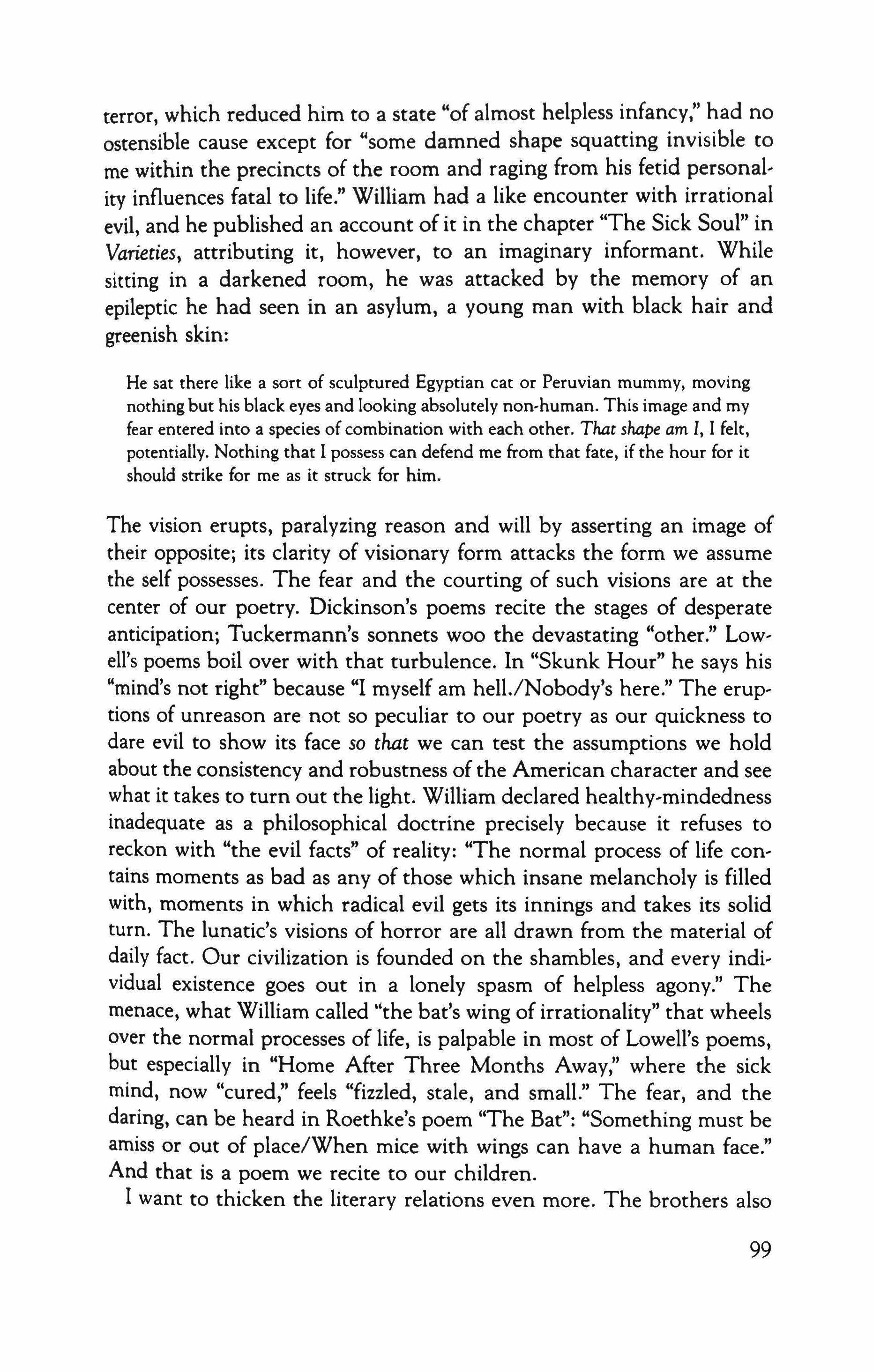
terror, which reduced him to a state "of almost helpless infancy," had no ostensible cause except for "some damned shape squatting invisible to me within the precincts of the room and raging from his fetid personality influences fatal to life." William had a like encounter with irrational evil, and he published an account of it in the chapter "The Sick Soul" in Varieties, attributing it, however, to an imaginary informant. While sitting in a darkened room, he was attacked by the memory of an epileptic he had seen in an asylum, a young man with black hair and greenish skin:
He sat there like a sort of sculptured Egyptian cat or Peruvian mummy, moving nothing but his black eyes and looking absolutely non-human. This image and my fear entered into a species of combination with each other. That shape am I, I felt, potentially. Nothing that I possess can defend me from that fate, if the hour for it should strike for me as it struck for him.
The vision erupts, paralyzing reason and will by asserting an image of their opposite; its clarity of visionary form attacks the form we assume the self possesses. The fear and the courting of such visions are at the center of our poetry. Dickinson's poems recite the stages of desperate anticipation; Tuckermann's sonnets woo the devastating "other." Lowell's poems boil over with that turbulence. In "Skunk Hour" he says his "mind's not right" because "I myself am hell.lNobody's here." The eruptions of unreason are not so peculiar to our poetry as our quickness to dare evil to show its face so that we can test the assumptions we hold about the consistency and robustness of the American character and see what it takes to turn out the light. William declared healthy-mindedness inadequate as a philosophical doctrine precisely because it refuses to reckon with "the evil facts" of reality: "The normal process of life contains moments as bad as any of those which insane melancholy is filled with, moments in which radical evil gets its innings and takes its solid turn. The lunatic's visions of horror are all drawn from the material of daily fact. Our civilization is founded on the shambles, and every individual existence goes out in a lonely spasm of helpless agony." The menace, what William called "the bat's wing of irrationality" that wheels over the normal processes of life, is palpable in most of Lowell's poems, but especially in "Home After Three Months Away," where the sick mind, now "cured," feels "fizzled, stale, and small." The fear, and the daring, can be heard in Roethke's poem "The Bat": "Something must be amiss or out of place/When mice with wings can have a human face." And that is a poem we recite to our children. I want to thicken the literary relations even more. The brothers also
99

shared an interest in Baudelaire and Hawthorne. Henry said that in his treatment of evil Baudelaire was "exactly what Hawthorne was notHawthorne, who felt the thing at its source, deep in the human consciousness." From the vastations in the james family we know that the father and William had knowledge of "evil facts." William, moreover, believed that his brother's art, at least in its early phase, owed something to Hawthorne, "some real American mental quality." That quality, I think, is the knowledge of the reality of evil as it is expressed in the ordinary conduct of social relations. For William it was defined in solitary, spectral terms. The Varieties of Religious Experience is not about societies of belief but about confrontations between individual minds and the palpable reality of the unseen. In his chosen discipline, William investigated frontiers. For Henry, evil was inevitably social, issuing from desires activated by will, and its expression took the form of the corruption of the consciousness of others by manipulating it to serve selfish interests. (Pound, in his long essay on james, called it "personal intimate tyrannies working at close range.") Of Baudelaire, Henry said "evil for him begins outside and not inside," and that he knew evil "not by experience, not as something within himself, but by contemplation and curiosity, as something outside himself."
The relations between many of the characters in the novels beginning with What Maisie Knew are made up of small signs which enact, as he says in The Wings of the Dove, "the whole soft breath of consciousness meeting and promoting consciousness." Henry takes this as a given in all intimate human relations. (His brother wrote: "Something is always mere fact and givenness.") As early as The Bostonians he was already treating, though not so obsessively, the "moist moral impress" humans make on each other. When someone abuses this power of affecting the shaping of another's consciousness, by misrepresenting the truths according to which the will acts upon its choices, or by manipulating the desires of others in order to serve self-interests or, worse, to enhance one's material life, that person is committing evil. In The Wings of the Dove, when Densher goes to see Milly Theale in Venice, with full knowledge that he is making up to her in hope of inheriting her fortune, he encounters the maggiordomo Eugenio who, less disingenuously, is himself overcharging Millie for his services. In the gaze of the cynical, knowing Italian, Densher feels the whole force of his own playing with evil. The entire scene, in his consciousness, accuses him; it is one of the scenes in james's fiction where all his powers of transformation are engaged:
100
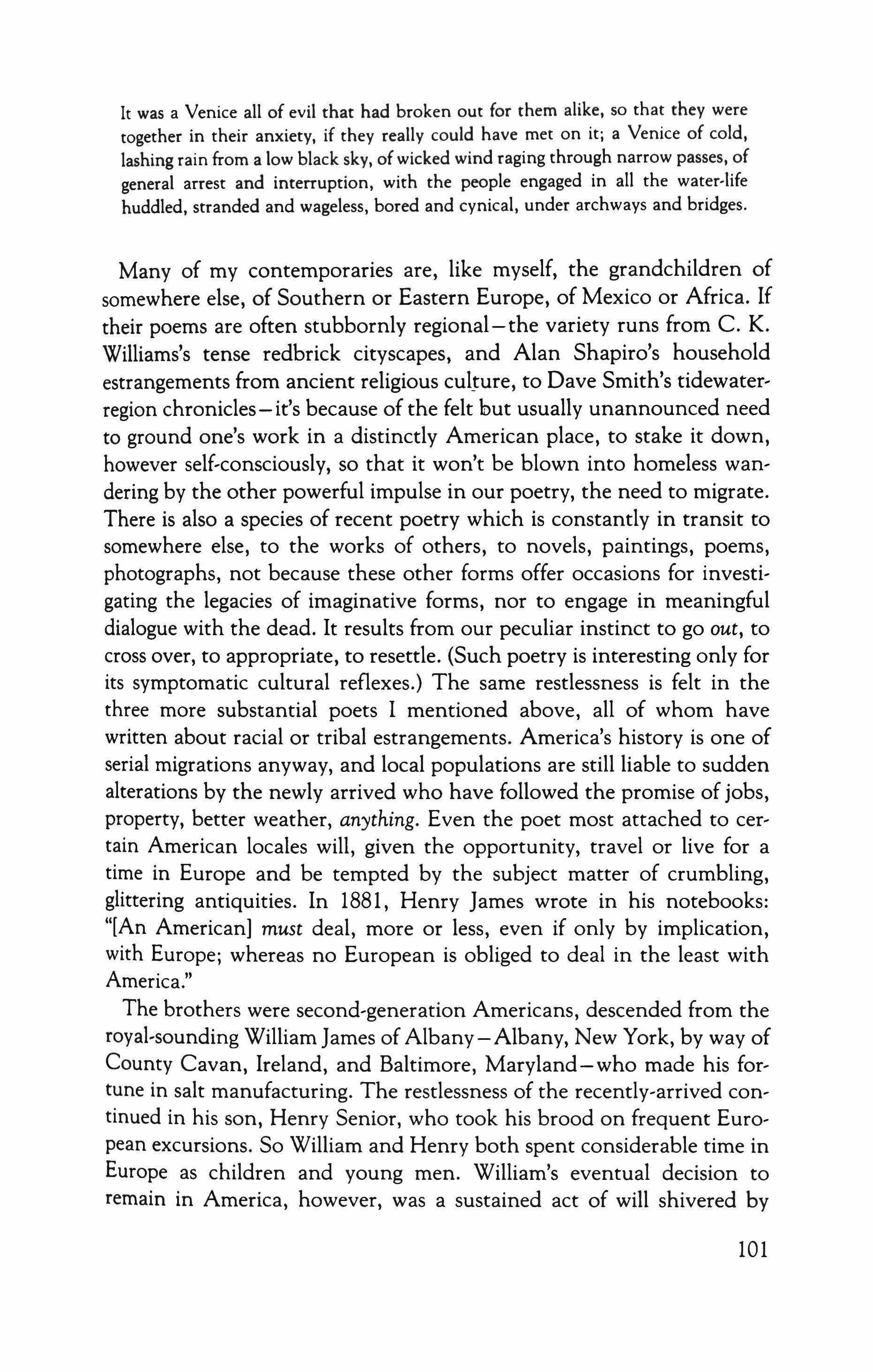
It was a Venice all of evil that had broken out for them alike, so that they were together in their anxiety, if they really could have met on it; a Venice of cold, lashing rain from a low black sky, of wicked wind raging through narrow passes, of general arrest and interruption, with the people engaged in all the water-life huddled, stranded and wageless, bored and cynical, under archways and bridges.
Many of my contemporaries are, like myself, the grandchildren of somewhere else, of Southern or Eastern Europe, of Mexico or Africa. If their poems are often stubbornly regional-the variety runs from C. K. Williams's tense redbrick cityscapes, and Alan Shapiro's household estrangements from ancient religious culture, to Dave Smith's tidewaterregion chronicles-it's because of the felt but usually unannounced need to ground one's work in a distinctly American place, to stake it down, however self-consciously, so that it won't be blown into homeless wandering by the other powerful impulse in our poetry, the need to migrate. There is also a species of recent poetry which is constantly in transit to somewhere else, to the works of others, to novels, paintings, poems, photographs, not because these other forms offer occasions for investigating the legacies of imaginative forms, nor to engage in meaningful dialogue with the dead. It results from our peculiar instinct to go out, to cross over, to appropriate, to resettle. (Such poetry is interesting only for its symptomatic cultural reflexes.) The same restlessness is felt in the three more substantial poets I mentioned above, all of whom have written about racial or tribal estrangements. America's history is one of serial migrations anyway, and local populations are still liable to sudden alterations by the newly arrived who have followed the promise of jobs, property, better weather, anything. Even the poet most attached to certain American locales will, given the opportunity, travel or live for a time in Europe and be tempted by the subject matter of crumbling, glittering antiquities. In 1881, Henry James wrote in his notebooks: "[An American] must deal, more or less, even if only by implication, with Europe; whereas no European is obliged to deal in the least with America."
The brothers were second-generation Americans, descended from the royal-sounding William James of Albany-Albany, New York, by way of County Cavan, Ireland, and Baltimore, Maryland-who made his fortune in salt manufacturing. The restlessness of the recentlv-arrived continued in his son, Henry Senior, who took his brood on frequent European excursions. So William and Henry both spent considerable time in Europe as children and young men. William's eventual decision to remain in America, however, was a sustained act of will shivered by
101

frequent doubts. Returning from a visit to Henry in England in 1893, he wrote his brother yet another letter about mixed impulses. He writes from "The Salters' Hill-Top" near his summer home in Chocorua, a region he loves dearly. But he sees it differently now. Compared to his recent memories of Switzerland, the American landscape is a "poverty, stricken land, and sad American sunlight over all-sad because so empty." His return makes him so melancholy that he is hardened in his resolution not to leave America again unless it is to go somewhere to end his days: "Such a divided soul is very bad." We must recall William's vacillating temperament. The philosopher of the power of will, whose pluralism seems the product of decisive, concentrated intelligence, had a hard time making up his mind about many things. When he was in Europe, he became twice an American; in America, he was quasi, European. The divided soul is in any event too familiar a condition for many American artists to be dismissed as one man's hobbyhorse. He says that all the orders of the Old World have been won by populations staying put for generations, and that Americans must now do the same. But he is fifty-one years old; it has taken him that long to decide. William is writing out of a particular fear and lonesomeness; from his beautiful hilltop he has been struck by the vision of "a terrible grimness, more ugliness than I ever realized in things, and a greater weakness in nature's beauty, such as it is. One must pitch one's whole sensibility first in a different key-then gradually the quantum of personal happiness of which one is susceptible fills the cup - but the moment of change of key is lonesome." That lonesomeness, the hilltop brooding on the waste, vacancy and thinness which are just the other side of American enthusiasm, runs through the poetry of James Wright, Gary Snyder and A. R. Ammons.
Henry was more decisive. As if retracing his grandfather's route, after initial "test" excursions he went to England in 1881 (the year of the notebook entry) and did not return for over twenty years. One purpose of Pound's 1918 essay on James was to testify to his realization of an American European art. Pound was a wilder internationalist, and the sort of impresario and culture,mediator that James, whose impulse was always to dramatize and refine discriminations rather than preach them, could never have been. But in James Pound saw an American perform' ing a sort of necessary repatriation to the native Europe of the mind. It was a Europe which in Pound's case, as Europeans will insist, only an American could have imagined. But it was a powerful idea boomed by a powerful personality. For James, at any rate, the change of key was his way of situating himself in a culture which provided him material for the
102
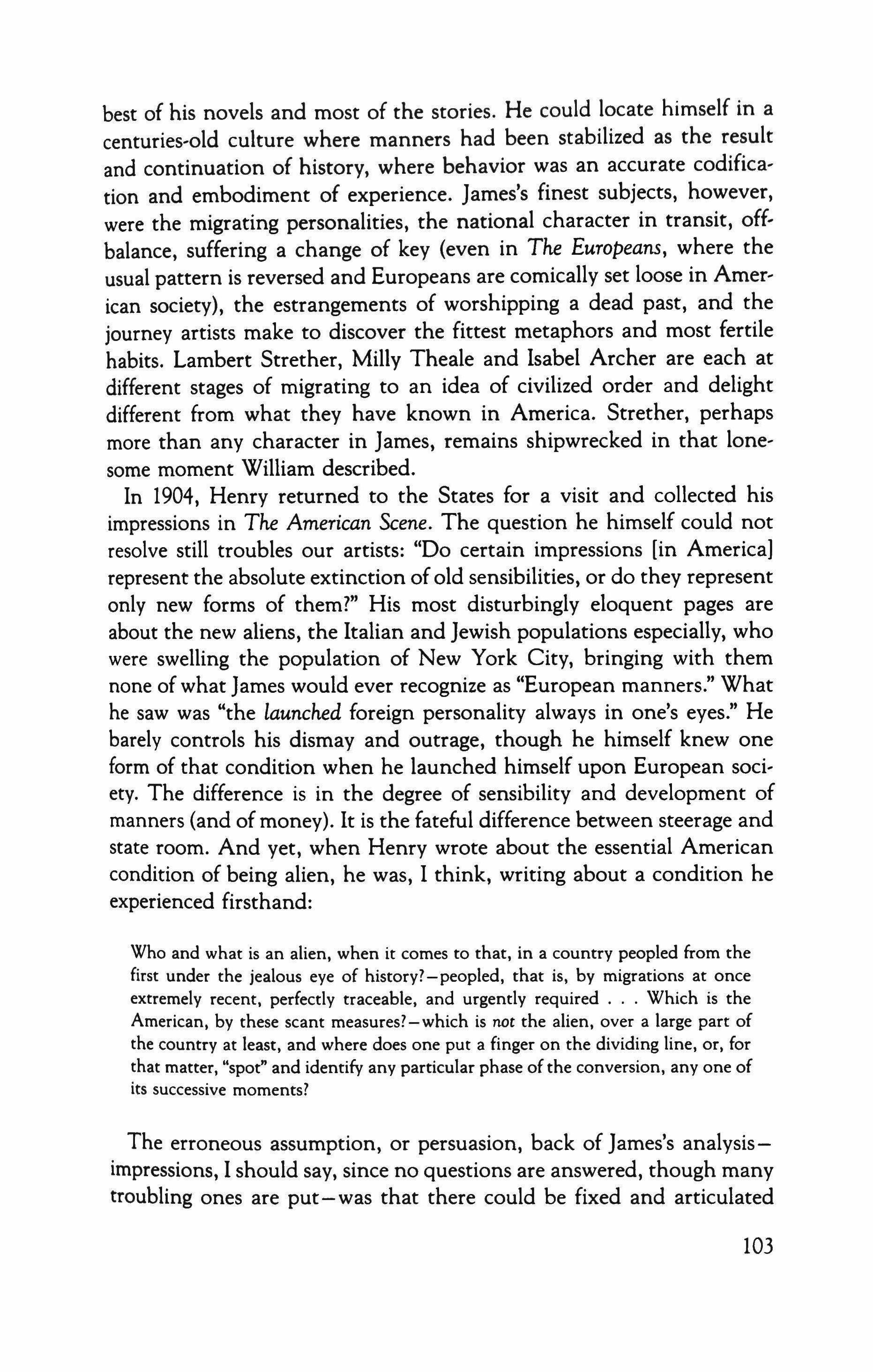
best of his novels and most of the stories. He could locate himself in a centuries-old culture where manners had been stabilized as the result and continuation of history, where behavior was an accurate codification and embodiment of experience. James's finest subjects, however, were the migrating personalities, the national character in transit, off, balance, suffering a change of key (even in The Europeans, where the usual pattern is reversed and Europeans are comically set loose in American society), the estrangements of worshipping a dead past, and the journey artists make to discover the fittest metaphors and most fertile habits. Lambert Strether, Milly Theale and Isabel Archer are each at different stages of migrating to an idea of civilized order and delight different from what they have known in America. Strether, perhaps more than any character in James, remains shipwrecked in that lone' some moment William described.
In 1904, Henry returned to the States for a visit and collected his impressions in The American Scene. The question he himself could not resolve still troubles our artists: "Do certain impressions [in America] represent the absolute extinction ofold sensibilities, or do they represent only new forms of them?" His most disturbingly eloquent pages are about the new aliens, the Italian and Jewish populations especially, who were swelling the population of New York City, bringing with them none ofwhat James would ever recognize as "European manners." What he saw was "the launched foreign personality always in one's eyes." He barely controls his dismay and outrage, though he himself knew one form of that condition when he launched himself upon European society. The difference is in the degree of sensibility and development of manners (and of money). It is the fateful difference between steerage and state room. And yet, when Henry wrote about the essential American condition of being alien, he was, I think, writing about a condition he experienced firsthand:
Who and what is an alien, when it comes to that, in a country peopled from the first under the jealous eye of history?-peopled, that is, by migrations at once extremely recent, perfectly traceable, and urgently required Which is the American, by these scant measures? - which is not the alien, over a large part of the country at least, and where does one put a finger on the dividing line, or, for that matter, "spot" and identify any particular phase of the conversion, anyone of its successive moments?
The erroneous assumption, or persuasion, back of James's analysisimpressions, I should say, since no questions are answered, though many troubling ones are put - was that there could be fixed and articulated
103
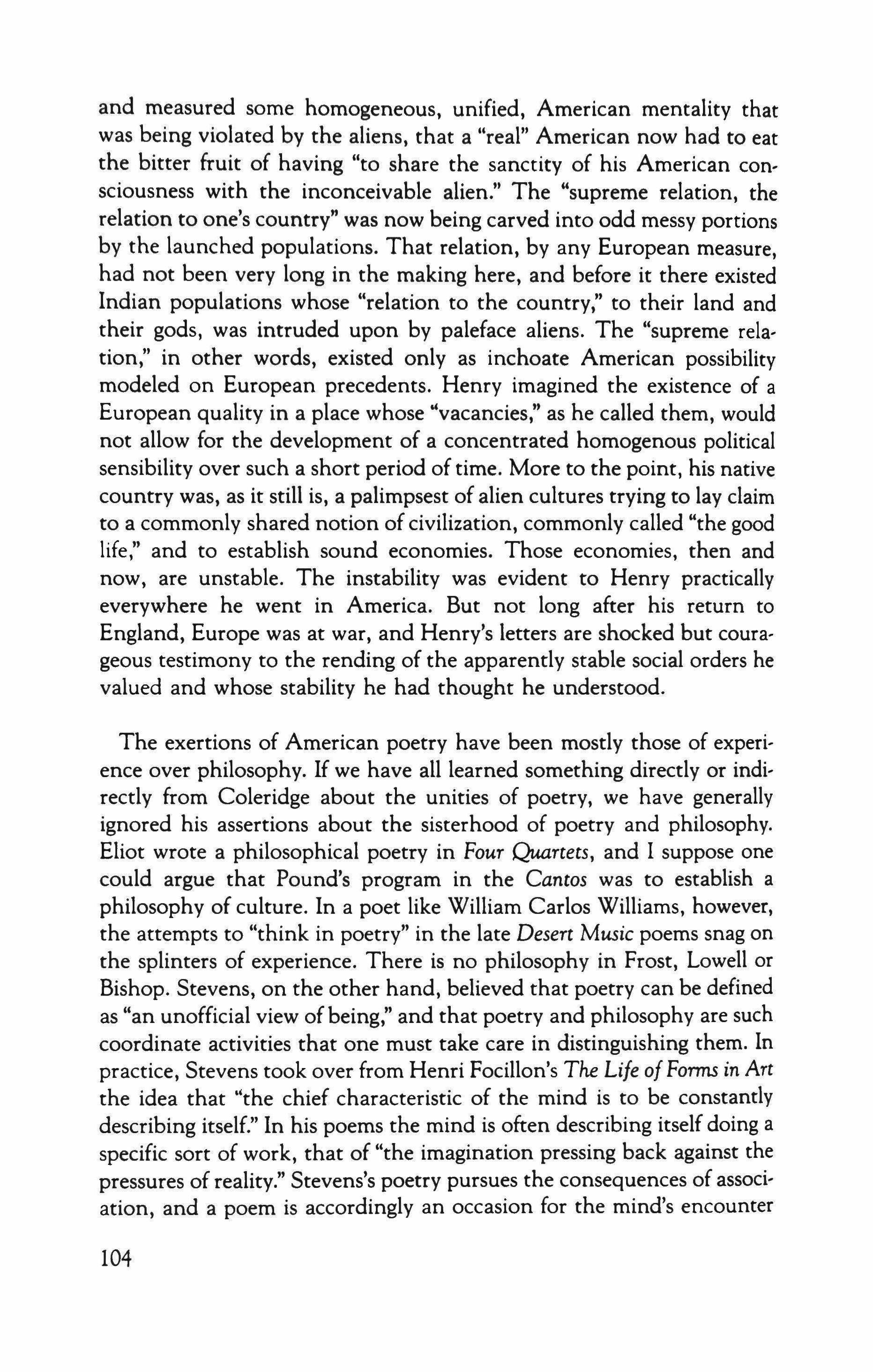
and measured some homogeneous, unified, American mentality that was being violated by the aliens, that a "real" American now had to eat the bitter fruit of having "to share the sanctity of his American consciousness with the inconceivable alien." The "supreme relation, the relation to one's country" was now being carved into odd messy portions by the launched populations. That relation, by any European measure, had not been very long in the making here, and before it there existed Indian populations whose "relation to the country," to their land and their gods, was intruded upon by paleface aliens. The "supreme relation," in other words, existed only as inchoate American possibility modeled on European precedents. Henry imagined the existence of a European quality in a place whose "vacancies," as he called them, would not allow for the development of a concentrated homogenous political sensibility over such a short period of time. More to the point, his native country was, as it still is, a palimpsest of alien cultures trying to lay claim to a commonly shared notion of civilization, commonly called "the good life," and to establish sound economies. Those economies, then and now, are unstable. The instability was evident to Henry practically everywhere he went in America. But not long after his return to England, Europe was at war, and Henry's letters are shocked but courageous testimony to the rending of the apparently stable social orders he valued and whose stability he had thought he understood.
The exertions of American poetry have been mostly those of experience over philosophy. If we have all learned something directly or indirectly from Coleridge about the unities of poetry, we have generally ignored his assertions about the sisterhood of poetry and philosophy. Eliot wrote a philosophical poetry in Four Quartets, and I suppose one could argue that Pound's program in the Cantos was to establish a philosophy of culture. In a poet like William Carlos Williams, however, the attempts to "think in poetry" in the late Desert Music poems snag on the splinters of experience. There is no philosophy in Frost, Lowell or Bishop. Stevens, on the other hand, believed that poetry can be defined as "an unofficial view ofbeing," and that poetry and philosophy are such coordinate activities that one must take care in distinguishing them. In practice, Stevens took over from Henri Focillon's The Life ofForms in Art the idea that "the chief characteristic of the mind is to be constantly describing itself." In his poems the mind is often describing itself doing a specific sort of work, that of "the imagination pressing back against the pressures of reality." Stevens's poetry pursues the consequences of association, and a poem is accordingly an occasion for the mind's encounter
104

with such consequences. Stevens was, in all this, very influenced by Coleridge, but the only poet since who follows Stevens in writing "poetry that thinks" (the phrase is Richard Pevear's, though I'm abusing it a little to fit my own purposes) is William Bronk. American poets generally don't share Coleridge's or Stevens's interest in philosophy. Most of us are, in Simone Weil's phrase, too much the children of the Age of Psychology. Whether we are aware of it or not, William James is really the closest thing to a representative philosopher-or antiphilosopher-that we have. Frost's "The Most of It" is a Jamesian poem: the reality of the self, its shape and its solitude, depends on the answer it gets from physical encounters with the world, where the habitual regard and definition may be shattered by new fact:
Instead of proving human when it neared And someone else additional to him, As a great buck it powerfully appeared, Pushing the crumpled water up ahead, And landed pouring like a waterfall, And stumbled through the rocks with horny tread, And forced the underbrush-and that was all.
William James's statement of purpose in the Gifford Lectures, which became The Varieties of Religious Experience, asserts what I believe to be the assumption behind much of our poetry and its procedures: "to defend 'experience' against 'philosophy' as being the real backbone ofthe world's religious life-I mean prayer, guidance, and all that sort of thing immediately and privately felt, as against high and noble general views of our destiny and the world's meaning." James always valued this kind oflyric subjectivism, the quick sharp lash of the particular, over magisterial generalization. His career had its real beginnings in 1870 when he read in the French philosopher Charles Renouvier that free will is "the sustaining of a thought because I choose to when I might have other thoughts." Nor did free will, thus understood, need to be an illusion. His first act of free will, he joked, would be to believe in free will. The conviction sustained him throughout his life and preserved him from the "vastations" which I'm certain would have destroyed him. On the basis of free will-James's enthusiasm for Renouvier seems now a little embarrassing, but his enthusiasms often had a suffocating American hugginess-he built his philosophy of radical empiricism, of the experimental self finding its definition in a world of changeful experience. He held to a belief in indeterminism, but of his own design, in which "the free-will theory of popular sense based on the judgement of regret
105

represents the world as vulnerable, and liable to be injured by certain parts if they act wrong. And it represents their acting wrong as a matter of possibility or accident, neither inevitable nor yet to be infallibly warded off." His model for the universe was "pluralistic, restless," so that no summative, unified view could take it in. In our daily existence, this model as something lived with and through means that iffree will fails, or is corrupted, the world must slow down to a sluggish, blandly unified, monochromatic field of vision such as Lowell arrives at in "Waking Early Sunday Morning":
Pity the planet, all joy gone from this sweet volcanic cone; peace to our children when they fall in small war on the heels of small war-until the end of time to police the earth, a ghost orbiting forever lost in our monotonous sublime.
That entire poem, one more in the anthology of American Sunday poems, is about the painful, defeatist exertions of will in a world of reckless circumstance and meaningless ritual: "0 to break loose." It is instinct in poets to think there exists a unified view of things, that poetry can sooner or later, in William's phrase, "take in the whole scene." But it's also instinct among American poets to distrust ideal unities of any sort. Even if the field of vision seems one and coherent, we look for exceptions, monsters, or dismantle the whole view into sheared perspectives. Lyric poetry at any rate celebrates and enacts occasions, which are serial, discrete, empirical, extracted from the pluralist rush of mental and physical events. Giving form to those urgent selections is a stay against devastation. Lowell's career is in this respect representative, because so many of the poems beginning with Life Studies push mercilessly against the sort of grandiose, unified, but determinist and (in Henry Adams's term) entropic, view that concludes "Waking Early Sunday Morning." William James would have recognized at once these exertions, just as he would have recognized the conversions in Elizabeth Bishop's late poems, especially "In the Waiting Room." In The Will to Believe, James described the view of the radical empiricist: "For him the crudity of experience remains an eternal element [of the world]. There is no possible point of view from which the world can appear an absolutely single fact."
And yet there is that other profound instinct for unity, even in a
106
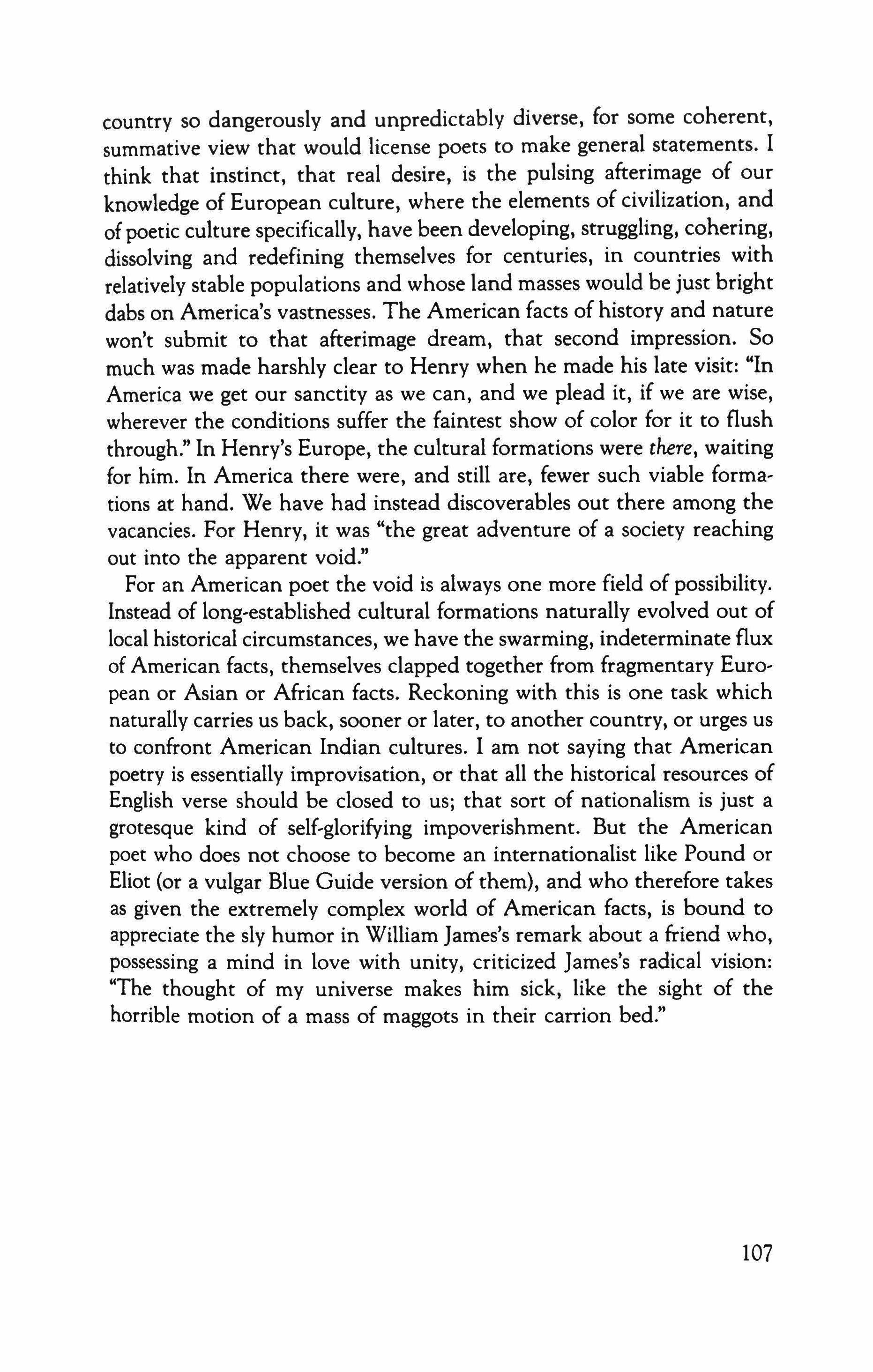
country so dangerously and unpredictably diverse, for some coherent, summative view that would license poets to make general statements. I think that instinct, that real desire, is the pulsing afterimage of our knowledge of European culture, where the elements of civilization, and ofpoetic culture specifically, have been developing, struggling, cohering, dissolving and redefining themselves for centuries, in countries with relatively stable populations and whose land masses would be just bright dabs on America's vastnesses. The American facts of history and nature won't submit to that afterimage dream, that second impression. So much was made harshly clear to Henry when he made his late visit: "In America we get our sanctity as we can, and we plead it, if we are wise, wherever the conditions suffer the faintest show of color for it to flush through." In Henry's Europe, the cultural formations were there, waiting for him. In America there were, and still are, fewer such viable formations at hand. We have had instead discoverables out there among the vacancies. For Henry, it was "the great adventure of a society reaching out into the apparent void."
For an American poet the void is always one more field of possibility. Instead of long-established cultural formations naturally evolved out of local historical circumstances, we have the swarming, indeterminate flux of American facts, themselves clapped together from fragmentary European or Asian or African facts. Reckoning with this is one task which naturally carries us back, sooner or later, to another country, or urges us to confront American Indian cultures. I am not saying that American poetry is essentially improvisation, or that all the historical resources of English verse should be closed to us; that sort of nationalism is just a grotesque kind of self-glorifying impoverishment. But the American poet who does not choose to become an internationalist like Pound or Eliot (or a vulgar Blue Guide version of them), and who therefore takes as given the extremely complex world of American facts, is bound to appreciate the sly humor in William James's remark about a friend who, possessing a mind in love with unity, criticized James's radical vision: "The thought of my universe makes him sick, like the sight of the horrible motion of a mass of maggots in their carrion bed."
107



An American Describes A New Sect
(1760)
Brendan Galvin

These Passionaries, as you may know, like to lie about in their finery and lament their condition. It is nothing to pass a harmless bush in the country and have it begin shaking as if it would burst afire. Formerly you thought some beast was making its way through, but now more likely it's a wretch uttering truisms ready-made for the tablets. The air fills, all exclamations and lamentatious vowels, all ohs! and ahs! mingled, a catalogue of the believer's crimes and the most unseemly parts of his biography. A sort of high holy day falls sometime in the mud season, when the March air's pine-chilled, suffused with water, and the whole cult leaps from hummock to hummock of snow in their best livery, wading streams that flee the hills from a confluence of snowmelt dropping off a ledge. Not one of those watery bell pulls, either, but such a curtain as would shrink you back to your proper significance. They enter that roar through damp ferns and
111

smoking snow and take a furious hosing. Wings of it burst up on their shoulders and the whites of their skulls show where it beats down their hair. Then begins a general confession of failure and shortcomings, as from a collection of drowned gargoyles. Shaky songs splatter out of them, and glossal nonsense, while columns rush out their sleeves, and shoes overflow. It beats the stockings to their very ankles, which, by the time they are rescued, have turned quite blue. As for me, I find a quiet walk across a field in seed salubrious for shaking off encumbrances men load upon themselves. It is useful to stir up a flight of thin, light membranes, which climb to the air and are carried to other regions, there to colonize themselves anew, or to kick up a dust and arrive at the far side with pollinated ankles, gold rings which are not manacles.
112
Two Poems
Rita Dove Canary
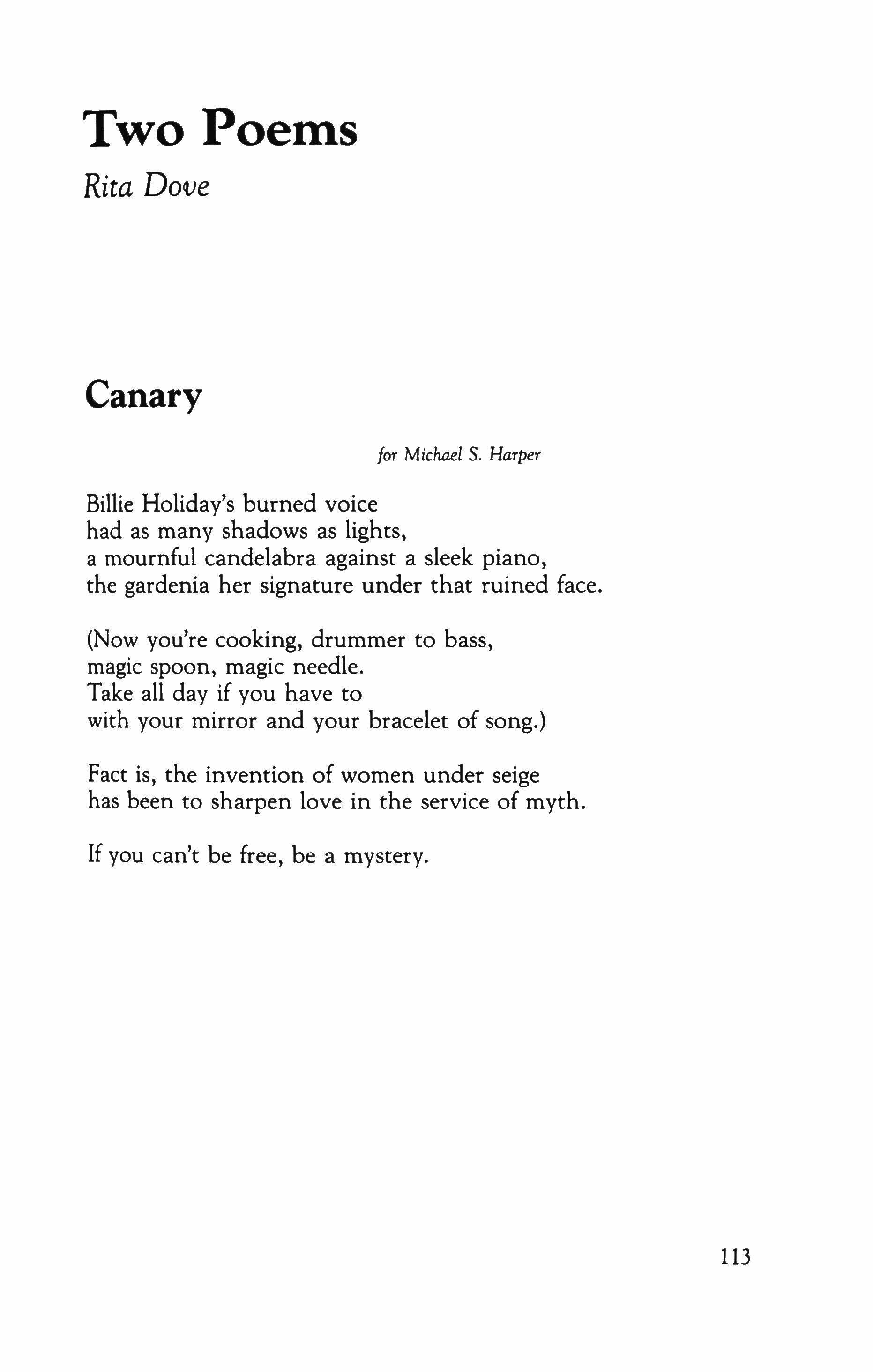 for Michael S. Harper
for Michael S. Harper
Billie Holiday's burned voice had as many shadows as lights, a mournful candelabra against a sleek piano, the gardenia her signature under that ruined face.
(Now you're cooking, drummer to bass, magic spoon, magic needle. Take all day if you have to with your mirror and your bracelet of song.)
Fact is, the invention of women under seige has been to sharpen love in the service of myth.
If you can't be free, be a mystery.
113
Genie's Prayer
Under the Kitchen Sink
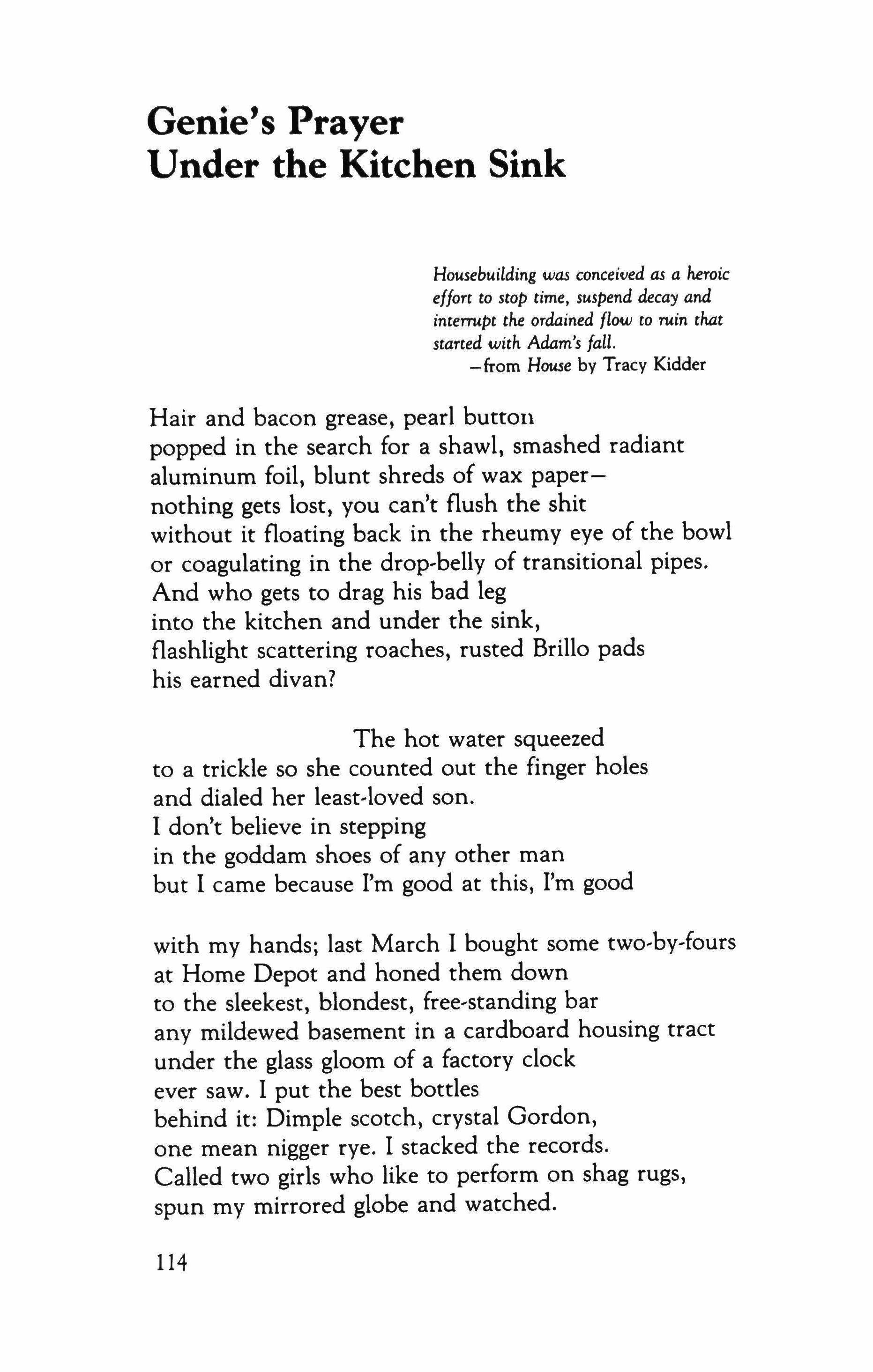
Housebuilding was conceived as a heroic effort to stop time, suspend decay and interrupt the ordained flow to ruin that started with Adam's fall. -from House by Tracy Kidder
Hair and bacon grease, pearl button popped in the search for a shawl, smashed radiant aluminum foil, blunt shreds of wax papernothing gets lost, you can't flush the shit without it floating back in the rheumy eye of the bowl or coagulating in the drop-belly of transitional pipes. And who gets to drag his bad leg into the kitchen and under the sink, flashlight scattering roaches, rusted Brillo pads his earned divan?
The hot water squeezed to a trickle so she counted out the finger holes and dialed her least-loved son.
I don't believe in stepping in the goddam shoes of any other man but I came because I'm good at this, I'm good
with my hands; last March I bought some two-by-fours at Home Depot and honed them down to the sleekest, blondest, free-standing bar any mildewed basement in a cardboard housing tract under the glass gloom of a factory clock ever saw. I put the best bottles behind it: Dimple scotch, crystal Gordon, one mean nigger rye. I stacked the records. Called two girls who like to perform on shag rugs, spun my mirrored globe and watched.
114
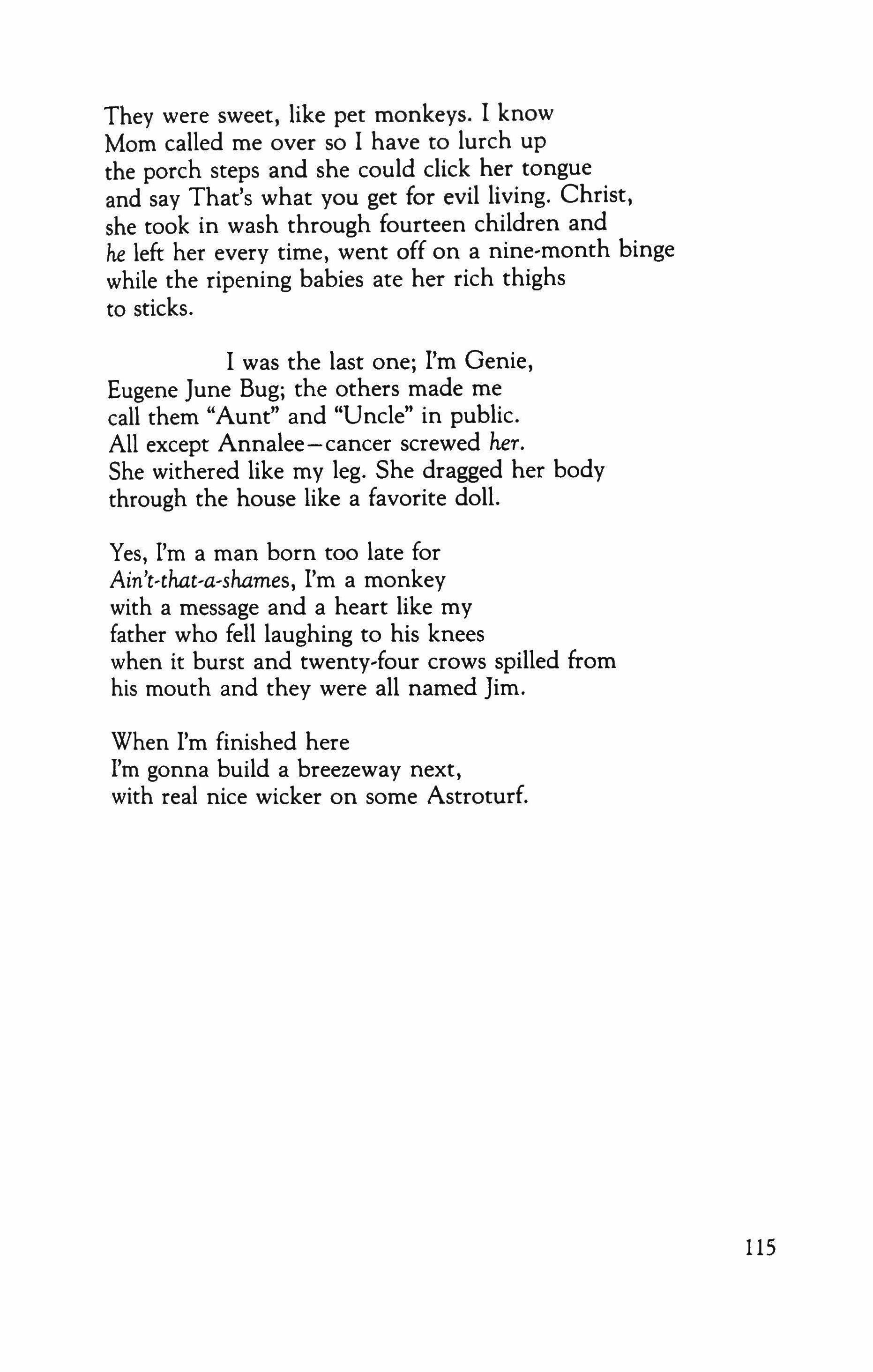
They were sweet, like pet monkeys. I know Mom called me over so I have to lurch up the porch steps and she could click her tongue and say That's what you get for evil living. Christ, she took in wash through fourteen children and he left her every time, went off on a nine-month binge while the ripening babies ate her rich thighs to sticks.
I was the last one; I'm Genie, Eugene June Bug; the others made me call them "Aunt" and "Uncle" in public. All except Annalee-cancer screwed her. She withered like my leg. She dragged her body through the house like a favorite doll.
Yes, I'm a man born too late for Ain'r,r'har,a,s'hames, I'm a monkey with a message and a heart like my father who fell laughing to his knees when it burst and twenty-four crows spilled from his mouth and they were all named Jim.
When I'm finished here I'm gonna build a breezeway next, with real nice wicker on some Astroturf.
115
Two Poems
Dannie Abse

Crepuscolo
Crepuscolo (Evening) is one of the partly finished statues by Michelangelo in the Medici Chapel, San Lorenzo.
To the gray Sacristy of San Lorenzo tourists come whispering lest they waken this self,absorbed statue and it assail each prying one of them, lest a stone hand uplift to point and the stone head utter, slowly turning. "Wrongdoing and shame prevail!"
Once all drowsy in Carrara. Harmlessly, unnumbered shadows brooded under the weight of rock-ledges, lizards hardly animate. Then certain men came. Still the stone's cry safe and soundless, still the statue slumbered in the refuge of the rock's estate.
But, soon, massive slabs were brutally urged from the mountain-the half-bright, half-stripped bodies of workmen struggling in dazzle and bone, white powder of marble, smoking sunlight. How could they discern the one waking there or hear stone words in the larynx of the stone?
116
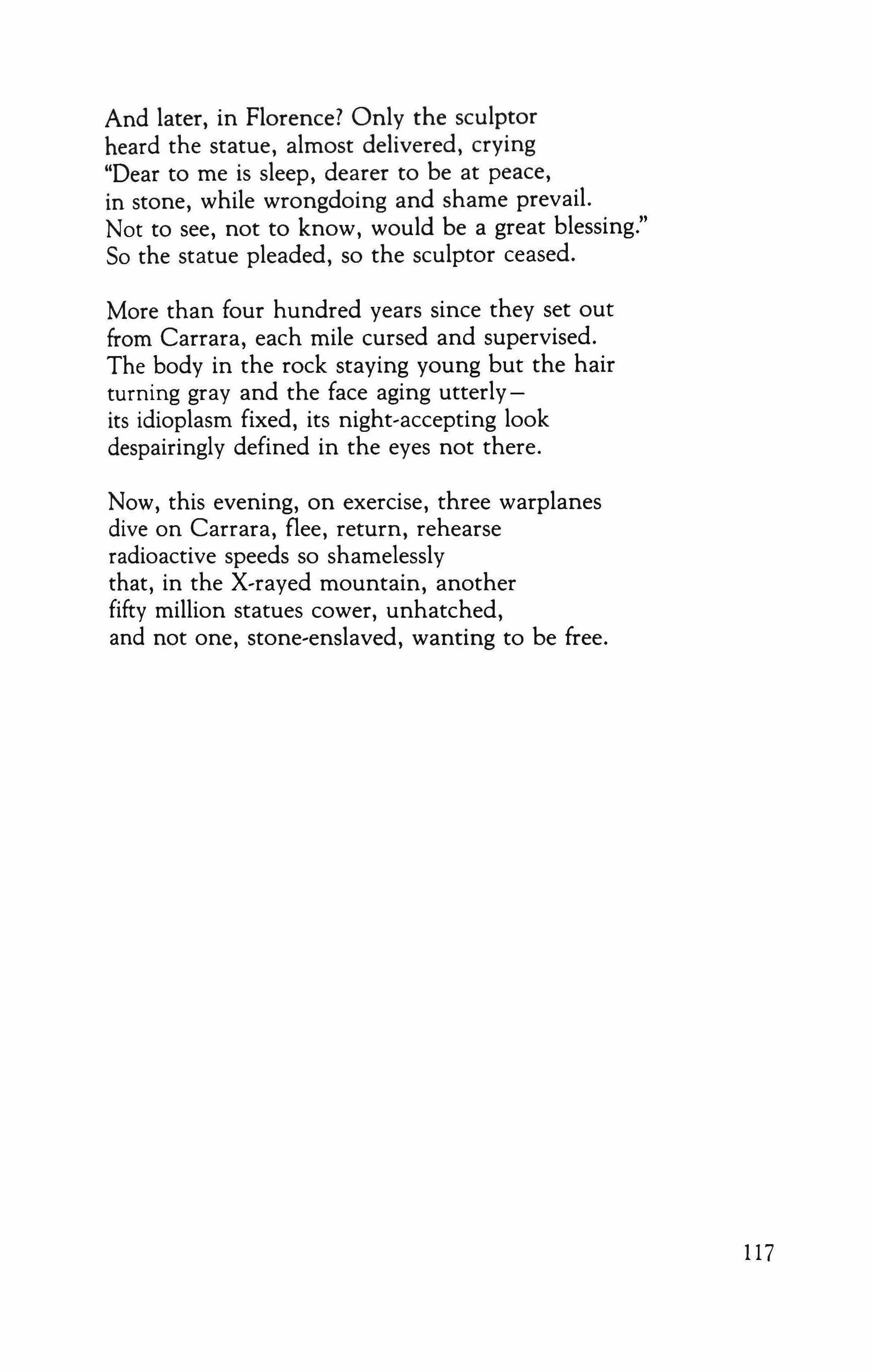
And later, in Florence? Only the sculptor heard the statue, almost delivered, crying "Dear to me is sleep, dearer to be at peace, in stone, while wrongdoing and shame prevail. Not to see, not to know, would be a great blessing." So the statue pleaded, so the sculptor ceased.
More than four hundred years since they set out from Carrara, each mile cursed and supervised. The body in the rock staying young but the hair turning gray and the face aging utterlyits idioplasm fixed, its night-accepting look despairingly defined in the eyes not there.
Now, this evening, on exercise, three warplanes dive on Carrara, flee, return, rehearse radioactive speeds so shamelessly that, in the Xvrayed mountain, another fifty million statues cower, unhatched, and not one, stone-enslaved, wanting to be free.
117
Last Visit to 198 Cathedral Road
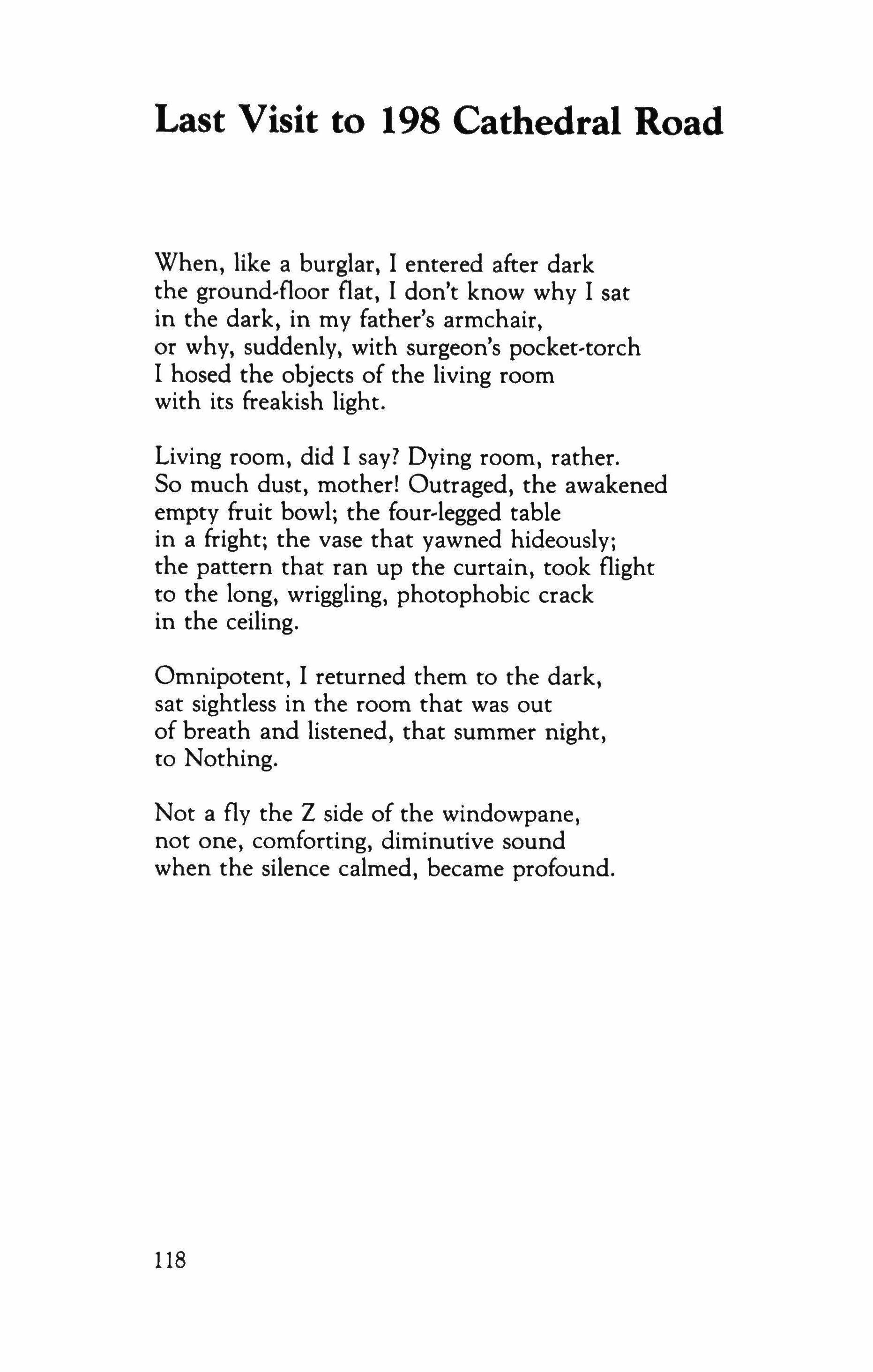
When, like a burglar, I entered after dark the ground-floor flat, I don't know why I sat in the dark, in my father's armchair, or why, suddenly, with surgeon's pocket-torch I hosed the objects of the living room with its freakish light.
Living room, did I say? Dying room, rather. So much dust, mother! Outraged, the awakened empty fruit bowl; the four-legged table in a fright; the vase that yawned hideously; the pattern that ran up the curtain, took flight to the long, wriggling, photophobic crack in the ceiling.
Omnipotent, I returned them to the dark, sat sightless in the room that was out of breath and listened, that summer night, to Nothing.
Not a fly the Z side of the windowpane, not one, comforting, diminutive sound when the silence calmed, became profound.
118
Black and White Tulips
Larry Moffi
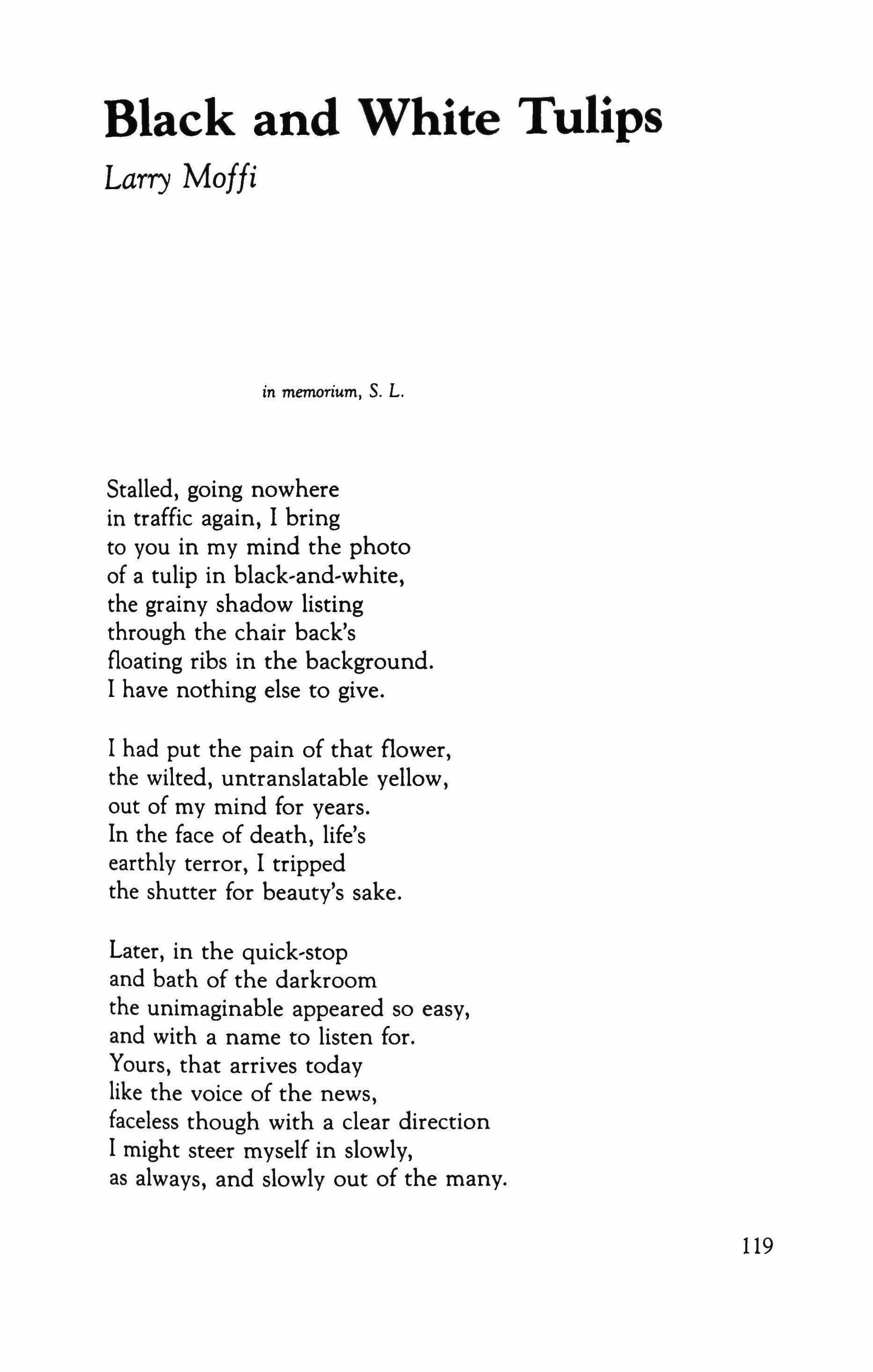
in memorium, S. L.
Stalled, going nowhere in traffic again, I bring to you in my mind the photo of a tulip in black-and-white, the grainy shadow listing through the chair back's floating ribs in the background. I have nothing else to give.
I had put the pain of that flower, the wilted, untranslatable yellow, out of my mind for years. In the face of death, life's earthly terror, I tripped the shutter for beauty's sake.
Later, in the quick-stop and bath of the darkroom the unimaginable appeared so easy, and with a name to listen for.
Yours, that arrives today like the voice of the news, faceless though with a clear direction I might steer myself in slowly, as always, and slowly out of the many.
119
The Fields of Light
Mairi MacInnes
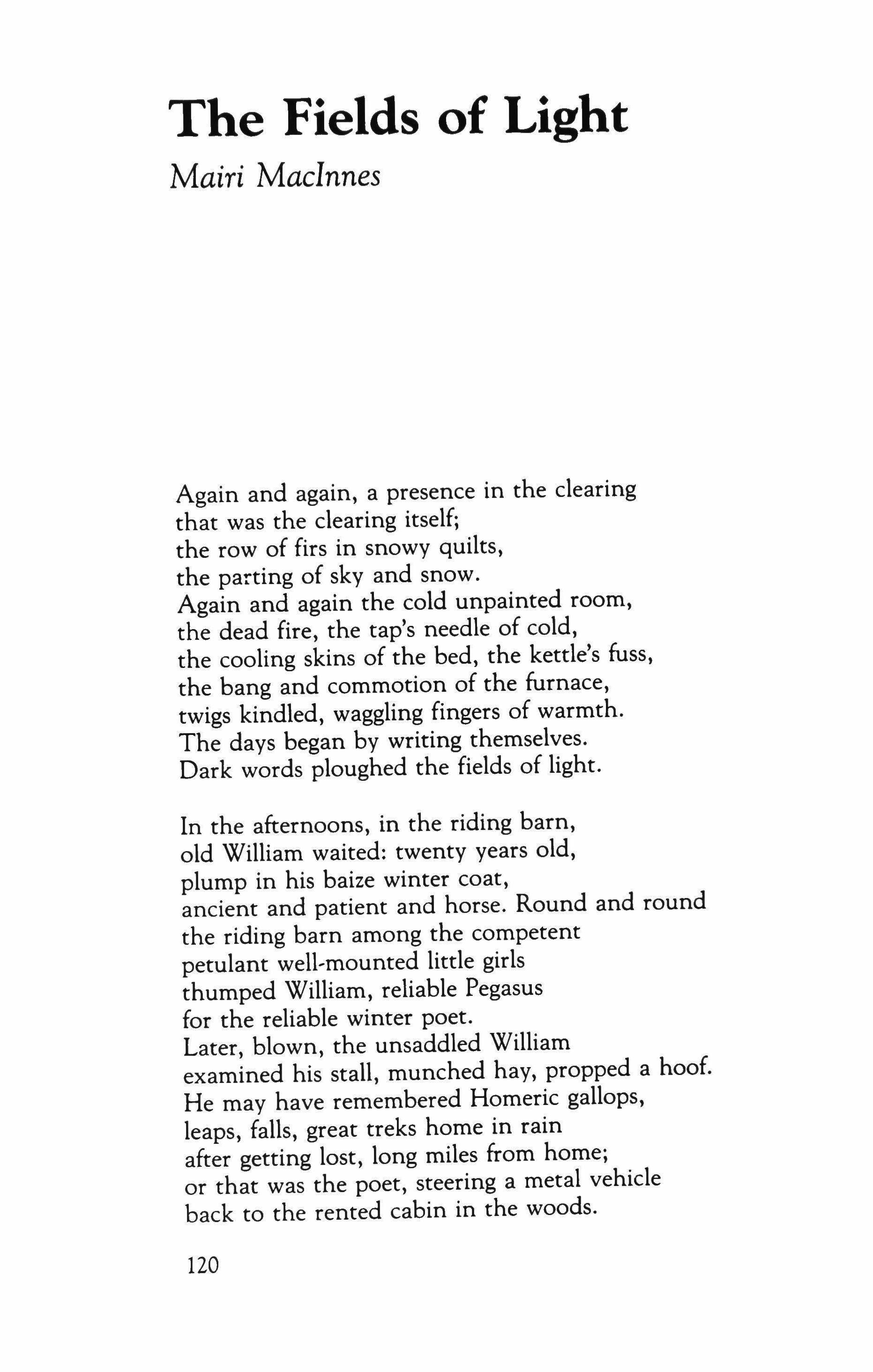
Again and again, a presence in the clearing that was the clearing itself; the row of firs in snowy quilts, the parting of sky and snow. Again and again the cold unpainted room, the dead fire, the tap's needle of cold, the cooling skins of the bed, the kettle's fuss, the bang and commotion of the furnace, twigs kindled, waggling fingers of warmth. The days began by writing themselves. Dark words ploughed the fields of light.
In the afternoons, in the riding barn, old William waited: twenty years old, plump in his baize winter coat, ancient and patient and horse. Round and round the riding barn among the competent petulant well-mounted little girls thumped William, reliable Pegasus for the reliable winter poet. Later, blown, the unsaddled William examined his stall, munched hay, propped a hoof. He may have remembered Homeric gallops, leaps, falls, great treks home in rain after getting lost, long miles from home; or that was the poet, steering a metal vehicle back to the rented cabin in the woods.
120
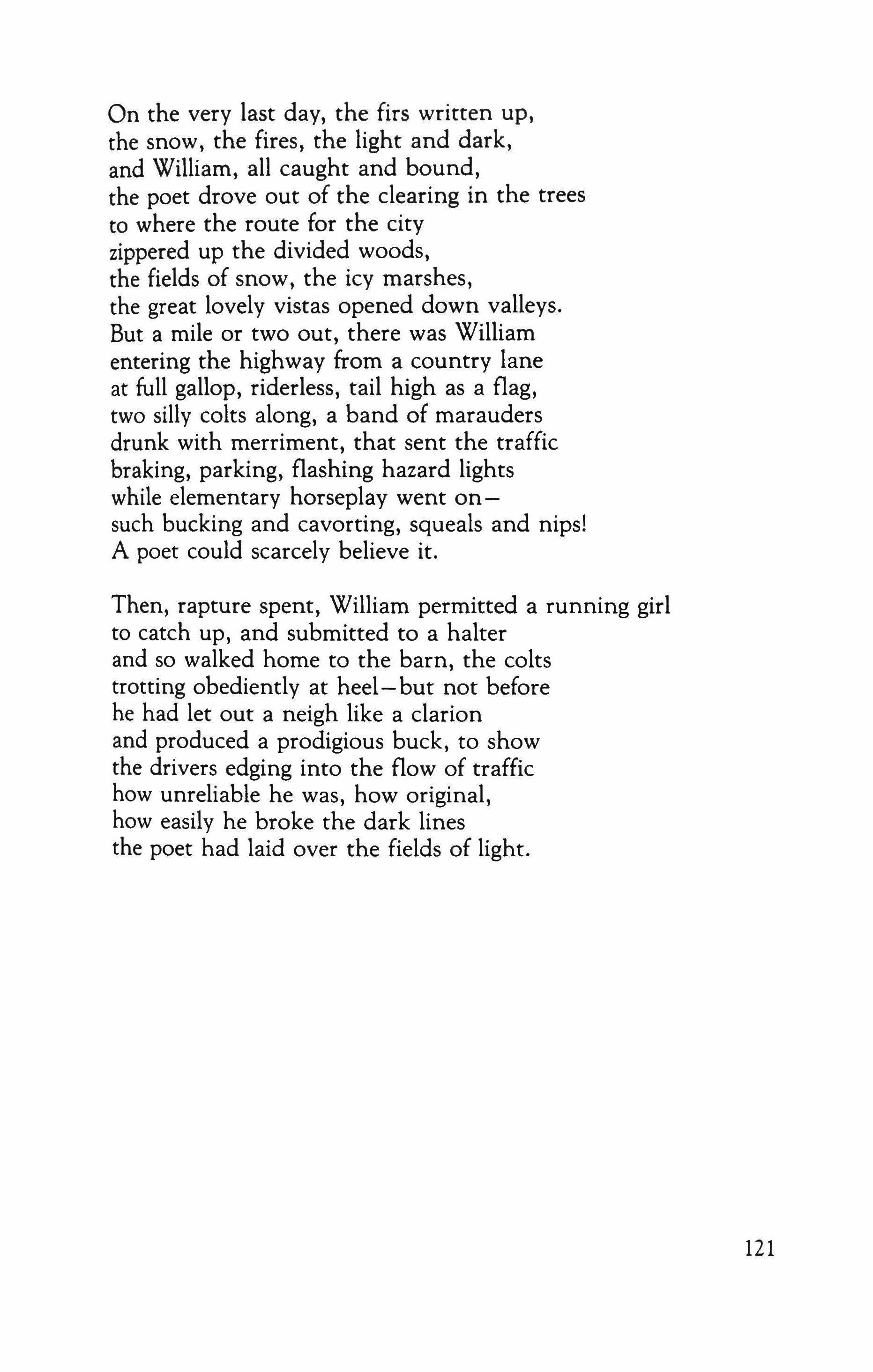
On the very last day, the firs written up, the snow, the fires, the light and dark, and William, all caught and bound, the poet drove out of the clearing in the trees to where the route for the city zippered up the divided woods, the fields of snow, the icy marshes, the great lovely vistas opened down valleys. But a mile or two out, there was William entering the highway from a country lane at full gallop, riderless, tail high as a flag, two silly colts along, a band of marauders drunk with merriment, that sent the traffic braking, parking, flashing hazard lights while elementary horseplay went onsuch bucking and cavorting, squeals and nips! A poet could scarcely believe it.
Then, rapture spent, William permitted a running girl to catch up, and submitted to a halter and so walked home to the barn, the colts trotting obediently at heel-but not before he had let out a neigh like a clarion and produced a prodigious buck, to show the drivers edging into the flow of traffic how unreliable he was, how original, how easily he broke the dark lines the poet had laid over the fields of light.
121
The Food Pickers of Saigon
Walter McDonald
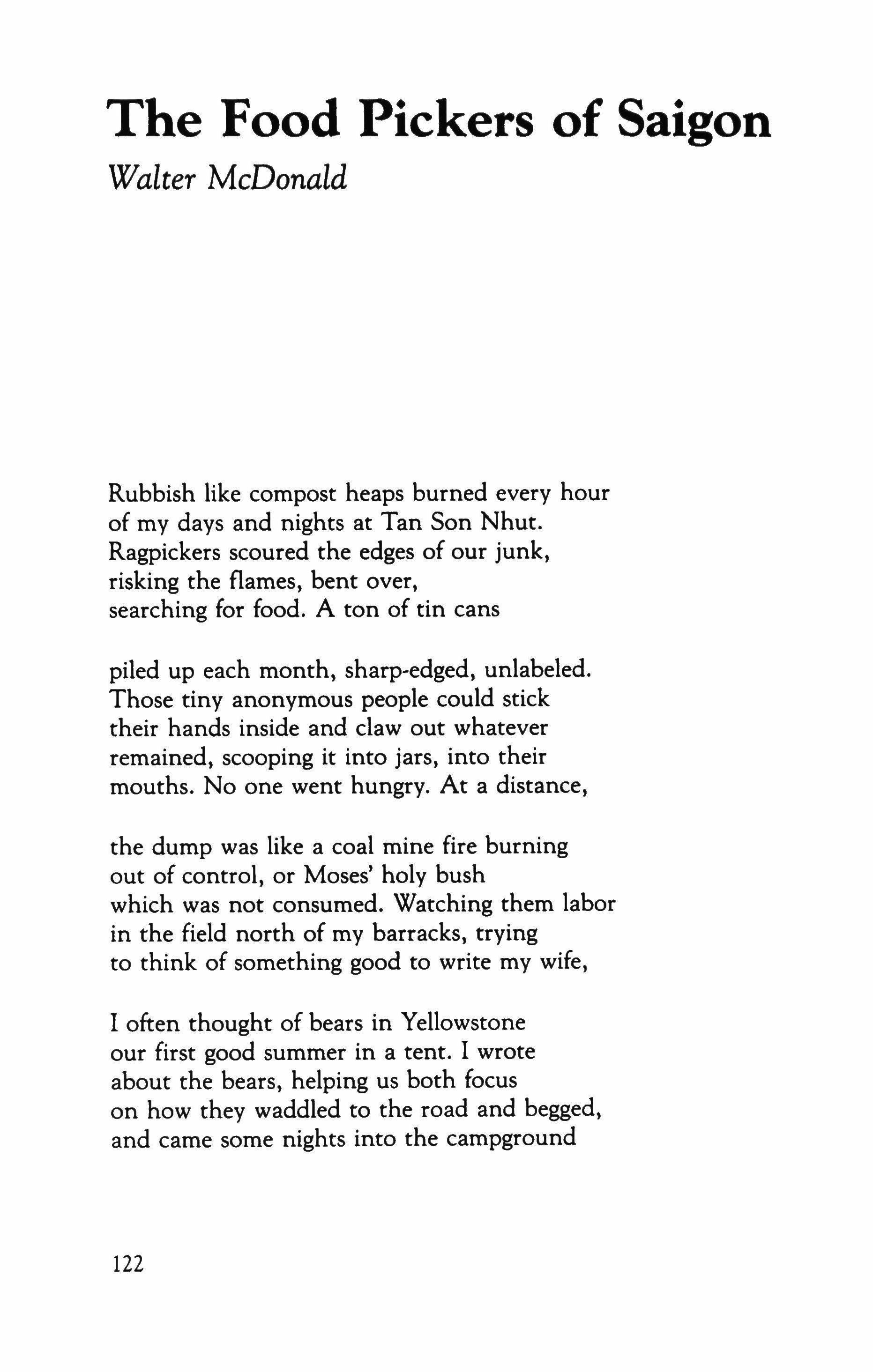
Rubbish like compost heaps burned every hour of my days and nights at Tan Son Nhut. Ragpickers scoured the edges of our junk, risking the flames, bent over, searching for food. A ton of tin cans
piled up each month, sharp-edged, unlabeled. Those tiny anonymous people could stick their hands inside and claw out whatever remained, scooping it into jars, into their mouths. No one went hungry. At a distance,
the dump was like a coal mine fire burning out of control, or Moses' holy bush which was not consumed. Watching them labor in the field north of my barracks, trying to think of something good to write my wife,
I often thought of bears in Yellowstone our first good summer in a tent. I wrote about the bears, helping us both focus on how they waddled to the road and begged, and came some nights into the campground
122
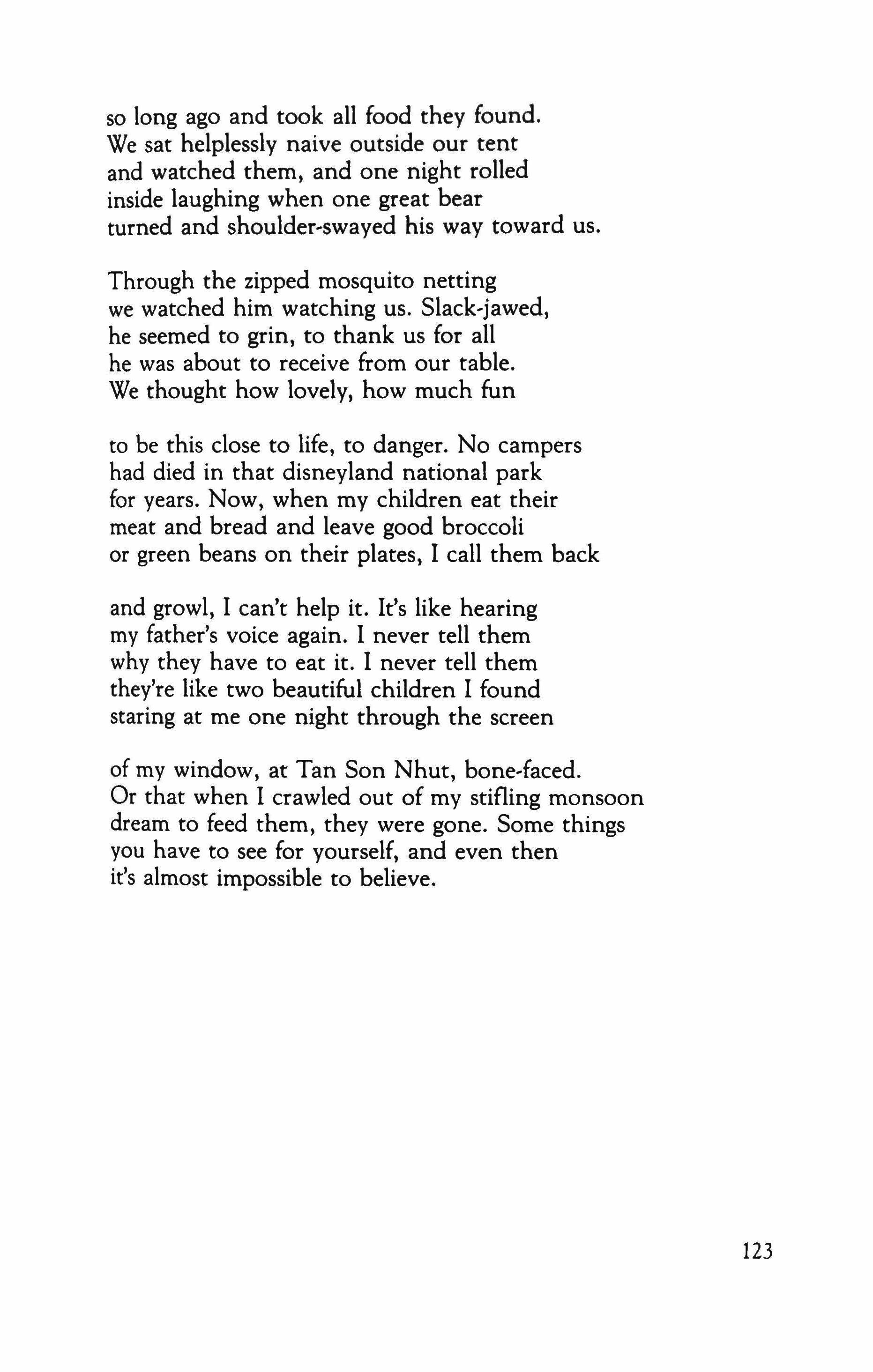
so long ago and took all food they found. We sat helplessly naive outside our tent and watched them, and one night rolled inside laughing when one great bear turned and shoulder-swayed his way toward us.
Through the zipped mosquito netting we watched him watching us. Slack-jawed, he seemed to grin, to thank us for all he was about to receive from our table. We thought how lovely, how much fun
to be this close to life, to danger. No campers had died in that disneyland national park for years. Now, when my children eat their meat and bread and leave good broccoli or green beans on their plates, I call them back
and growl, I can't help it. It's like hearing my father's voice again. I never tell them why they have to eat it. I never tell them they're like two beautiful children I found staring at me one night through the screen
of my window, at Tan Son Nhut, bone-faced. Or that when I crawled out of my stifling monsoon dream to feed them, they were gone. Some things you have to see for yourself, and even then it's almost impossible to believe.
123
Correggio's "10"
John R. Reed
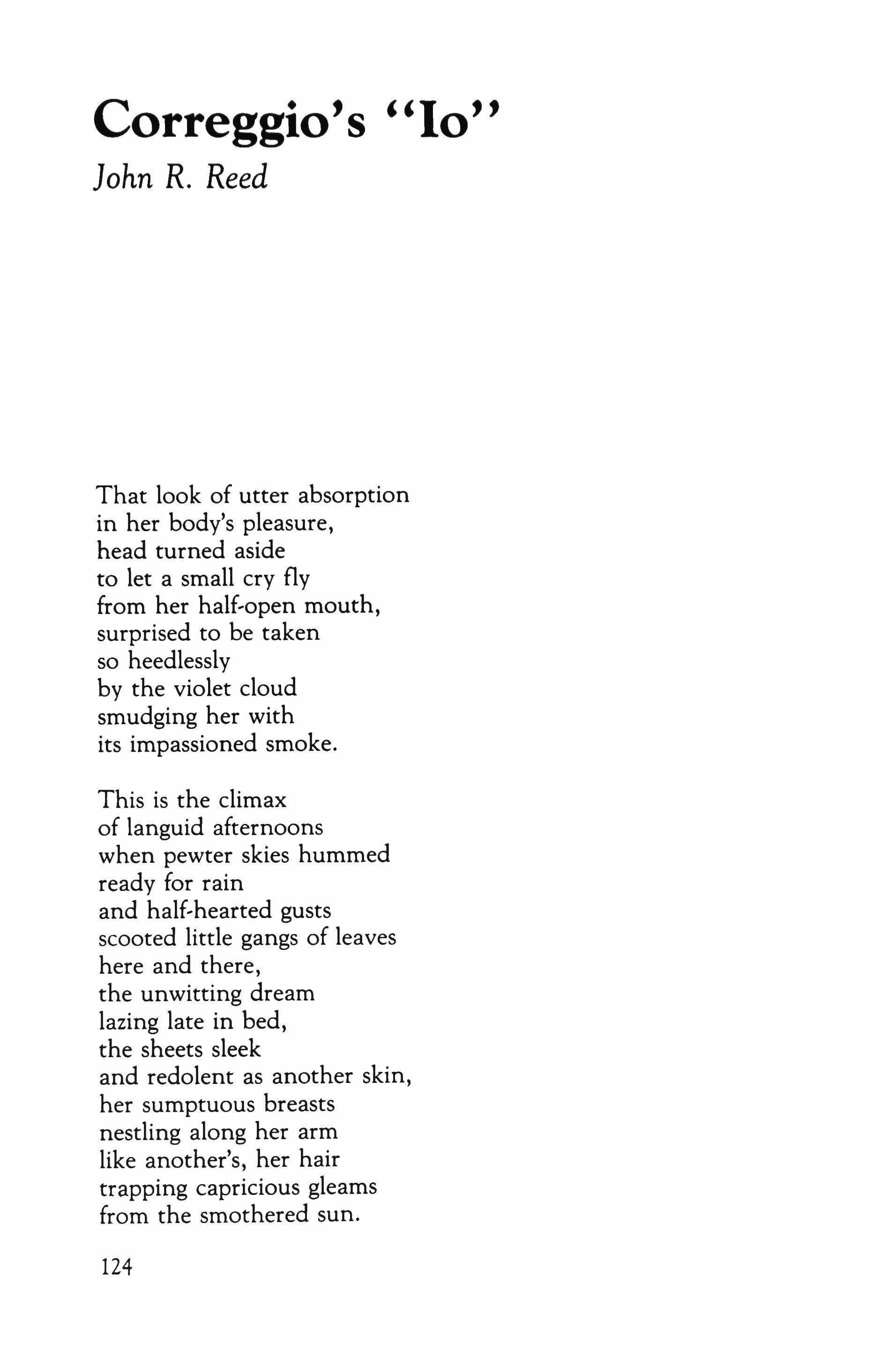
That look of utter absorption in her body's pleasure, head turned aside to let a small cry fly from her half-open mouth, surprised to be taken so heedlessly by the violet cloud smudging her with its impassioned smoke.
This is the climax of languid afternoons when pewter skies hummed ready for rain and half,hearted gusts scooted little gangs of leaves here and there, the unwitting dream lazing late in bed, the sheets sleek and redolent as another skin, her sumptuous breasts nestling along her arm like another's, her hair trapping capricious gleams from the smothered sun.
124
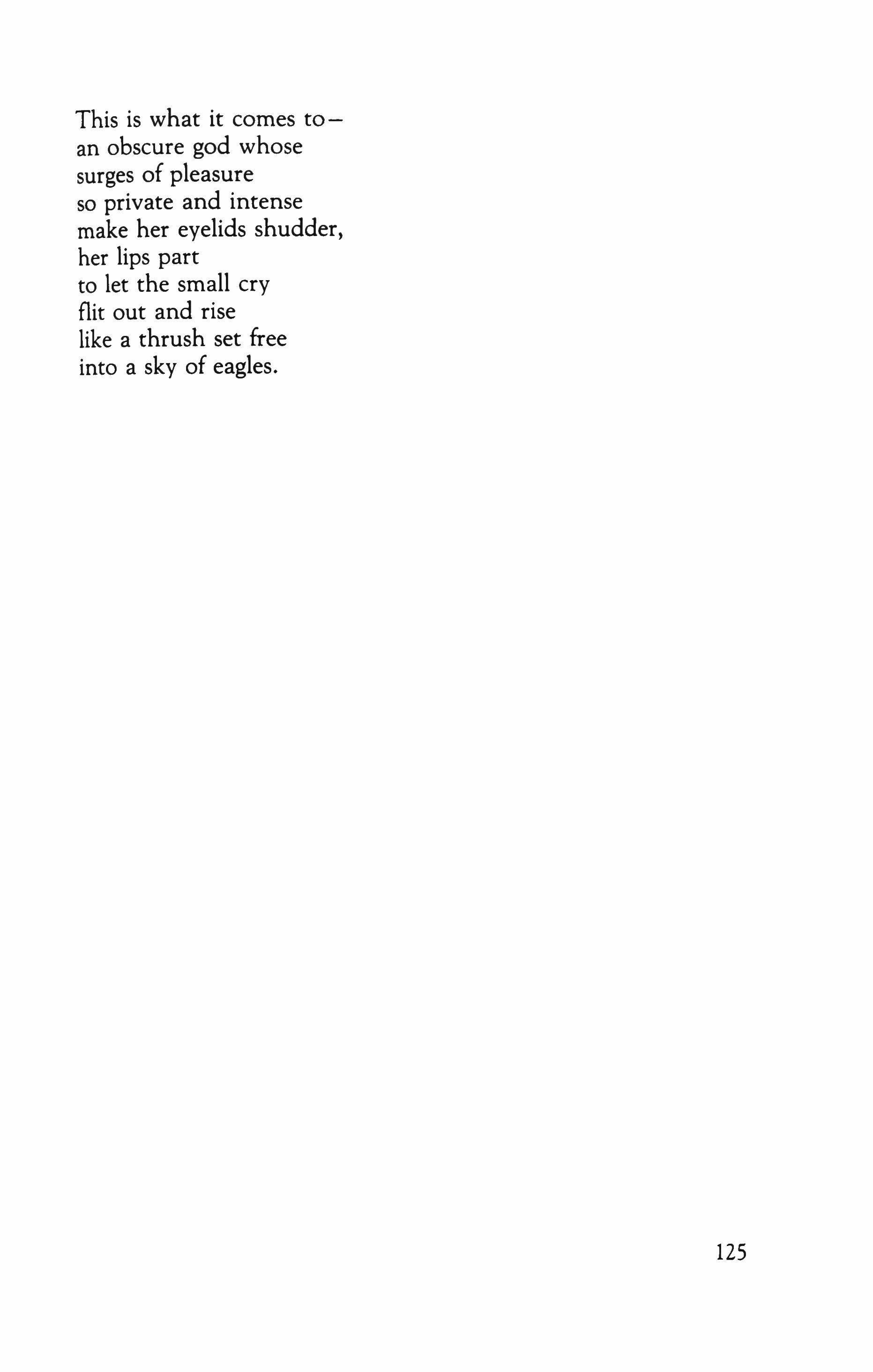
This is what it comes toan obscure god whose surges of pleasure so private and intense make her eyelids shudder, her lips part to let the small cry flit out and rise like a thrush set free into a sky of eagles.
125
Two Prose Poems
]oyce Carol
Oates
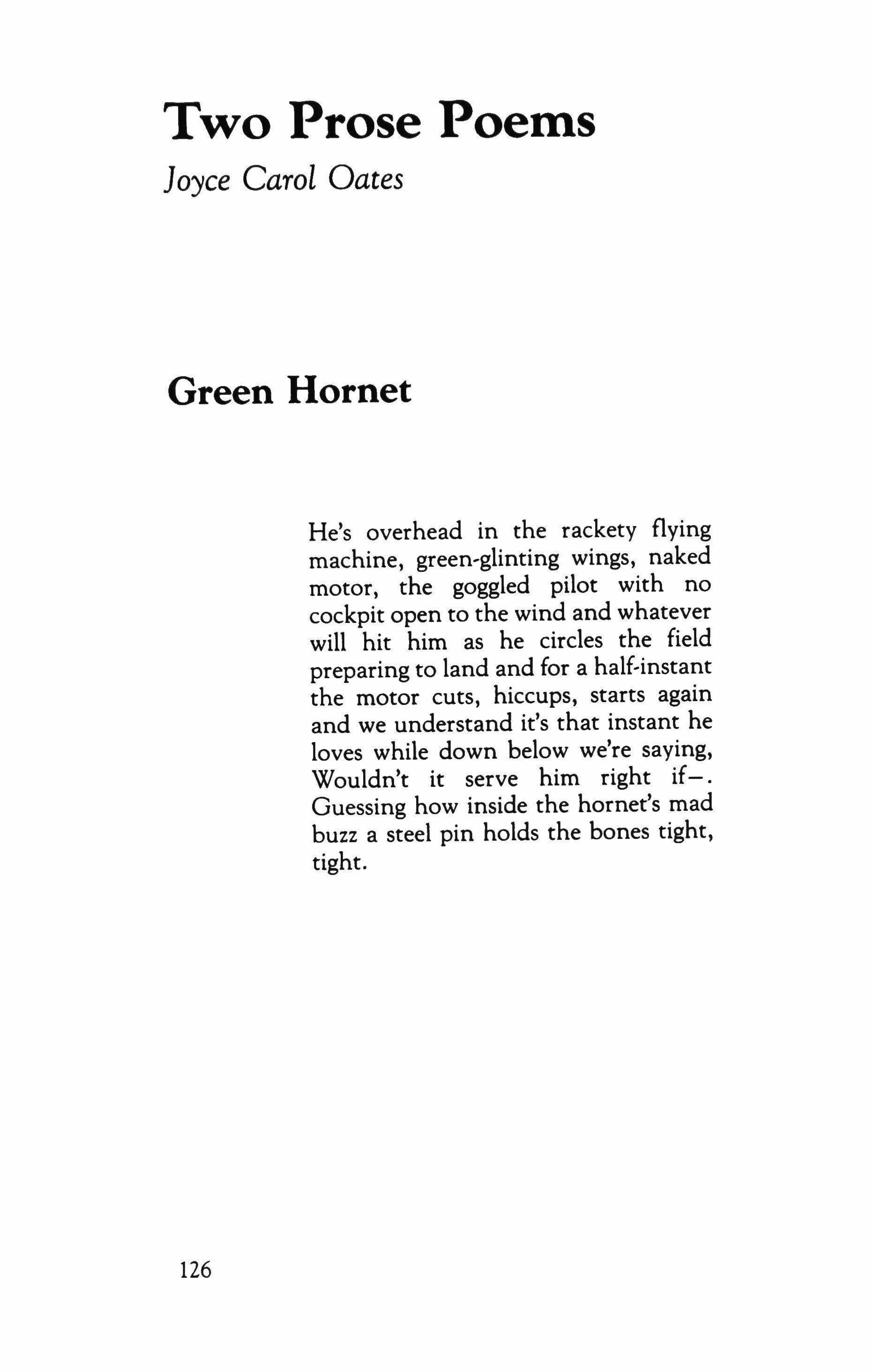
Green Hornet
He's overhead in the rackety flying machine, green-glinting wings, naked motor, the goggled pilot with no cockpit open to the wind and whatever will hit him as he circles the field preparing to land and for a half-Instant the motor cuts, hiccups, starts again and we understand it's that instant he loves while down below we're saying, Wouldn't it serve him right if-. Guessing how inside the hornet's mad buzz a steel pin holds the bones tight, tight.
126
Old Concord Cemetery
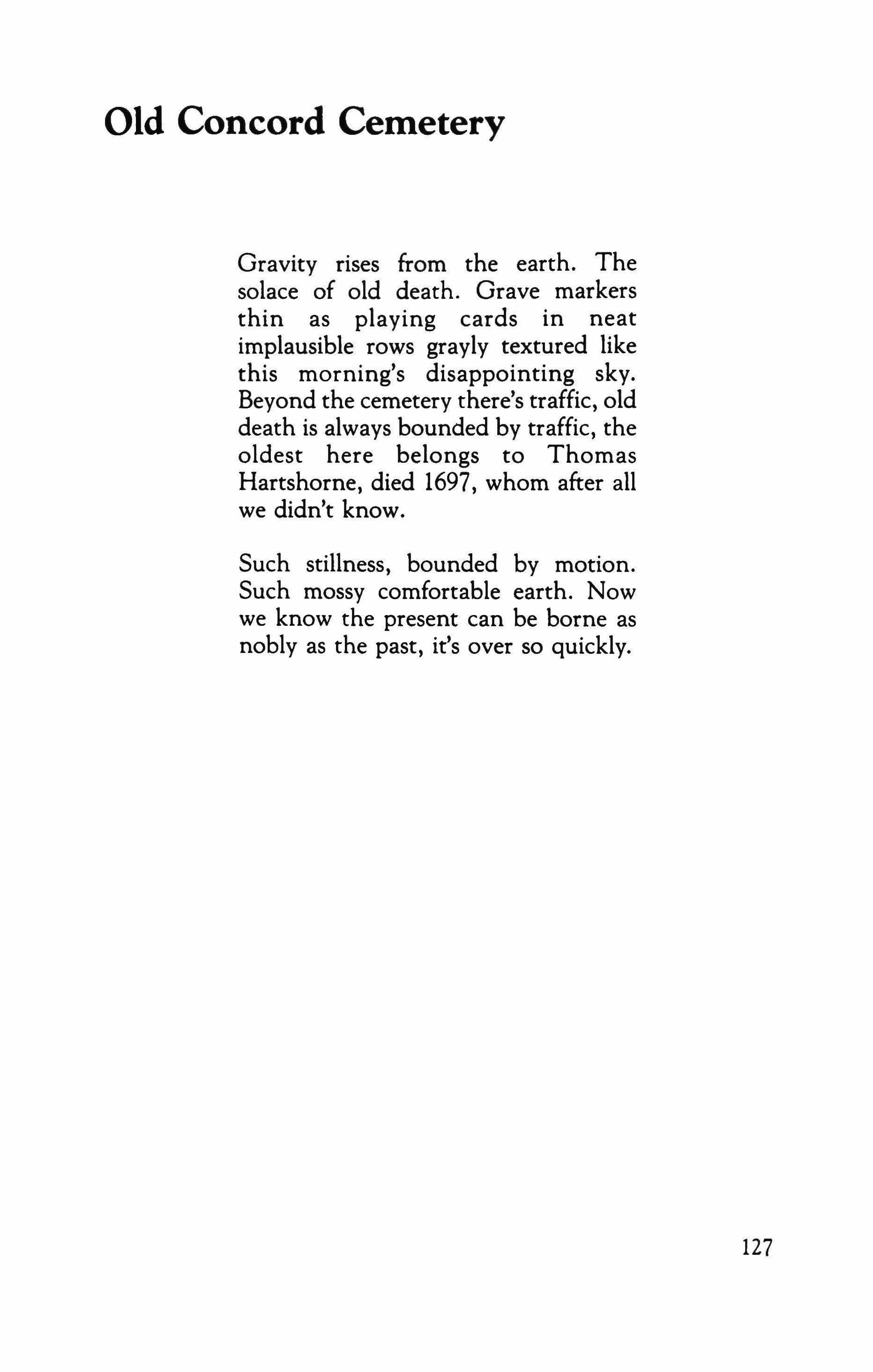
Gravity rises from the earth. The solace of old death. Grave markers thin as playing cards in neat implausible rows grayly textured like this morning's disappointing sky. Beyond the cemetery there's traffic, old death is always bounded by traffic, the oldest here belongs to Thomas Hartshorne, died 1697, whom after all we didn't know.
Such stillness, bounded by motion. Such mossy comfortable earth. Now we know the present can be borne as nobly as the past, it's over so quickly.
127
Six Poems
Ryszard Krynicki
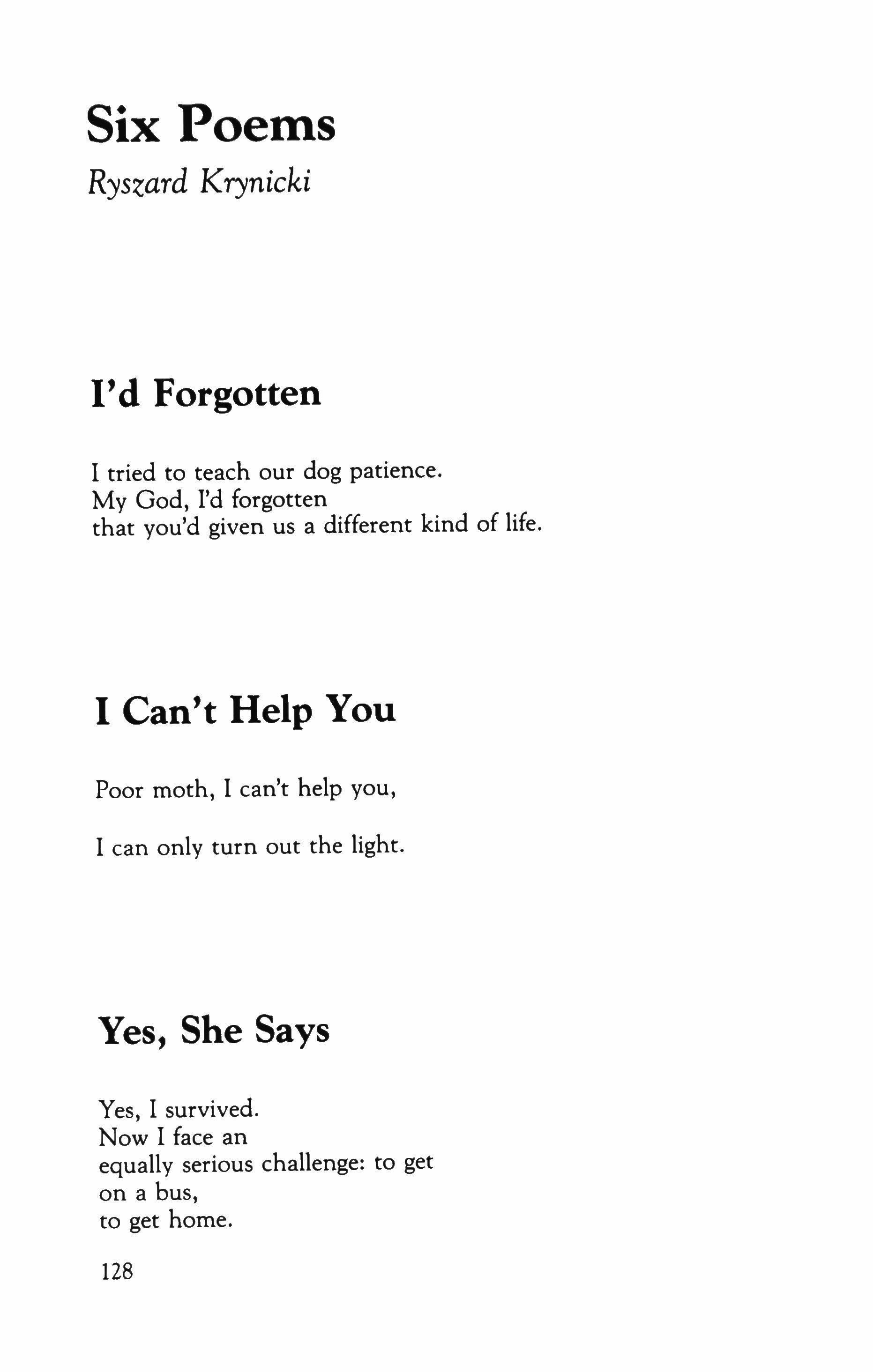
I'd Forgotten
I tried to teach our dog patience. My God, I'd forgotten that you'd given us a different kind of life.
I Can't Help You
Poor moth, I can't help you, I can only turn out the light.
Yes, She Says
Yes, I survived. Now I face an equally serious challenge: to get on a bus, to get home.
128
From a Window
The soldiers kill boredom; they have brown shoes and to the mute question "What did you do, when they ordered you to shoot defenseless people?" they have a mute answer: "1 was lucky, I was just guarding the TV transmitter."
Do Not Want to Die for Us
Do not want to die for us, do not want to live for us: live with us.

Sleep Well
Sleep well, the devil keeps watch: he eavesdrops and spies on our most secret fears and dreams, trying to learn something new from us, too.
Translated by Stanislaw Baranczak and Clare Cavanagh
129
Seeing What Isn't There
William Hunt
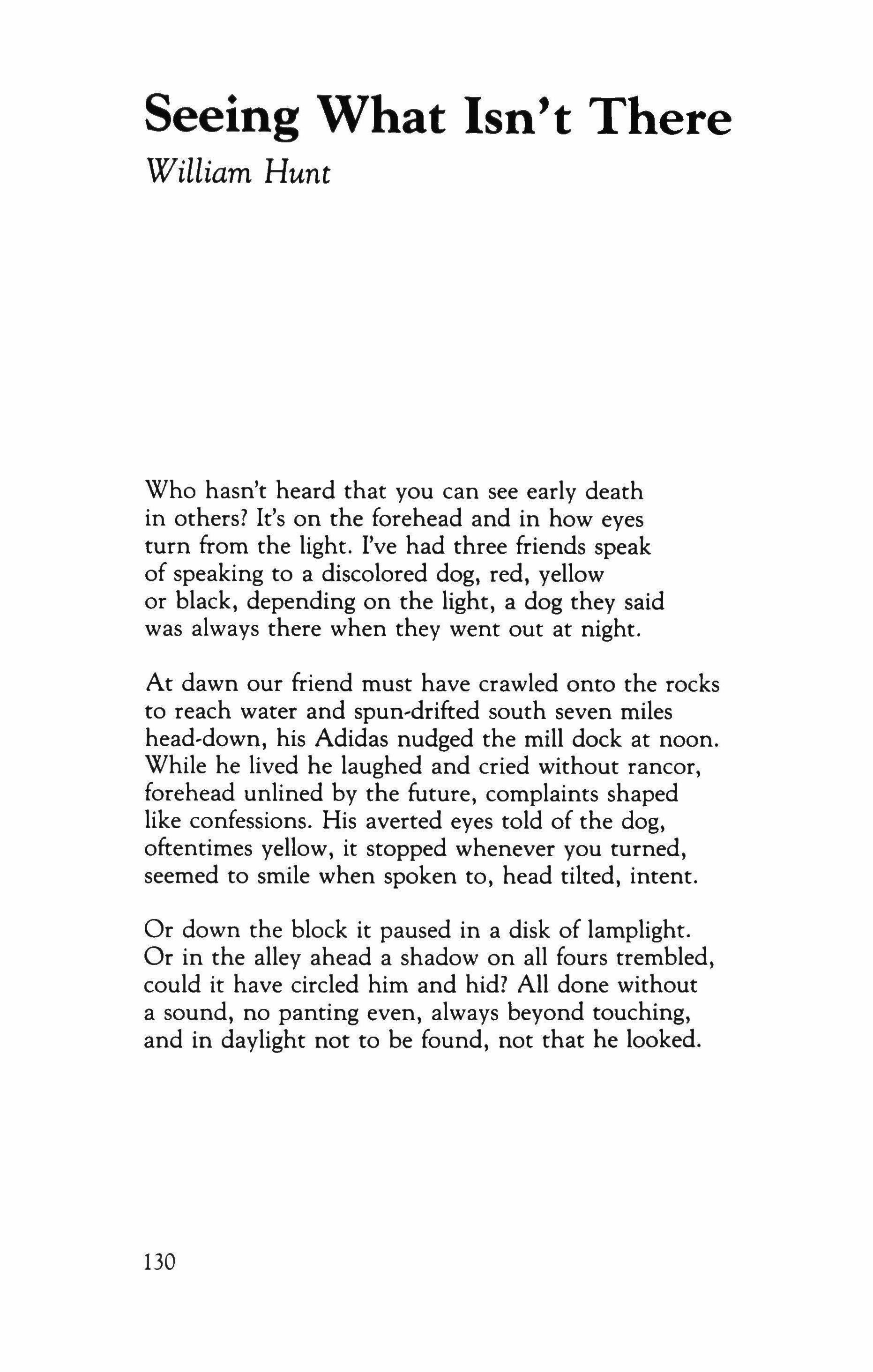
Who hasn't heard that you can see early death in others? It's on the forehead and in how eyes turn from the light. I've had three friends speak of speaking to a discolored dog, red, yellow or black, depending on the light, a dog they said was always there when they went out at night.
At dawn our friend must have crawled onto the rocks to reach water and spun-drifted south seven miles head-down, his Adidas nudged the mill dock at noon. While he lived he laughed and cried without rancor, forehead unlined by the future, complaints shaped like confessions. His averted eyes told of the dog, oftentimes yellow, it stopped whenever you turned, seemed to smile when spoken to, head tilted, intent.
Or down the block it paused in a disk of lamplight. Or in the alley ahead a shadow on all fours trembled, could it have circled him and hid? All done without a sound, no panting even, always beyond touching, and in daylight not to be found, not that he looked.
130
The Outsider
Teresa Cader
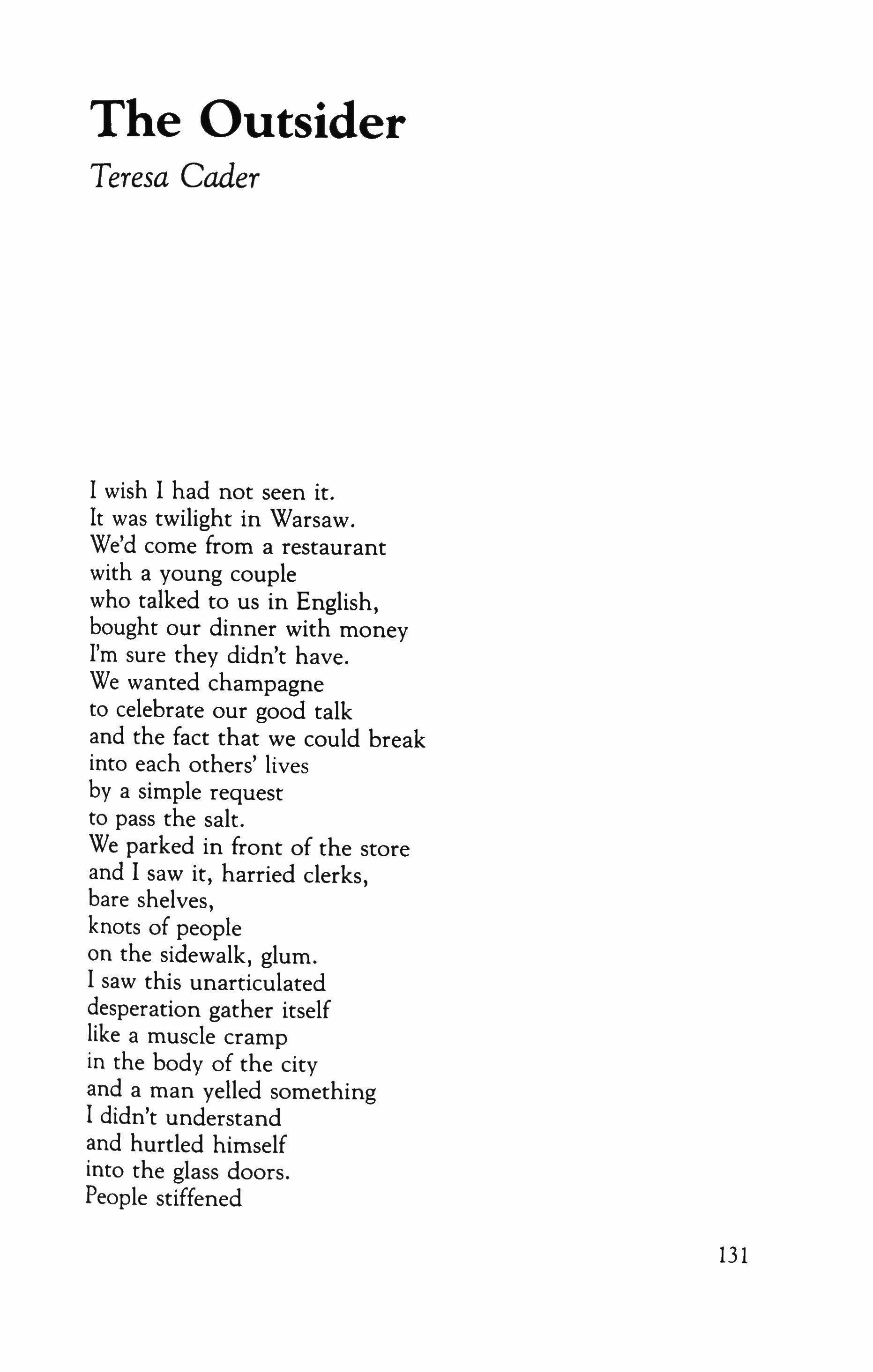
I wish I had not seen it. It was twilight in Warsaw. We'd come from a restaurant with a young couple who talked to us in English, bought our dinner with money I'm sure they didn't have. We wanted champagne to celebrate our good talk and the fact that we could break into each others' lives by a simple request to pass the salt. We parked in front of the store and I saw it, harried clerks, bare shelves, knots of people on the sidewalk, glum. I saw this unarticulated desperation gather itself like a muscle cramp in the body of the city and a man yelled something I didn't understand and hurtled himself into the glass doors. People stiffened
131
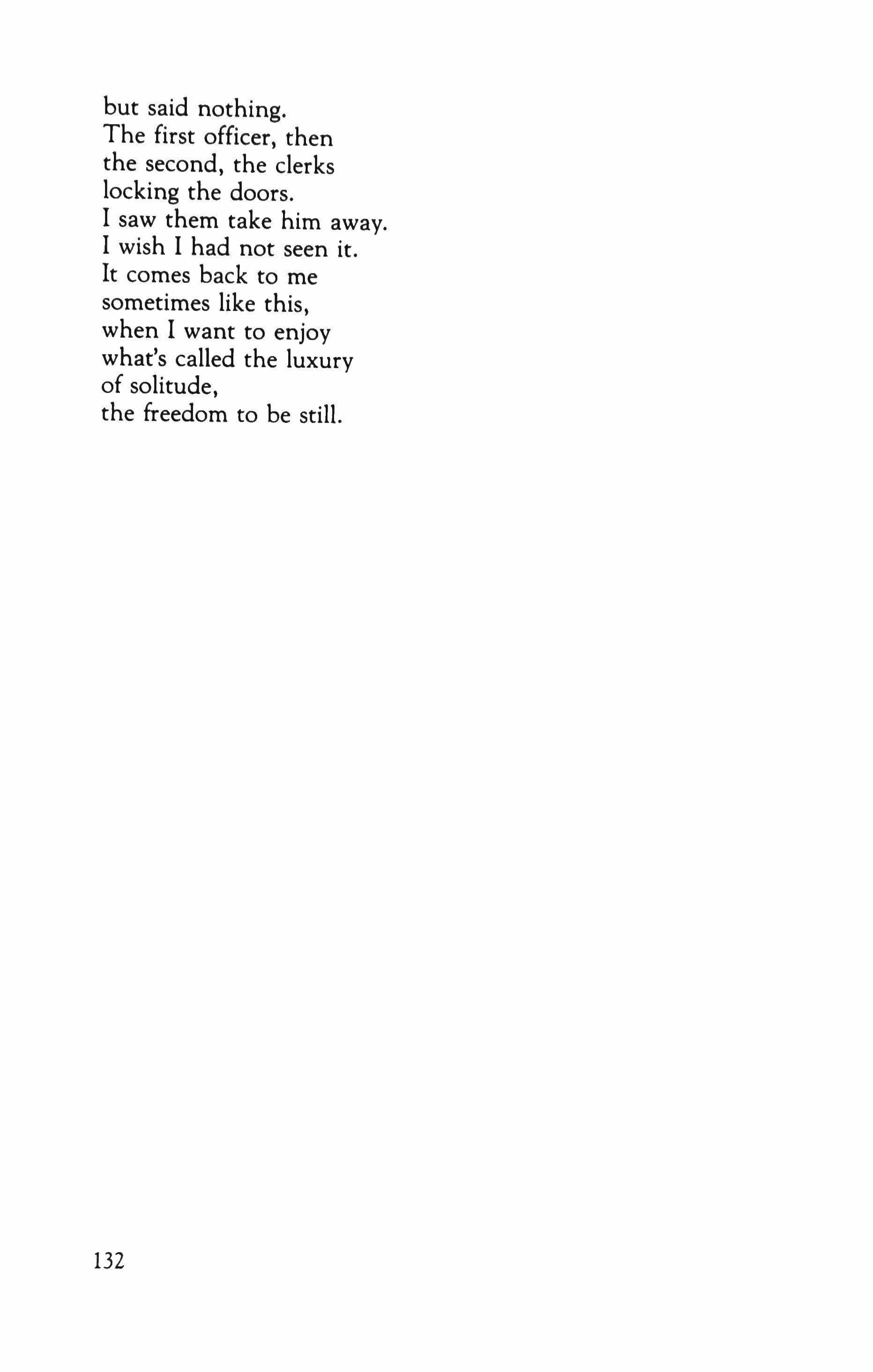
but said nothing. The first officer, then the second, the clerks locking the doors. I saw them take him away. I wish I had not seen it. It comes back to me sometimes like this, when I want to enjoy what's called the luxury of solitude, the freedom to be still.
132
The Condolence
Timothy Dekin

When he lay dying in the hospital
It was as if he couldn't bear my touch, But he was like that sometimes, afraid of love Especially when he needed it too much.
I thought I'd sit by him and read, or pray; Bring up old times that we could smile at now, Then later, if he wanted, hold his hand To make it easier for him to go,
Though he still struggled to get out of it, And stiffened the little that was left of him Against my comforting, as if he sensed A darker lullaby than I could hum,
And kept the sliding bed-table between us, More stubborn as the pain and fear increased. "Let go, let go," I whispered, desperate To draw the curtain and get on with grief.
When he grew weak enough I held him close. We kissed. Then he went mercifully fast. But that was how it always was with us, Me needing him, him giving in at last.
133
The Scale
Paul Breslin
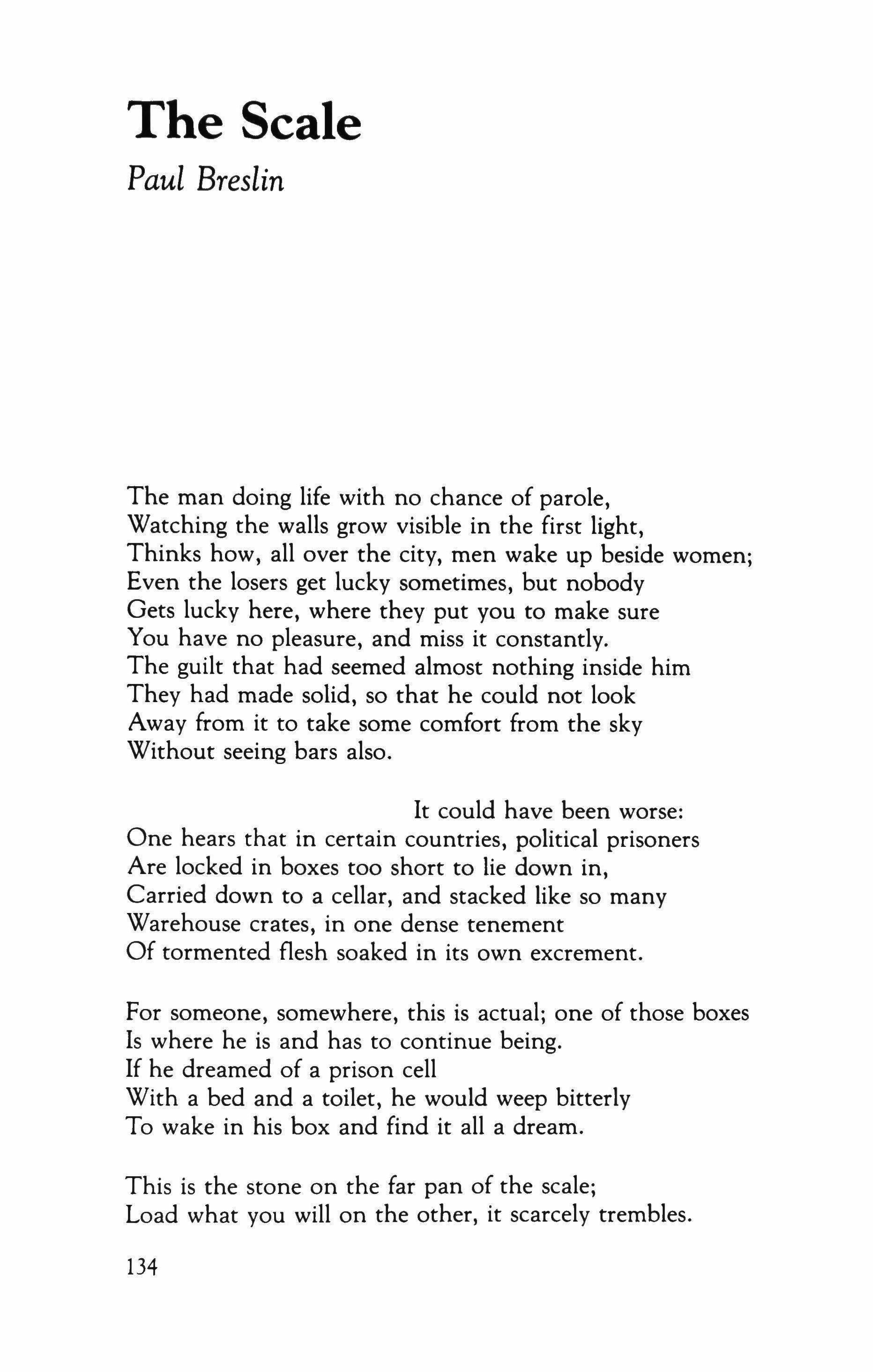
The man doing life with no chance of parole, Watching the walls grow visible in the first light, Thinks how, all over the city, men wake up beside women; Even the losers get lucky sometimes, but nobody Gets lucky here, where they put you to make sure You have no pleasure, and miss it constantly. The guilt that had seemed almost nothing inside him They had made solid, so that he could not look Away from it to take some comfort from the sky Without seeing bars also.
It could have been worse: One hears that in certain countries, political prisoners Are locked in boxes too short to lie down in, Carried down to a cellar, and stacked like so many Warehouse crates, in one dense tenement Of tormented flesh soaked in its own excrement.
For someone, somewhere, this is actual; one of those boxes Is where he is and has to continue being. If he dreamed of a prison cell With a bed and a toilet, he would weep bitterly To wake in his box and find it all a dream.
This is the stone on the far pan of the scale; Load what you will on the other, it scarcely trembles.
134
Like Two Dogs Barking
Mary Gray Hughes

Like two dogs in adjacent separate pens running up and down barking so loudly neither hears the other ever that's how she knows they are
trapped, caged, penned apart in sounds of self too frantic barking to stop once or listen much less attend for ceaseless yapping's what's essential to gain not only for a second the other's any other's notice proving to the frightened self the thing is so
there busy even eating rushing that to finish first in order to begin again full blast the loudest clamor cymbals of each other banging in the barking
terror for it might be true then in all the noise there's only other barking better and no self really even lonely no self
135
still when she was a small child and lived out in the country and they had many dogs two took against each other and ran up and down the wire fence between them snarling their rage and wrath and slavering dislike
bug-eyed and breathless hoarse-voiced with barking until one day they found that spot where somehow sometime no doubt totally by accident the fence had been dismantled
bug-eyed and stunned they stood four-footed and not barking until first one then the other slunk back behind its wire and took up again both together all the raging snarling deafening
that's like we are she thinks and thinks too how even when no longer young at all when grown almost
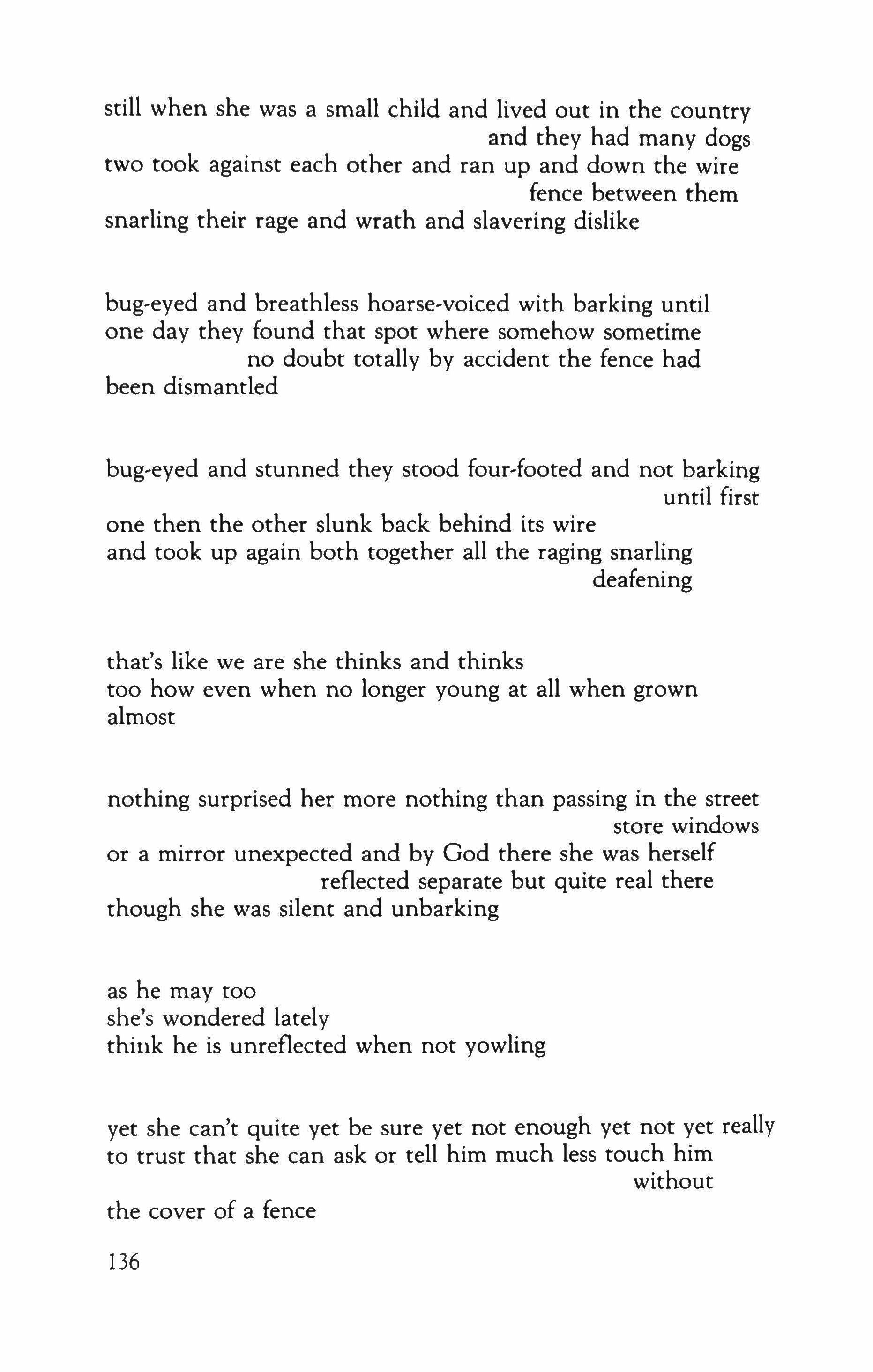
nothing surprised her more nothing than passing in the street store windows or a mirror unexpected and by God there she was herself reflected separate but quite real there though she was silent and unbarking
as he may too she's wondered lately think he is unreflected when not yowling yet she can't quite yet be sure yet not enough yet not yet really to trust that she can ask or tell him much less touch him without the cover of a fence
136
Gratitude: A Folk Tale
Morton Marcus
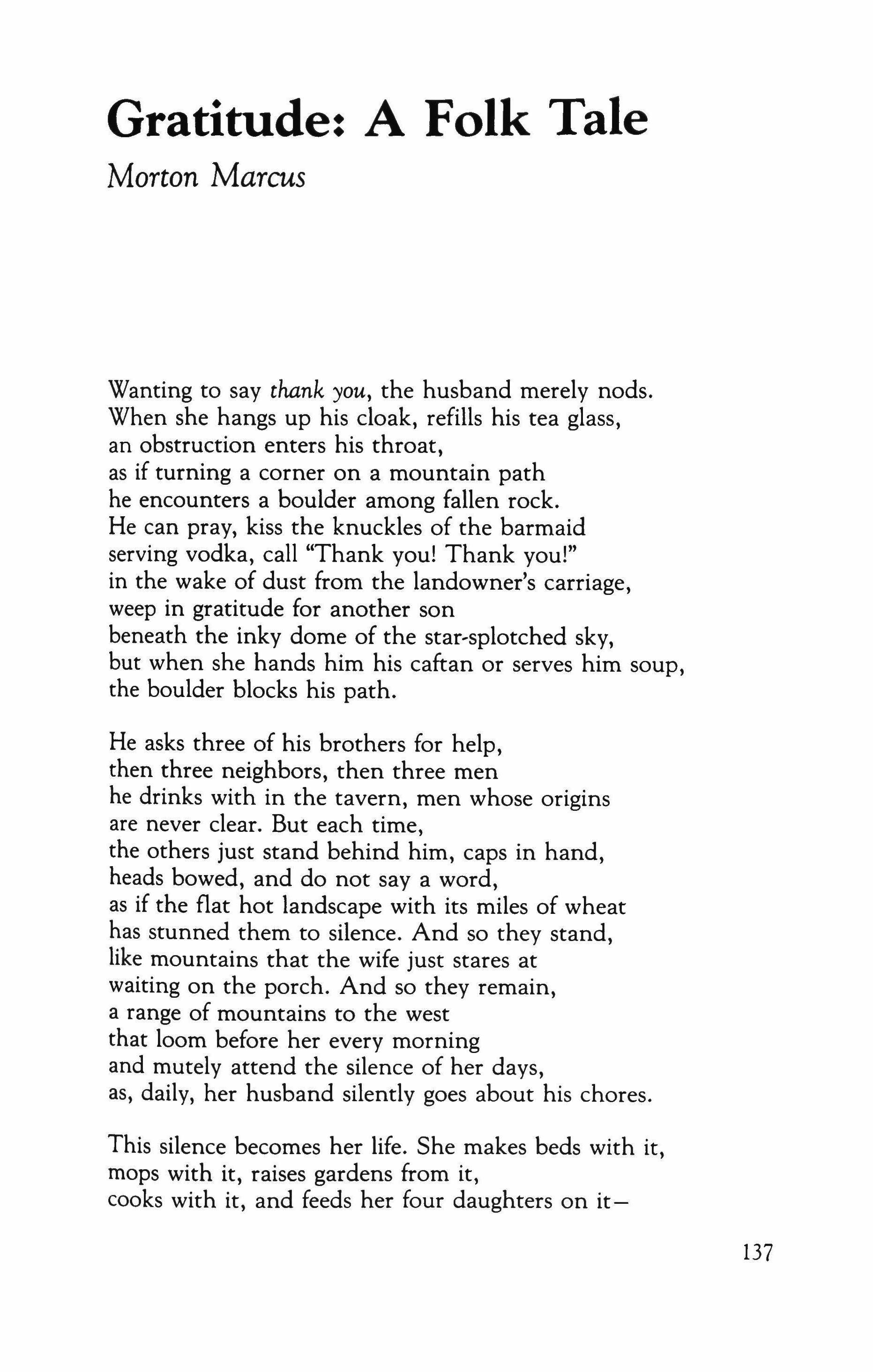
Wanting to say thank you, the husband merely nods. When she hangs up his cloak, refills his tea glass, an obstruction enters his throat, as if turning a corner on a mountain path he encounters a boulder among fallen rock. He can pray, kiss the knuckles of the barmaid serving vodka, call "Thank you! Thank you!" in the wake of dust from the landowner's carriage, weep in gratitude for another son beneath the inky dome of the star-splotched sky, but when she hands him his caftan or serves him soup, the boulder blocks his path.
He asks three of his brothers for help, then three neighbors, then three men he drinks with in the tavern, men whose origins are never clear. But each time, the others just stand behind him, caps in hand, heads bowed, and do not say a word, as if the flat hot landscape with its miles of wheat has stunned them to silence. And so they stand, like mountains that the wife just stares at waiting on the porch. And so they remain, a range of mountains to the west that loom before her every morning and mutely attend the silence of her days, as, daily, her husband silently goes about his chores.
This silence becomes her life. She makes beds with it, mops with it, raises gardens from it, cooks with it, and feeds her four daughters on it-
137
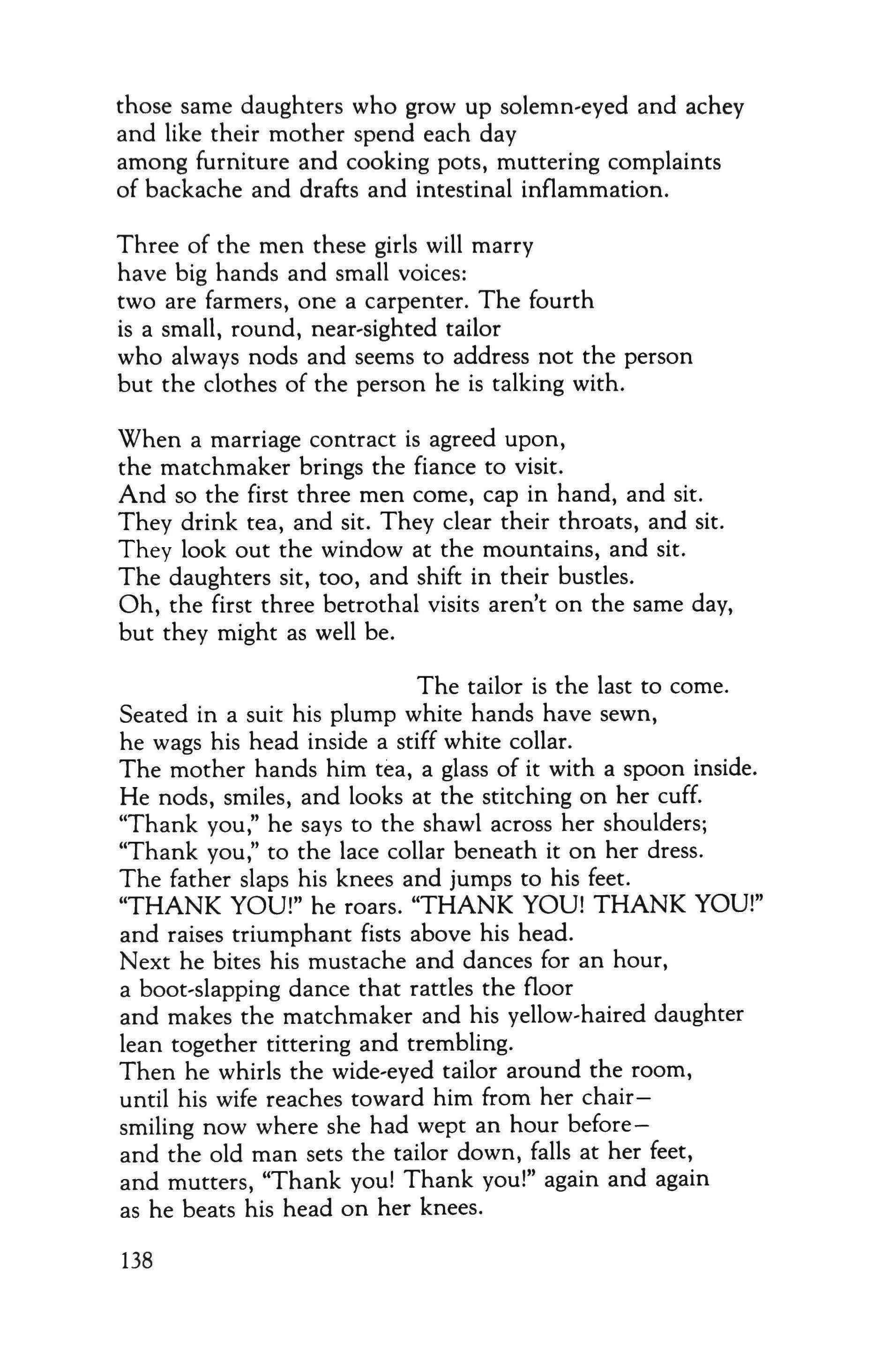
those same daughters who grow up solemn-eyed and achey and like their mother spend each day among furniture and cooking pots, muttering complaints of backache and drafts and intestinal inflammation.
Three of the men these girls will marry have big hands and small voices:
two are farmers, one a carpenter. The fourth is a small, round, near-sighted tailor who always nods and seems to address not the person but the clothes of the person he is talking with.
When a marriage contract is agreed upon, the matchmaker brings the fiance to visit.
And so the first three men come, cap in hand, and sit. They drink tea, and sit. They clear their throats, and sit. They look out the window at the mountains, and sit.
The daughters sit, too, and shift in their bustles.
Oh, the first three betrothal visits aren't on the same day, but they might as well be.
The tailor is the last to come.
Seated in a suit his plump white hands have sewn, he wags his head inside a stiff white collar.
The mother hands him tea, a glass of it with a spoon inside. He nods, smiles, and looks at the stitching on her cuff.
"Thank you," he says to the shawl across her shoulders; "Thank you," to the lace collar beneath it on her dress.
The father slaps his knees and jumps to his feet.
"THANK YOU!" he roars. "THANK YOU! THANK YOU!" and raises triumphant fists above his head.
Next he bites his mustache and dances for an hour, a boot-slapping dance that rattles the floor and makes the matchmaker and his yellow-haired daughter lean together tittering and trembling.
Then he whirls the wide-eyed tailor around the room, until his wife reaches toward him from her chairsmiling now where she had wept an hour beforeand the old man sets the tailor down, falls at her feet, and mutters, "Thank you! Thank you!" again and again as he beats his head on her knees.
138
From Departures
Paul Zweig
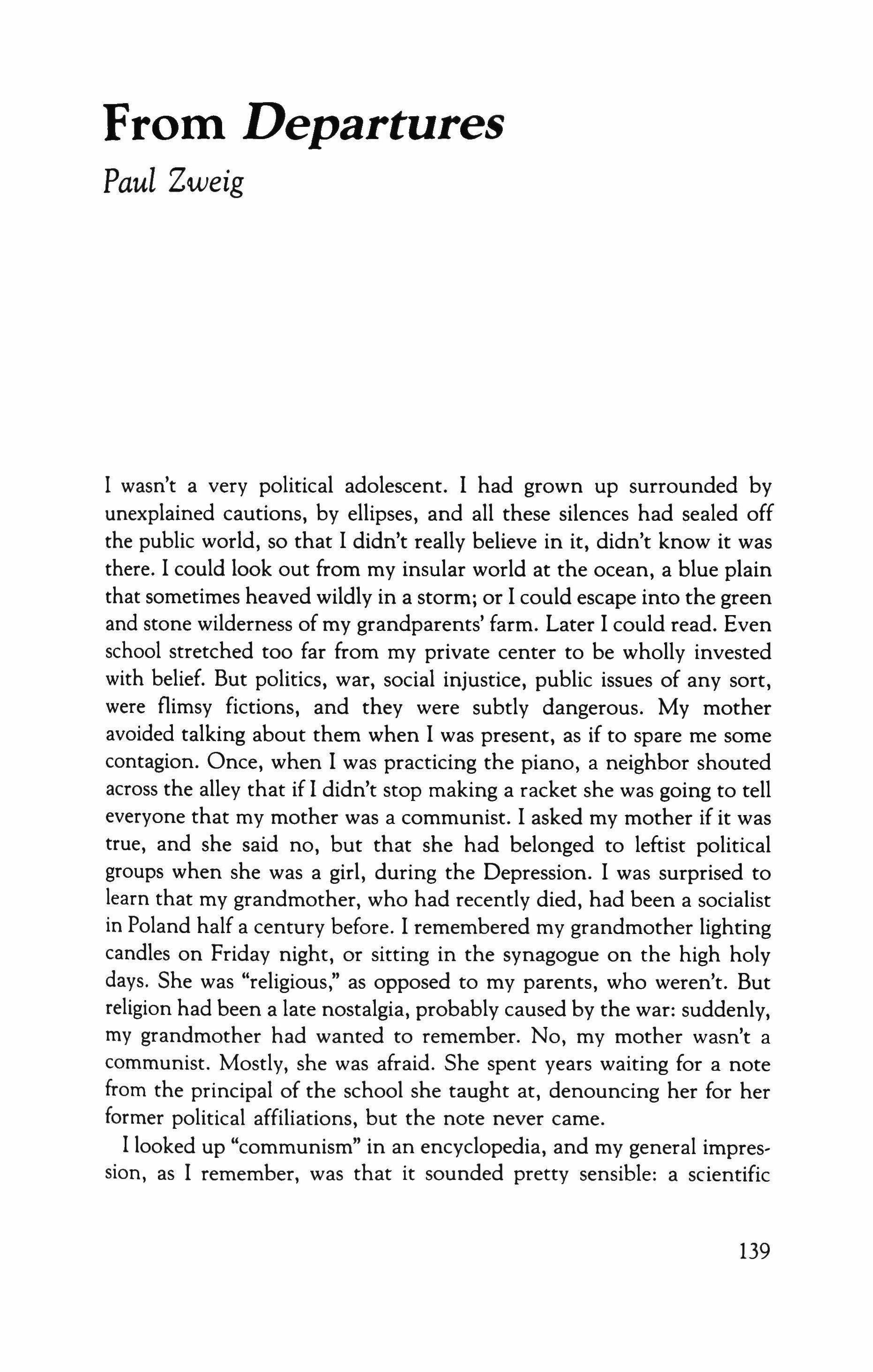
I wasn't a very political adolescent. I had grown up surrounded by unexplained cautions, by ellipses, and all these silences had sealed off the public world, so that I didn't really believe in it, didn't know it was there. I could look out from my insular world at the ocean, a blue plain that sometimes heaved wildly in a storm; or I could escape into the green and stone wilderness of my grandparents' farm. Later I could read. Even school stretched too far from my private center to be wholly invested with belief. But politics, war, social injustice, public issues of any sort, were flimsy fictions, and they were subtly dangerous. My mother avoided talking about them when I was present, as if to spare me some contagion. Once, when I was practicing the piano, a neighbor shouted across the alley that if I didn't stop making a racket she was going to tell everyone that my mother was a communist. I asked my mother if it was true, and she said no, but that she had belonged to leftist political groups when she was a girl, during the Depression. I was surprised to learn that my grandmother, who had recently died, had been a socialist in Poland half a century before. I remembered my grandmother lighting candles on Friday night, or sitting in the synagogue on the high holy days. She was "religious," as opposed to my parents, who weren't. But religion had been a late nostalgia, probably caused by the war: suddenly, my grandmother had wanted to remember. No, my mother wasn't a communist. Mostly, she was afraid. She spent years waiting for a note from the principal of the school she taught at, denouncing her for her former political affiliations, but the note never came.
I looked up "communism" in an encyclopedia, and my general impression, as I remember, was that it sounded pretty sensible: a scientific
139

society, the abolishing of all injustice. I filed it in my thought as a remote speculation, unconnected to real acts or passions.
My world was a small, sharply-lit territory, surrounded by mist, as in Chinese landscape paintings, where the details of ordinary living vanish into a misty space, above which, distant and jagged, rise the inaccessible peaks of mountains; there was nothing in the space between. And the space between for me too was empty. There was something dreamlike about all this; for when there is no public world, the inner world becomes overloaded, frozen. Having less, one has even less, and then still less.
During my college years, McCarthvisrn was afoot in the land, creating not only fear and angry patriotism, but claustrophobia. At Columbia, where I went to college, desks were set out in front of the buildings, where students talked quietly about the atom bomb and Students for Democratic Action. Later, there were petitions for the Rosenbergs. I didn't sign any of them, partly because I had absorbed my mother's furtive fears, but also because I didn't really believe any of this was happening. Who were Julius and Ethel Rosenberg? Did they exist? Yes, but in the mist. And my little overloaded life went on. The first anxious love affairs, fraternity life, the discovery of books and ideas, the thrill of not living at home, of being independent. Yet, under it all, I began to know that, in some deeper sense, without a public world there is also no private world; there is no world.
After my first year in Paris, I had gone back to New York to go to graduate school. The year-old Frenchman in me became silent, unused; and the result was a feeling of homelessness. I felt unhinged: a man and his double, and yet apparently only himself. As a graduate student, I started reading books about seventeenth-century English poetry, English history, the sociology of English literature. The university library fulfilled a curious fantasy: its narrow corridors lined with books, the cubicles at the far end, a pool of light on an oak desk. As a boy I had dreamed of such a place, far away from the confusions of friendship and family, where people passed only in the distance, too busy to notice me. Was I thinking of my father sitting a few blocks away at his pigeonholes in the backroom of the General Post Office, downtown? I saw his life not as sad, but as curiously joyous; what he bottled up in that hard, kindly face of his was a stubborn pleasure, a refuge that he kept intact, even from me.
But the library wasn't refuge enough, nor were the rooms I lived in on
140
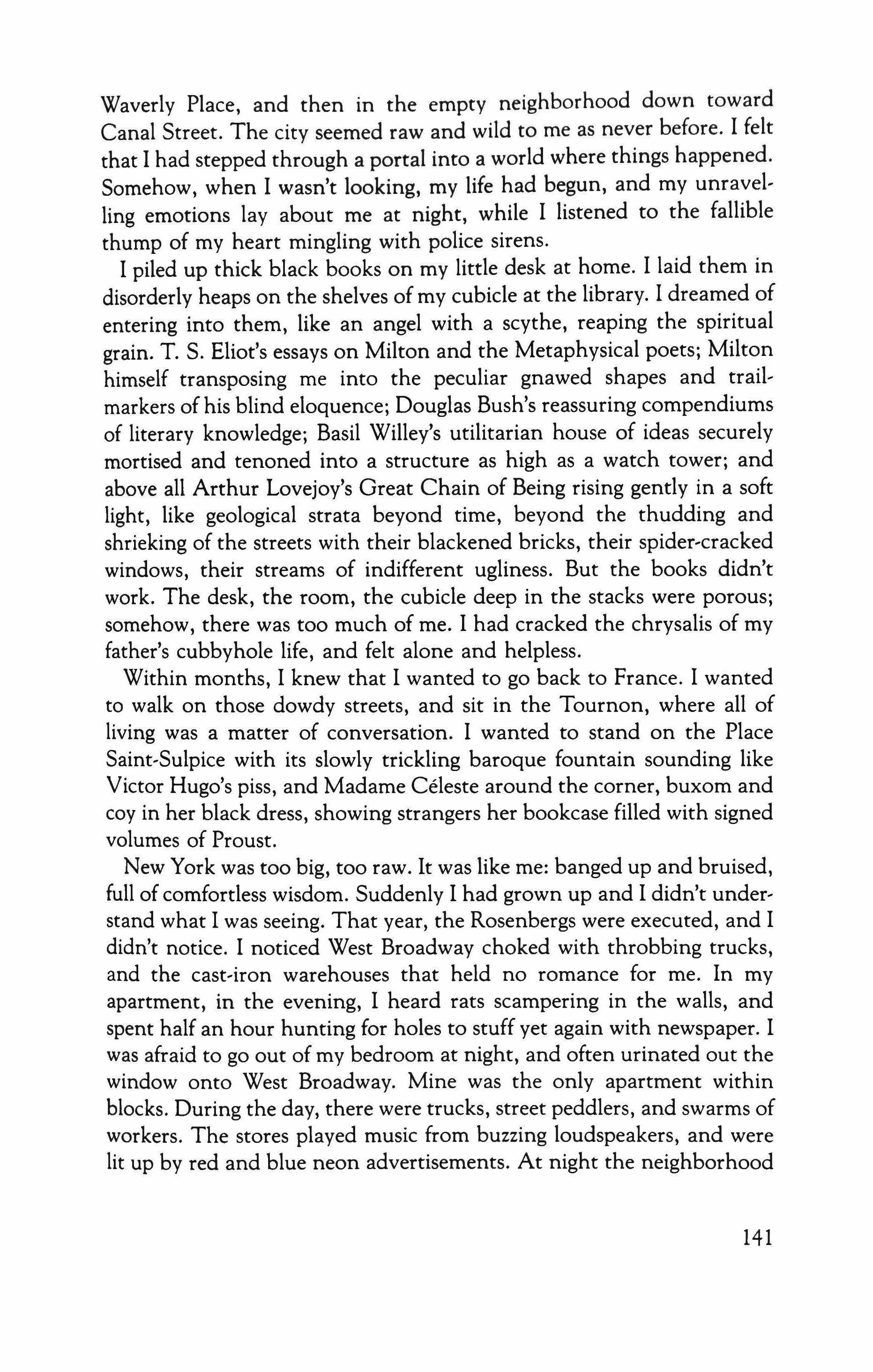
Waverly Place, and then in the empty neighborhood down toward Canal Street. The city seemed raw and wild to me as never before. I felt that I had stepped through a portal into a world where things happened. Somehow, when I wasn't looking, my life had begun, and my unravelling emotions lay about me at night, while I listened to the fallible thump of my heart mingling with police sirens.
I piled up thick black books on my little desk at home. I laid them in disorderly heaps on the shelves of my cubicle at the library. I dreamed of entering into them, like an angel with a scythe, reaping the spiritual grain. T. S. Eliot's essays on Milton and the Metaphysical poets; Milton himself transposing me into the peculiar gnawed shapes and trailmarkers of his blind eloquence; Douglas Bush's reassuring compendiums of literary knowledge; Basil Willey's utilitarian house of ideas securely mortised and tenoned into a structure as high as a watch tower; and above all Arthur Lovejoy's Great Chain of Being rising gently in a soft light, like geological strata beyond time, beyond the thudding and shrieking of the streets with their blackened bricks, their spider-cracked windows, their streams of indifferent ugliness. But the books didn't work. The desk, the room, the cubicle deep in the stacks were porous; somehow, there was too much of me. I had cracked the chrysalis of my father's cubbyhole life, and felt alone and helpless.
Within months, I knew that I wanted to go back to France. I wanted to walk on those dowdy streets, and sit in the Tournon, where all of living was a matter of conversation. I wanted to stand on the Place Saint-Sulpice with its slowly trickling baroque fountain sounding like Victor Hugo's piss, and Madame Celeste around the corner, buxom and coy in her black dress, showing strangers her bookcase filled with signed volumes of Proust.
New York was too big, too raw. It was like me: banged up and bruised, full of comfortless wisdom. Suddenly I had grown up and I didn't understand what I was seeing. That year, the Rosenbergs were executed, and I didn't notice. I noticed West Broadway choked with throbbing trucks, and the cast-iron warehouses that held no romance for me. In my apartment, in the evening, I heard rats scampering in the walls, and spent half an hour hunting for holes to stuff yet again with newspaper. I was afraid to go out of my bedroom at night, and often urinated out the window onto West Broadway. Mine was the only apartment within blocks. During the day, there were trucks, street peddlers, and swarms of workers. The stores played music from buzzing loudspeakers, and were lit up by red and blue neon advertisements. At night the neighborhood
141
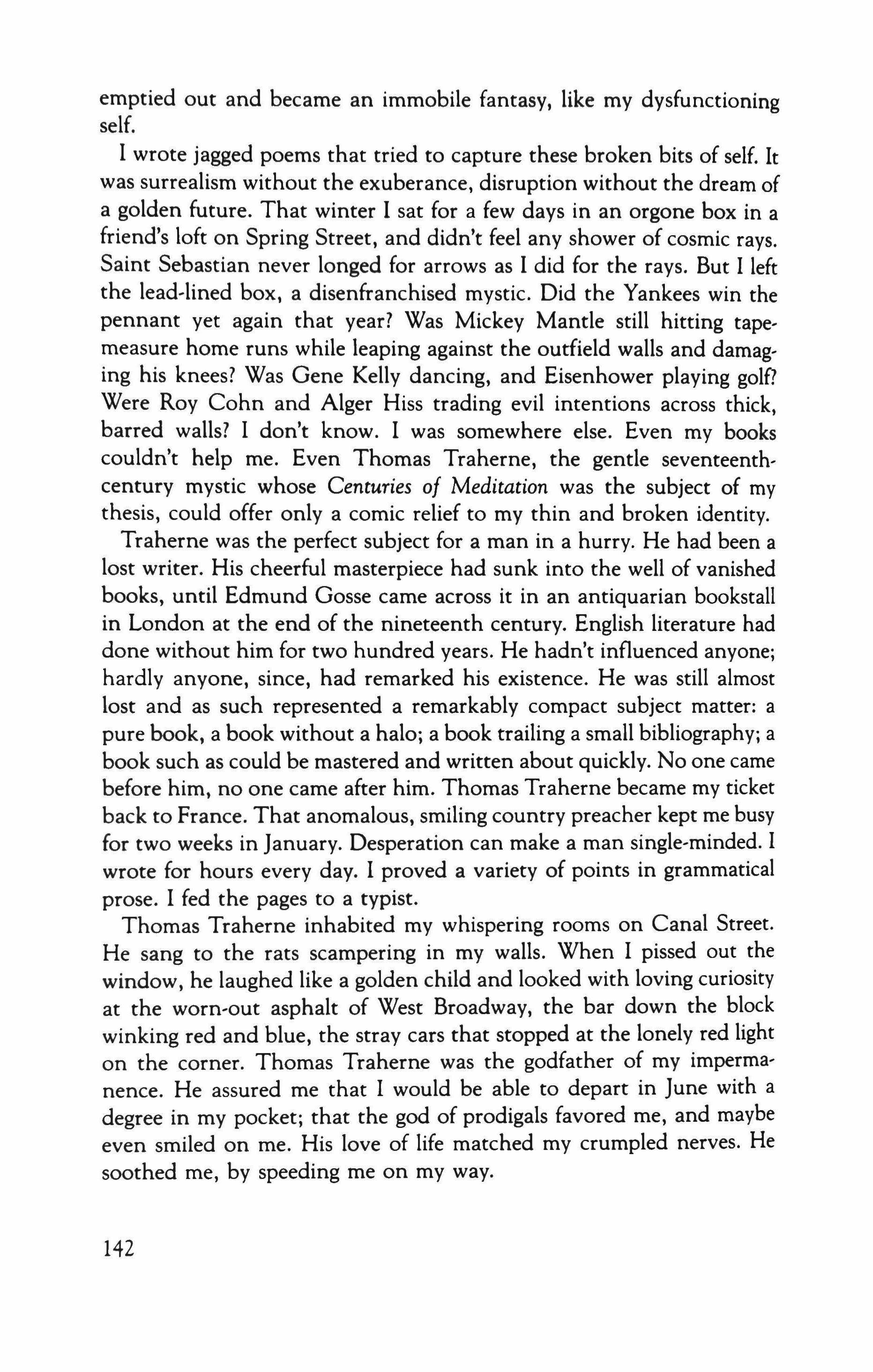
emptied out and became an immobile fantasy, like my dysfunctioning self.
I wrote jagged poems that tried to capture these broken bits of self. It was surrealism without the exuberance, disruption without the dream of a golden future. That winter I sat for a few days in an orgone box in a friend's loft on Spring Street, and didn't feel any shower of cosmic rays. Saint Sebastian never longed for arrows as I did for the rays. But I left the lead-lined box, a disenfranchised mystic. Did the Yankees win the pennant yet again that year? Was Mickey Mantle still hitting tapemeasure home runs while leaping against the outfield walls and damaging his knees? Was Gene Kelly dancing, and Eisenhower playing golf? Were Roy Cohn and Alger Hiss trading evil intentions across thick, barred walls? I don't know. I was somewhere else. Even my books couldn't help me. Even Thomas Traherne, the gentle seventeenthcentury mystic whose Centuries of Meditation was the subject of my thesis, could offer only a comic relief to my thin and broken identity. Traherne was the perfect subject for a man in a hurry. He had been a lost writer. His cheerful masterpiece had sunk into the well of vanished books, until Edmund Gosse came across it in an antiquarian bookstall in London at the end of the nineteenth century. English literature had done without him for two hundred years. He hadn't influenced anyone; hardly anyone, since, had remarked his existence. He was still almost lost and as such represented a remarkably compact subject matter: a pure book, a book without a halo; a book trailing a small bibliography; a book such as could be mastered and written about quickly. No one carne before him, no one came after him. Thomas Traherne became my ticket back to France. That anomalous, smiling country preacher kept me busy for two weeks in January. Desperation can make a man single-minded. I wrote for hours every day. I proved a variety of points in grammatical prose. I fed the pages to a typist.
Thomas Traherne inhabited my whispering rooms on Canal Street. He sang to the rats scampering in my walls. When I pissed out the window, he laughed like a golden child and looked with loving curiosity at the worn-out asphalt of West Broadway, the bar down the block winking red and blue, the stray cars that stopped at the lonely red light on the corner. Thomas Traherne was the godfather of my impermanence. He assured me that I would be able to depart in June with a degree in my pocket; that the god of prodigals favored me, and maybe even smiled on me. His love of life matched my crumpled nerves. He soothed me, by speeding me on my way.
142

I left for Paris on a slow Italian boat, as if by this extravagant act I could remake myself as a marginal man, an artist. But there were the surprises. I was not completely prepared for living in a foreign country. Paris disoriented me. It was so gray, so used. The walls of the buildings were streaked and dark; grime created permanent shadows. I was still too young to have a past; I had shed my childhood and my adolescence, like a snake slithering out of its skin. My past was a litter of crusts, pale moundings of time.
Paris jolted me with its deeply lived-in, repeatedly patched and preserved past. The soft patina of the early-nineteenth-century buildings, with small, deeply-set windows; the sculpted faces and moldings arrayed over carriage gates or under the arches of the Pont Neuf, crossing the Seine; the blackened portals of Notre Dame, packed with saints and angels, gargoyles, contorted stubs of bodies - it was too much. An overlaying, a crowding of impressions. Every inch of the city bore rubbings of former uses, unlike the spacious, destructible Brooklyn I had been brought up in, made of pragmatic tenements and expedient storefronts, no more than a thin pressing of time subject to wrecking balls and mechanical scoops.
During my first year in Paris, I lived in a small residence hotel on the Rue de Tournon, near the Luxembourg Gardens. I had a long, narrow room, with pink wallpaper and a porte-/enetre that took up all of the exterior wall. There was a stained sink, an armoire with a mirror on it, a skinny bed, a desk and chair; and, facing me out the window, a skyline made of chimney pots and steeples, attics, gray slanting rooftops silhouetted against the sky like a line of script.
I lived in a formidable isolation. For weeks I walked all over the city, whispering my couple of French words in grocery stores and restaurants. As the weeks passed, I forgot what it was like to speak in complete sentences. This was a new kind of solitude. I began to have a fantasy that if I looked into a mirror, I wouldn't see anyone there.
During these weeks, my only human contact was with a group of young Arabs who hung out in a cafe on the Boulevard Saint-Michel. They were immigrants from Morocco or Algeria; most of them were unemployed, their families left behind while they looked for work. One day, I sat down in their cafe. Somehow they seemed more accessible than the fast-talking French. I mumbled "Parlez-vous anglais?" to one of them, and he answered with a friendly twitter and a handshake. He and his friends sounded out slow French syllables for my benefit. They
* * *
143
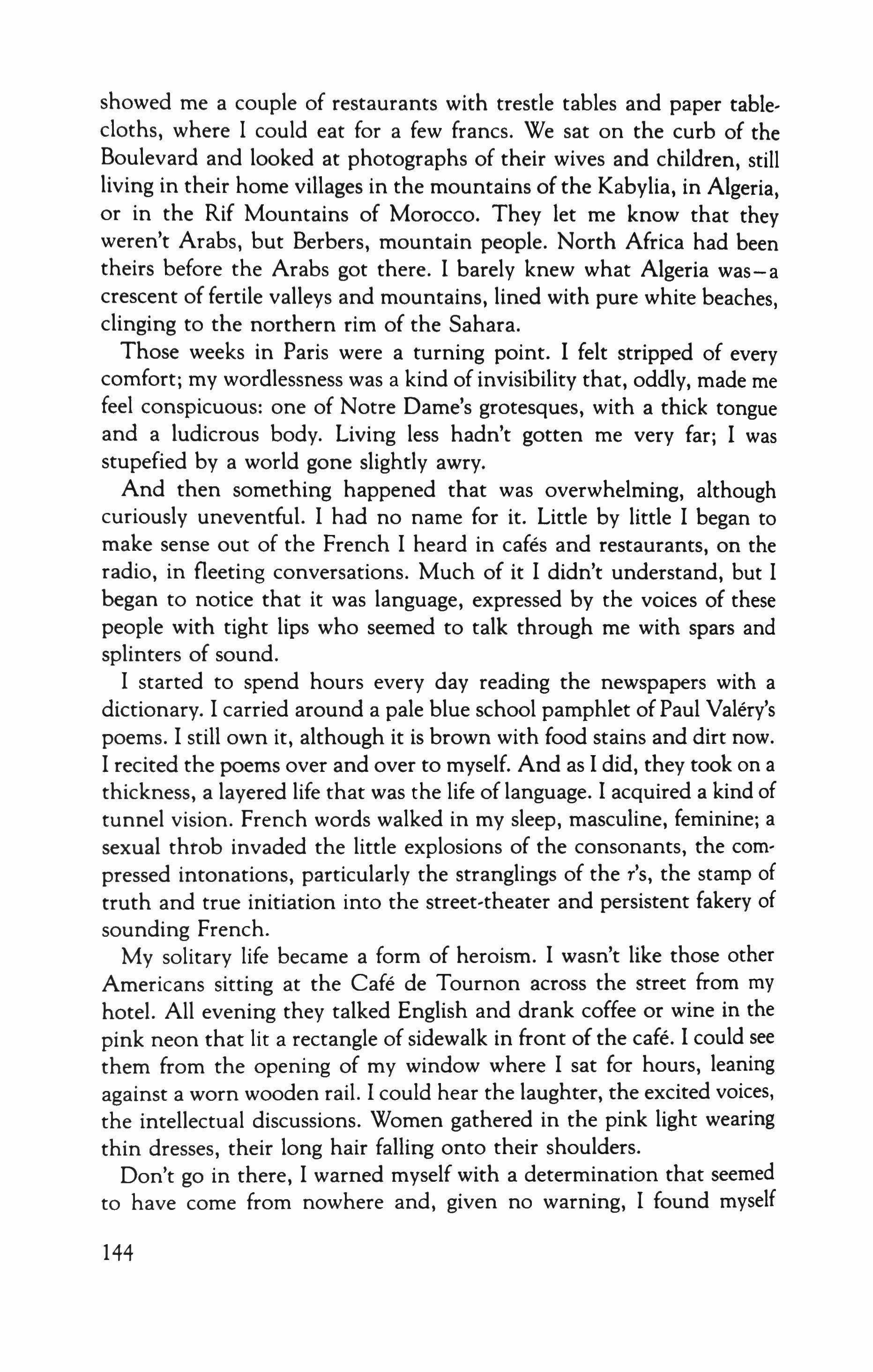
showed me a couple of restaurants with trestle tables and paper tablecloths, where I could eat for a few francs. We sat on the curb of the Boulevard and looked at photographs of their wives and children, still living in their home villages in the mountains of the Kabvlia, in Algeria, or in the Rif Mountains of Morocco. They let me know that they weren't Arabs, but Berbers, mountain people. North Africa had been theirs before the Arabs got there. I barely knew what Algeria was-a crescent of fertile valleys and mountains, lined with pure white beaches, clinging to the northern rim of the Sahara.
Those weeks in Paris were a turning point. I felt stripped of every comfort; my wordlessness was a kind of invisibility that, oddly, made me feel conspicuous: one of Notre Dame's grotesques, with a thick tongue and a ludicrous body. Living less hadn't gotten me very far; I was stupefied by a world gone slightly awry.
And then something happened that was overwhelming, although curiously uneventful. I had no name for it. Little by little I began to make sense out of the French I heard in cafes and restaurants, on the radio, in fleeting conversations. Much of it I didn't understand, but I began to notice that it was language, expressed by the voices of these people with tight lips who seemed to talk through me with spars and splinters of sound.
I started to spend hours every day reading the newspapers with a dictionary. I carried around a pale blue school pamphlet of Paul Valery's poems. I still own it, although it is brown with food stains and dirt now. I recited the poems over and over to myself. And as I did, they took on a thickness, a layered life that was the life of language. I acquired a kind of tunnel vision. French words walked in my sleep, masculine, feminine; a sexual throb invaded the little explosions of the consonants, the compressed intonations, particularly the stranglings of the r's, the stamp of truth and true initiation into the street-theater and persistent fakery of sounding French.
My solitary life became a form of heroism. I wasn't like those other Americans sitting at the Cafe de Tournon across the street from my hotel. All evening they talked English and drank coffee or wine in the pink neon that lit a rectangle of sidewalk in front of the cafe. I could see them from the opening of my window where I sat for hours, leaning against a worn wooden rail. I could hear the laughter, the excited voices, the intellectual discussions. Women gathered in the pink light wearing thin dresses, their long hair falling onto their shoulders.
Don't go in there, I warned myself with a determination that seemed to have come from nowhere and, given no warning, I found myself
144

wanting desperately to be a foreigner, an alien; I wanted to be walled in by my lucidity. For the first time in my life, I wanted something with all my heart, and what was it? To step across a brink, vanish into a peculiar unsympathetic realm, where I would be a secret visitor, a perfect construction of the will, almost a windup doll, making only the right movements, saying only foreign things to foreign people. America, New York, even my own language, had become like dead skins to me. After a month or so, I started trying to read French novels: Voltaire's Candide, then some Balzac, some Flaubert. For a long time there was no enjoy' ment in it, except maybe the enjoyment of wading in thick space lit by occasional glows of sense. I read with my lips, trying to unravel the clipped sounds; discover where the lengths of sentence hinged on verbs or came to earth solidly on immovable nouns. Often I had to look up almost every word.
Even as I worked, I was aware that I had never thrown myself into something so completely this way before. I longed to expand into whole sentences again. I discovered-it was a trick of physiology-that my accent was perfect. I made those strangled r's as if I had been born to it. The stars which had given me birth on July 14, Bastille Day, twenty-one years before, had decided I would become master of the ultimate dis, guise. I would become a creature in one of those parallel worlds science fiction writers love to invent. In one world, I was a poet born in Brooklyn, shy, conservative, but given to irruptions of strange behavior; in another, I was the same man, but French.
The isolation was probably driving me a little crazy. I had become a watcher. I watched little boys in blue uniforms sail their model boats on the pond in the Luxembourg Gardens, and the low tumbling clouds that poured over the tree line across the park. I watched the tired faces of the intellectuals at the Old Navy Cafe on the Boulevard SaintGermain, around the corner from my hotel. Their weariness seemed to be the expression of terrible knowledge. This was the somber petering out of the existentialist movement. A gloom was concentrated behind the cream-colored wooden front of the cafe, that could not be dispelled by coffee and strong cigarettes, or by the women with adolescent breasts who circulated among the tables.
I watched girls in pert, threadbare coats kissing their friends on two cheeks, or squeezed into a doorway with a lover. I watched the crowds coming up out of the Metro, and the charbonniers, their faces gleaming with black dust, delivering sacks of coal from the two-wheeled carts they pushed down the middle of narrow streets. I walked in streets that were dingy and full of smells: the Rue Git-le-Coeur, the Rue Xavier-Privas,
145
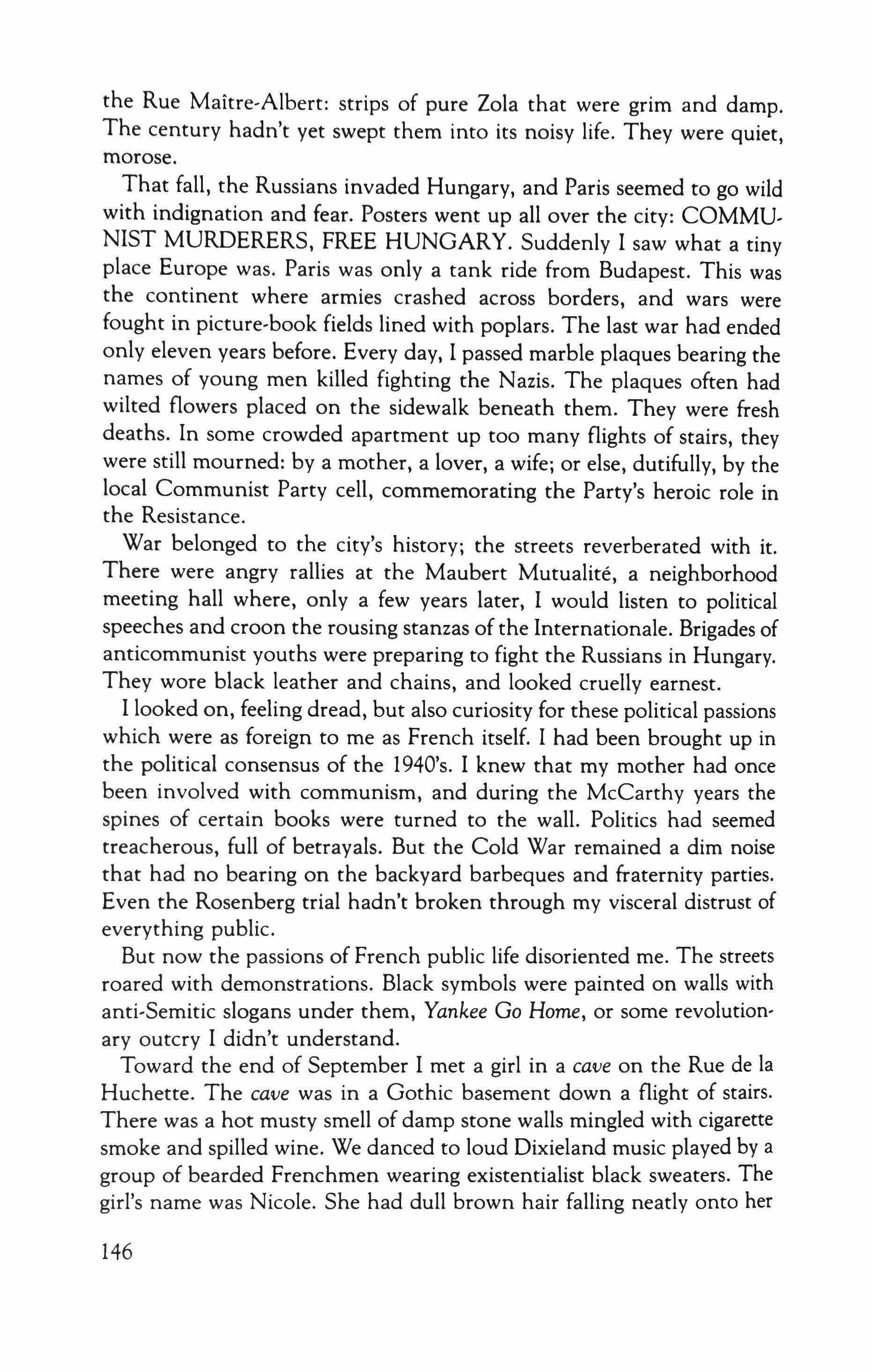
the Rue Maitre-Albert: strips of pure Zola that were grim and damp. The century hadn't yet swept them into its noisy life. They were quiet, morose.
That fall, the Russians invaded Hungary, and Paris seemed to go wild with indignation and fear. Posters went up all over the city: COMMUNIST MURDERERS, FREE HUNGARY. Suddenly I saw what a tiny place Europe was. Paris was only a tank ride from Budapest. This was the continent where armies crashed across borders, and wars were fought in picture-book fields lined with poplars. The last war had ended only eleven years before. Every day, I passed marble plaques bearing the names of young men killed fighting the Nazis. The plaques often had wilted flowers placed on the sidewalk beneath them. They were fresh deaths. In some crowded apartment up too many flights of stairs, they were still mourned: by a mother, a lover, a wife; or else, dutifully, by the local Communist Party cell, commemorating the Party's heroic role in the Resistance.
War belonged to the city's history; the streets reverberated with it. There were angry rallies at the Maubert Mutualite, a neighborhood meeting hall where, only a few years later, I would listen to political speeches and croon the rousing stanzas of the lnternationale. Brigades of anticommunist youths were preparing to fight the Russians in Hungary. They wore black leather and chains, and looked cruelly earnest.
I looked on, feeling dread, but also curiosity for these political passions which were as foreign to me as French itself. I had been brought up in the political consensus of the 1940's. I knew that my mother had once been involved with communism, and during the McCarthy years the spines of certain books were turned to the wall. Politics had seemed treacherous, full of betrayals. But the Cold War remained a dim noise that had no bearing on the backyard barbeques and fraternity parties. Even the Rosenberg trial hadn't broken through my visceral distrust of everything public.
But now the passions of French public life disoriented me. The streets roared with demonstrations. Black symbols were painted on walls with anti-Semitic slogans under them, Yankee Go Home, or some revolutionary outcry I didn't understand.
Toward the end of September I met a girl in a cave on the Rue de la Huchette. The cave was in a Gothic basement down a flight of stairs. There was a hot musty smell of damp stone walls mingled with cigarette smoke and spilled wine. We danced to loud Dixieland music played by a group of bearded Frenchmen wearing existentialist black sweaters. The girl's name was Nicole. She had dull brown hair falling neatly onto her
146
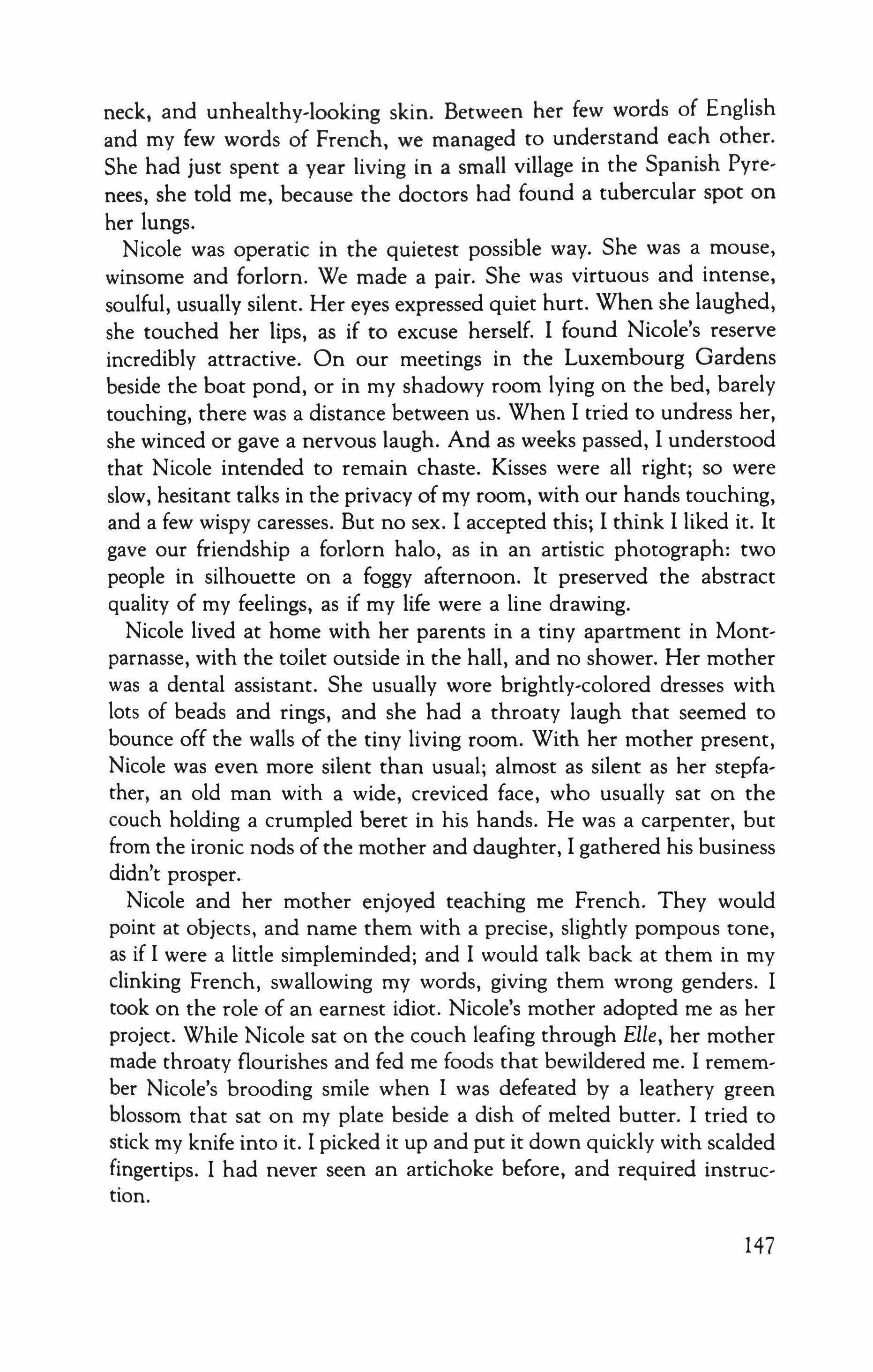
neck, and unhealthy-looking skin. Between her few words of English and my few words of French, we managed to understand each other. She had just spent a year living in a small village in the Spanish Pyrenees, she told me, because the doctors had found a tubercular spot on her lungs.
Nicole was operatic in the quietest possible way. She was a mouse, winsome and forlorn. We made a pair. She was virtuous and intense, soulful, usually silent. Her eyes expressed quiet hurt. When she laughed, she touched her lips, as if to excuse herself. I found Nicole's reserve incredibly attractive. On our meetings in the Luxembourg Gardens beside the boat pond, or in my shadowy room lying on the bed, barely touching, there was a distance between us. When I tried to undress her, she winced or gave a nervous laugh. And as weeks passed, I understood that Nicole intended to remain chaste. Kisses were all right; so were slow, hesitant talks in the privacy of my room, with our hands touching, and a few wispy caresses. But no sex. I accepted this; I think I liked it. It gave our friendship a forlorn halo, as in an artistic photograph: two people in silhouette on a foggy afternoon. It preserved the abstract quality of my feelings, as if my life were a line drawing.
Nicole lived at home with her parents in a tiny apartment in Montparnasse, with the toilet outside in the hall, and no shower. Her mother was a dental assistant. She usually wore brightly-colored dresses with lots of beads and rings, and she had a throaty laugh that seemed to bounce off the walls of the tiny living room. With her mother present, Nicole was even more silent than usual; almost as silent as her stepfather, an old man with a wide, creviced face, who usually sat on the couch holding a crumpled beret in his hands. He was a carpenter, but from the ironic nods of the mother and daughter, I gathered his business didn't prosper.
Nicole and her mother enjoyed teaching me French. They would point at objects, and name them with a precise, slightly pompous tone, as if I were a little simpleminded; and I would talk back at them in my clinking French, swallowing my words, giving them wrong genders. I took on the role of an earnest idiot. Nicole's mother adopted me as her project. While Nicole sat on the couch leafing through Elle, her mother made throaty flourishes and fed me foods that bewildered me. I rernember Nicole's brooding smile when I was defeated by a leathery green blossom that sat on my plate beside a dish of melted butter. I tried to stick my knife into it. I picked it up and put it down quickly with scalded fingertips. I had never seen an artichoke before, and required instruction.
147
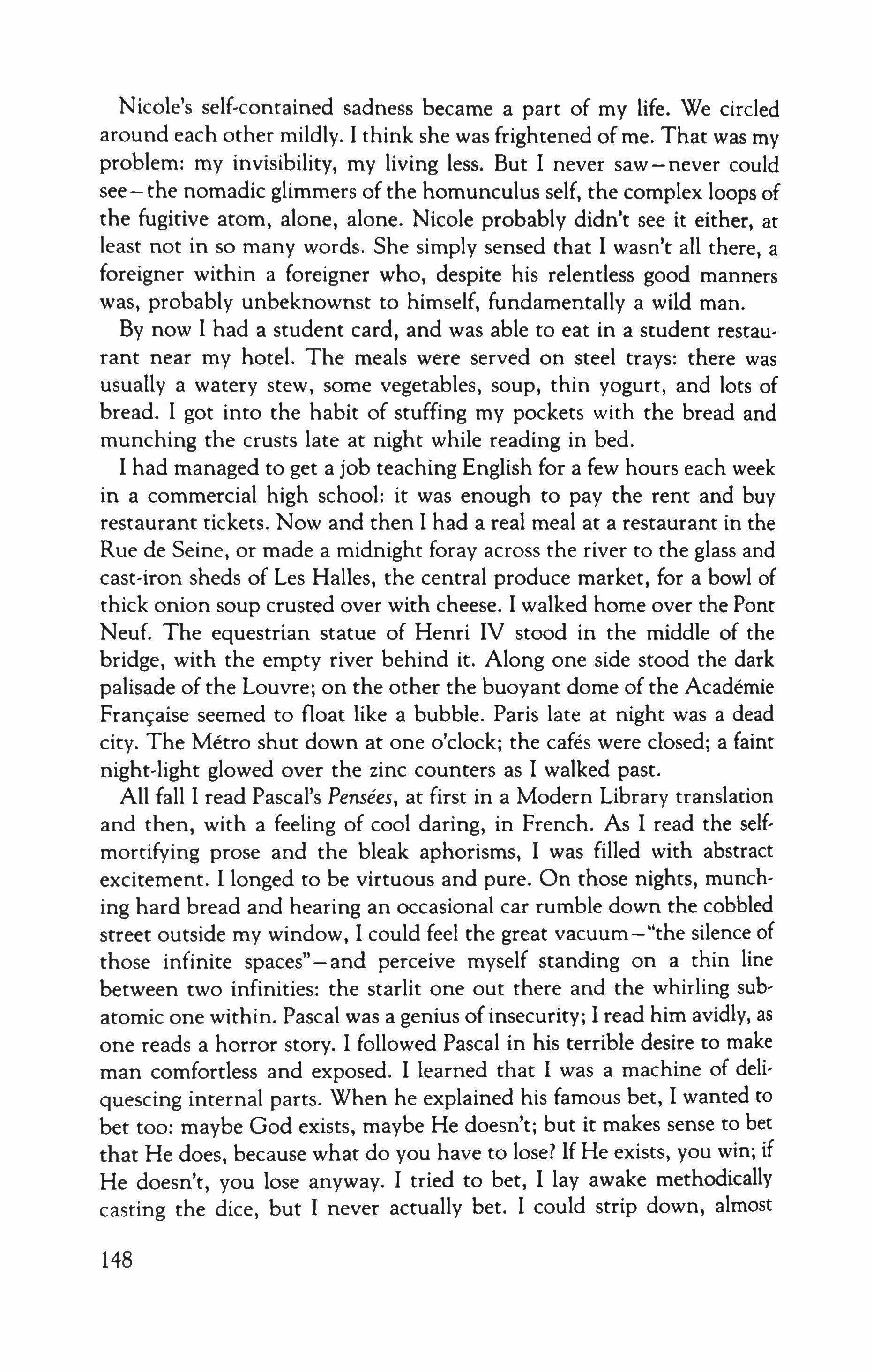
Nicole's self-contained sadness became a part of my life. We circled around each other mildly. I think she was frightened of me. That was my problem: my invisibility, my living less. But I never saw-never could see-the nomadic glimmers of the homunculus self, the complex loops of the fugitive atom, alone, alone. Nicole probably didn't see it either, at least not in so many words. She simply sensed that I wasn't all there, a foreigner within a foreigner who, despite his relentless good manners was, probably unbeknownst to himself, fundamentally a wild man.
By now I had a student card, and was able to eat in a student restaurant near my hotel. The meals were served on steel trays: there was usually a watery stew, some vegetables, soup, thin yogurt, and lots of bread. I got into the habit of stuffing my pockets with the bread and munching the crusts late at night while reading in bed.
I had managed to get a job teaching English for a few hours each week in a commercial high school: it was enough to pay the rent and buy restaurant tickets. Now and then I had a real meal at a restaurant in the Rue de Seine, or made a midnight foray across the river to the glass and cast-iron sheds of Les HaIles, the central produce market, for a bowl of thick onion soup crusted over with cheese. I walked home over the Pont Neuf. The equestrian statue of Henri IV stood in the middle of the bridge, with the empty river behind it. Along one side stood the dark palisade of the Louvre; on the other the buoyant dome of the Academie Francaise seemed to float like a bubble. Paris late at night was a dead city. The Metro shut down at one o'clock; the cafes were closed; a faint night-light glowed over the zinc counters as I walked past.
All fall I read Pascal's Pensees, at first in a Modern Library translation and then, with a feeling of cool daring, in French. As I read the selfmortifying prose and the bleak aphorisms, I was filled with abstract excitement. I longed to be virtuous and pure. On those nights, munching hard bread and hearing an occasional car rumble down the cobbled street outside my window, I could feel the great vacuum-"the silence of those infinite spaces" - and perceive myself standing on a thin line between two infinities: the starlit one out there and the whirling subatomic one within. Pascal was a genius of insecurity; I read him avidly, as one reads a horror story. I followed Pascal in his terrible desire to make man comfortless and exposed. I learned that I was a machine of deliquescing internal parts. When he explained his famous bet, I wanted to bet too: maybe God exists, maybe He doesn't; but it makes sense to bet that He does, because what do you have to lose? If He exists, you win; if He doesn't, you lose anyway. I tried to bet, I lay awake methodically casting the dice, but I never actually bet. I could strip down, almost
148
gleefully; I could become less; I had a talent for it. But the bet left me cold. I didn't have it in me. The story of the piece of folded paper Pascal carried around with him recording a night of mystical perception (on the paper he had written: "fire fire fire") made me skeptical and a little disrespectful. I suspected it was an illusion, the result of indigestion or a fever.
Meanwhile, I wrote insufferable letters to my parents exhorting them to be moral and good, to have elevated ambitions, to stop being dishonest and merely sociable. When I turned off the light and tried to sleep, I heard my heart beating against the mattress; it was breakable, a clock of death. I shifted until the mattress became silent. Only then could I fall asleep.
My cold excitement matched the weather. December was chilly, and it rained every day. Paris became darker under the lid of clouds. With the cold weather, Nicole seemed to withdraw into herself. She was always cold. Often she seemed to be listening to something, her head slightly bent, as if I were scolding her. We saw each other less and less frequently. I think this was her choice. She was, after all, a middle-class young woman thinking of the future. Her gypsy mother had sniffed me out, while skipping around the apartment to keep me entertained. She was a practical woman, and Nicole's melancholy required measures. It became obvious that I was not going to marry her daughter. I was temporary, a man without a future or with too much future. More like a tropical scavenger who had swung down to earth and was likely to disappear again just as quickly, stealing the fruit in the bowl.
As Nicole became less available, her place in my life was taken by an overpowering desire.

One day in early December I opened up a paperback novel by Francois Mauriac, Therese Desqueyroux, placed my French-English dictionary beside it, and got ready for several hours of the labor which, at times, resembled ploughing the ocean: learning French. Every day for months, I had been making a place in my brain, and equipping it with syntax, vocabulary, fractions of sentences. I had worked my fat dipthongs into musical vowels. I had collected bits of language, colloquialisms, slang. I had wrestled with subtleties, degrees of intimacy and impersonality in the various forms of personal address: tu, vous. My mind was full of voices, lilts of conversation, a babble of French intonations.
I began reading Mauriac: the gloomy pine forests of the Landes in
* * *
149

southwestern France, a creaking silence that pierced the heart of his characters, the thin vein of religious exaltation amid a hunger for selfsacrifice and self-mutilation. The novel was relentless, a kind of hallucination that was deepened by the straining of my attention, as I tried to stare meaning into the barely familiar words and sentences. After a while I found myself drifting into the story. I leafed through my dictionary and underlined words in the text, hardly noticing what I was doing. The novel's dour language enveloped me; I savored and smelled it. It wasn't Mauriac-whom I didn't know anything about-but French. The nasal definiteness of the passe simple, turning memory into a sentence of immutability; the needlelike phrases. It dawned on me that I wasn't studying now. I was reading, as if I had crossed a line through a membrane and found myself in a new, unheard-of place full of intense forms that were almost familiar, almost ordinary. Here was the world as I had always known it: the trees and clouds; fathers and daughters; destructive passions and the secrets of souls; but expressed in a syncopated medium, as if I had stumbled on a reality that resembled my own in every way, except for an immaterial glow letting me know that, appearances to the contrary, I was at the opposite end of space. It took a while for my discovery to take hold: I could read now. French wasn't simply a discipline, it had become a pleasure. A few evenings later, walking down my street, I noticed the rose light of the Cafe de Tournon spilling onto the sidewalk. The glass front of the cafe was beaded with moisture from the cold. When the door swung open, voices poured into the gray street. I could make out the blurred figures of men playing chess at the front tables. I had never been inside the Tournon; its clubby atmosphere had intimidated me. But now I crossed the street and went inside. A wall of warm air immobilized me at the door. The room curved around a shining zinc bar. A mural of Paris scenes covered all the walls, its bright colors matching the plastic tabletops and the floor of tiny mosaic squares. Coats were draped over the backs ofchairs. People sat amid loops ofcigarette smoke. Everyone seemed at home, as if the cafe were their living room. I noticed an empty table near the back, and sat down. The din of voices stunned me: French, English, German, Scandinavian. A tall black man with a high forehead and closely clipped hair was talking in a singsong lilt to another black man, huge, with a hat clamped over his eyes, and a raincoat which he kept on despite the warmth of the cafe. The second man muttered a few words, but mostly he was silent, and looked angry. I saw him often at the Tournon in the weeks and months that followed, sitting with his massive legs spread
150
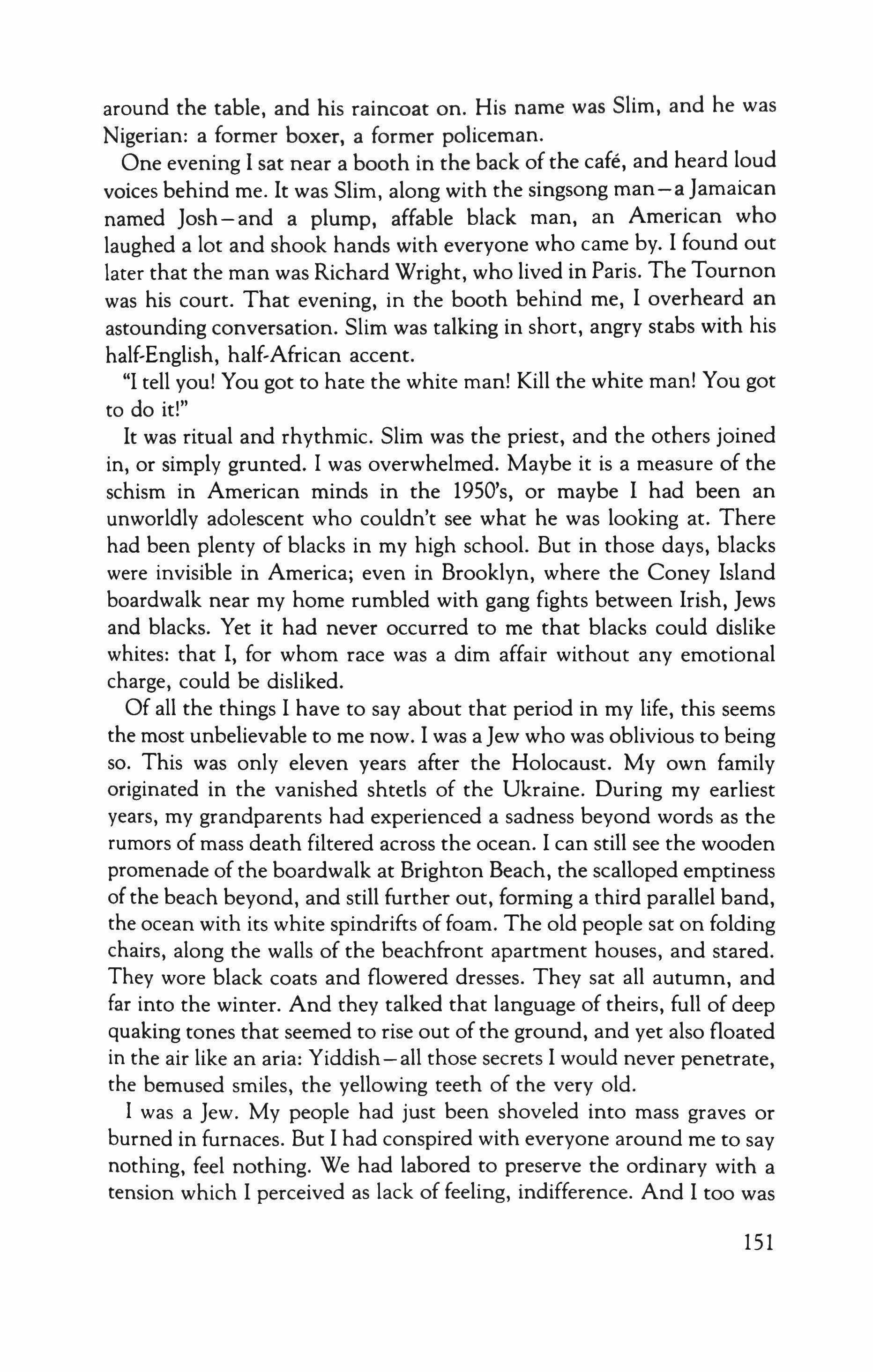
around the table, and his raincoat on. His name was Slim, and he was Nigerian: a former boxer, a former policeman.
One evening I sat near a booth in the back of the cafe, and heard loud voices behind me. It was Slim, along with the singsong man-a Jamaican named Josh - and a plump, affable black man, an American who laughed a lot and shook hands with everyone who came by. I found out later that the man was Richard Wright, who lived in Paris. The Tournon was his court. That evening, in the booth behind me, I overheard an astounding conversation. Slim was talking in short, angry stabs with his half-English, half-African accent.
"I tell you! You got to hate the white man! Kill the white man! You got to do it!"
It was ritual and rhythmic. Slim was the priest, and the others joined in, or simply grunted. I was overwhelmed. Maybe it is a measure of the schism in American minds in the 1950's, or maybe I had been an unworldly adolescent who couldn't see what he was looking at. There had been plenty of blacks in my high school. But in those days, blacks were invisible in America; even in Brooklyn, where the Coney Island boardwalk near my home rumbled with gang fights between Irish, Jews and blacks. Yet it had never occurred to me that blacks could dislike whites: that I, for whom race was a dim affair without any emotional charge, could be disliked.
Of all the things I have to say about that period in my life, this seems the most unbelievable to me now. I was a jew who was oblivious to being so. This was only eleven years after the Holocaust. My own family originated in the vanished shterls of the Ukraine. During my earliest years, my grandparents had experienced a sadness beyond words as the rumors of mass death filtered across the ocean. I can still see the wooden promenade of the boardwalk at Brighton Beach, the scalloped emptiness ofthe beach beyond, and still further out, forming a third parallel band, the ocean with its white spindrifts of foam. The old people sat on folding chairs, along the walls of the beachfront apartment houses, and stared. They wore black coats and flowered dresses. They sat all autumn, and far into the winter. And they talked that language of theirs, full of deep quaking tones that seemed to rise out of the ground, and yet also floated in the air like an aria: Yiddish-all those secrets I would never penetrate, the bemused smiles, the yellowing teeth of the very old.
I was a Jew. My people had just been shoveled into mass graves or burned in furnaces. But I had conspired with everyone around me to say nothing, feel nothing. We had labored to preserve the ordinary with a tension which I perceived as lack of feeling, indifference. And I too was
151

indifferent. I was hardly a Jew at all, but simply a youth: conciliatory, not angry, not seeking vengeance or explanations. Living less had become my cover.
Slim's stabs of hate, and the answers: "Yeah," "O.K.," the almost goodnatured laughter of the plump American, electrified me. I felt myself becoming hideously visible, yet I was riveted. I wanted to hear more. The world blossomed bizarrely, like one of those Japanese paper flowers that you throw in water. It was all so complicated. Things weren't what they seemed to be, and I was disoriented, but somehow deeply pleased.
I started coming to the Tournon every evening. No more Pascal, looking out my window at the lifeless rooftops. No more letters home full of moral astronomy. I sat at the beige Formica tables, and sipped hot wine. I ate long crusty sandwiches of ham and Camembert, and watched the torpid games of chess at the front tables. I made a few cafe friendsAmericans, Swedes, Germans, Romanians-and we talked philosophy or politics. We compared our arduous efforts to learn French. The evenings were long and steamy. Often I sat with a French book, moving my lips like a child struggling with the peculiar substance of written words.
One evening a strange couple came into the cafe. The man walked leaning forward with a grin that was close to a grimace. His face was covered with shaving nicks; his skin looked old and yellow, and his grin, on second thought, seemed out of focus, almost cruel. He wore a torn black raincoat, and he was incredibly thin and hungry-looking. Because of his jerky movements, everything about him seemed a little humorous. A step behind him came a lovely girl. She was dressed plainly, in a beige smock, and she smiled with a kind of fixed humility. What struck me most about her was her skin: it seemed transparent, almost untouched. There was something freshly created about her, as if she had been manufactured by a master doll-maker.
The girl sat across from him, and they spent the evening without saying anything. She seemed to be watching him, as if to guess some unspoken wish of his before he had it. When he shifted on his chair, I could see her body become tense. After that, I noticed them often at the Tournon; they rarely spoke to anyone and hardly spoke to each other. She trailed after him with a kind of demure confidence. I found her beautiful. For all her careful and almost frightened subservience, she seemed the stronger of the two. His name was Charles, and during all the ten years I lived in France I would see him listing along the streets of the Latin Quarter, with his thin mouth and his shaving sores, his patches ofchin hair, his ripped black raincoat. Sometimes his face would
152
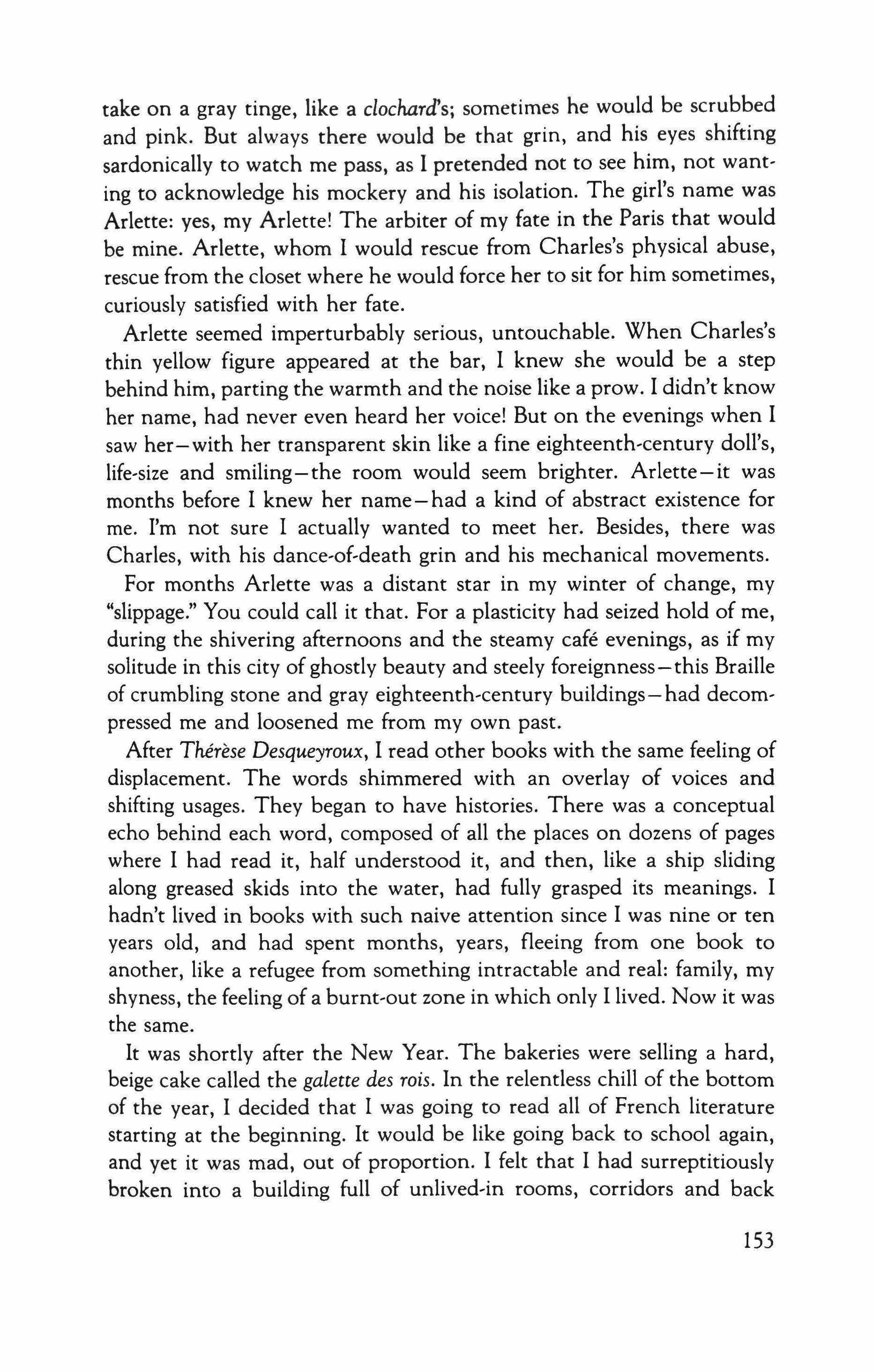
take on a gray tinge, like a clochard's; sometimes he would be scrubbed and pink. But always there would be that grin, and his eyes shifting sardonically to watch me pass, as I pretended not to see him, not wanting to acknowledge his mockery and his isolation. The girl's name was Arlette: yes, my Arlette! The arbiter of my fate in the Paris that would be mine. Arlette, whom I would rescue from Charles's physical abuse, rescue from the closet where he would force her to sit for him sometimes, curiously satisfied with her fate.
Arlette seemed imperturbably serious, untouchable. When Charles's thin yellow figure appeared at the bar, I knew she would be a step behind him, parting the warmth and the noise like a prow. I didn't know her name, had never even heard her voice! But on the evenings when I saw her-with her transparent skin like a fine eighteenth-century doll's, life-size and smiling-the room would seem brighter. Arlette-it was months before I knew her name - had a kind of abstract existence for me. I'm not sure I actually wanted to meet her. Besides, there was Charles, with his dance-of-death grin and his mechanical movements.
For months Arlette was a distant star in my winter of change, my "slippage." You could call it that. For a plasticity had seized hold of me, during the shivering afternoons and the steamy cafe evenings, as if my solitude in this city of ghostly beauty and steely foreignness-this Braille of crumbling stone and gray eighteenth-century buildings-had decompressed me and loosened me from my own past.
After Therese Desqueyroux, I read other books with the same feeling of displacement. The words shimmered with an overlay of voices and shifting usages. They began to have histories. There was a conceptual echo behind each word, composed of all the places on dozens of pages where I had read it, half understood it, and then, like a ship sliding along greased skids into the water, had fully grasped its meanings. I hadn't lived in books with such naive attention since I was nine or ten years old, and had spent months, years, fleeing from one book to another, like a refugee from something intractable and real: family, my shyness, the feeling of a burnt-out zone in which only I lived. Now it was the same.
It was shortly after the New Year. The bakeries were selling a hard, beige cake called the galette des rois. In the relentless chill of the bottom of the year, I decided that I was going to read all of French literature starting at the beginning. It would be like going back to school again, and yet it was mad, out of proportion. I felt that I had surreptitiously broken into a building full of unlived-in rooms, corridors and back
153
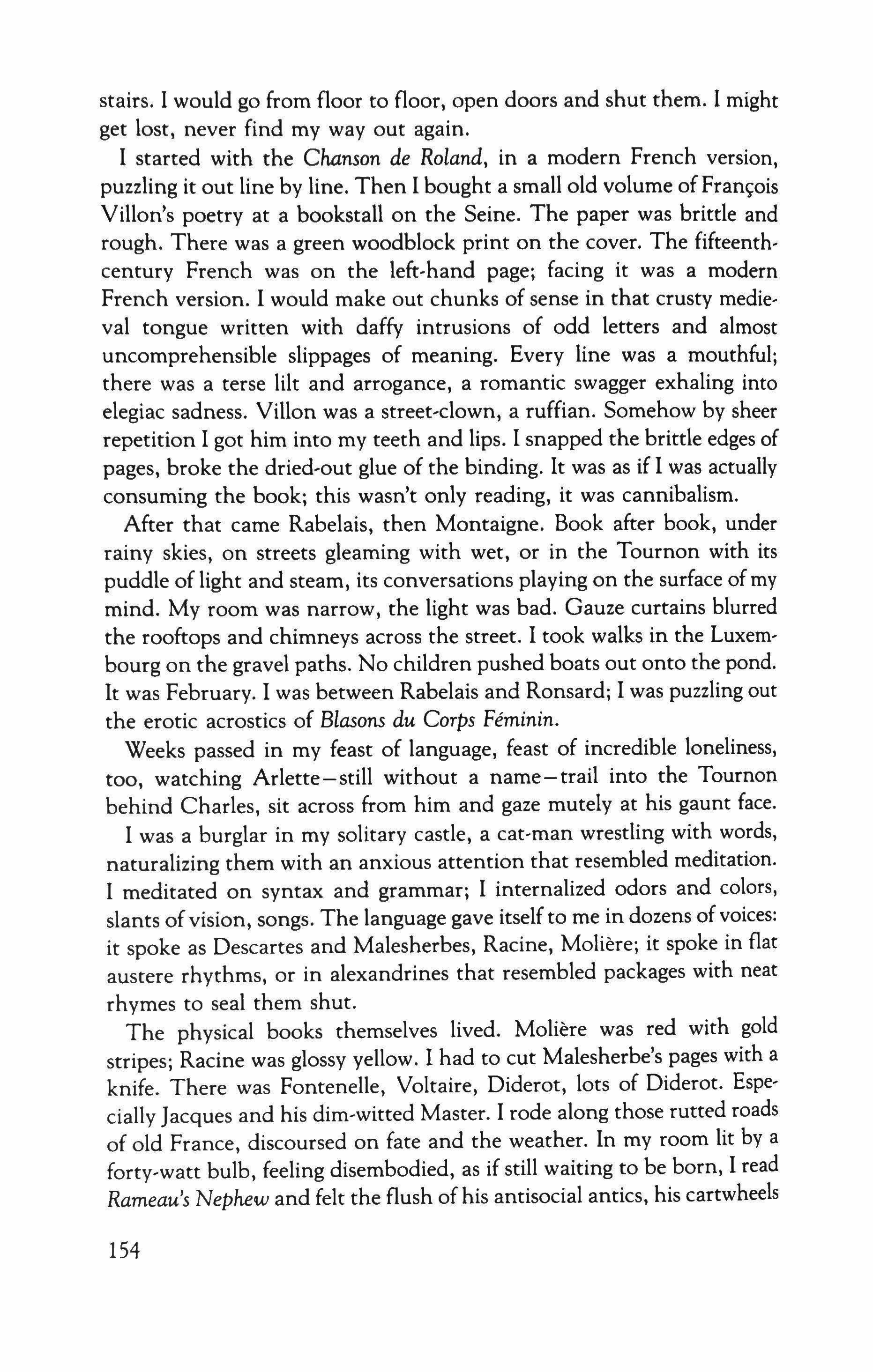
stairs. I would go from floor to floor, open doors and shut them. I might get lost, never find my way out again.
I started with the Chanson de Roland, in a modern French version, puzzling it out line by line. Then I bought a small old volume of Francois Villon's poetry at a bookstall on the Seine. The paper was brittle and rough. There was a green woodblock print on the cover. The fifteenthcentury French was on the left-hand page; facing it was a modern French version. I would make out chunks of sense in that crusty medieval tongue written with daffy intrusions of odd letters and almost uncomprehensible slippages of meaning. Every line was a mouthful; there was a terse lilt and arrogance, a romantic swagger exhaling into elegiac sadness. Villon was a street-clown, a ruffian. Somehow by sheer repetition I got him into my teeth and lips. I snapped the brittle edges of pages, broke the dried-out glue of the binding. It was as if I was actually consuming the book; this wasn't only reading, it was cannibalism.
After that came Rabelais, then Montaigne. Book after book, under rainy skies, on streets gleaming with wet, or in the Tournon with its puddle of light and steam, its conversations playing on the surface of my mind. My room was narrow, the light was bad. Gauze curtains blurred the rooftops and chimneys across the street. I took walks in the Luxembourg on the gravel paths. No children pushed boats out onto the pond. It was February. I was between Rabelais and Ronsard: I was puzzling out the erotic acrostics of Blasons du Corps Feminin.
Weeks passed in my feast of language, feast of incredible loneliness, too, watching Arlette-still without a name-trail into the Tournon behind Charles, sit across from him and gaze mutely at his gaunt face.
I was a burglar in my solitary castle, a cat-man wrestling with words, naturalizing them with an anxious attention that resembled meditation. I meditated on syntax and grammar; I internalized odors and colors, slants ofvision, songs. The language gave itself to me in dozens of voices: it spoke as Descartes and Malesherbes, Racine, Moliere; it spoke in flat austere rhythms, or in alexandrines that resembled packages with neat rhymes to seal them shut.
The physical books themselves lived. Moliere was red with gold stripes; Racine was glossy yellow. I had to cut Malesherbe's pages with a knife. There was Fontenelle, Voltaire, Diderot, lots of Diderot. Especially Jacques and his dim-witted Master. I rode along those rutted roads of old France, discoursed on fate and the weather. In my room lit by a forty-watt bulb, feeling disembodied, as if still waiting to be born, I read Rameau's Nephew and felt the flush of his antisocial antics, his cartwheels
154

of self-humiliation and his operatic feats of savagery, self-mockery and obsequiousness.
The labor of reading in a not-quite-known language gave the words a thickness. Words became substances. Diderot's nephew existed in a tropical depth; he became a zoological monster, a self such as I would never be: caustic and sardonically humble, visible, hilarious. Week by week, I constructed a new past for myself, I cast lines of language backward into imaginary centuries. I transformed myself, gave myself a new mouth, a new walk, new eyes. The books were doing it. I waded methodically up the centuries, spending hours at my narrow desk, or at the Petit Suisse cafe across from the Luxembourg Gardens, in a warm, noisy backroom where the odor of coffee mingled with the odor of disinfectant. During the day, the cafe was full of students. There were heaps of coats on the radiators, and books piled up on the tables next to sausage sandwiches and beer or opened flat and being absorbed by a bearded student in a black sweater or by a girl almost invisible with exhaustion. I imagined her living in a chambre de bonne without any heat or running water. There would be a skylight, some pads on the floor to sleep on, an electric coil for making tea. On some nights, her lover would climb seven flights up the service stairs, carrying a string bag full of charcuterie, a baguette, a bottle of thick Algerian wine. There would be a candlelight dinner on the linoleum floor, lovemaking under an eiderdown quilt sent from home. All this I saw in her winter face; in her thick sweater pulled down over a long black skirt; in her attentive pencil, bracketing paragraphs, circling words. I too was present in that cafe backroom full of beginnings. I too was a refugee from chilly rooms and the perennially damp streets of winter.
I browsed at the few bookstalls along the Seine that stayed open in February. They displayed torn, leather-bound volumes of Madame de Stael or Saint-Simon, or the Napoleon of Las Cases in many tomes, or Michelet's history of France, taking up half a row. There were old yellow Mercure de France books wrapped in cellophane. It was a musty Gallic roll call. The stalls often sold nineteenth-century book illustrations and military medals from World War l. The horse-chestnut trees rose in huge black columns, their branches spindling out against the heavy sky. The river lapped against the stone banks, swollen and muddy; the walk at water level almost flooded. Long, snub-nosed river barges were moored to iron rings set high into the granite wall. The lights were on in their small living quarters, and a plank walk extended from the deck to the walkway, and along the walkway to the stone stairs leading to street level.
ISS

One day I was browsing in a bookstore across from Notre Dame, when a tall man wearing quarter-inch-thick glasses came in carrying a worn leather briefcase under his arm. He hesitated, as if trying to get his bearings amid the stalls and the sagging shelves that rose to the ceiling. There wasn't much light, and he seemed to be sniffing out the arrangement of the space. He moved with a boyish awkwardness, but his face, especially his mouth-muscular and thin-possessed a peculiar authority. His mouth seemed to have taken over the expressive function of eyes hidden by the bulbs of optical glass, with small supplementary lenses set into them. Through the thick glasses, his eyes seemed distant and small, almost porcine. The man approached the shelves where I was standing and inspected a few titles. When he picked out a book, he had to bend his head to within a few inches of it.
I was then at a crossroads. My progress had taken me through the eighteenth century. I had read Les Liaisons Dangereuses and Marivaux's plays; I had read Rousseau's Nouvelle Heloise, in two thick yellow volumes of the Classiques Garnier. Now I was trying to decide what to read next, but as I got closer to the present, I found that time had not yet winnowed out the immortals. Who was great, who was only almost great? I looked at a three-volume edition of Maine de Biran's journal. But was Maine de Biran an important enough writer? Or should I read Restif de la Bretonne instead, a half-shelfful of small-press editions with brittle pages. Or else Stendhal; of course, Stendhal. Or Chateaubriand, a shelf of dark red tomes, several of them bearing a heavy-handed romantic title: Memoires d'Outre-Tombe - "memoirs from beyond the grave." I turned to the man with the glasses and asked him in careful French if Stendhal was a greater writer than Chateaubriand, and if so, which book by Stendhal I should read.
I had recently begun to talk to strangers as part of my quest for French intonations. I wanted the nasal song and French lilts of actual speech. I wanted the gongs and sighs which were the effects of the language.
The man paused, and then, turning to the wall of books, picked out a cheap, glossy edition of Le Rouge et le Noir.
"Try that," he suggested. His voice was bemused and tolerant, his disjointed eyes peering at me from behind his double lenses.
So began my friendship with Raymond which, twenty-seven years later, still endures. Raymond, more elusive and solitary than I could ever be, living in his small apartment, piled with books, on the Rue de Sevigne, in the Jewish neighborhood which, a decade later, would be the arena of my disastrous farewell to Paris. When I met Raymond, he was living with a South African woman named Gilian. She had pale, pitted
156
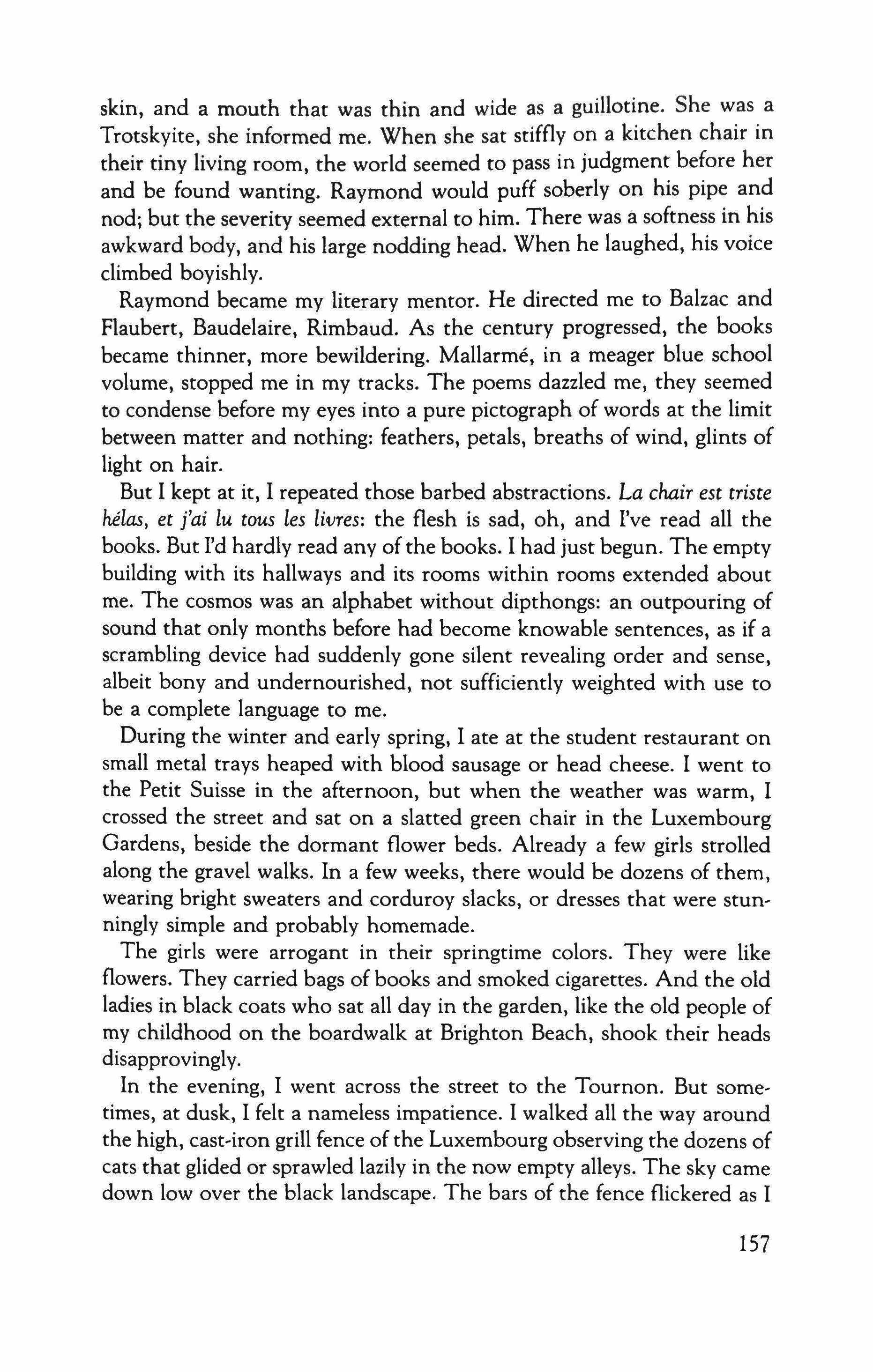
skin, and a mouth that was thin and wide as a guillotine. She was a Trotskyite, she informed me. When she sat stiffly on a kitchen chair in their tiny living room, the world seemed to pass in judgment before her and be found wanting. Raymond would puff soberly on his pipe and nodi but the severity seemed external to him. There was a softness in his awkward body, and his large nodding head. When he laughed, his voice climbed boyishly.
Raymond became my literary mentor. He directed me to Balzac and Flaubert, Baudelaire, Rimbaud. As the century progressed, the books became thinner, more bewildering. Mallarme, in a meager blue school volume, stopped me in my tracks. The poems dazzled me, they seemed to condense before my eyes into a pure pictograph of words at the limit between matter and nothing: feathers, petals, breaths of wind, glints of light on hair.
But I kept at it, I repeated those barbed abstractions. La chair est ttiste helas, er j'ai lu tous les livres: the flesh is sad, oh, and I've read all the books. But I'd hardly read any of the books. I had just begun. The empty building with its hallways and its rooms within rooms extended about me. The cosmos was an alphabet without dipthongs: an outpouring of sound that only months before had become knowable sentences, as if a scrambling device had suddenly gone silent revealing order and sense, albeit bony and undernourished, not sufficiently weighted with use to be a complete language to me.
During the winter and early spring, I ate at the student restaurant on small metal trays heaped with blood sausage or head cheese. I went to the Petit Suisse in the afternoon, but when the weather was warm, I crossed the street and sat on a slatted green chair in the Luxembourg Gardens, beside the dormant flower beds. Already a few girls strolled along the gravel walks. In a few weeks, there would be dozens of them, wearing bright sweaters and corduroy slacks, or dresses that were stunningly simple and probably homemade.
The girls were arrogant in their springtime colors. They were like flowers. They carried bags of books and smoked cigarettes. And the old ladies in black coats who sat all day in the garden, like the old people of my childhood on the boardwalk at Brighton Beach, shook their heads disapprovingly.
In the evening, I went across the street to the Tournon. But sometimes, at dusk, I felt a nameless impatience. I walked all the way around the high, cast-iron grill fence of the Luxembourg observing the dozens of cats that glided or sprawled lazily in the now empty alleys. The sky came down low over the black landscape. The bars of the fence flickered as I
157

walked past, converting the scene into a jerky, silent movie. When I reached the Rue Vavin, I turned into it, past the hewn stone buildings of the very wealthy, past ramshackle artists' studios and streaked workingclass tenements. In the late winter sparkle of store windows and yellow headlights, with small cars rumbling noisily over cobbles, I reached Montparnasse, and a dim, serious-looking cafe, the Select.
All that winter, and for years afterward, I would push open the swinging glass doors of the Select and pick out a small, round table on the terrace. The cafe was a space of muted colors. The walls were drab, the banquettes of scratched brown leather. People sat with their coats on, nursing a glass of wine or cognac, or a tall glass of insipid French beer. They had grave faces, sad faces, remote chalky faces, philosophical faces. They were political exiles from Romania or Yugoslavia; painters with discolored fingers; heavy-spirited men from the neighborhood, with newspapers sticking out of their coat pockets and the decline of capitalism on their faces. I never talked to anyone. I wasn't a member of their society. But I loved sitting there; I felt like an onlooker at Plato's school.
Sometimes I met Raymond there. He taught at a commercial high school around the corner. I talked to him about the books I was reading, and about anything else that came to mind. I was like a hermit who can't stop talking once he starts. And Raymond was good to talk to. He wanted to know everything about me: my family, my childhood, the Brooklyn streets and the beach at Coney Island. As I talked to him, I invented myself. I don't mean that I lied; I made myself into a story. I naturalized myself in the language that was still thick on my tongue, but available, encrusted in my psyche by months of reading and talking, by the deciphering of store windows and food packages, by listening to the radio and going endlessly to movies.
What I remember most about those evenings with Raymond was an ache in my jaw from talking too much. When Raymond leaned toward me full of whimsical attention, with his large body and his authoritative mouth, his science-fiction glasses, I wanted to fill in all the blanks, say anything, including things I'd never thought before. Raymond rarely said very much. He puffed leisurely on his pipe, and talked with an indrawn, hesitant voice about matters that seemed more or less secret, having to do mostly with politics. As time passed, I realized that the secret extended to his entire life. I didn't think about it at the time, didn't feel any lack of depth or background. All I wanted was Raymond's bulky presence, his lips tightening around a pipe stem, his curi-
158
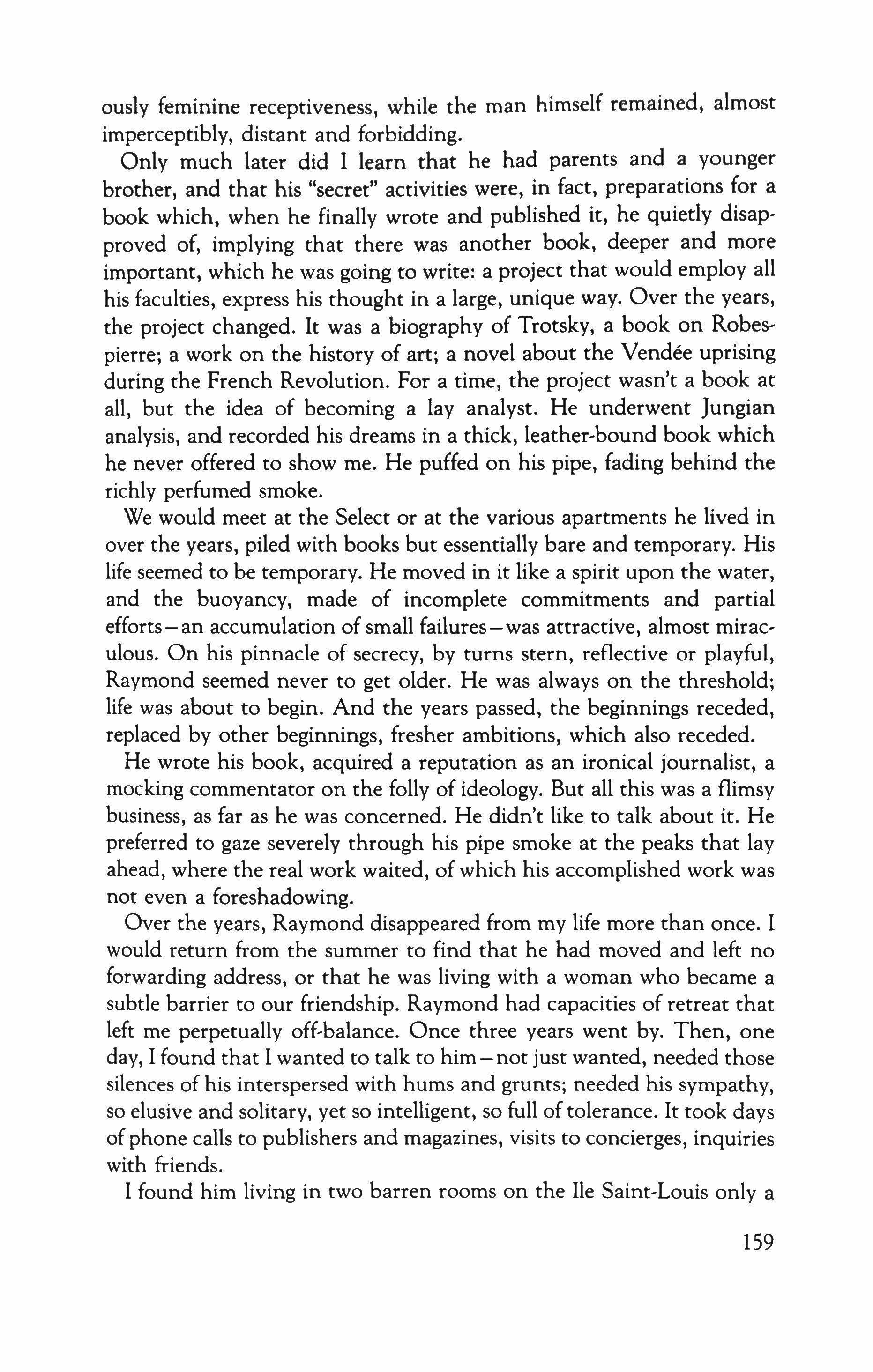
ously feminine receptiveness, while the man himself remained, almost imperceptibly, distant and forbidding.
Only much later did I learn that he had parents and a younger brother, and that his "secret" activities were, in fact, preparations for a book which, when he finally wrote and published it, he quietly disapproved of, implying that there was another book, deeper and more important, which he was going to write: a project that would employ all his faculties, express his thought in a large, unique way. Over the years, the project changed. It was a biography of Trotsky, a book on Robespierre; a work on the history of art; a novel about the Vendee uprising during the French Revolution. For a time, the project wasn't a book at all, but the idea of becoming a lay analyst. He underwent Jungian analysis, and recorded his dreams in a thick, leather-bound book which he never offered to show me. He puffed on his pipe, fading behind the richly perfumed smoke.
We would meet at the Select or at the various apartments he lived in over the years, piled with books but essentially bare and temporary. His life seemed to be temporary. He moved in it like a spirit upon the water, and the buoyancy, made of incomplete commitments and partial efforts-an accumulation of small failures-was attractive, almost miraculous. On his pinnacle of secrecy, by turns stern, reflective or playful, Raymond seemed never to get older. He was always on the threshold; life was about to begin. And the years passed, the beginnings receded, replaced by other beginnings, fresher ambitions, which also receded.
He wrote his book, acquired a reputation as an ironical journalist, a mocking commentator on the folly of ideology. But all this was a flimsy business, as far as he was concerned. He didn't like to talk about it. He preferred to gaze severely through his pipe smoke at the peaks that lay ahead, where the real work waited, of which his accomplished work was not even a foreshadowing.
Over the years, Raymond disappeared from my life more than once. I would return from the summer to find that he had moved and left no forwarding address, or that he was living with a woman who became a subtle barrier to our friendship. Raymond had capacities of retreat that left me perpetually off-balance. Once three years went by. Then, one day, I found that I wanted to talk to him - not just wanted, needed those silences of his interspersed with hums and grunts; needed his sympathy, so elusive and solitary, yet so intelligent, so full of tolerance. It took days ofphone calls to publishers and magazines, visits to concierges, inquiries with friends.
I found him living in two barren rooms on the He Saint-Louis only a
159
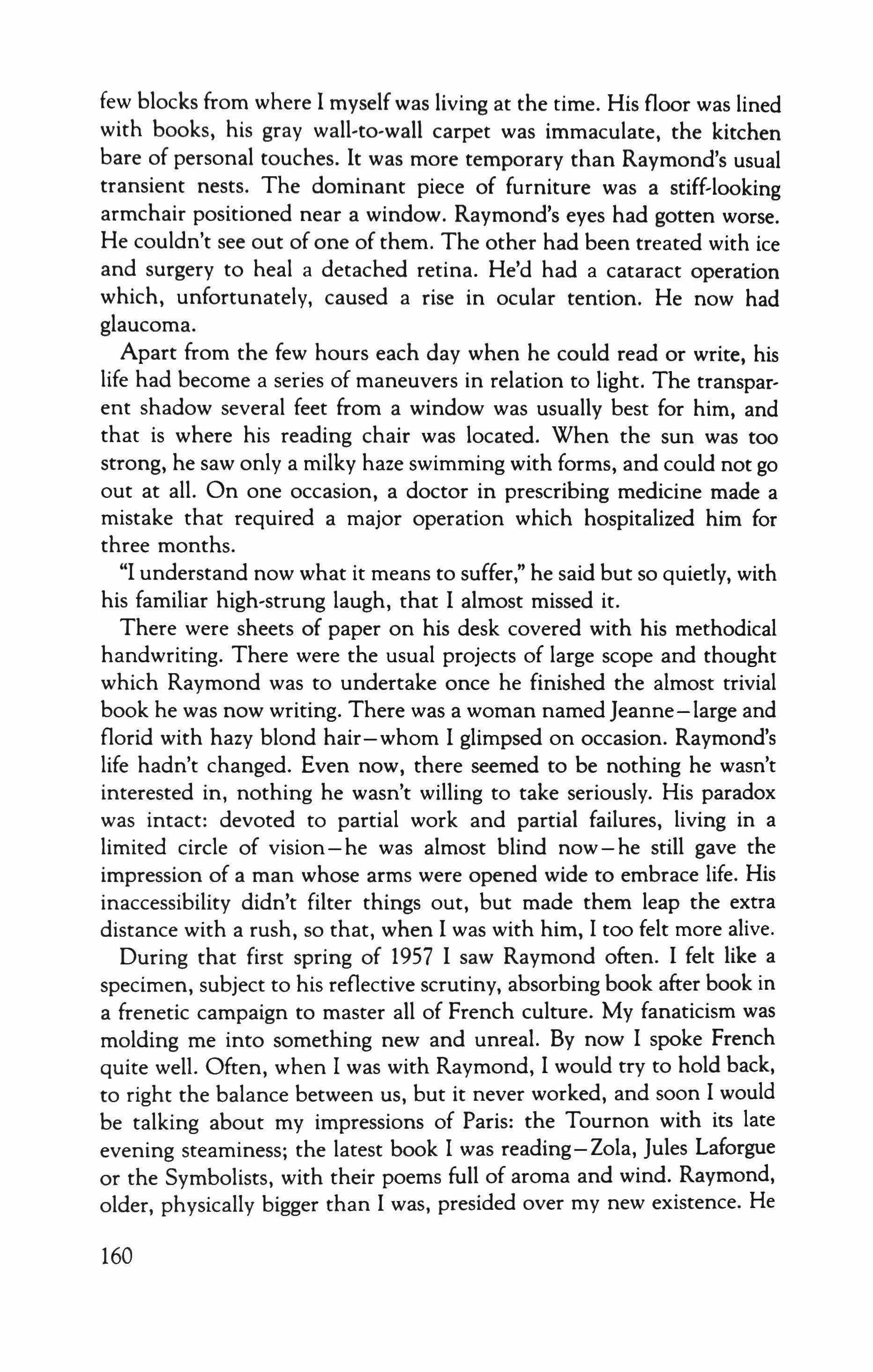
few blocks from where I myself was living at the time. His floor was lined with books, his gray wall-to-wall carpet was immaculate, the kitchen bare of personal touches. It was more temporary than Raymond's usual transient nests. The dominant piece of furniture was a stiff-looking armchair positioned near a window. Raymond's eyes had gotten worse. He couldn't see out of one of them. The other had been treated with ice and surgery to heal a detached retina. He'd had a cataract operation which, unfortunately, caused a rise in ocular tention. He now had glaucoma.
Apart from the few hours each day when he could read or write, his life had become a series of maneuvers in relation to light. The transparent shadow several feet from a window was usually best for him, and that is where his reading chair was located. When the sun was too strong, he saw only a milky haze swimming with forms, and could not go out at all. On one occasion, a doctor in prescribing medicine made a mistake that required a major operation which hospitalized him for three months.
"I understand now what it means to suffer," he said but so quietly, with his familiar high-strung laugh, that I almost missed it.
There were sheets of paper on his desk covered with his methodical handwriting. There were the usual projects of large scope and thought which Raymond was to undertake once he finished the almost trivial book he was now writing. There was a woman named Jeanne-large and florid with hazy blond hair-whom I glimpsed on occasion. Raymond's life hadn't changed. Even now, there seemed to be nothing he wasn't interested in, nothing he wasn't willing to take seriously. His paradox was intact: devoted to partial work and partial failures, living in a limited circle of vision - he was almost blind now - he still gave the impression of a man whose arms were opened wide to embrace life. His inaccessibility didn't filter things out, but made them leap the extra distance with a rush, so that, when I was with him, I too felt more alive.
During that first spring of 1957 I saw Raymond often. I felt like a specimen, subject to his reflective scrutiny, absorbing book after book in a frenetic campaign to master all of French culture. My fanaticism was molding me into something new and unreal. By now I spoke French quite well. Often, when I was with Raymond, I would try to hold back, to right the balance between us, but it never worked, and soon I would be talking about my impressions of Paris: the Tournon with its late evening steaminess; the latest book I was reading-Zola, Jules Laforgue or the Symbolists, with their poems full of aroma and wind. Raymond, older, physically bigger than I was, presided over my new existence. He
160
was the mentor of my change into a homeless man, not an American anymore, but an outsider who was almost French, almost a descendant of all those books I was reading. They had become my past; but I had no past.
It was bewildering - and exhilarating - to be taken for French by storekeepers. It wasn't only my accent, but the way I moved, my way of walking; my eyes, my shoes, my handwriting. The center had shifted. Brooklyn had become another world. Already, when I spoke English, I felt tentative and unfamiliar. I performed for Raymond at the Select in the early dusk or amid the slanting walls and angles of his tiny apartment up five flights of stairs on the Rue de Sevigne.
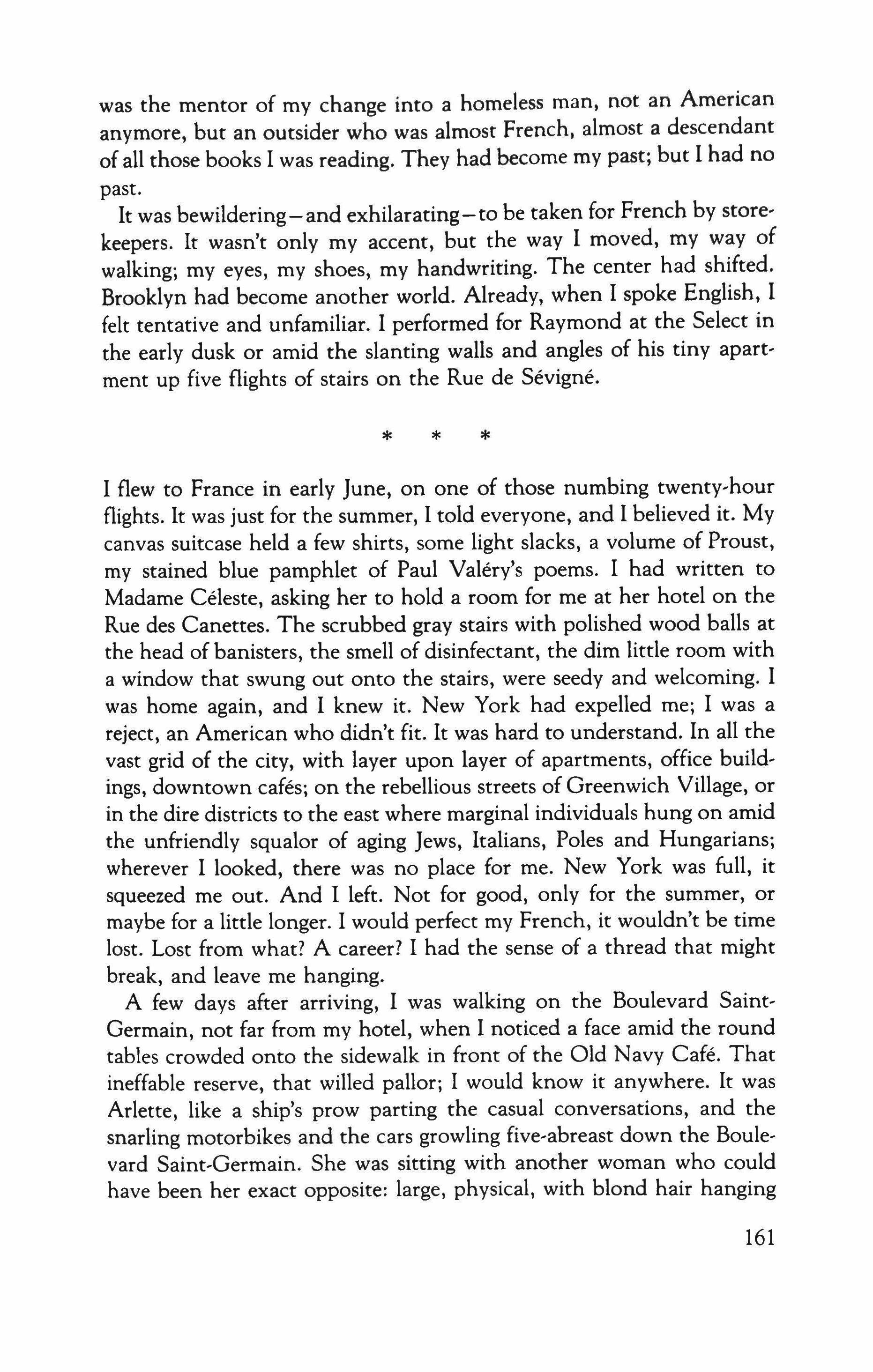
I flew to France in early June, on one of those numbing twenty-hour flights. It was just for the summer, I told everyone, and I believed it. My canvas suitcase held a few shirts, some light slacks, a volume of Proust, my stained blue pamphlet of Paul Valery's poems. I had written to Madame Celeste, asking her to hold a room for me at her hotel on the Rue des Canettes. The scrubbed gray stairs with polished wood balls at the head of banisters, the smell of disinfectant, the dim little room with a window that swung out onto the stairs, were seedy and welcoming. I was home again, and I knew it. New York had expelled me; I was a reject, an American who didn't fit. It was hard to understand. In all the vast grid of the city, with layer upon layer of apartments, office buildings, downtown cafes; on the rebellious streets of Greenwich Village, or in the dire districts to the east where marginal individuals hung on amid the unfriendly squalor of aging Jews, Italians, Poles and Hungarians; wherever I looked, there was no place for me. New York was full, it squeezed me out. And I left. Not for good, only for the summer, or maybe for a little longer. I would perfect my French, it wouldn't be time lost. Lost from what? A career? I had the sense of a thread that might break, and leave me hanging.
A few days after arriving, I was walking on the Boulevard SaintGermain, not far from my hotel, when I noticed a face amid the round tables crowded onto the sidewalk in front of the Old Navy Cafe. That ineffable reserve, that willed pallor; I would know it anywhere. It was Arlette, like a ship's prow parting the casual conversations, and the snarling motorbikes and the cars growling five-abreast down the Boulevard Saint-Germain. She was sitting with another woman who could have been her exact opposite: large, physical, with blond hair hanging
* * *
161

loosely over her shoulders, and a look of intense concentration on her face. She laughed and tossed her head in response to something Arlette was saying. As she did so, she seemed to explode with sheer overabundance, of nerves, of blood. There was something quietly beserk about her.
I came over to their table, and Arlette smiled quizzically at the appearance of her lover of another year, l'americain who had sputtered over the mountain roads on his motorcycle to see her the summer before in Megeve. I hadn't thought about Arlette all year. She had been an unresolved memory that I had left behind in Paris, not meaning to return. In New York, my laboriously acquired French double had been submerged by the panic of suddenly growing up and trying to find a place for myself in the world of careers, the world that had a future. Arlette introduced me to her friend. Her name was Michele, and she was a painter. When she talked, she chewed her cigarette and leaned back in her chair with a defiance that would have been masculine except for a sexual softness in her face, and her nervous hands. Her laugh ended in a high, explosive sigh. She and Arlette were very much wrapped up in each other. They had their jokes, their complicity. Arlette seemed to bask in Michele's extravagance. There was a whimsical distance in Arlette's voice when she spoke to me that let me know immediately where I stood: the past was past. Our little affair of the previous spring had been an incident. She was beyond it-beyond menow; although where she was would have been hard to say. She seemed to have her own chilly space, and that amused her. Michele too seemed amused. I told them about my year in New York, and my plans for the summer, my idea of somehow staying on. I didn't know how I was going to do it, if I did do it, yet after a few days in Paris I knew I had no place to go back to. It was precarious and exalting to be nowhere, almost to be no one. I felt stirred by Michele's casual intensity. When she leaned forward, her long hair fell over the V of her tight red sweater. Her mouth and her hands seemed light, almost floating. After a while, Arlette said she had to go. When she stood up, I had the impression that she was handing me on to Michele. For the past half-hour she had said very little; she had been remote, approving, an impresario. And now Michele and I were alone.
I walked her home. Behind a high, iron fence at the corner of the boulevard Saint-Michel the black stone ruins of the Hotel de Cluny stood on a pool of menhir-like stillness. The wide sidewalk was full of slim girls and defiantly shabby boys. A sultry light reflected from the rows of poites-ieneires along their narrow balconies, silvered the young
162

leaves of the horse-chestnut trees. Michele and I walked in that liberaring light. What did we talk about? Did I tell her about my studies and my poetry; about Madame Celeste in her hotel on the Rue des Canettes, and the profound, almost frightening release which these streets provided: the sizzling of pommes frites in little stalls in front of the cafes, the smell of blood sausage drifting from an all-night restaurant near the Odeon; and the light, yes the light showering from a sky that was low and wild, with its billow of soft pastels. Did Michele laugh with her high, soft sigh as she told me about her painting, about the village in the Alps where she spent the war years, about her mother who still lived there, and about her marriage, because, yes, she had been married. In her rage to be independent, she had run away from home when she was seventeen and married a journalist. She wasn't a girl, she was a woman; she had weight, she had a past that ran deeper than her years. Or did I learn these things later, when she began to open to me like a Chinese scroll, endlessly complex and vast, its layerings of life heaped vertically from lakeside to flowering hills, to wild, snowy peaks, all eerily precise and still. Memory had erased whatever was said that day and left only a glimpse of two people walking, two people erecting a kingdom. A creeping light had isolated us. We were lone inhabitants of ourselves, faces moving in a fabulous transparency.
As we walked up the Rue de la Montagne Sainte-Genevieve and then along the Rue Descartes, we entered a neighborhood I had never seen before. Here were deeply gray, tilted buildings that seemed to swim up out of the city's past and stand blinking in the light. This was Michele's neighborhood. The groceries, bakeries and butcher shops were tiny; lines of customers trailed onto the narrow sidewalks and into the streets. The stores were painted red, beige and green. The Rue Descartes ran into a square with a couple of low trees in the center. The buildings on the square were even older and more crumbling. Old store signs were painted on the walls, but the stores were gone, or they were different stores. The faded signs gave the square a crumbling festiveness. Half a dozen clochards lay on a raised island in the middle of the square. They clowned and fought among themselves, and drank from those bottomless green bottles. One of them got up and stumbled about in his smeared shirt and sagging pants, which slipped down while he danced. He grabbed at them, while a friend tried to pull them down, and they roared with thick laughter, their voices raw and full of mucus.
The square, the Place de la Contrescarpe, was the center of a tiny working-class neighborhood wedged between the Pantheon and the solid bourgeois buildings of the Rue Monge. It was an island in time, a
163

place where the old working-class lore was still alive. The language spoken here wasn't French, but a whimsical Paris slang known as parigot. I heard it whanging past my ear, full of twangs and swallows.
We walked down another street and turned into an alley that ran between walls stuccoed with gray cement, a dingy vein running deep behind the street to a courtyard filled with plane trees and parked cars, and surrounded by a ragged series of buildings: a low barracks-like apartment house, an elegant nineteenth-century hOtel particulier, with white-slatted shutters at all the windows, and, occupying the favored place, a misbegotten concrete wafer, full ofcracks and angles-one ofthe last buildings that had been put up before the war, in that era of concrete architecture, monuments to modernism and the ambient fascist esthetic.
This was where Michele lived. We got into the wheezing elevator-a box of glass and polished wood about the size of a coffin - and crept up six flights. The apartment was tiny: a living room, two small bedrooms, a tiny kitchen. It had been her parents' apartment before the war and had only recently been recovered from a homeless family that had taken it over after the war, after the Nazi officers who had requisitioned it had left. Michele lived here with her two brothers. As the oldest, she had the living room, a large brown room with a low bed against one wall and an easel placed near an open window. The easel was occupied by a canvas covered with slashes of color. The paint was thick, almost sculpted. A square palette lay on a stool besir' it, pitted and streaked with dark reds and yellows; blue swirls like eve: ose from it. The colors were a moonscape, or a tropical seascape, deep and rich with the energy of the brush. The palette lay like an exposed inner world; beside it, the canvas seemed almost chaste.
Michele's room rushed out the windows. The two double partes/enetres stood open, and Paris, in a vast, hazy bowl, opened beyond it. The bright dome of the Sacre Coeur glowed on the northern rim. Notre Dame sat heavily in the middle distance, like a heraldic animal. The great clock tower of the Gare de Lyon was off to the right. Here was all of Paris: the silver slopes of the rooftops, the chimneys, the valleys and the heights, the faintly-traced streets. A fretwork of angles and cubes, like a gigantic cuneiform text gone haywire. The beauty of the scene was overwhelming. It was like a glimpse of eternity. I think I fell in love with everything all at once. Michele, and her neighborhood, and the view from the window, and the jabs of color on her palette. On a low table between the windows was a photograph of a man's face turned theatrically in profile, with a bandanna around his
164

neck. The photograph was blurred, and the paper was old. The man had sharp features and a deeply creased forehead. There was something chilly and profoundly moral about him. Over the years, that face would haunt me. It would become a silent chorus, a refrain, peering at me out of its heavy wooden frame, or not at me but beyond me, as Michele, so often, would fight her way beyond me in a fine moral rage.
"That's my father," Michele said. "It's the only photograph I have of him. He was killed during the war, in the Resistance. My parents were both in the Resistance. I hardly saw them during the war. Then he was killed. He was an aide to Colonel Fabien. They were killed together."
Michele's face had become guarded and quiet. The year before, I had often walked past the bronze stick figures of the monument to the Resistance, surrounded by closely cropped lawn, in the Luxembourg Gardens, and read the words of the dirge-like hymn inscribed at the base:
ami quand tu tombes un ami sort de ['ombre
Michele's room was frozen to its past. Michele too seemed frozen. Her voice was level and unexpressive as she stood in the hazy brightness, with all of Paris pouring in the window, and her father, blurred and silent, on the table, staring in the photograph toward something gray and speckled, maybe a mountaintop.
For years, our lives would be shadowed by legends of the Resistance. A friend ofMichele's, an old factory worker whose wife ran a fabric shop down the street, had been captured by the Nazis, tortured and sent to a prison camp. He spoke in a hoarse, wheezing voice, or what was left of a voice after the camps. He limped up the steep street on a crooked leg, the result of beatings he had received. He was a martyr, and his wife, plump and bright, sitting all day in a rocking chair inside her cluttered store window, was the goodly mother of the class struggle. There was also Gilda, a friend of Michele's mother, full of boisterous student mannerisms, although she was almost fifty. Gilda had been a terrorist. In 1943, she had walked up to a German Gestapo officer in the Gare de Lyon and shot him in the head. There were other people too, whom Michele pointed out to me on the street, smaller-than-life, wearing clothes that didn't fit, smiling with a gold tooth, lugging a string bag full ofcharcuterie and bread along the tiny sidewalk. They were soldiers of an old army, survivors of a time when souls had been made and broken without niceties. Michele still had a foot in that time. Her father was the
165
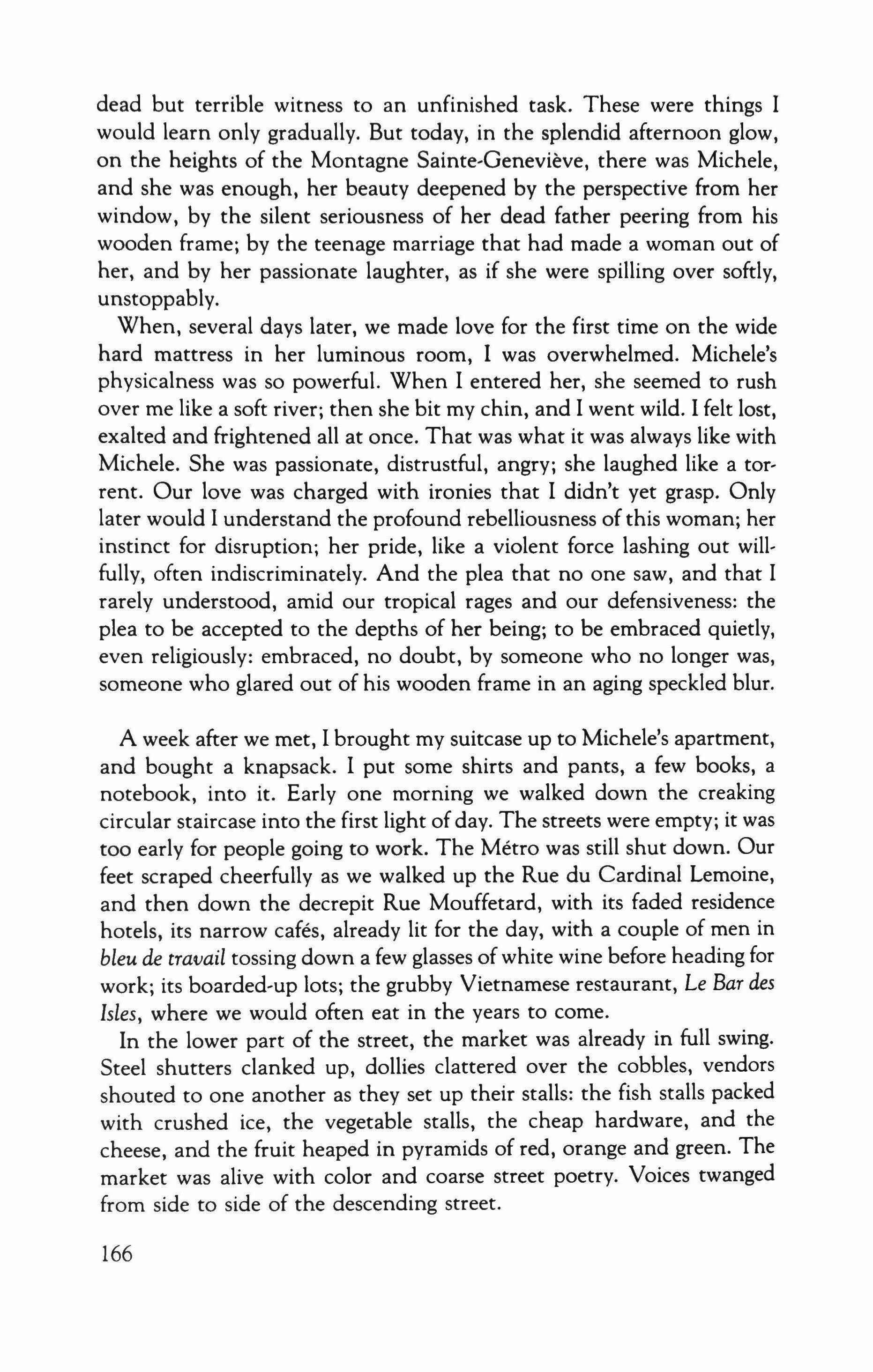
dead but terrible witness to an unfinished task. These were things I would learn only gradually. But today, in the splendid afternoon glow, on the heights of the Montagne Sainte-Genevieve, there was Michele, and she was enough, her beauty deepened by the perspective from her window, by the silent seriousness of her dead father peering from his wooden frame; by the teenage marriage that had made a woman out of her, and by her passionate laughter, as if she were spilling over softly, unstoppably.
When, several days later, we made love for the first time on the wide hard mattress in her luminous room, I was overwhelmed. Michele's physicalness was so powerful. When I entered her, she seemed to rush over me like a soft river; then she bit my chin, and I went wild. I felt lost, exalted and frightened all at once. That was what it was always like with Michele. She was passionate, distrustful, angry; she laughed like a torrent. Our love was charged with ironies that I didn't yet grasp. Only later would I understand the profound rebelliousness ofthis woman; her instinct for disruption; her pride, like a violent force lashing out willfully, often indiscriminately. And the plea that no one saw, and that I rarely understood, amid our tropical rages and our defensiveness: the plea to be accepted to the depths of her being; to be embraced quietly, even religiously: embraced, no doubt, by someone who no longer was, someone who glared out of his wooden frame in an aging speckled blur.
A week after we met, I brought my suitcase up to Michele's apartment, and bought a knapsack. I put some shirts and pants, a few books, a notebook, into it. Early one morning we walked down the creaking circular staircase into the first light ofday. The streets were empty; it was too early for people going to work. The Metro was still shut down. Our feet scraped cheerfully as we walked up the Rue du Cardinal Lemoine, and then down the decrepit Rue Mouffetard, with its faded residence hotels, its narrow cafes, already lit for the day, with a couple of men in bleu de travail tossing down a few glasses of white wine before heading for work; its boarded-up lots; the grubby Vietnamese restaurant, Le Bar des Isles, where we would often eat in the years to come.
In the lower part of the street, the market was already in full swing. Steel shutters clanked up, dollies clattered over the cobbles, vendors shouted to one another as they set up their stalls: the fish stalls packed with crushed ice, the vegetable stalls, the cheap hardware, and the cheese, and the fruit heaped in pyramids of red, orange and green. The market was alive with color and coarse street poetry. Voices twanged from side to side of the descending street.
166
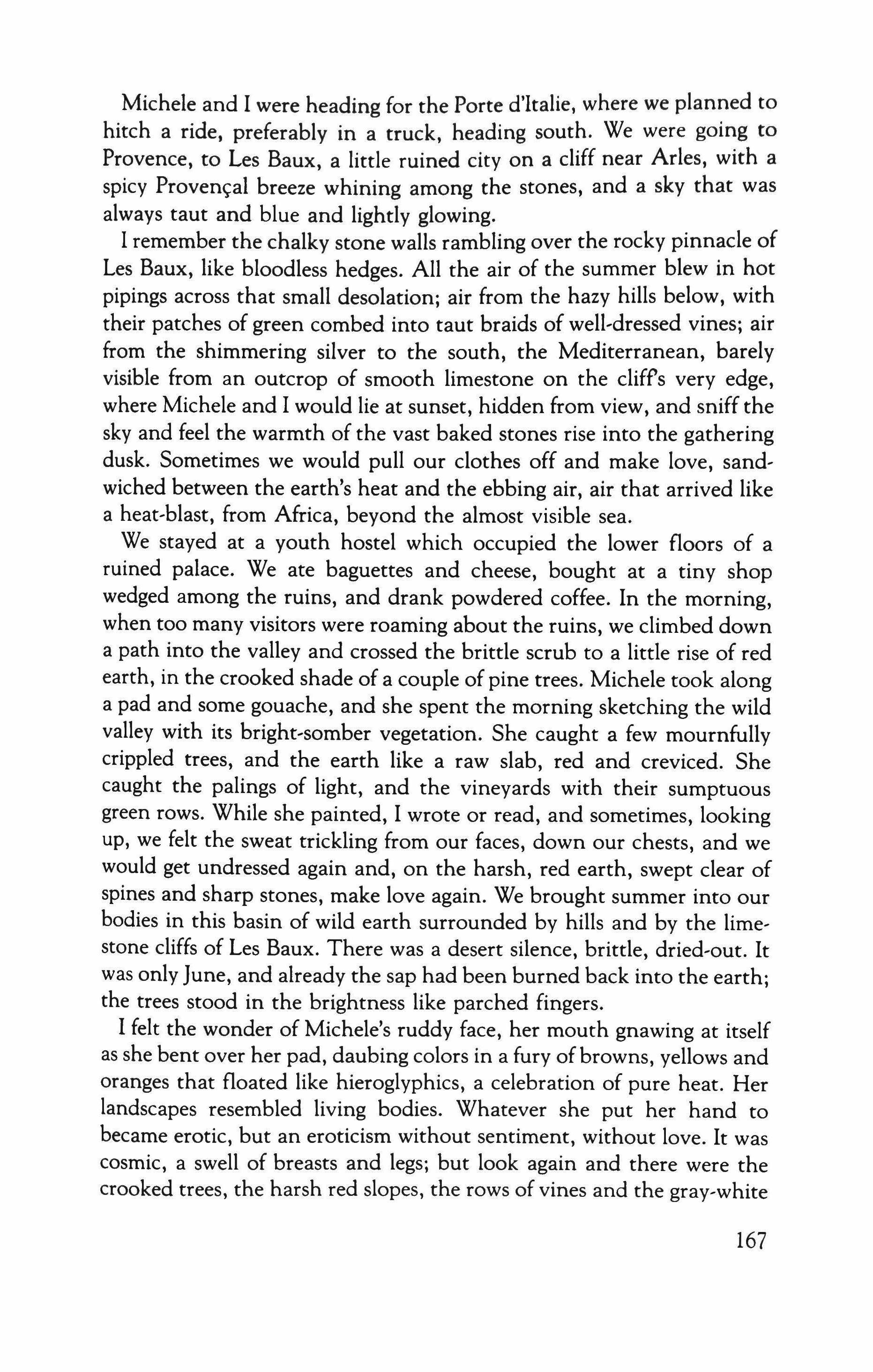
Michele and I were heading for the Porte d'ltalie, where we planned to hitch a ride, preferably in a truck, heading south. We were going to Provence, to Les Baux, a little ruined city on a cliff near Aries, with a spicy Provencal breeze whining among the stones, and a sky that was always taut and blue and lightly glowing.
I remember the chalky stone walls rambling over the rocky pinnacle of Les Baux, like bloodless hedges. All the air of the summer blew in hot pipings across that small desolation; air from the hazy hills below, with their patches of green combed into taut braids of well-dressed vines; air from the shimmering silver to the south, the Mediterranean, barely visible from an outcrop of smooth limestone on the cliffs very edge, where Michele and I would lie at sunset, hidden from view, and sniff the sky and feel the warmth of the vast baked stones rise into the gathering dusk. Sometimes we would pull our clothes off and make love, sand, wiched between the earth's heat and the ebbing air, air that arrived like a heat-blast, from Africa, beyond the almost visible sea.
We stayed at a youth hostel which occupied the lower floors of a ruined palace. We ate baguettes and cheese, bought at a tiny shop wedged among the ruins, and drank powdered coffee. In the morning, when too many visitors were roaming about the ruins, we climbed down a path into the valley and crossed the brittle scrub to a little rise of red earth, in the crooked shade of a couple of pine trees. Michele took along a pad and some gouache, and she spent the morning sketching the wild valley with its bright-somber vegetation. She caught a few mournfully crippled trees, and the earth like a raw slab, red and creviced. She caught the palings of light, and the vineyards with their sumptuous green rows. While she painted, I wrote or read, and sometimes, looking up, we felt the sweat trickling from our faces, down our chests, and we would get undressed again and, on the harsh, red earth, swept clear of spines and sharp stones, make love again. We brought summer into our bodies in this basin of wild earth surrounded by hills and by the lime, stone cliffs of Les Baux. There was a desert silence, brittle, dried-out, It was only June, and already the sap had been burned back into the earth; the trees stood in the brightness like parched fingers.
I felt the wonder of Michele's ruddy face, her mouth gnawing at itself as she bent over her pad, daubing colors in a fury ofbrowns, yellows and oranges that floated like hieroglyphics, a celebration of pure heat. Her landscapes resembled living bodies. Whatever she put her hand to became erotic, but an eroticism without sentiment, without love. It was cosmic, a swell of breasts and legs; but look again and there were the crooked trees, the harsh red slopes, the rows of vines and the gray,white
167
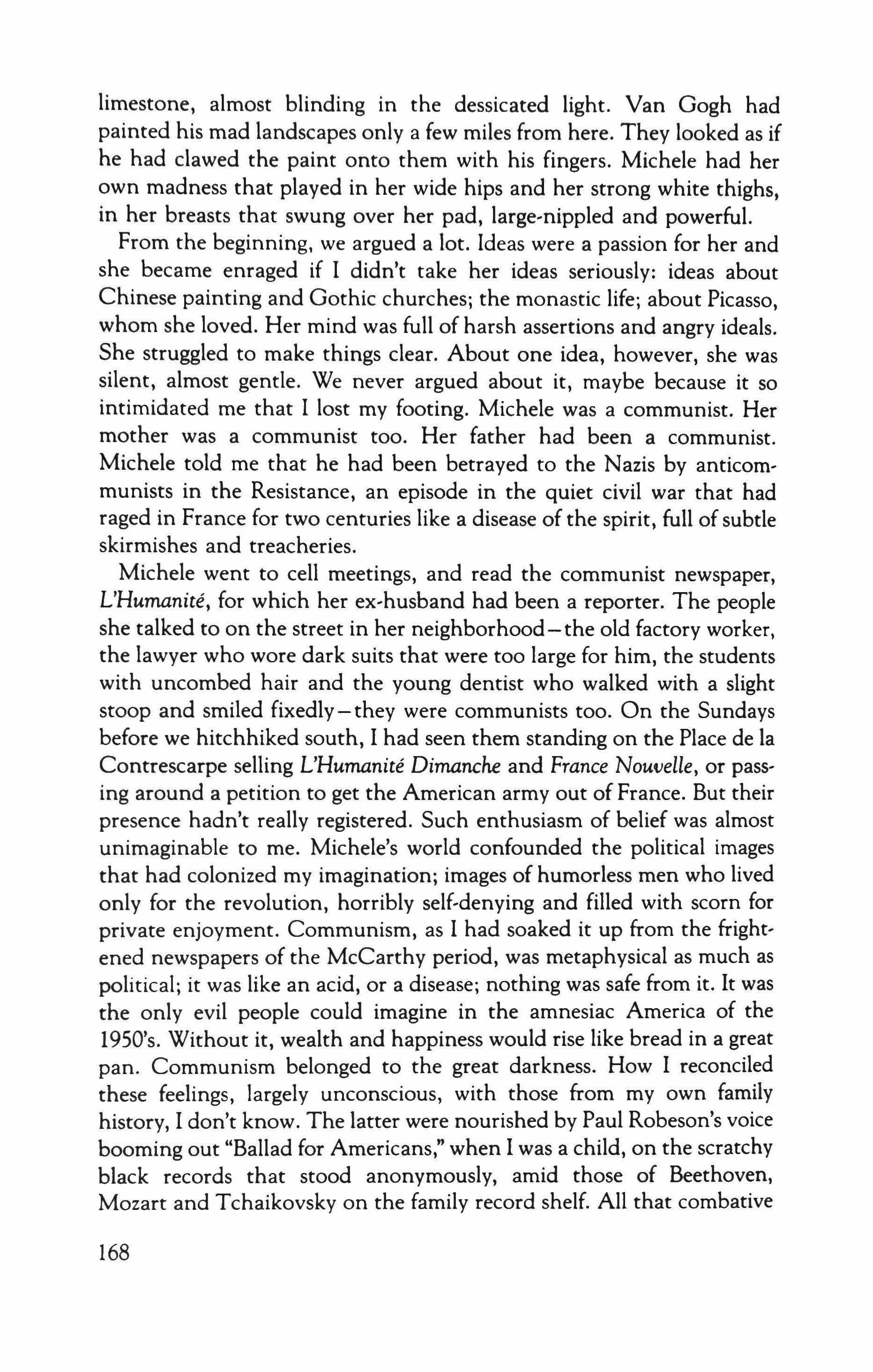
limestone, almost blinding in the dessicated light. Van Gogh had painted his mad landscapes only a few miles from here. They looked as if he had clawed the paint onto them with his fingers. Michele had her own madness that played in her wide hips and her strong white thighs, in her breasts that swung over her pad, large-nippled and powerful. From the beginning, we argued a lot. Ideas were a passion for her and she became enraged if I didn't take her ideas seriously: ideas about Chinese painting and Gothic churches; the monastic life; about Picasso, whom she loved. Her mind was full of harsh assertions and angry ideals. She struggled to make things clear. About one idea, however, she was silent, almost gentle. We never argued about it, maybe because it so intimidated me that I lost my footing. Michele was a communist. Her mother was a communist too. Her father had been a communist. Michele told me that he had been betrayed to the Nazis by anticomrnunists in the Resistance, an episode in the quiet civil war that had raged in France for two centuries like a disease of the spirit, full of subtle skirmishes and treacheries.
Michele went to cell meetings, and read the communist newspaper, L'Humanite, for which her ex-husband had been a reporter. The people she talked to on the street in her neighborhood-the old factory worker, the lawyer who wore dark suits that were too large for him, the students with uncombed hair and the young dentist who walked with a slight stoop and smiled fixedly - they were communists too. On the Sundays before we hitchhiked south, I had seen them standing on the Place de la Contrescarpe selling L'Humanite Dimanche and France Nouvelle, or passing around a petition to get the American army out of France. But their presence hadn't really registered. Such enthusiasm of belief was almost unimaginable to me. Michele's world confounded the political images that had colonized my imagination; images of humorless men who lived only for the revolution, horribly self-denying and filled with scorn for private enjoyment. Communism, as I had soaked it up from the frightened newspapers of the McCarthy period, was metaphysical as much as political; it was like an acid, or a disease; nothing was safe from it. It was the only evil people could imagine in the amnesiac America of the 1950's. Without it, wealth and happiness would rise like bread in a great pan. Communism belonged to the great darkness. How I reconciled these feelings, largely unconscious, with those from my own family history, I don't know. The latter were nourished by Paul Robeson's voice booming out "Ballad for Americans," when I was a child, on the scratchy black records that stood anonymously, amid those of Beethoven, Mozart and Tchaikovsky on the family record shelf. All that combative
168
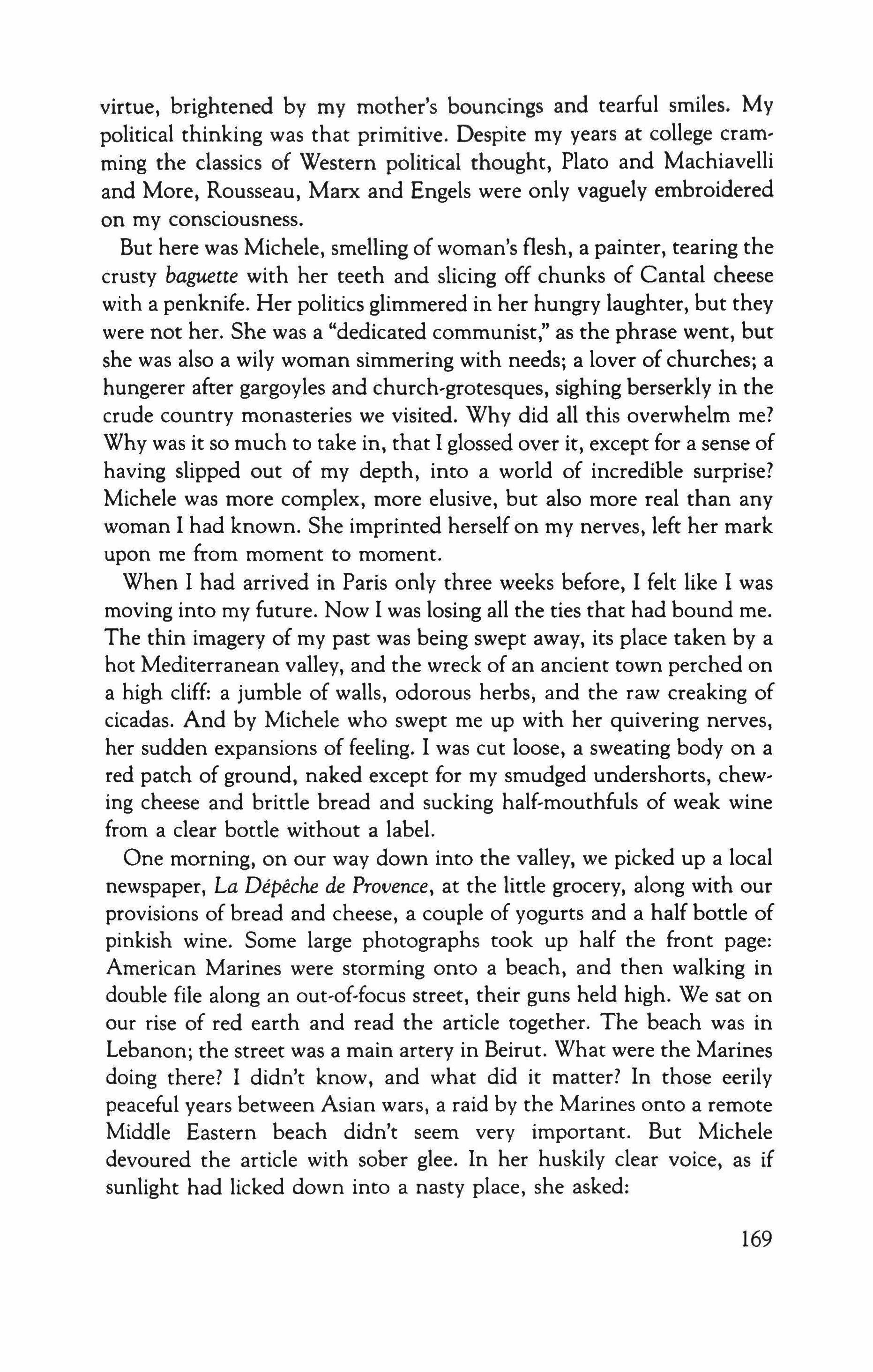
virtue, brightened by my mother's bouncings and tearful smiles. My political thinking was that primitive. Despite my years at college cramming the classics of Western political thought, Plato and Machiavelli and More, Rousseau, Marx and Engels were only vaguely embroidered on my consciousness.
But here was Michele, smelling of woman's flesh, a painter, tearing the crusty baguette with her teeth and slicing off chunks of Cantal cheese with a penknife. Her politics glimmered in her hungry laughter, but they were not her. She was a "dedicated communist," as the phrase went, but she was also a wily woman simmering with needs; a lover of churches; a hungerer after gargoyles and church-grotesques, sighing berserkly in the crude country monasteries we visited. Why did all this overwhelm me? Why was it so much to take in, that I glossed over it, except for a sense of having slipped out of my depth, into a world of incredible surprise? Michele was more complex, more elusive, but also more real than any woman I had known. She imprinted herself on my nerves, left her mark upon me from moment to moment.
When I had arrived in Paris only three weeks before, I felt like I was moving into my future. Now I was losing all the ties that had bound me. The thin imagery of my past was being swept away, its place taken by a hot Mediterranean valley, and the wreck of an ancient town perched on a high cliff: a jumble of walls, odorous herbs, and the raw creaking of cicadas. And by Michele who swept me up with her quivering nerves, her sudden expansions of feeling. I was cut loose, a sweating body on a red patch of ground, naked except for my smudged undershorts, chewing cheese and brittle bread and sucking half-mouthfuls of weak wine from a clear bottle without a label.
One morning, on our way down into the valley, we picked up a local newspaper, La Depeche de Provence, at the little grocery, along with our provisions of bread and cheese, a couple of yogurts and a half bottle of pinkish wine. Some large photographs took up half the front page: American Marines were storming onto a beach, and then walking in double file along an out-of-focus street, their guns held high. We sat on our rise of red earth and read the article together. The beach was in Lebanon; the street was a main artery in Beirut. What were the Marines doing there? I didn't know, and what did it matter? In those eerily peaceful years between Asian wars, a raid by the Marines onto a remote Middle Eastern beach didn't seem very important. But Michele devoured the article with sober glee. In her huskily clear voice, as if sunlight had licked down into a nasty place, she asked:
169
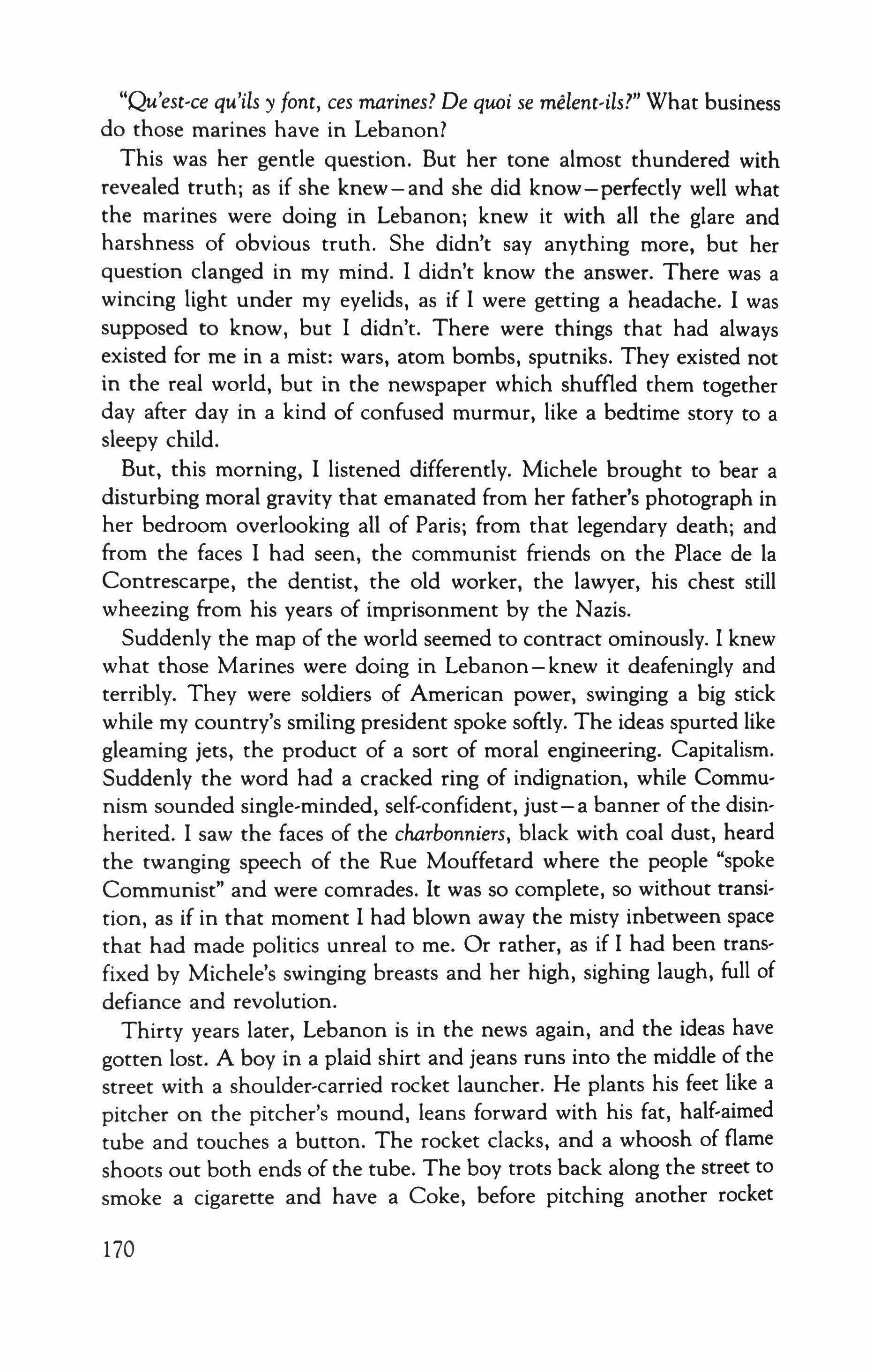
"Qu'est-ce qu'ils y font, ces marines? De quoi se melent-ils?" What business do those marines have in Lebanon?
This was her gentle question. But her tone almost thundered with revealed truth; as if she knew-and she did know-perfectly well what the marines were doing in Lebanon; knew it with all the glare and harshness of obvious truth. She didn't say anything more, but her question clanged in my mind. I didn't know the answer. There was a wincing light under my eyelids, as if I were getting a headache. I was supposed to know, but I didn't. There were things that had always existed for me in a mist: wars, atom bombs, sputniks. They existed not in the real world, but in the newspaper which shuffled them together day after day in a kind of confused murmur, like a bedtime story to a sleepy child.
But, this morning, I listened differently. Michele brought to bear a disturbing moral gravity that emanated from her father's photograph in her bedroom overlooking all of Paris; from that legendary death; and from the faces I had seen, the communist friends on the Place de la Contrescarpe, the dentist, the old worker, the lawyer, his chest still wheezing from his years of imprisonment by the Nazis.
Suddenly the map of the world seemed to contract ominously. I knew what those Marines were doing in Lebanon-knew it deafeningly and terribly. They were soldiers of American power, swinging a big stick while my country's smiling president spoke softly. The ideas spurted like gleaming jets, the product of a sort of moral engineering. Capitalism. Suddenly the word had a cracked ring of indignation, while Communism sounded single-minded, self-confident, just-a banner of the disinherited. I saw the faces of the charbonniers, black with coal dust, heard the twanging speech of the Rue Mouffetard where the people "spoke Communist" and were comrades. It was so complete, so without transition, as if in that moment I had blown away the misty inbetween space that had made politics unreal to me. Or rather, as if I had been transfixed by Michele's swinging breasts and her high, sighing laugh, full of defiance and revolution.
Thirty years later, Lebanon is in the news again, and the ideas have gotten lost. A boy in a plaid shirt and jeans runs into the middle of the street with a shoulder-carried rocket launcher. He plants his feet like a pitcher on the pitcher's mound, leans forward with his fat, half-aimed tube and touches a button. The rocket clacks, and a whoosh of flame shoots out both ends of the tube. The boy trots back along the street to smoke a cigarette and have a Coke, before pitching another rocket
170

down the wrecked, empty street, into a building almost out of sight, with its furniture exposed like guts, behind its gashed walls.
Michele was squeezing tubes of gouache onto the grainy cardboard she used as a palette. She wore a thin, pink blouse, with rings of damp under her arms, and a pair of red shorts. Her legs were shapely but strong, almost fleshy. I sat against a scaly pine trunk, the newspaper halfcrumpled between my legs, feeling all the power of the staggering perspective that had burst upon me. All at once, I was only half an American. There had been a cleansing, an elimination, and now I had no home, unless this glaring valley was my home; or Michele-whose angry concentration had already forgotten me, as she daubed and brushed at her white pad of paper-was my home. Or the gray city we had walked through at dawn a few days ago, the cocky workers tipping up glasses of white wine under the speckled neon of cheap cafes, the communists, whom I saw now as moral warriors with their faces that understood the students and the factory workers, the stooped-over young dentist, and the Savonarola profile of the lawyer who seemed to see everything through eyes that were reticent but inexorable in judgment.
We left Les Baux a few days later and hitchhiked across the bristling hills of upper Provence. I was going on to Italy. Michele would head north to the Alps to spend a month at a hotel her mother had started up in the family's ancestral house in a small resort town near Geneva. In August, I would come north to meet her there and we would return to Paris together. Already neither of us was looking back. Yet Michele seemed angry when we got down from a rattling truck full of Cavaillon melons. I think she wondered if she would ever see me again or if I was simply another vagabond American fleeing south. Michele was like that: passionate and impulsive, but with residues of distrust that could make her icy and frightened, and then her rages would hit me like a freezing rain.
We were embarrassed to kiss on the roadside next to the hurtling cars and motorcycles. As I watched Michele trudge around a looping road onto the Lyons highway, I felt a mysterious weight of repudiation. I would keep on toward Nice, and then Italy. But I wasn't flying south. Between Michele and me was something harsh, almost unpleasant, a fascination, a darkness of feeling. She was going to have more of me than she knew. As Michele disappeared down the hill shimmering with heat, I knew that a part of me would be marking time until we met again, at the place she had circled for me on the map, in a green crease running south toward a roadless mass of brown-the high Alps of Savoie.
171
Reviews
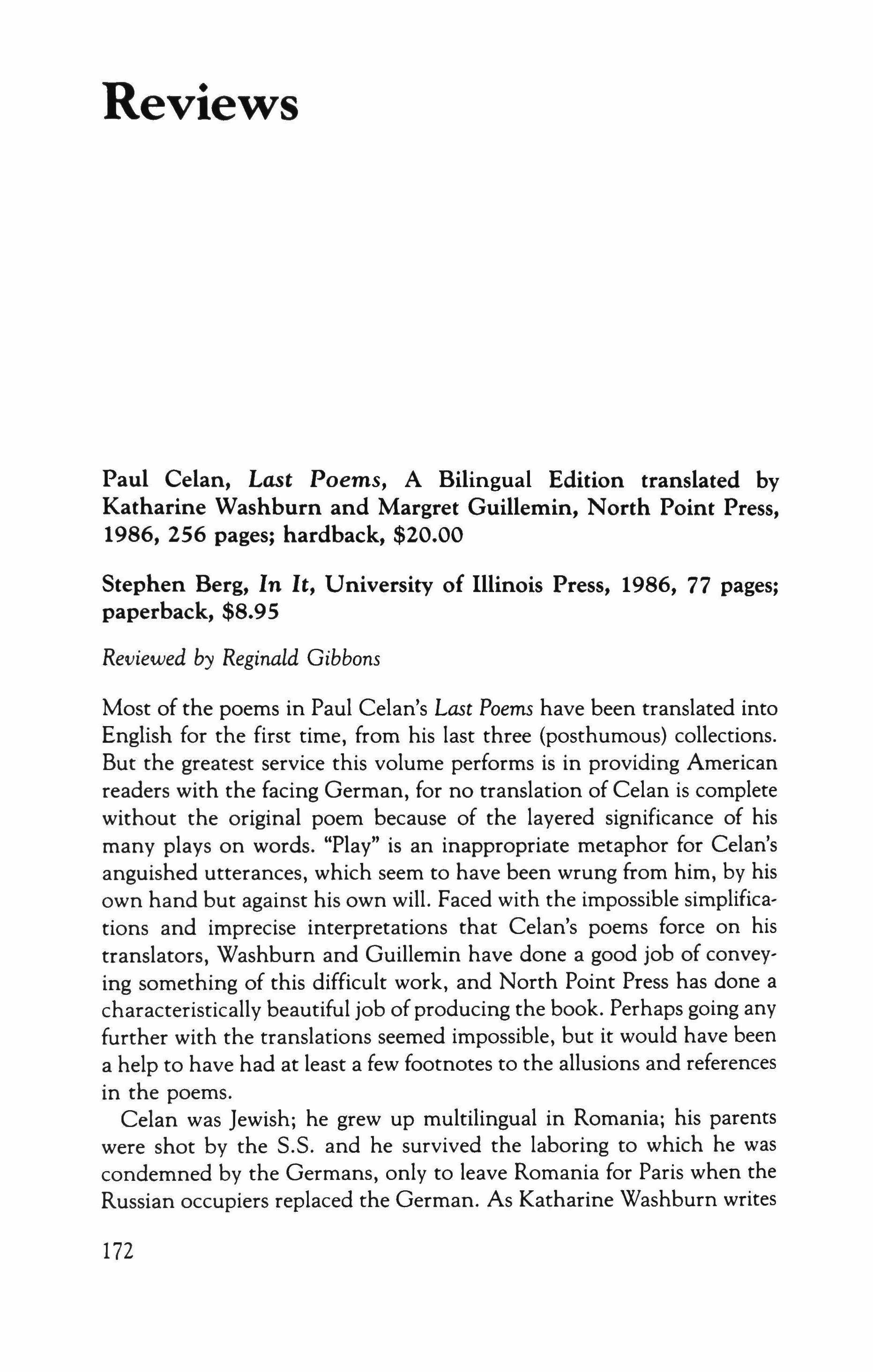
Paul Celan, Last Poems, A Bilingual Edition translated by Katharine Washburn and Margret Guillemin, North Point Press, 1986, 256 pages; hardback, $20.00
Stephen Berg, In It, University of Illinois Press, 1986, 77 pages; paperback, $8.95
Reviewed by Reginald Gibbons
Most of the poems in Paul Celan's Last Poems have been translated into English for the first time, from his last three (posthumous) collections. But the greatest service this volume performs is in providing American readers with the facing German, for no translation of Celan is complete without the original poem because of the layered significance of his many plays on words. "Play" is an inappropriate metaphor for Celan's anguished utterances, which seem to have been wrung from him, by his own hand but against his own will. Faced with the impossible simplifications and imprecise interpretations that Celan's poems force on his translators, Washburn and Guillemin have done a good job of conveying something of this difficult work, and North Point Press has done a characteristically beautiful job of producing the book. Perhaps going any further with the translations seemed impossible, but it would have been a help to have had at least a few footnotes to the allusions and references in the poems.
Celan was Jewish; he grew up multilingual in Romania; his parents were shot by the S.S. and he survived the laboring to which he was condemned by the Germans, only to leave Romania for Paris when the Russian occupiers replaced the German. As Katharine Washburn writes
172
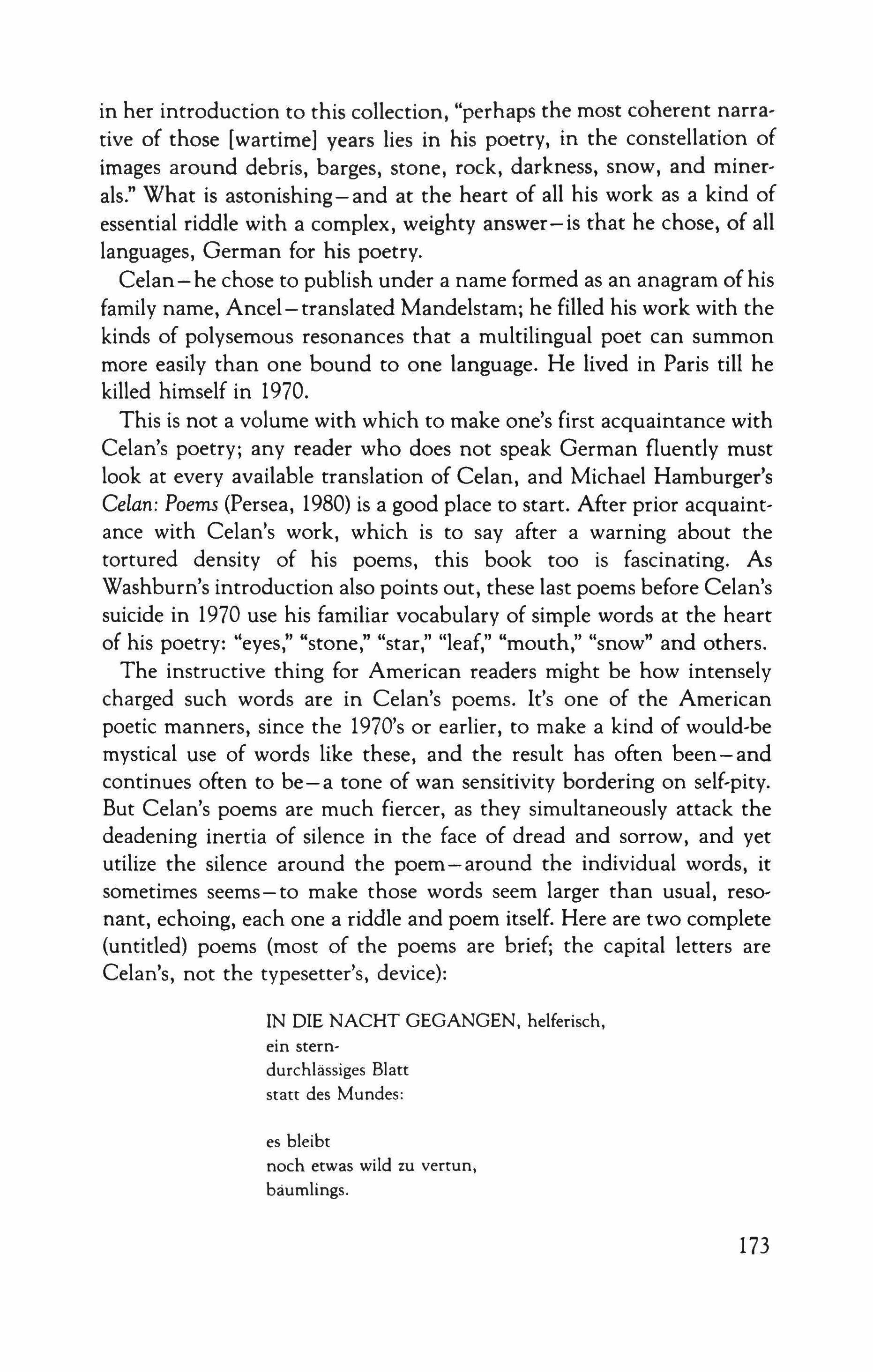
in her introduction to this collection, "perhaps the most coherent narrative of those [wartime] years lies in his poetry, in the constellation of images around debris, barges, stone, rock, darkness, snow, and miner' als." What is astonishing-and at the heart of all his work as a kind of essential riddle with a complex, weighty answer-is that he chose, of all languages, German for his poetry.
Celan - he chose to publish under a name formed as an anagram of his family name, Ancel-translated Mandelstam; he filled his work with the kinds of polysemous resonances that a multilingual poet can summon more easily than one bound to one language. He lived in Paris till he killed himself in 1970.
This is not a volume with which to make one's first acquaintance with Celan's poetry; any reader who does not speak German fluently must look at every available translation of Celan, and Michael Hamburger's Celan: Poems (Persea, 1980) is a good place to start. After prior acquaint, ance with Celan's work, which is to say after a warning about the tortured density of his poems, this book too is fascinating. As Washburn's introduction also points out, these last poems before Celan's suicide in 1970 use his familiar vocabulary of simple words at the heart of his poetry: "eyes," "stone," "star," "leaf," "mouth," "snow" and others.
The instructive thing for American readers might be how intensely charged such words are in Celan's poems. It's one of the American poetic manners, since the 1970's or earlier, to make a kind of would-be mystical use of words like these, and the result has often been - and continues often to be-a tone of wan sensitivity bordering on self-pity. But Celan's poems are much fiercer, as they simultaneously attack the deadening inertia of silence in the face of dread and sorrow, and yet utilize the silence around the poem - around the individual words, it sometimes seems-to make those words seem larger than usual, resonant, echoing, each one a riddle and poem itself. Here are two complete (untitled) poems (most of the poems are brief; the capital letters are Celan's, not the typesetter's, device):
IN DIE NACHT GEGANGEN. helferisch, ein sterndurchlassiges Blatt starr des Mundes:
es bleibt noch etwas wild zu vertun, baumlings.
173

GONE INW THE NIGHT, complicit, a starporous leaf for a mouth: something remains for wild wasting, treeward.
WURFSCHEIBE, mit Vorgesichten besternt, wurf dich aus dir hinaus.
DISCUS, starred with premonitions, throw yourself out of yourself.
These poems are never likely to have many readers in America. They are not joyful, nor erotic, nor often textured with either the reality of the physical world or that of social relations or politics; they are therefore not very "accessible." They are a kind of residue-hard, blackened perhaps, or sometimes ash-white, or as brilliant as gemstones. They offer not a revelation of their meaning but rather a containment of it-as if protecting it. And in some sense such poems do make a protective gesture over the irreducible residue of spirit and memory that can be seen in a refusal to speak, and in an insistence on speaking only enough, only just so, only a certain difficult way-while the language of daily life (including not only casualness of speech but also deceit of all sorts) rushes onward in a tide of noise and printed paper.
But there is no mystification or false depth here; the poems have a convincing authority, perhaps of the kind partly validated by the author's suicide. (Read Theodore Weiss's poem, on someone else, called "The Last Letters.") They are a kind of tonic - a bitter refreshment of language, even in translation.
In the collection before In It-entitled With Akhmatova at the Black Gates (University of Illinois Press, 1981)-Stephen Berg essayed an artful ventriloquism that was not translation and not Robert Lowell's sort of "imitation," but a writing of a poem in English based on a poem in 174
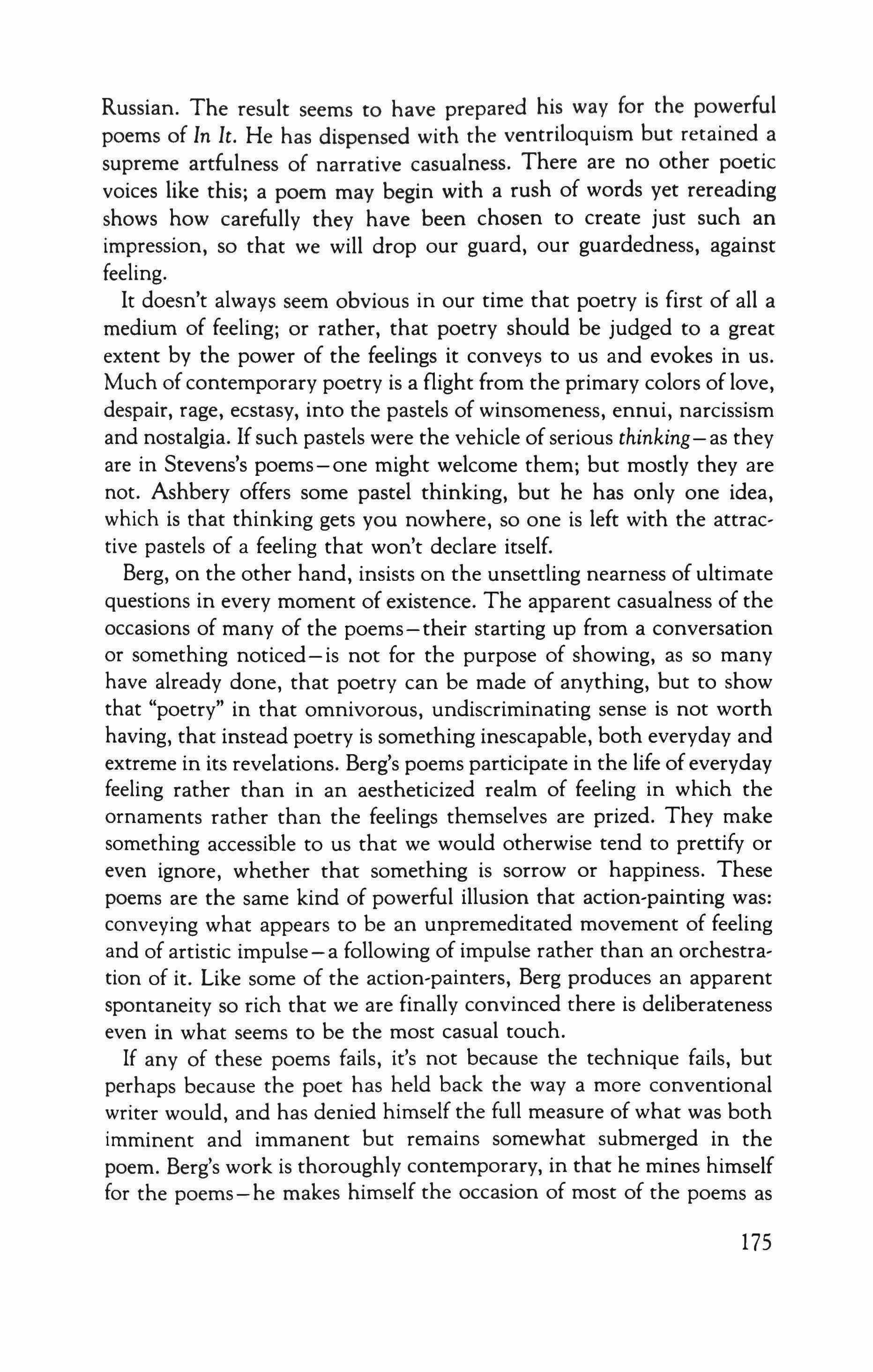
Russian. The result seems to have prepared his way for the powerful poems of In It. He has dispensed with the ventriloquism but retained a supreme artfulness of narrative casualness. There are no other poetic voices like this; a poem may begin with a rush of words yet rereading shows how carefully they have been chosen to create just such an impression, so that we will drop our guard, our guardedness, against feeling.
It doesn't always seem obvious in our time that poetry is first of all a medium of feeling; or rather, that poetry should be judged to a great extent by the power of the feelings it conveys to us and evokes in us. Much of contemporary poetry is a flight from the primary colors of love, despair, rage, ecstasy, into the pastels of winsomeness, ennui, narcissism and nostalgia. If such pastels were the vehicle of serious thinking - as they are in Stevens's poems - one might welcome them; but mostly they are not. Ashbery offers some pastel thinking, but he has only one idea, which is that thinking gets you nowhere, so one is left with the attractive pastels of a feeling that won't declare itself.
Berg, on the other hand, insists on the unsettling nearness of ultimate questions in every moment of existence. The apparent casualness of the occasions of many of the poems-their starting up from a conversation or something noticed - is not for the purpose of showing, as so many have already done, that poetry can be made of anything, but to show that "poetry" in that omnivorous, undiscriminating sense is not worth having, that instead poetry is something inescapable, both everyday and extreme in its revelations. Berg's poems participate in the life ofeveryday feeling rather than in an aestheticized realm of feeling in which the ornaments rather than the feelings themselves are prized. They make something accessible to us that we would otherwise tend to prettify or even ignore, whether that something is sorrow or happiness. These poems are the same kind of powerful illusion that action-painting was: conveying what appears to be an unpremeditated movement of feeling and of artistic impulse - a following of impulse rather than an orchestra, tion of it. Like some of the action-painters, Berg produces an apparent spontaneity so rich that we are finally convinced there is deliberateness even in what seems to be the most casual touch.
If any of these poems fails, it's not because the technique fails, but perhaps because the poet has held back the way a more conventional writer would, and has denied himself the full measure of what was both imminent and immanent but remains somewhat submerged in the poem. Berg's work is thoroughly contemporary, in that he mines himself for the poems - he makes himself the occasion of most of the poems as
175
well as the subject of them. But his poems stand against a great deal of contemporary poetry in their blunt, even aggressive insistence that this self-mining should be done up in the light, where everyone can see itnot to prove the sensitivity of the poet but to get hold of the harrowing, inescapable conditions and feelings that all the rest of that selfregardingly sensitive poetry actually is afraid to face. He insists on naming and describing ugliness both physical and spiritual. He would exorcise the ugly, and celebrate the beautiful unashamedly.
Not to everyone's taste, then; or rather, not for those who apply the category of judgment we call "taste" to poetry at all. It would be no risk to prophesy that critics whose judgment is predicated on "taste," in fact, will dislike this book. They will only reveal their own limitations in saying so. In It contains extraordinary poems, especially "Visiting the Stone," "After a Death," "The Visit" (these are companion pieces of a sort, drawing a cry out of visits to father's grave and mother's apartment), "In Blue Light," "Insomnia," "And the Scream" {"Nobody would call this poetry," Berg writes in that one}, "Riding Back," "On a Page," "From the Bridge" and a number of others. They reinforce and steady each other to produce a collection that's a single piece of work, painful, memorable and courageous.
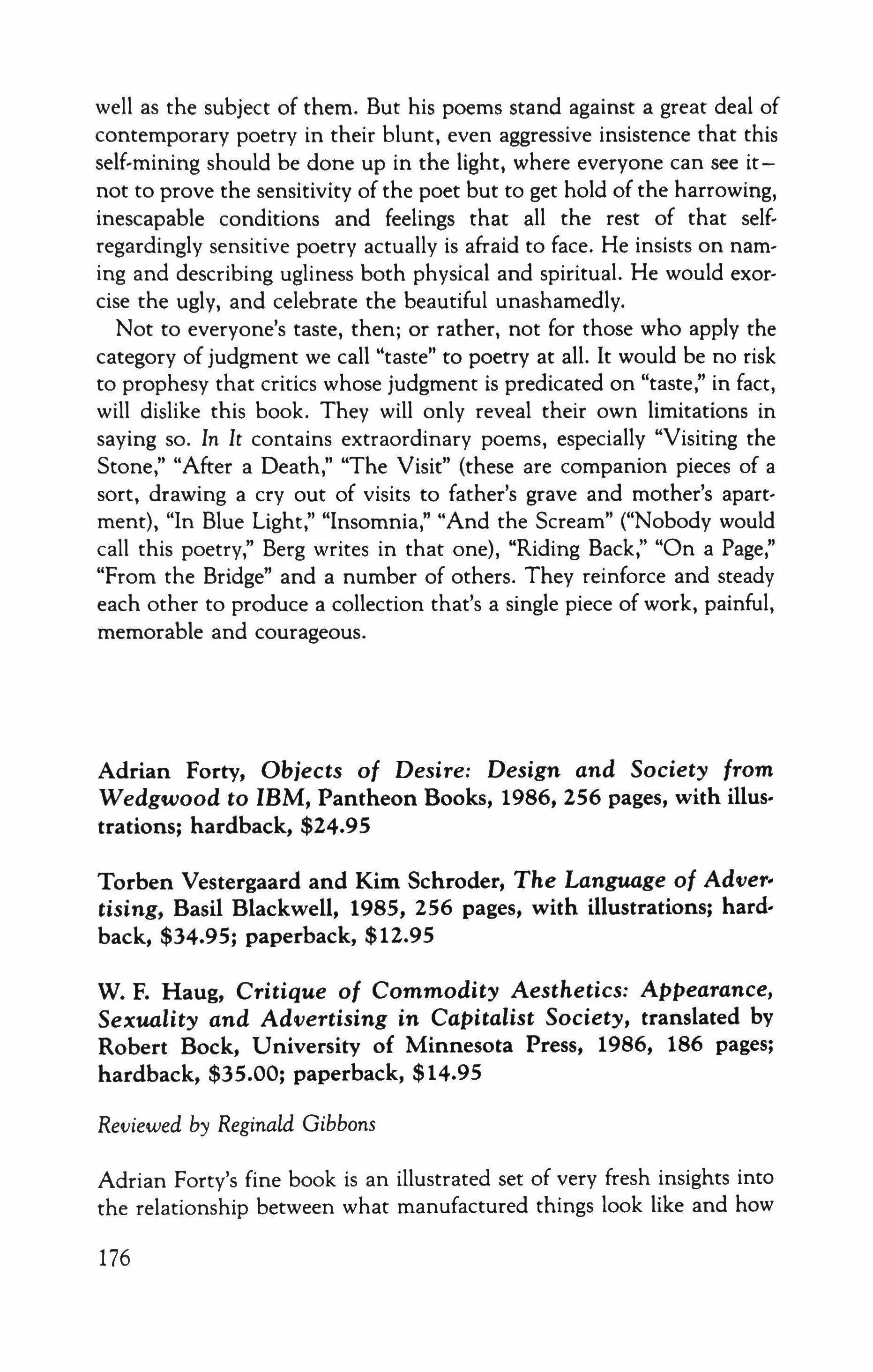
Adrian Forty, Objects of Desire: Design and Society from Wedgwood to IBM, Pantheon Books, 1986, 256 pages, with illustrations; hardback, $24.95
Torben Vestergaard and Kim Schroder, The Language of Advertising, Basil Blackwell, 1985, 256 pages, with illustrations; hardback, $34.95; paperback, $12.95
W. F. Haug, Critique of Commodity Aesthetics: Appearance, Sexuality and Advertising in Capitalist Society, translated bv Robert Bock, University of Minnesota Press, 1986, 186 pages; hardback, $35.00; paperback, $14.95
Reviewed by Reginald Gibbons
Adrian Forty's fine book is an illustrated set of very fresh insights into the relationship between what manufactured things look like and how
176
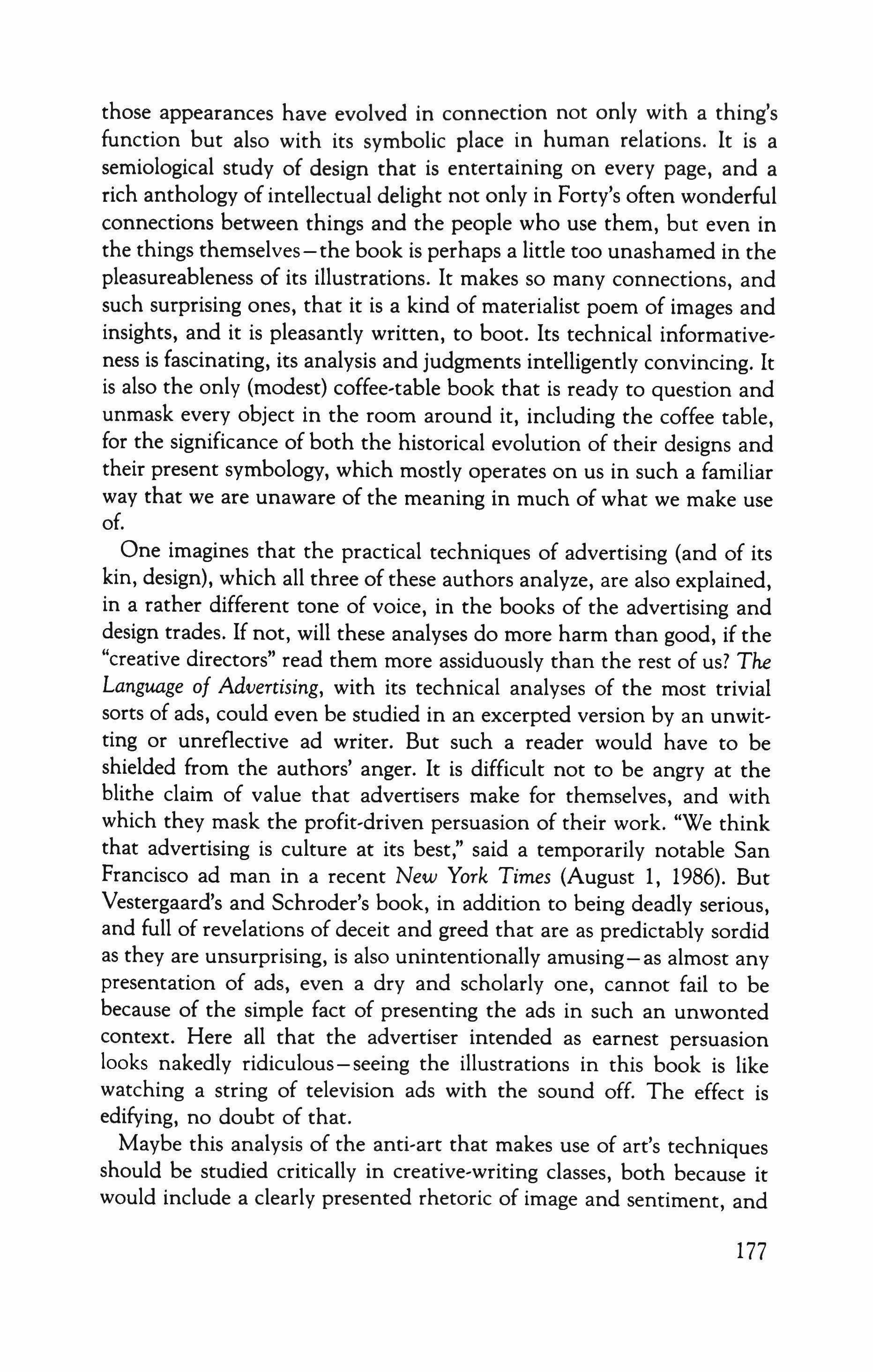
those appearances have evolved in connection not only with a thing's function but also with its symbolic place in human relations. It is a semiological study of design that is entertaining on every page, and a rich anthology of intellectual delight not only in Forty's often wonderful connections between things and the people who use them, but even in the things themselves-the book is perhaps a little too unashamed in the pleasureableness of its illustrations. It makes so many connections, and such surprising ones, that it is a kind of materialist poem of images and insights, and it is pleasantly written, to boot. Its technical informativeness is fascinating, its analysis and judgments intelligently convincing. It is also the only (modest) coffee-table book that is ready to question and unmask every object in the room around it, including the coffee table, for the significance of both the historical evolution of their designs and their present symbology, which mostly operates on us in such a familiar way that we are unaware of the meaning in much of what we make use of.
One imagines that the practical techniques of advertising (and of its kin, design), which all three of these authors analyze, are also explained, in a rather different tone of voice, in the books of the advertising and design trades. If not, will these analyses do more harm than good, if the "creative directors" read them more assiduously than the rest of us? The Language of Advertising, with its technical analyses of the most trivial sorts of ads, could even be studied in an excerpted version by an unwitting or unreflective ad writer. But such a reader would have to be shielded from the authors' anger. It is difficult not to be angry at the blithe claim of value that advertisers make for themselves, and with which they mask the profit-driven persuasion of their work. "We think that advertising is culture at its best," said a temporarily notable San Francisco ad man in a recent New York Times (August 1, 1986). But Vestergaard's and Schroder's book, in addition to being deadly serious, and full of revelations of deceit and greed that are as predictably sordid as they are unsurprising, is also unintentionally amusing-as almost any presentation of ads, even a dry and scholarly one, cannot fail to be because of the simple fact of presenting the ads in such an unwonted context. Here all that the advertiser intended as earnest persuasion looks nakedly ridiculous-seeing the illustrations in this book is like watching a string of television ads with the sound off. The effect is edifying, no doubt of that.
Maybe this analysis of the anti-art that makes use of art's techniques should be studied critically in creative-writing classes, both because it would include a clearly presented rhetoric of image and sentiment, and
177
thereby create useful perplexity about the nature of the artistic authority of a great written work, and because it might make young writers angrier, which would be all to the good. Ernesto Cardenal's poems, early and late, sometimes sputter the American brand names glowing in neon in Managua over the years of the hereditary dictatorship of the Somozas:
In the night illuminated by words:

PEPSI-COLA
PALMOLIVE CHRYSLER COLGATE CHESTERFIELD
In his cantos of Nicaraguan history, instead of Pound's scattered foreign words or Chinese ideograms emitting light like gems, Cardenal's shards of advertising English sputter and smoke. They seem like an impurity that he hasn't been able to keep out of the poems, despite trying. It's a particularly clear moment of the opposition between poetry and the kind of advertising that uses poetic techniques-for which in W. F. Haug's 1971 book, only recently translated into English, we can find a useful new name, almost a funny one: "commodity lyricism." But this is a gloomy book ofthe sort that we have to admit might be good for us, even if it isn't as pleasurable as Forty's or as good a text as Vestergaard's and Schroder's. The latter are thorough and roundly but justifiably critical, and Forty is both analytical and inquiring, whereas Haug is brilliant and in a foul mood. But then, all but Haug chose to include illustrations, while Haug's analysis of advertising sticks to description and quotation, so while the first two books analyze and illustrate with the benefit of theory, Haug theorizes with the benefit of citations.
The very long chapter titles of this book, like the precis-titles of the chapters of eighteenth-century English novels, are almost better than the chapters themselves and, perhaps to a reader of fiction and poetry, the titles will do well enough to suggest how complex and problematic the relationship between advertising and imaginative writing has been and will always be, with critics as bitter as political prisoners or jilted lovers, and apologists and even writer-practitioners apparently convinced of advertising's innocence and fun. Consider these excerpts from chapter titles: "Goebbels as a 'technician of trademarks,' "shop-lifting as the individual's reversal of promotional gifts," "solution to the 1967 crisis in menswear: cowards wear grey," "aesthetic abstraction, philosophical foreplay," "the penis enters the commodity arena," "the social genius of compulsory rejuvenation," 'Hush Puppies' and the spread of the fashionable dog," and finally, "the commodity poetry of advertising vs the
178
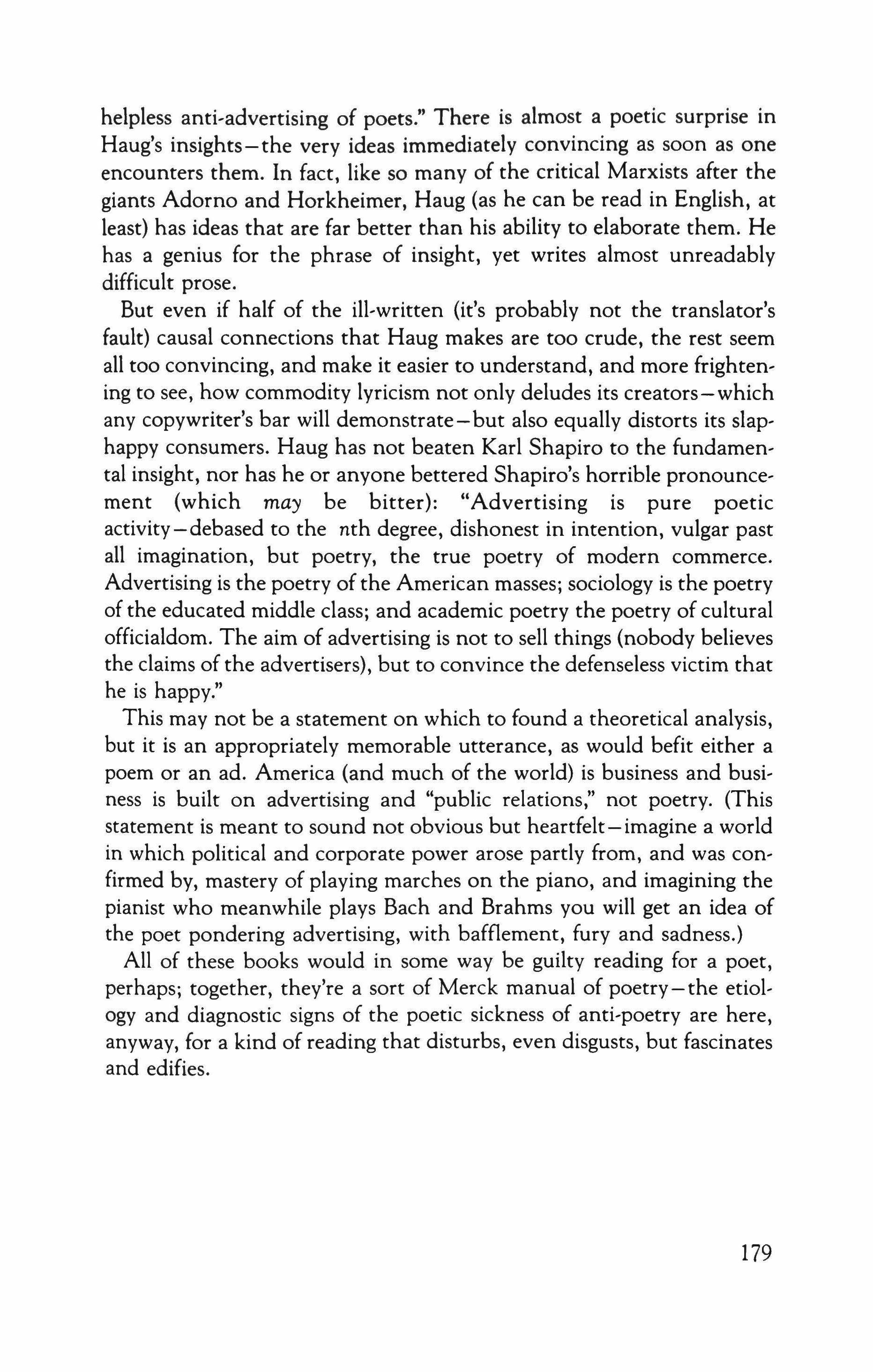
helpless anti-advertising of poets." There is almost a poetic surprise in Haug's insights-the very ideas immediately convincing as soon as one encounters them. In fact, like so many of the critical Marxists after the giants Adorno and Horkheimer, Haug (as he can be read in English, at least) has ideas that are far better than his ability to elaborate them. He has a genius for the phrase of insight, yet writes almost unreadably difficult prose.
But even if half of the ill,written (it's probably not the translator's fault) causal connections that Haug makes are too crude, the rest seem all too convincing, and make it easier to understand, and more frighten, ing to see, how commodity lyricism not only deludes its creators-which any copywriter's bar will demonstrate - but also equally distorts its slap, happy consumers. Haug has not beaten Karl Shapiro to the fundamental insight, nor has he or anyone bettered Shapiro's horrible pronounce, ment (which may be bitter): "Advertising is pure poetic activity-debased to the nth degree, dishonest in intention, vulgar past all imagination, but poetry, the true poetry of modern commerce. Advertising is the poetry of the American masses; sociology is the poetry of the educated middle class; and academic poetry the poetry of cultural officialdom. The aim of advertising is not to sell things (nobody believes the claims of the advertisers), but to convince the defenseless victim that he is happy."
This may not be a statement on which to found a theoretical analysis, but it is an appropriately memorable utterance, as would befit either a poem or an ad. America (and much of the world) is business and business is built on advertising and "public relations," not poetry. (This statement is meant to sound not obvious but heartfelt-imagine a world in which political and corporate power arose partly from, and was con, firmed by, mastery of playing marches on the piano, and imagining the pianist who meanwhile plays Bach and Brahms you will get an idea of the poet pondering advertising, with bafflement, fury and sadness.)
All of these books would in some way be guilty reading for a poet, perhaps; together, they're a sort of Merck manual of poetry-the etiology and diagnostic signs of the poetic sickness of anti-poetry are here, anyway, for a kind of reading that disturbs, even disgusts, but fascinates and edifies.
179
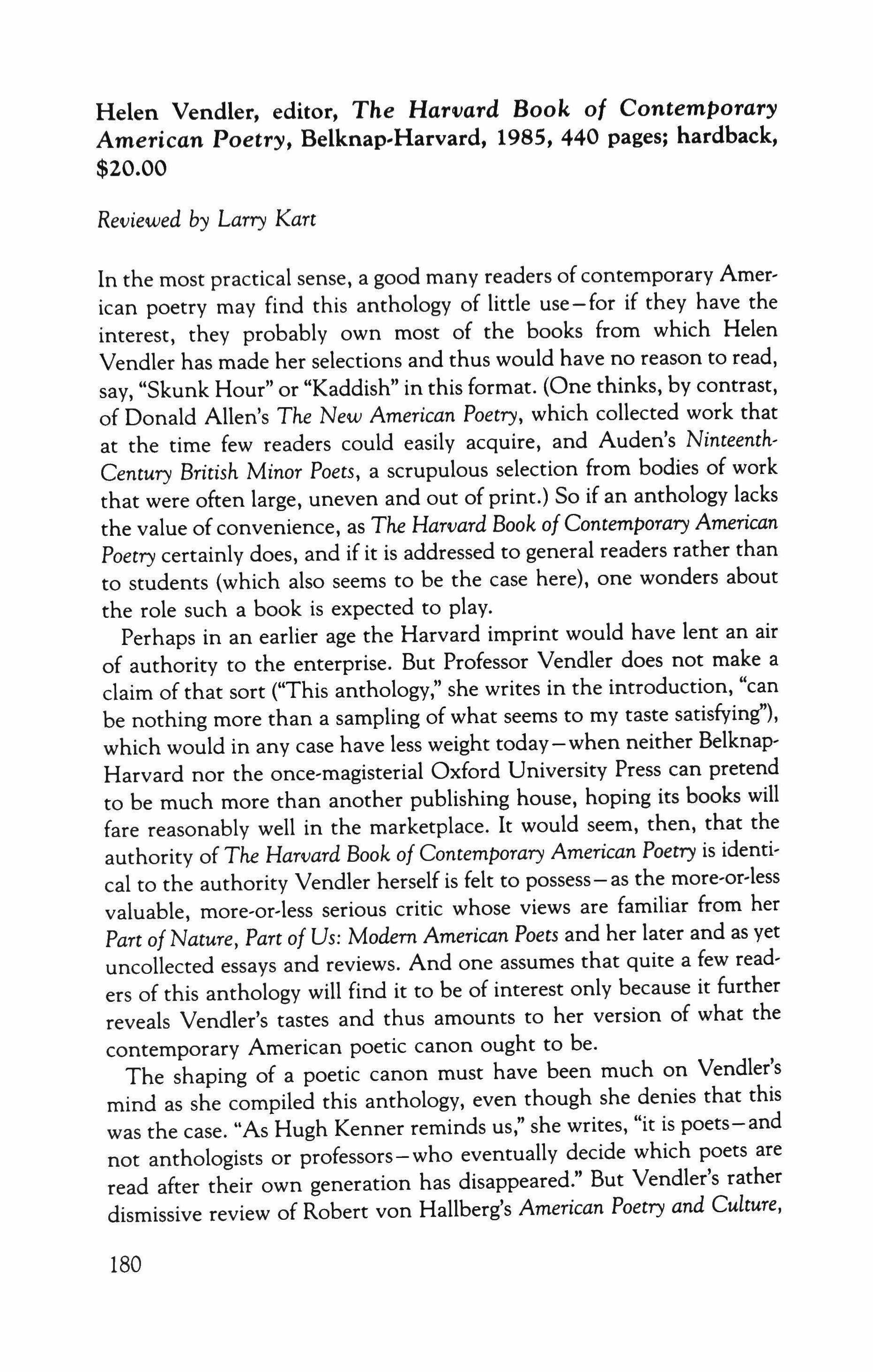
Helen Vendler, editor, The Harvard Book of Contemporary American Poetry, Belknap-Harvard, 1985, 440 pages; hardback, $20.00
Reviewed by Larry Kart
In the most practical sense, a good many readers of contemporary American poetry may find this anthology of little use-for if they have the interest, they probably own most of the books from which Helen Vendler has made her selections and thus would have no reason to read, say, "Skunk Hour" or "Kaddish" in this format. (One thinks, by contrast, of Donald Allen's The New American Poetry, which collected work that at the time few readers could easily acquire, and Auden's NinteenthCentury British Minor Poets, a scrupulous selection from bodies of work that were often large, uneven and out of print.) So if an anthology lacks the value ofconvenience, as The Harvard Book ofContemporary American Poetry certainly does, and if it is addressed to general readers rather than to students (which also seems to be the case here), one wonders about the role such a book is expected to play.
Perhaps in an earlier age the Harvard imprint would have lent an air of authority to the enterprise. But Professor Vendler does not make a claim of that sort ("This anthology," she writes in the introduction, "can be nothing more than a sampling of what seems to my taste satisfying"), which would in any case have less weight today - when neither BelknapHarvard nor the once-magisterial Oxford University Press can pretend to be much more than another publishing house, hoping its books will fare reasonably well in the marketplace. It would seem, then, that the authority of The Harvard Book of Contemporary American Poetry is identical to the authority Vendler herself is felt to possess-as the more-or-less valuable, more-or-less serious critic whose views are familiar from her Part ofNature, Part of Us: Modem American Poets and her later and as yet uncollected essays and reviews. And one assumes that quite a few readers of this anthology will find it to be of interest only because it further reveals Vendler's tastes and thus amounts to her version of what the contemporary American poetic canon ought to be.
The shaping of a poetic canon must have been much on Vendler's mind as she compiled this anthology, even though she denies that this was the case. "As Hugh Kenner reminds us," she writes, "it is poets-and not anthologists or professors-who eventually decide which poets are read after their own generation has disappeared." But Vendler's rather dismissive review of Robert von Hallberg's American Poetry and Culture,
180
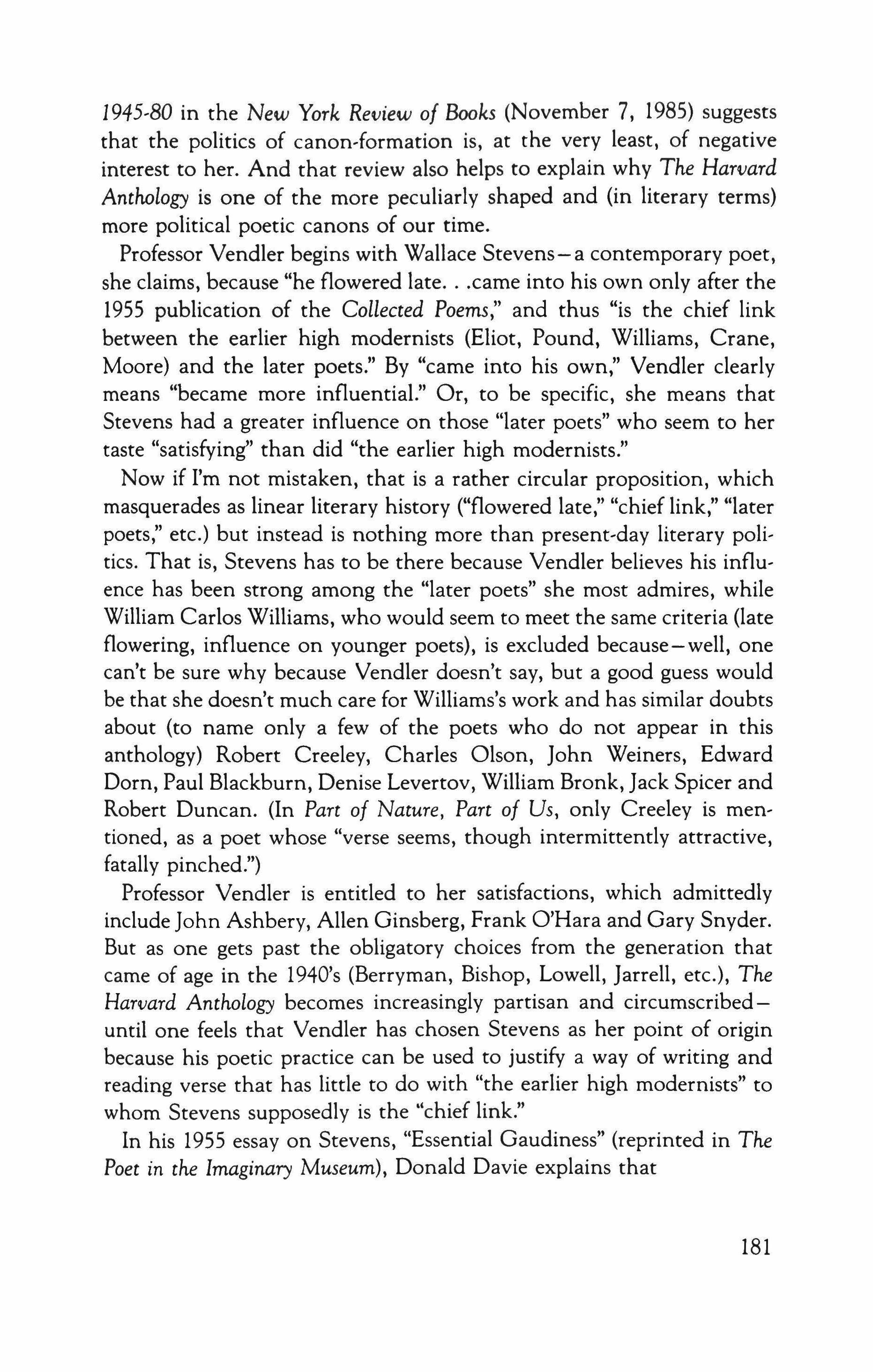
1945-80 in the New York Review of Books (November 7, 1985) suggests that the politics of canon-formation is, at the very least, of negative interest to her. And that review also helps to explain why The Harvard Anthology is one of the more peculiarly shaped and (in literary terms) more political poetic canons of our time.
Professor Vendler begins with Wallace Stevens-a contemporary poet, she claims, because "he flowered late came into his own only after the 1955 publication of the Collected Poems," and thus "is the chief link between the earlier high modernists (Eliot, Pound, Williams, Crane, Moore) and the later poets." By "came into his own," Vendler clearly means "became more influential." Or, to be specific, she means that Stevens had a greater influence on those "later poets" who seem to her taste "satisfying" than did "the earlier high modernists."
Now if I'm not mistaken, that is a rather circular proposition, which masquerades as linear literary history ("flowered late," "chief link," "later poets," etc.) but instead is nothing more than present-day literary politics. That is, Stevens has to be there because Vendler believes his influence has been strong among the "later poets" she most admires, while William Carlos Williams, who would seem to meet the same criteria (late flowering, influence on younger poets), is excluded because-well, one can't be sure why because Vendler doesn't say, but a good guess would be that she doesn't much care for Williams's work and has similar doubts about (to name only a few of the poets who do not appear in this anthology) Robert Creeley, Charles Olson, John Weiners, Edward Dorn, Paul Blackburn, Denise Levertov, William Bronk, Jack Spicer and Robert Duncan. (In Part of Nature, Part of Us, only Creeley is mentioned, as a poet whose "verse seems, though intermittently attractive, fatally pinched.")
Professor Vendler is entitled to her satisfactions, which admittedly include John Ashbery, Allen Ginsberg, Frank O'Hara and Gary Snyder. But as one gets past the obligatory choices from the generation that came of age in the 1940's (Berryman, Bishop, Lowell, Jarrell, etc.), The Harvard Anthology becomes increasingly partisan and circumscribeduntil one feels that Vendler has chosen Stevens as her point of origin because his poetic practice can be used to justify a way of writing and reading verse that has little to do with "the earlier high modernists" to whom Stevens supposedly is the "chief link."
In his 1955 essay on Stevens, "Essential Gaudiness" (reprinted in The Poet in the Imaginary Museum), Donald Davie explains that
181
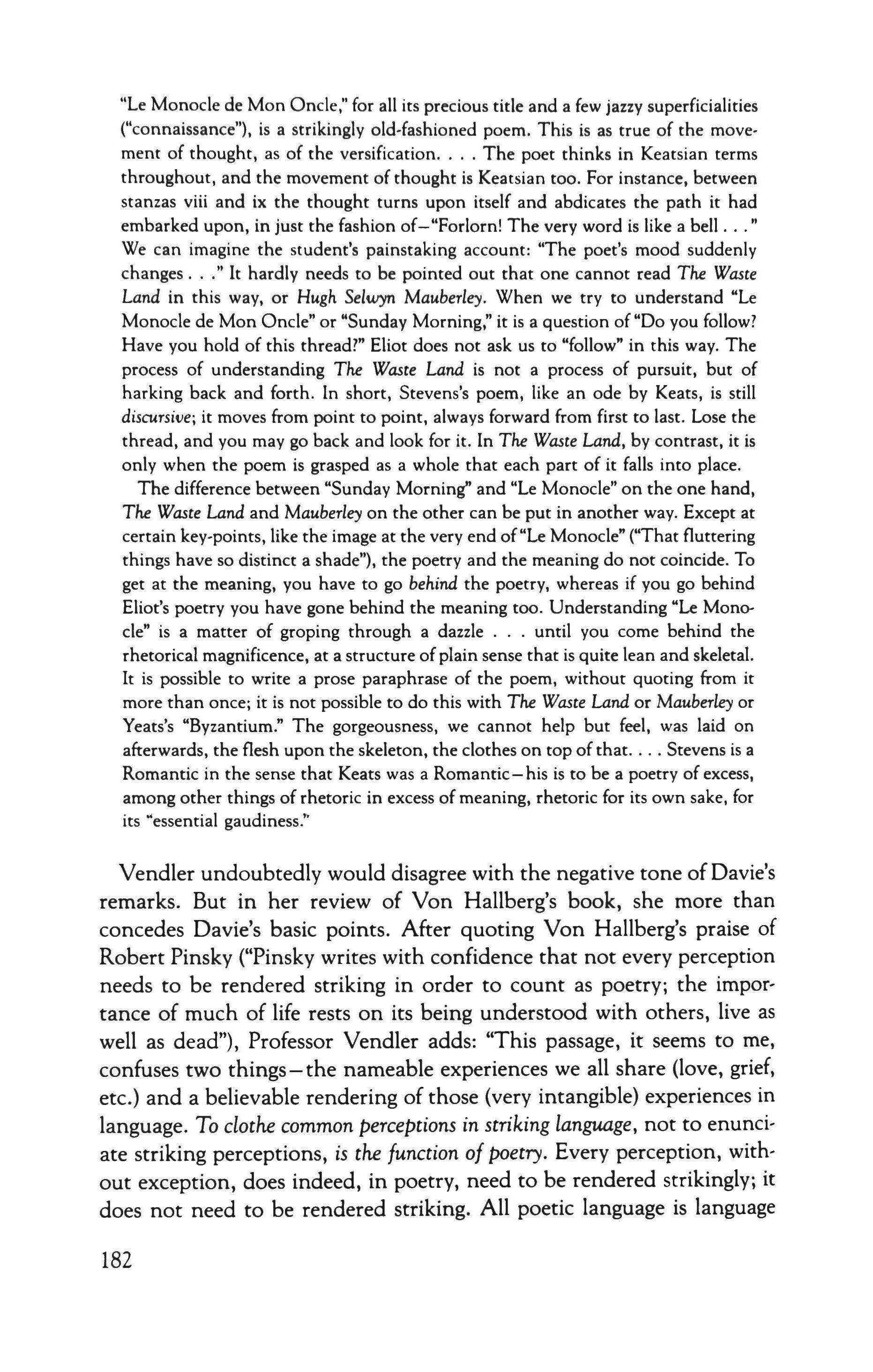
ULe Monocle de Mon Oncle," for all its precious title and a few jazzy superficialities ("connaissance"), is a strikingly old-fashioned poem. This is as true of the movement of thought, as of the versification The poet thinks in Keatsian terms throughout, and the movement of thought is Keatsian too. For instance, between stanzas viii and ix the thought turns upon itself and abdicates the path it had embarked upon, in just the fashion of-"Forlorn! The very word is like a bell We can imagine the student's painstaking account: "The poet's mood suddenly changes It hardly needs to be pointed out that one cannot read The Waste Land in this way, or Hugh Selwyn Mauberley. When we try to understand "Le Monocle de Mon Oncle" or "Sunday Morning," it is a question of "Do you follow! Have you hold of this thread!" Eliot does not ask us to "follow" in this way. The process of understanding The Waste Land is not a process of pursuit, but of harking back and forth. In short, Stevens's poem, like an ode by Keats, is still discursive; it moves from point to point, always forward from first to last. Lose the thread, and you may go back and look for it. In The Waste Land, by contrast, it is only when the poem is grasped as a whole that each part of it falls into place.
The difference between "Sunday Morning" and "Le Monocle" on the one hand, The Waste Land and Mauberley on the other can be put in another way. Except at certain kev-points.Iike the image at the very end of"Le Monocle" ("That fluttering things have so distinct a shade"), the poetry and the meaning do not coincide. To get at the meaning, you have to go behind the poetry, whereas if you go behind Eliot's poetry you have gone behind the meaning too. Understanding "Le Monocle" is a matter of groping through a dazzle until you come behind the rhetorical magnificence, at a structure ofplain sense that is quite lean and skeletal. It is possible to write a prose paraphrase of the poem, without quoting from it more than once; it is not possible to do this with The Waste Land or Mauberley or Yeats's "Byzantium." The gorgeousness, we cannot help but feel, was laid on afterwards, the flesh upon the skeleton, the clothes on top of that Stevens is a Romantic in the sense that Keats was a Romantic-his is to be a poetry of excess, among other things of rhetoric in excess of meaning, rhetoric for its own sake, for its "essential gaudiness."
Vendler undoubtedly would disagree with the negative tone of Davie's remarks. But in her review of Von Hallberg's book, she more than concedes Davie's basic points. After quoting Von Hallberg's praise of Robert Pinsky ("Pinsky writes with confidence that not every perception needs to be rendered striking in order to count as poetry; the importance of much of life rests on its being understood with others, live as well as dead"), Professor Vendler adds: "This passage, it seems to me, confuses two things - the nameable experiences we all share (love, grief, etc.) and a believable rendering of those (very intangible) experiences in language. To clothe common perceptions in striking language, not to enunciate striking perceptions, is the function of poetry. Every perception, without exception, does indeed, in poetry, need to be rendered strikingly; it does not need to be rendered striking. All poetic language is language
182

strenuously composed beyond the requirements of information, and therefore striking, perhaps most striking when most apparently 'transparent'" (italics mine).
While it might be going too far to say that Professor Vendler thinks of poetry as versified prose, her "all poetic language is language strenuously composed beyond the requirements of information" does suggest that, for her, the poetry is in the clothing. But is a common perception clothed in "striking language" still a common perception? And are there, in poetry, any limits to the "requirements of information" - since both the act and the results of strenuous composition not only are, at the very least, "news" that certain poets can do it this well and in this way, but also among the most vital kinds of information that this century's highmodern poets have given to us?
Elsewhere in her review of Von Hallberg's book, while chasing him away from James Merrill, a poet she virtually "owns," Professor Vendler appears to contradict herself. She quotes Von Hallberg's "for Merrill, energy, invention, and ornamentation-not signification-are what make poetry," and says: "But [Von Hallberg] does not suggest how signification can ever be said, in speaking of poetry, to be something different from those very qualities of energy, invention, and ornamentation. Nor does he explain where signification could be said to lie, if not in invention or energetic words which, with their musical and figural ornamentation, correspond to the state of mind in question."
As it happens, Merrill may well be a poet for whom energy, invention and, above all, ornamentation are "what make poetry," in the sense that his poems are meant to be manifest, and more or less endearing, performances-the effects of which depend in part on the tension between the poet's knowing attitude toward his far-from-transparent skills and his awareness of what it means to be perceived as one who, at all times and in all circumstances, must "cut a figure." But Vendler's acceptance of the notion of ornamentation, and her belief that it corresponds "to the state of mind in question," are resolutely pre-modern in tone, while Merrill's verse, whatever its merits, is not.
Chastising Von Hallberg for saying that Merrill is "describing a ski lift" in the lines "Prey swooped up, the iron love seat shudders/Onward into its acrophiliac trance," Vendler produces this steamily explicative effusion:
Now these two lines are not "describing a ski lift"; they describe one's feelings in committing oneself to that ski lift, a different matter entirely. One feels like Ganymede scooped up in Jovian iron talons; the seat, made for two, resembles those porch gliders or love seats made just big enough for courting; the seat (with
183

no visible machinery in it) lurches upward as though it had a reverse psychosis to acrophobia; one feels abducted. a forced participant in its mad love of heights. "I feel I have been swooped up by a bird of prey. clapped into an Iron Maiden 'love seat: and made an unwilling partner in a folie a deux" is what this passage "signifies." The "invention" and "energy" and "ornament" aTe its means of signification, and what it describes is a brief moment of panicky inner sensation, not a ski lift.
Paraphrase with a vengeance, that passage even goes so far as to further "poeticize" ("I feel I have been swooped up, etc.") Merrill's already decorative lines. But notice Vendler's claim that what those lines signify and what they describe are one and the same- "a brief moment of panicky inner sensation." One thinks ofDavie's comment on "Le Monocle de Mon Oncle" ("It is possible to write a prose paraphrase of the poem, without quoting from it more than once") and concludes either that this is true of Merrill's work or (and this may be more likely) that Vendler is most attached to those poems that seem to her amenable to the kind of"golden cobweb" aestheticism that her critical practice so often threatens to become. Now it is true that, in the present, a good many poems of that type are being written; and Vendler's fondness for the work of, say, Amy Clampitt, Louise Gluck and Dave Smith (all three represented in The Harvard Anthology) seems to be based in part on the ease with which the critic can grope through the rhetorical clothing of their verse in order to palpate the paraphrasable "sense" that is felt to lie underneath.
But it is no less true that such poems are a reaction to, and not a continuation of, the high-modern aesthetic - which seems to be rapidly receding from our grasp, despite Vendler's belief that "all poems grow easier with time, even The Waste Land." Indeed, Vendler seems to acknowledge that fact when she writes: "As the high tension of American modernism subsided, other tensions, of a different sort, replaced it" - although her view of what those "other tensions" might be is quite political and prosaic, a kind of grab bag of modish complaints in which today's poets are, by implication, in servitude to their various constituencies. Vendler speaks of a "vaguely Freudian model of the soul" taking the place of "an older Christianized Hellenic model," of a "post-Marxist clouding of the American self-image," of poets who "write within a culture in which physical science has replaced metaphysics as the model of the knowable," and of "voices of protest" rising "from women, from blacks, from the dispossessed, from the counterculture, from selfdeclared homosexuals and lesbians [and] from Americans in opposition to American foreign policy" - which leaves almost no contemporary poet uncategorized and without his or her bitter treat.
184

But despite Vendler's litany of "post-Marxist clouding" and "vaguely Freudian" models of the soul, she is capable of exhortations that would do credit to a genuine political candidate ("The aim of poetry is to saturate every terrain, every city, every village, so that every American child might find a native landscape invested with language"). So perhaps it is not without significance that she begins her introduction to The Harvard Anthology with the jaunty and not unfamiliar claim that "the American language [is] by now separate, in accent, intonation, discourse, and lexicon, from English"-for a belief in the separateness of the American language, and thus the separateness of American poetry, leads quite readily to the belief that American poetry itself can be further fragmented, with one strain incorporating the influences of high modernism while other poets can fruitfully proceed as though Eliot, Pound and Williams never existed.
But what of the separateness of American poetry? Addressing that claim, "which now seems to be widely assumed though I have not seen it anywhere persuasively argued," English poet C. H. Sisson says (in "Some Reflections on American Poetry") that while
anthologies now properly begin with Anne Bradstreet it is of course absurd to regard her as the beginning of anything, except possibly of the geographical habit ofwriting English verse on the North American continent. She is a tiny, engaging figure in the literature of the seventeenth century. And what is Philip Frenau apart from the literature of the eighteenth century? It could only be a political fury, not a care for letters, which taught that these people were initiators.
At what point did the situation become different? The answer must be, It never did. And it never will, as long as the language spoken on the two sides of the Atlantic-and in how may other places!-is such as to permit a more or less unimpeded conversation The phenomenon of literary separatism is based on the shifts of the centres of political power, and nothing else. It happens that many-one might say, most-of the most powerful figures in English literature of the twentieth century have come from somewhere other than the lands of the old heptarchy- Yeats and Joyce, Eliot and Pound; but it ill beseems anyone to write in the English language now as if they had not passed that way. Not to be out-done, certain poets in England in the 1950s claimed, or allowed it to be said about themselves, that they were going back beyond Eliot and Pound and taking up the "true" English tradition. But of course the "true" English tradition is one which has absorbed those influences, and work which has not is a survival in the sense that the eighteenth-century couplets which continued to be written well into the nineteenth century, were so.
In that sense Vendler's anthology, to the extent she has felt free to exercise her own tastes, is largely a gathering of survivalists. One knows, or thinks one knows, why that is the case-because the anthologist, in
185
her critical practice, is very much a survivalist too, dedicated to the care and feeding of a verse that allows her to satisfy a Walter Pateresque appetite for fancifully decorative paraphrase.
Again, verse that can satisfy such appetites has been, and is being, written; and, again, Vendler is entitled to her satisfactions. And it may well be that America's present-day poetic survivalists will survive and be read "after their own generation has disappeared." But especially in the latter pages ofVendler's anthology, one detects the presence of a complacently gourrnandizing sensibility, both in the process of selection and in the poems themselves.
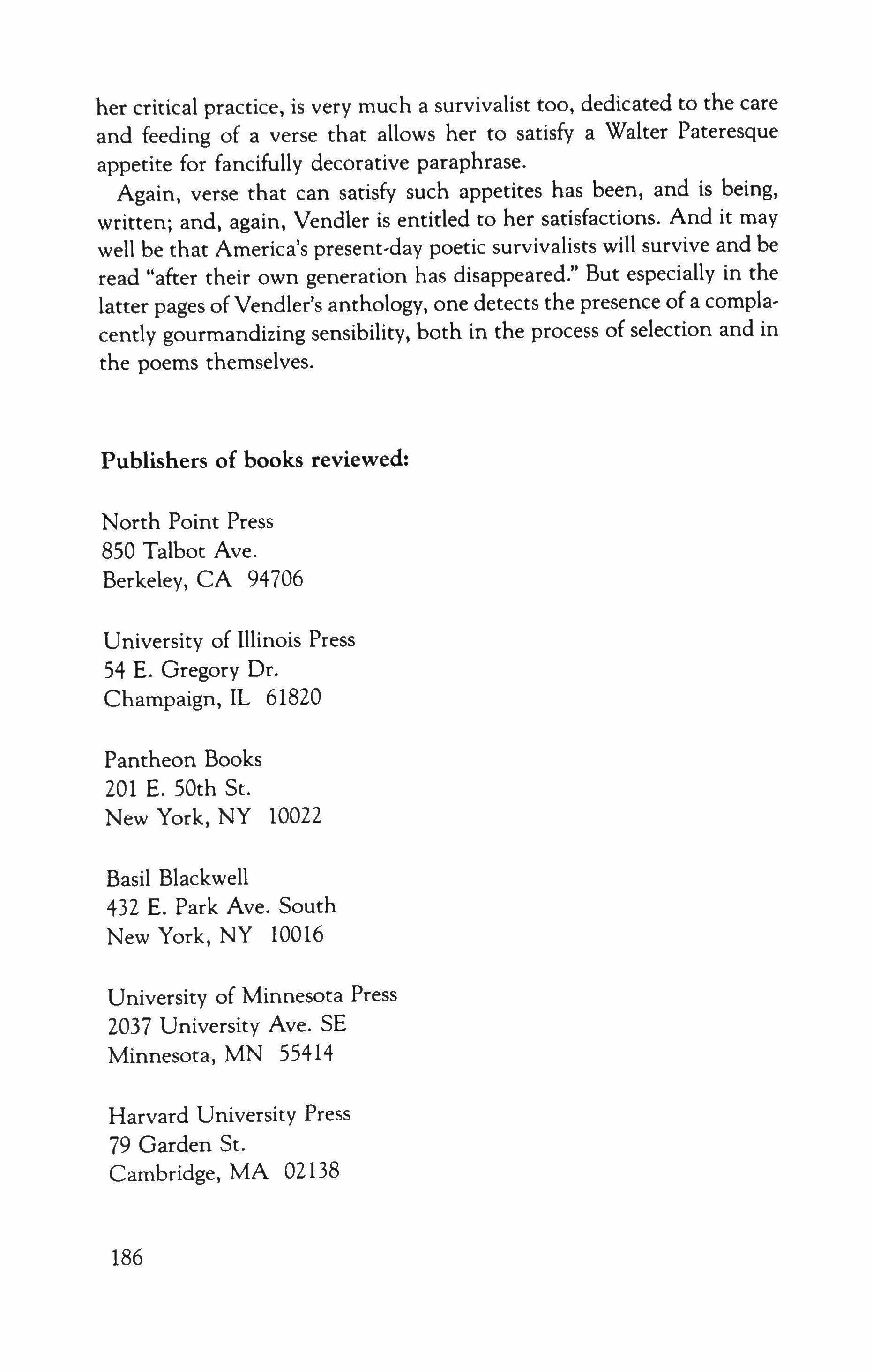
Publishers of books reviewed:
North Point Press 850 Talbot Ave. Berkeley, CA 94706
University of Illinois Press 54 E. Gregory Dr. Champaign, IL 61820
Pantheon Books
201 E. 50th St. New York, NY 10022
Basil Blackwell
432 E. Park Ave. South New York, NY 10016
University of Minnesota Press 2037 University Ave. SE Minnesota, MN 55414
Harvard University Press 79 Garden St. Cambridge, MA 02138 186
An Exchange with Cynthia Ozick
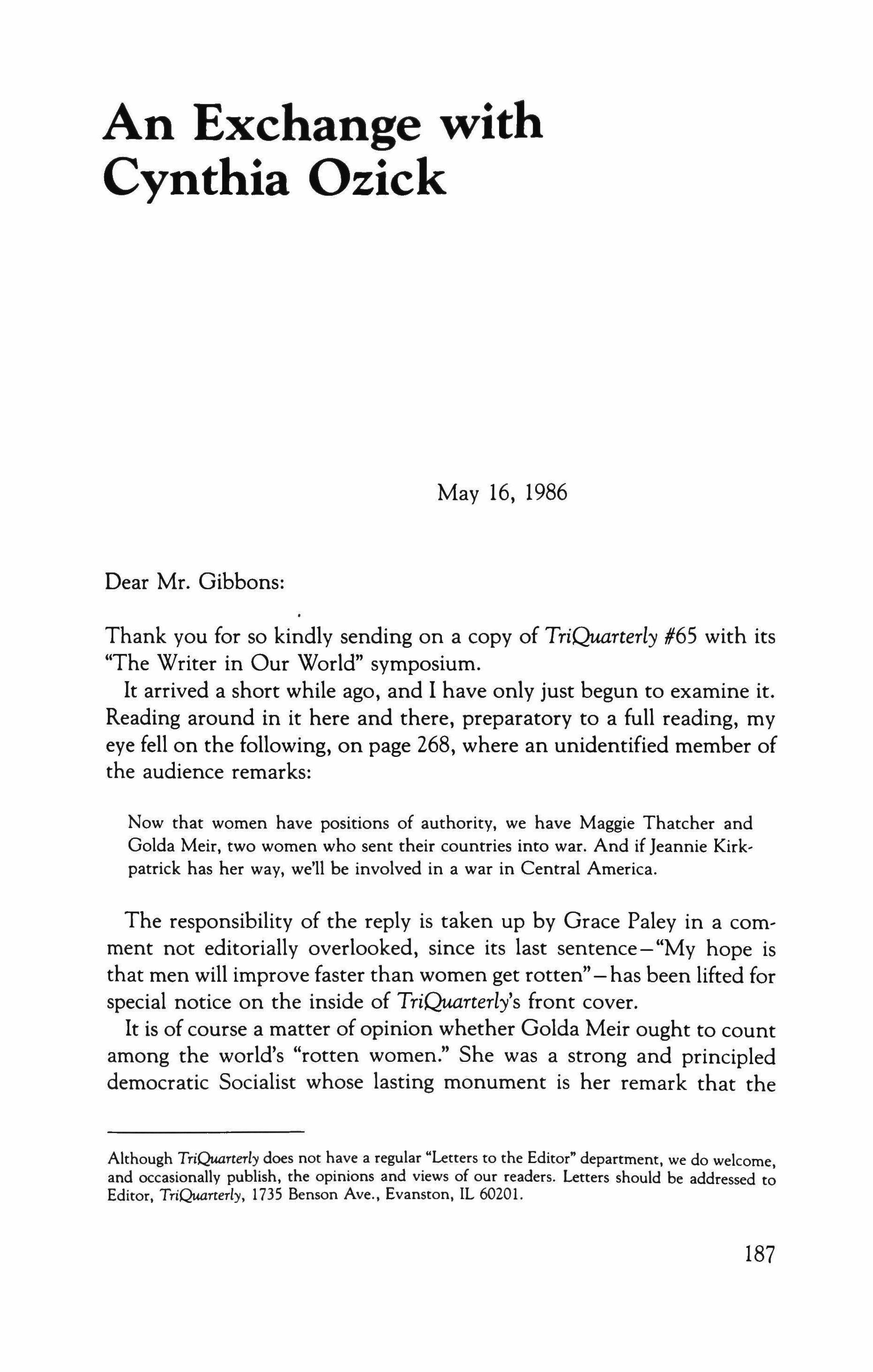
May 16, 1986
Dear Mr. Gibbons:
Thank you for so kindly sending on a copy of TriQuarterly #65 with its "The Writer in Our World" symposium. It arrived a short while ago, and I have only just begun to examine it. Reading around in it here and there, preparatory to a full reading, my eye fell on the following, on page 268, where an unidentified member of the audience remarks:
Now that women have positions of authority, we have Maggie Thatcher and Golda Meir, two women who sent their countries into war. And if Jeannie Kirkpatrick has her way, we'll be involved in a war in Central America.
The responsibility of the reply is taken up by Grace Paley in a comment not editorially overlooked, since its last sentence- "My hope is that men will improve faster than women get rotten" - has been lifted for special notice on the inside of TriQuarterly's front cover.
It is of course a matter of opinion whether Golda Meir ought to count among the world's "rotten women." She was a strong and principled democratic Socialist whose lasting monument is her remark that the
Although TriQuarterly does not have a regular "Letters to the Editor" department, we do welcome, and occasionally publish, the opinions and views of our readers. Letters should be addressed to Editor, TriQuarterly, 1735 Benson Ave., Evanston, IL 60201.
187
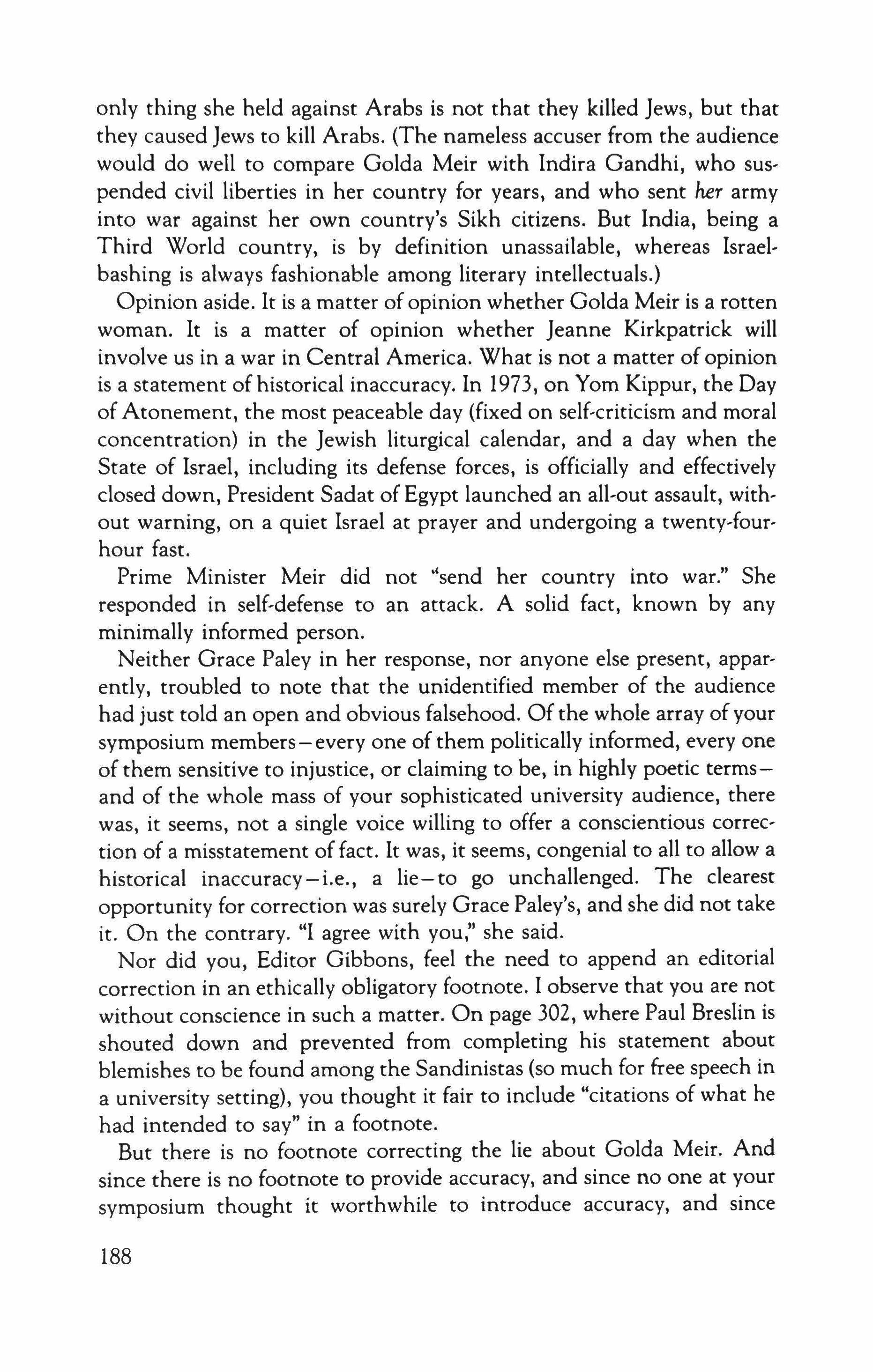
only thing she held against Arabs is not that they killed Jews, but that they caused Jews to kill Arabs. (The nameless accuser from the audience would do well to compare Golda Meir with Indira Gandhi, who suspended civil liberties in her country for years, and who sent her army into war against her own country's Sikh citizens. But India, being a Third World country, is by definition unassailable, whereas Israelbashing is always fashionable among literary intellectuals.)
Opinion aside. It is a matter of opinion whether Golda Meir is a rotten woman. It is a matter of opinion whether Jeanne Kirkpatrick will involve us in a war in Central America. What is not a matter of opinion is a statement of historical inaccuracy. In 1973, on Yom Kippur, the Day of Atonement, the most peaceable day (fixed on self-criticism and moral concentration) in the Jewish liturgical calendar, and a day when the State of Israel, including its defense forces, is officially and effectively closed down, President Sadat of Egypt launched an all-out assault, without warning, on a quiet Israel at prayer and undergoing a twenty-fourhour fast.
Prime Minister Meir did not "send her country into war." She responded in self-defense to an attack. A solid fact, known by any minimally informed person.
Neither Grace Paley in her response, nor anyone else present, apparently, troubled to note that the unidentified member of the audience had just told an open and obvious falsehood. Of the whole array of your symposium members-everyone of them politically informed, everyone of them sensitive to injustice, or claiming to be, in highly poetic termsand of the whole mass of your sophisticated university audience, there was, it seems, not a single voice willing to offer a conscientious correction of a misstatement of fact. It was, it seems, congenial to all to allow a historical inaccuracy-Le., a lie-to go unchallenged. The clearest opportunity for correction was surely Grace Paley's, and she did not take it. On the contrary. "I agree with you," she said.
Nor did you, Editor Gibbons, feel the need to append an editorial correction in an ethically obligatory footnote. I observe that you are not without conscience in such a matter. On page 302, where Paul Breslin is shouted down and prevented from completing his statement about blemishes to be found among the Sandinistas (so much for free speech in a university setting), you thought it fair to include "citations of what he had intended to say" in a footnote.
But there is no footnote correcting the lie about Golda Meir. And since there is no footnote to provide accuracy, and since no one at your symposium thought it worthwhile to introduce accuracy, and since
188
Grace Paley chose not to, and was willing to include Mrs. Meir among the world's "rotten women," I call this falsehood to your attention now.
Sincerely,
Cynthia Ozick
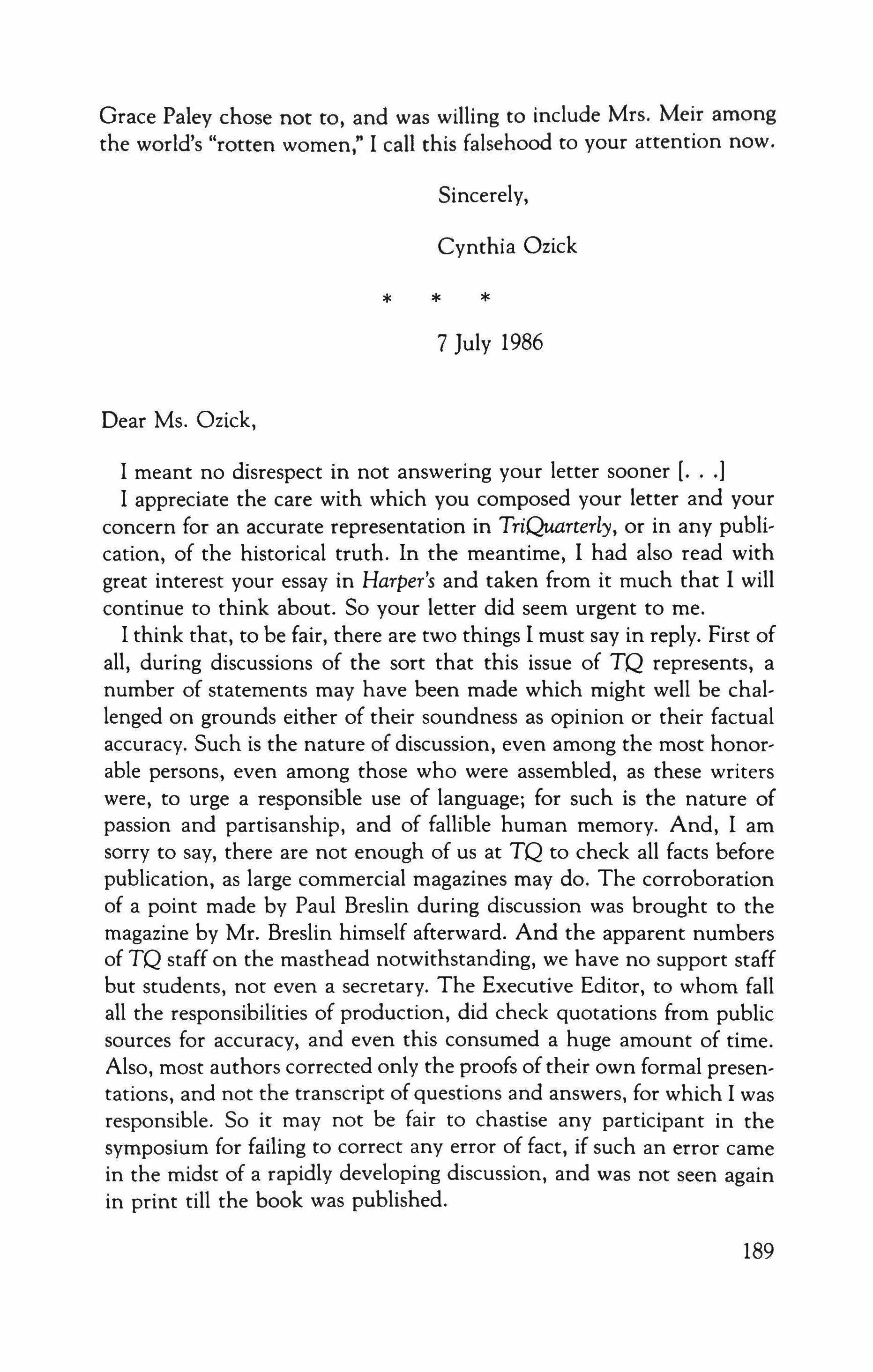
7 July 1986
Dear Ms. Ozick,
I meant no disrespect in not answering your letter sooner [ J
I appreciate the care with which you composed your letter and your concern for an accurate representation in TriQuarterly, or in any publication, of the historical truth. In the meantime, I had also read with great interest your essay in Harper's and taken from it much that I will continue to think about. So your letter did seem urgent to me.
I think that, to be fair, there are two things I must say in reply. First of all, during discussions of the sort that this issue of TQ represents, a number of statements may have been made which might well be challenged on grounds either of their soundness as opinion or their factual accuracy. Such is the nature of discussion, even among the most honorable persons, even among those who were assembled, as these writers were, to urge a responsible use of language; for such is the nature of passion and partisanship, and of fallible human memory. And, I am sorry to say, there are not enough of us at TQ to check all facts before publication, as large commercial magazines may do. The corroboration of a point made by Paul Breslin during discussion was brought to the magazine by Mr. Breslin himself afterward. And the apparent numbers of TQ staff on the masthead notwithstanding, we have no support staff but students, not even a secretary. The Executive Editor, to whom fall all the responsibilities of production, did check quotations from public sources for accuracy, and even this consumed a huge amount of time. Also, most authors corrected only the proofs of their own formal presentations, and not the transcript of questions and answers, for which I was responsible. So it may not be fair to chastise any participant in the symposium for failing to correct any error of fact, if such an error came in the midst of a rapidly developing discussion, and was not seen again in print till the book was published.
* * *
189

At this point, indeed, memory tells me that I may have been the only one to check the passage in question, and so it is up to me to apologize to you and to our readers for the uncorrected error which you have pointed out, and I do so now.
Second, and perhaps to mitigate the significance of this factual error, I think the point about Golda Meir most likely represents a confusion between (a) Israel's "preemptive strikes" in the 1967 war, before Meir was Prime Minister, and (b) Meir's military defense of Israel after the Arab attacks in the 1973 war. The initiation of the 1967 war is, as you know, a disputed matter, but if we enter once more the realm of opinion, perhaps the Israeli air strikes could be regarded as "sending a country into war." Of course, Meir was not responsible for those strikes, and I offer this point only in the hope of understanding the source of the confusion in the statement to which you object, with cause. It might also be thought by some that Meir's attitude in the arming of Israel, leading up to the Arab attack in 1973, was the equivalent, over time, of "sending her country into war." Dispute regarding the initiation of the 1967 war rests on just such a question, I believe-namely, whether Egypt's military buildup and pact with Jordan essentially began the war, not the Israeli air strikes.
In any case, for failing to clarify any confusion on the point of Meir, I cannot defend or excuse myself or any panelist, nor can I properly speak for anyone but myself; I can only offer my apology as editor of the volume. It is an irony not lost on me that during a series of discussions concerning imaginative writing and history, there was at least one serious error of historical fact. As I said above, I'm not sure that error proves anything except that it is rare to meet someone who always speaks accurately and with full knowledge of the past; but revelation of the error is chastening, nonetheless.
Sincerely,
Reginald Gibbons
* * * 190
July 17, 1986
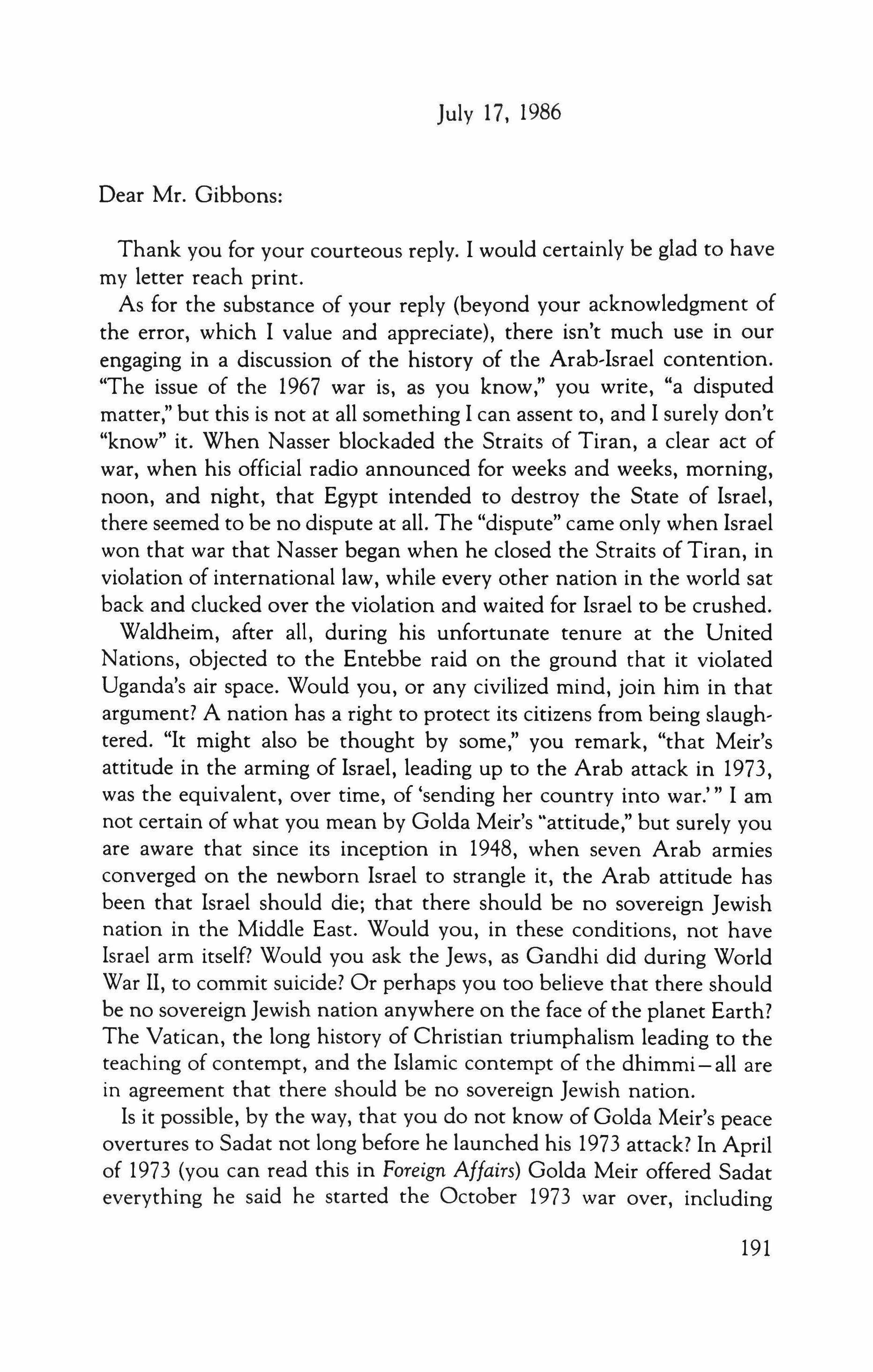
Dear Mr. Gibbons:
Thank you for your courteous reply. I would certainly be glad to have my letter reach print.
As for the substance of your reply (beyond your acknowledgment of the error, which I value and appreciate), there isn't much use in our engaging in a discussion of the history of the Arab-Israel contention. "The issue of the 1967 war is, as you know," you write, "a disputed matter," but this is not at all something I can assent to, and I surely don't "know" it. When Nasser blockaded the Straits of Tiran, a clear act of war, when his official radio announced for weeks and weeks, morning, noon, and night, that Egypt intended to destroy the State of Israel, there seemed to be no dispute at all. The "dispute" came only when Israel won that war that Nasser began when he closed the Straits of Tiran, in violation of international law , while every other nation in the world sat back and clucked over the violation and waited for Israel to be crushed. Waldheim, after all, during his unfortunate tenure at the United Nations, objected to the Entebbe raid on the ground that it violated Uganda's air space. Would you, or any civilized mind, join him in that argument? A nation has a right to protect its citizens from being slaughteredo "It might also be thought by some," you remark, "that Meir's attitude in the arming of Israel, leading up to the Arab attack in 1973, was the equivalent, over time, of 'sending her country into war.''' I am not certain of what you mean by Golda Meir's "attitude," but surely you are aware that since its inception in 1948, when seven Arab armies converged on the newborn Israel to strangle it, the Arab attitude has been that Israel should die; that there should be no sovereign Jewish nation in the Middle East. Would you, in these conditions, not have Israel arm itself? Would you ask the Jews, as Gandhi did during World War II, to commit suicide? Or perhaps you too believe that there should be no sovereign Jewish nation anywhere on the face of the planet Earth? The Vatican, the long history of Christian triumphalism leading to the teaching of contempt, and the Islamic contempt of the dhimmi-all are in agreement that there should be no sovereign Jewish nation. Is it possible, by the way, that you do not know of Golda Meir's peace overtures to Sadat not long before he launched his 1973 attack? In April of 1973 (you can read this in Foreign Affairs) Golda Meir offered Sadat everything he said he started the October 1973 war over, including
191
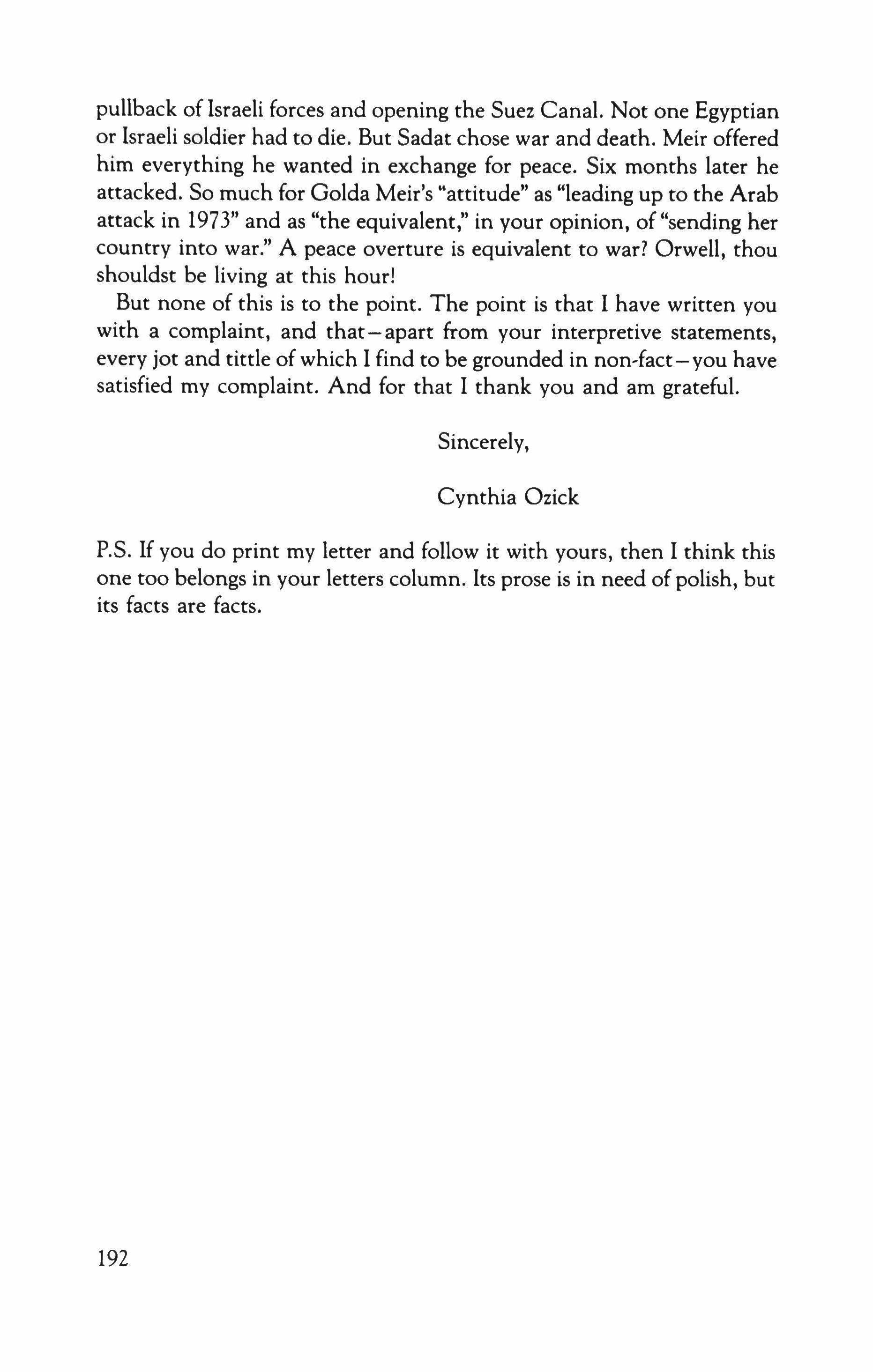
pullback of Israeli forces and opening the Suez Canal. Not one Egyptian or Israeli soldier had to die. But Sadat chose war and death. Meir offered him everything he wanted in exchange for peace. Six months later he attacked. So much for Golda Meir's "attitude" as "leading up to the Arab attack in 1973" and as "the equivalent," in your opinion, of "sending her country into war." A peace overture is equivalent to war? Orwell, thou shouldst be living at this hour!
But none of this is to the point. The point is that I have written you with a complaint, and that-apart from your interpretive statements, every jot and tittle of which I find to be grounded in non-factyou have satisfied my complaint. And for that I thank you and am grateful.
Sincerely,
Cynthia Ozick
P.S. If you do print my letter and follow it with yours, then I think this one too belongs in your letters column. Its prose is in need of polish, but its facts are facts.
192
Contributors
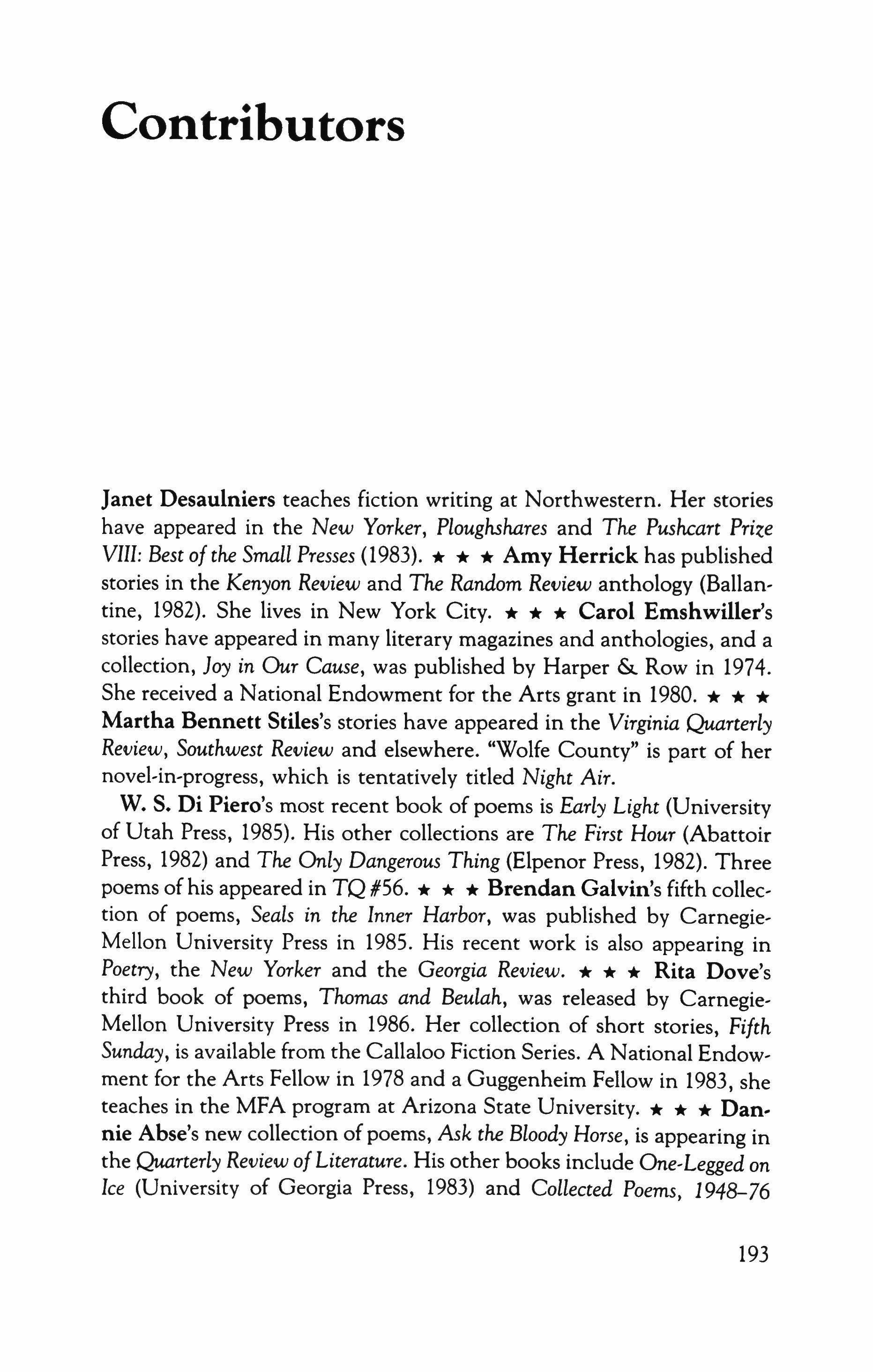
Janet Desaulniers teaches fiction writing at Northwestern. Her stories have appeared in the New Yorker, Ploughshares and The Pushcart Prize VIII: Best of the Small Presses (1983). * * * Amy Herrick has published stories in the Kenyon Review and The Random Review anthology (Ballantine, 1982). She lives in New York City. * * * Carol Emshwiller's stories have appeared in many literary magazines and anthologies, and a collection, Joy in Our Cause, was published by Harper & Row in 1974. She received a National Endowment for the Arts grant in 1980. * * * Martha Bennett Stiles's stories have appeared in the Virginia Quarterly Review, Southwest Review and elsewhere. "Wolfe County" is part of her novel-in-progress, which is tentatively titled Night Air.
W. S. Di Piero's most recent book of poems is Early Light (University of Utah Press, 1985). His other collections are The First Hour (Abattoir Press, 1982) and The Only Dangerous Thing (Elpenor Press, 1982). Three poems of his appeared in TQ #56. * * * Brendan Galvin's fifth collection of poems, Seals in the Inner Harbor, was published by CarnegieMellon University Press in 1985. His recent work is also appearing in Poetry, the New Yorker and the Georgia Review. * * * Rita Dove's third book of poems, Thomas and Beulah, was released by CarnegieMellon University Press in 1986. Her collection of short stories, Fifth Sunday, is available from the Callaloo Fiction Series. A National Endowment for the Arts Fellow in 1978 and a Guggenheim Fellow in 1983, she teaches in the MFA program at Arizona State University. * * * Dannie Abse's new collection of poems, Ask the Bloody Horse, is appearing in the Quarterly Review of Literature. His other books include One-Legged on lee (University of Georgia Press, 1983) and Collected Poems, 1948-76
193
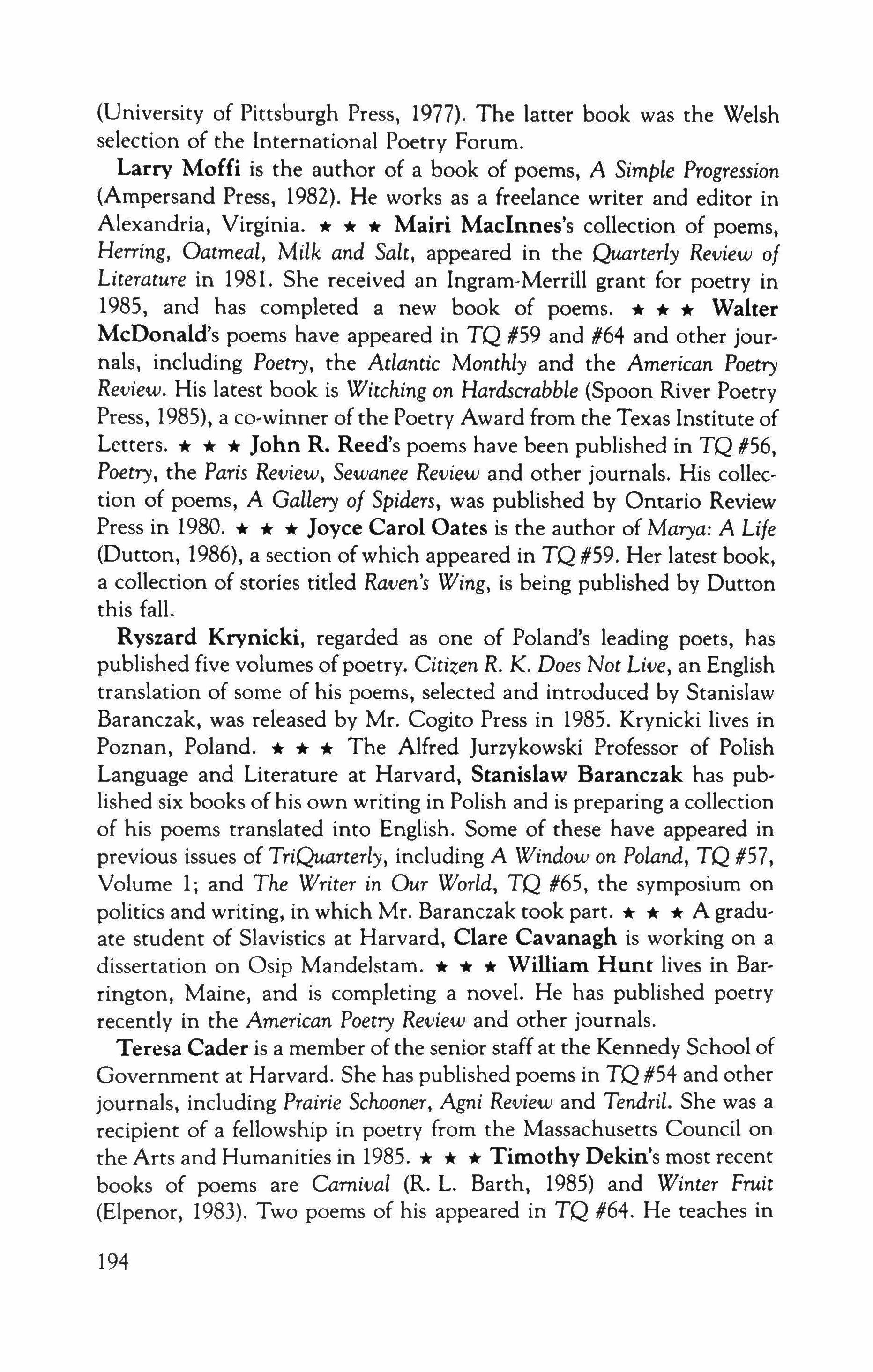
(University of Pittsburgh Press, 1977). The latter book was the Welsh selection of the International Poetry Forum.
Larry Moffi is the author of a book of poems, A Simple Progression (Ampersand Press, 1982). He works as a freelance writer and editor in Alexandria, Virginia. * * * Mairi MacInnes's collection of poems, Herring, Oatmeal, Milk and Salt, appeared in the Quarterly Review of Literature in 1981. She received an Ingram-Merrill grant for poetry in 1985, and has completed a new book of poems. * * * Walter McDonald's poems have appeared in TQ #59 and #64 and other journals, including Poetry, the Atlantic Monthly and the American Poetry Review. His latest book is Witching on Hardscrabble (Spoon River Poetry Press, 1985), a co-winner of the Poetry Award from the Texas Institute of Letters. * * * John R. Reed's poems have been published in TQ #56, Poetry, the Paris Review, Sewanee Review and other journals. His collection of poems, A Gallery of Spiders, was published by Ontario Review Press in 1980. * * * Joyce Carol Oates is the author of Marya: A Life (Dutton, 1986), a section of which appeared in TQ #59. Her latest book, a collection of stories titled Raven's Wing, is being published by Dutton this fall.
Rvszard Krvnicki, regarded as one of Poland's leading poets, has published five volumes of poetry. Citizen R. K. Does Not Live, an English translation of some of his poems, selected and introduced by Stanislaw Baranczak, was released by Mr. Cogito Press in 1985. Krynicki lives in Poznan, Poland. * * * The Alfred [urzykowski Professor of Polish Language and Literature at Harvard, Stanislaw Baranczak has published six books of his own writing in Polish and is preparing a collection of his poems translated into English. Some of these have appeared in previous issues of TriQuarterly, including A Window on Poland, TQ #57, Volume 1 j and The Writer in Our World, TQ #65, the symposium on politics and writing, in which Mr. Baranczak took part. * * * A graduate student of Slavistics at Harvard, Clare Cavanagh is working on a dissertation on Osip Mandelstam. * * * William Hunt lives in Barrington, Maine, and is completing a novel. He has published poetry recently in the American Poetry Review and other journals.
Teresa Cader is a member of the senior staff at the Kennedy School of Government at Harvard. She has published poems in TQ #54 and other journals, including Prairie Schooner, Agni Review and Tendril. She was a recipient of a fellowship in poetry from the Massachusetts Council on the Arts and Humanities in 1985. * * * Timothy Dekin's most recent books of poems are Carnival (R. L. Barth, 1985) and Winter Fruit (Elpenor, 1983). Two poems of his appeared in TQ #64. He teaches in
194
the English Department at Northwestern. * * * Paul Breslin, also a member of the English Department faculty at Northwestern, is the author of The Psycho-Political Muse, to be released by the University of Chicago Press in 1987. * * * Predominately a writer of fiction, Mary Gray Hughes has published a collection of stories, The Calling (University of Illinois Press, 1980), and is working on a novel. Her poetry has appeared in TQ #64, Crosscurrents, Confrontation and other journals. She teaches at Lake Forest College. * * * Morton Marcus's most recent book, Big Winds, Glass Mornings, Shadows Cast by Stars, was issued in a second edition by Jazz Press in 1985, and a group of his poems was included in New American Poets of the 80's (Wampeter, 1984). The poem published here is part of a new series by Marcus; other selections have appeared in several journals, including TQ #58 and #64.
Paul Zweig, the distinguished American critic and poet, died of cancer in 1984 at the age of 49. His books of literary scholarship and criticism include The Heresy of Self-Love: A Study of Subversive Individualism (Princeton, 1980), The Adventurer: The Fate of Adventure in the Western World (Princeton University Press, 1981) and Walt Whitman: The Making of the Poet (Basic Books, 1984). His books of poetry include Eternity's Woods (Wesleyan University Press, 1985). The autobiographical essay appearing in this issue is part of a longer work, Departures, which is being published by Harper & Row in November 1986. Another book of autobiography by Mr. Zweig, Three Journeys, was released by Basic Books in 1971. * * * Larry Kart is a critic of the arts with the Chicago Tribune. His translation of Eugenio Montale's Mottetti was published by the Grabhorn-Hovern Press in 1973. He also wrote the text for a photographic history of the early days of baseball, That Old Ball Game (Henry Regnery, 1973).
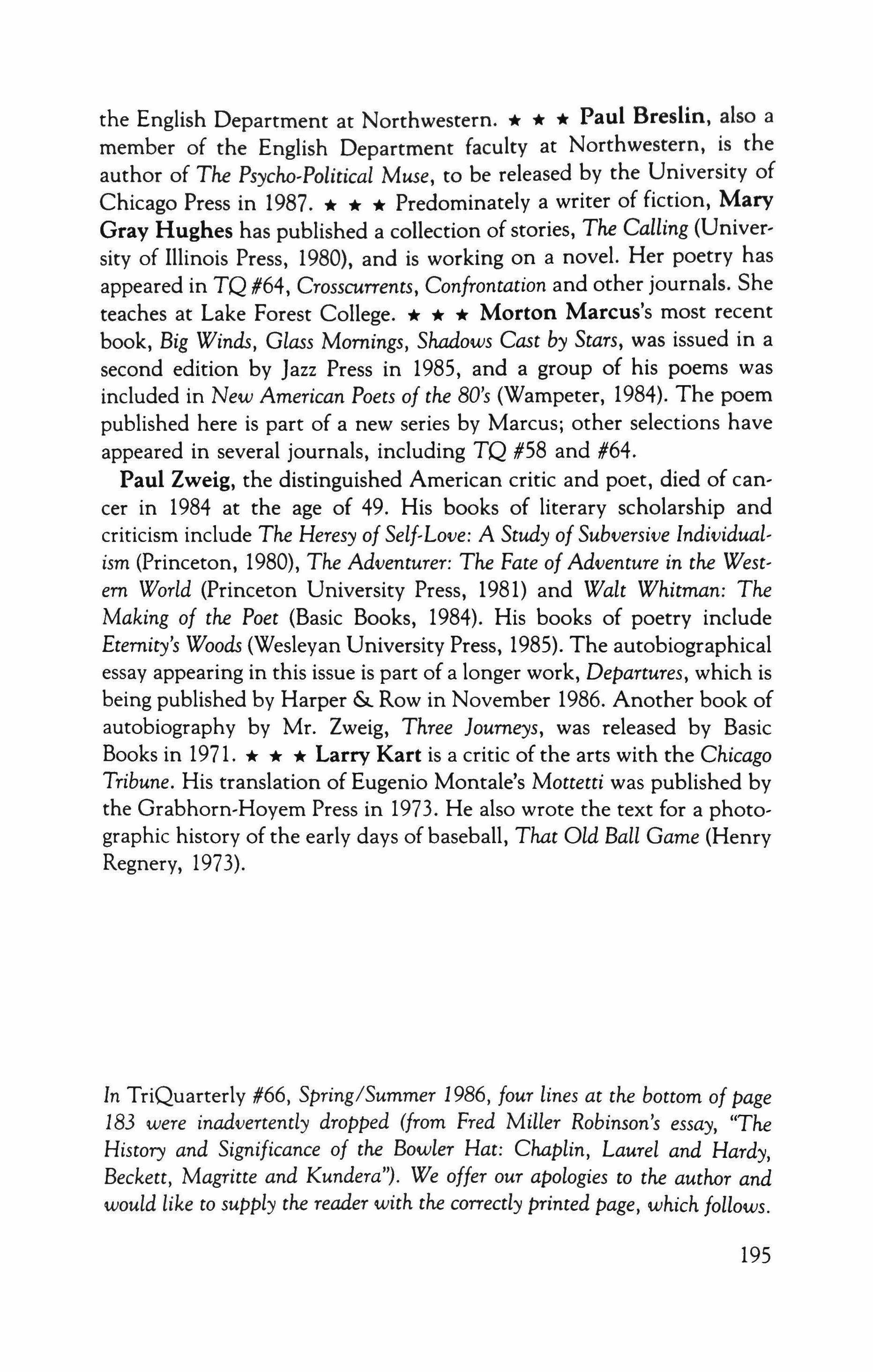
In TriQuarterly #66, Spring/Summer 1986, four lines at the bottom of page 183 were inadvertently dropped (from Fred Miller Robinson's essay, "The History and Significance of the Bowler Hat: Chaplin, Laurel and Hardy, Beckett, Magritte and Kundera"). We offer our apologies to the author and would like to supply the reader with the correctly printed page, which follows.
195
POETRY FROM HARPER & ROW
SELECTED POEMS
ROBERI'BLY
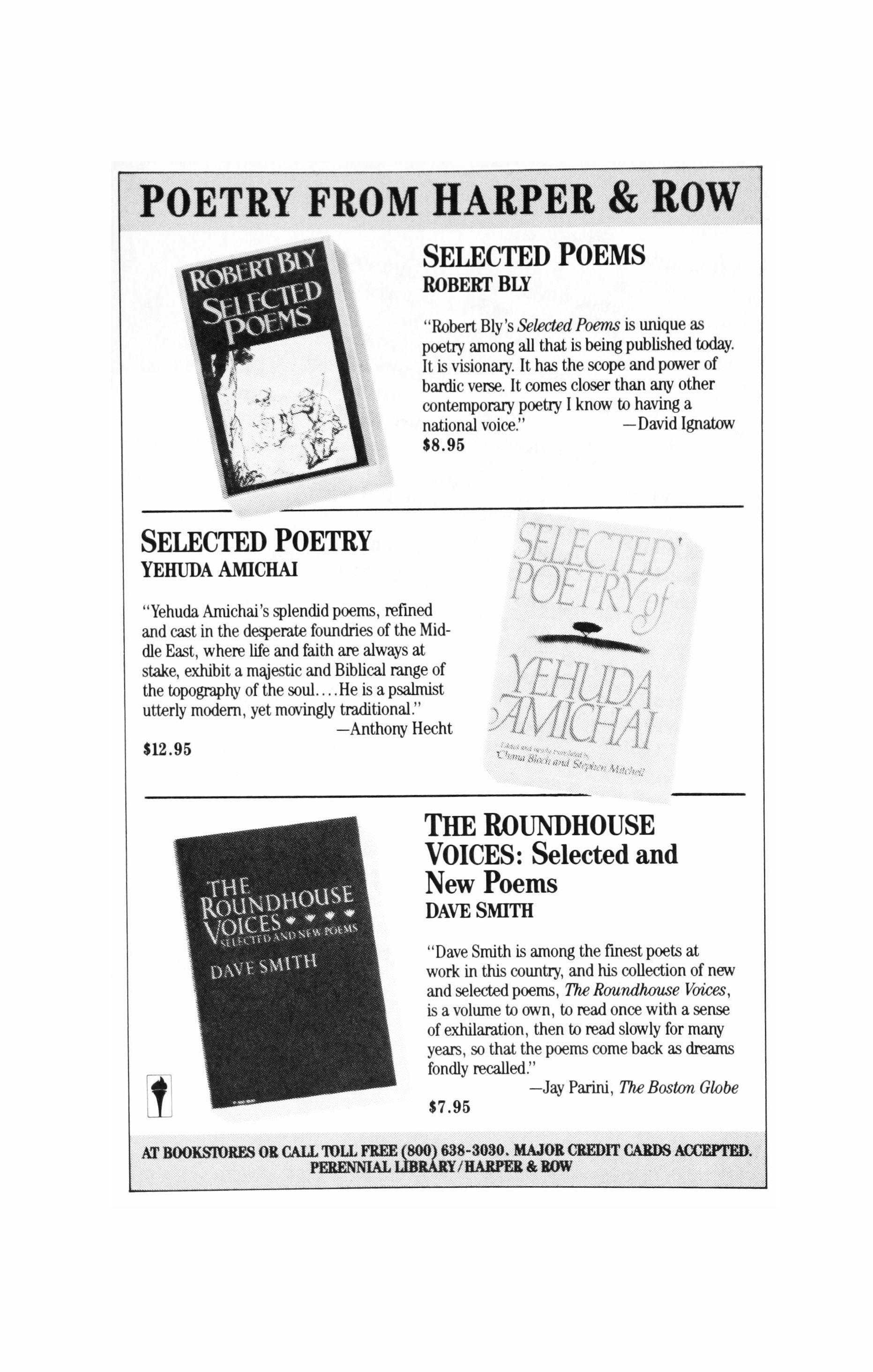
SELECTED POETRY
YEHUDA AMICHAI
"Robert Bly's SelectedPoems is unique as poetry among all that is being published today. It is visionary. It has the scope and power of bardic verse. It comes closer than any other contemporary poetry I know to having a national voice."
$8.95
"Yehuda Amichai's splendid poems, refined and cast in the desperate foundries of the Middle East, where life and faith are always at stake, exhibit a majestic and Biblical range of the topography of the soul He is a psalmist utterly modern, yet movingly traditional."
-Anthony Hecht
$12.95
- David Ignatow
THE ROUNDHOUSE
VOICES: Selected and New Poems
DAVE SMITH
"Dave Smith is among the finest poets at work in this country, and his collection of new and selected poems, TheRoundhouse Voices, is a volume to own, to read once with a sense of exhilaration, then to read slowly for many years, so that the poems come back as dreams fondly recalled."
-Jay Parini, The Boston Globe
$7.95
AT BOOXSTORES OK CALL rou, FREE (800) 638-3080. MAJOR CREDIT CAlmS ACCEPfEn. PERENNIAL LlBWY/lIARPEK &BOW
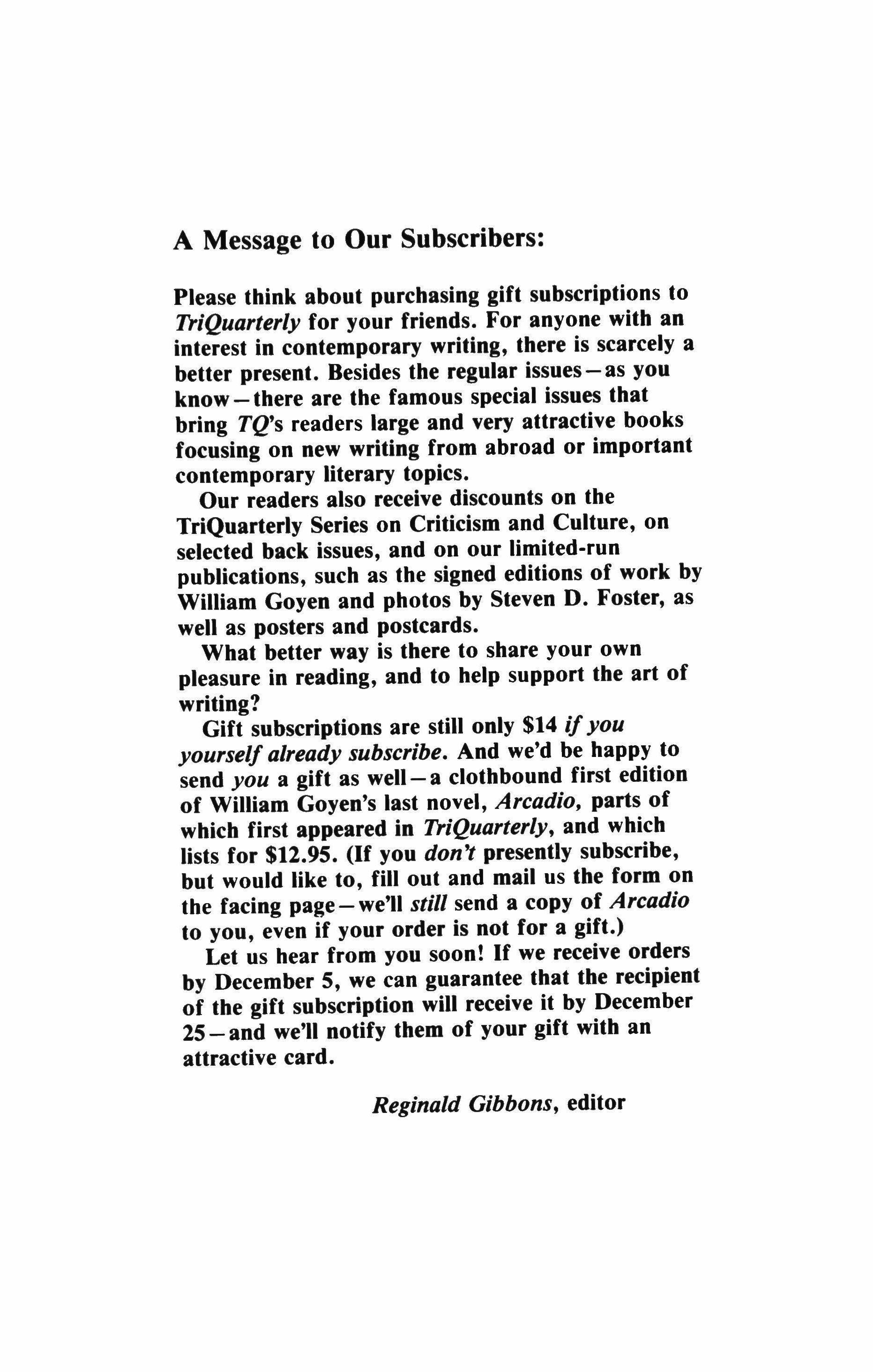
A Message to Our Subscribers:
Please think about purchasing gift subscriptions to TriQuarterly for your friends. For anyone with an interest in contemporary writing, there is scarcely a better present. Besides the regular issues - as you know - there are the famous special issues that bring TQ's readers large and very attractive books focusing on new writing from abroad or important contemporary literary topics.
Our readers also receive discounts on the TriQuarterly Series on Criticism and Culture, on selected back issues, and on our limited-run publications, such as the signed editions of work by William Goyen and photos by Steven D. Foster, as well as posters and postcards.
What better way is there to share your own pleasure in reading, and to help support the art of writing?
Gift subscriptions are still only $14 ifyou yourself already subscribe. And we'd be happy to send you a gift as well- a clothbound first edition of William Goyen's last novel, Arcadio, parts of which first appeared in TriQuarterly, and which lists for $12.95. (If you don't presently subscribe, but would like to, fill out and mail us the form on the facing page - we'll still send a copy of Arcadio to you, even if your order is not for a gift.)
Let us hear from you soon! If we receive orders by December 5, we can guarantee that the recipient of the gift subscription will receive it by December 25 - and we'll notify them of your gift with an attractive card.
Reginald Gibbons, editor
TriQuarterly Northwestern University 1735 Benson Ave. Evanston, IL 60201
Please enter my subscription(s):
o 1 year (516) 0 2 years (528) 0 *gift (514) 0 life ($150)
o I enclose 5 o Please bill me
o Charge my VISA/MasterCard 11
Signature Exp. date
Name Address
City State Zip
Gift subscription for:
Name Address
City State Zip
o Please send me a free copy of Arcadia by William Goyen

*Please note that the reduced ($14) price for gifts applies only if you are a current subscriber. FQr all foreign subscriptions, gift or otherwise, add $4/year.
p----I
Arts fS Sciences
ALBERT GOLDBARTH
"Arts & Sciences is a true cabinet of curiosities, bursting with historical oddments and imaginative speculations. Creator and curator both, this poet also ranges the emotions of surprise: the exhilarated tropes of nostalgia and grief, a voice instinct with startled fascination, an impetuosity barely contained by verse."
-J. D. McClatchy
"Goldbarth's poems, often dazzling in the Donne-like way they yoke disparate conceits, and almost always fearlessly playful in their approach, can mask the reasons for their being written. It's too easy to forget that for all of Goldbarth's bravura, the poems' punch lies in the way they affect us: over and over they tenderly remind us of the conditions of our humanness."
-Robert Cording, The Carolina Quarterly
October Cloth $1 7. 951Paper $8.95
The Ways We Live Now
Contemporary Short Fiction from The Ontario Review
Edited
by
Raymond J. Smith
The wonderfully diverse ways we live now are explored with imagination and insight by 28 writers whose work represents an exciting cross section of the fiction being composed today. Included are Alice Adams, John Updike, Joyce Carol Oates, Margaret Atwood, Paul Bowles, Maxine Kumin, Margaret Drabble, Carlos Fuentes, Elizabeth Spencer, Josephine Jacobsen, William Goyen, Margareta Ekstrom, Lynne Sharon Schwartz, and many others. Among the stories are a number of distinguished prize winners. Discounts for course adoption.
September Cloth $21 951Paper $9.95
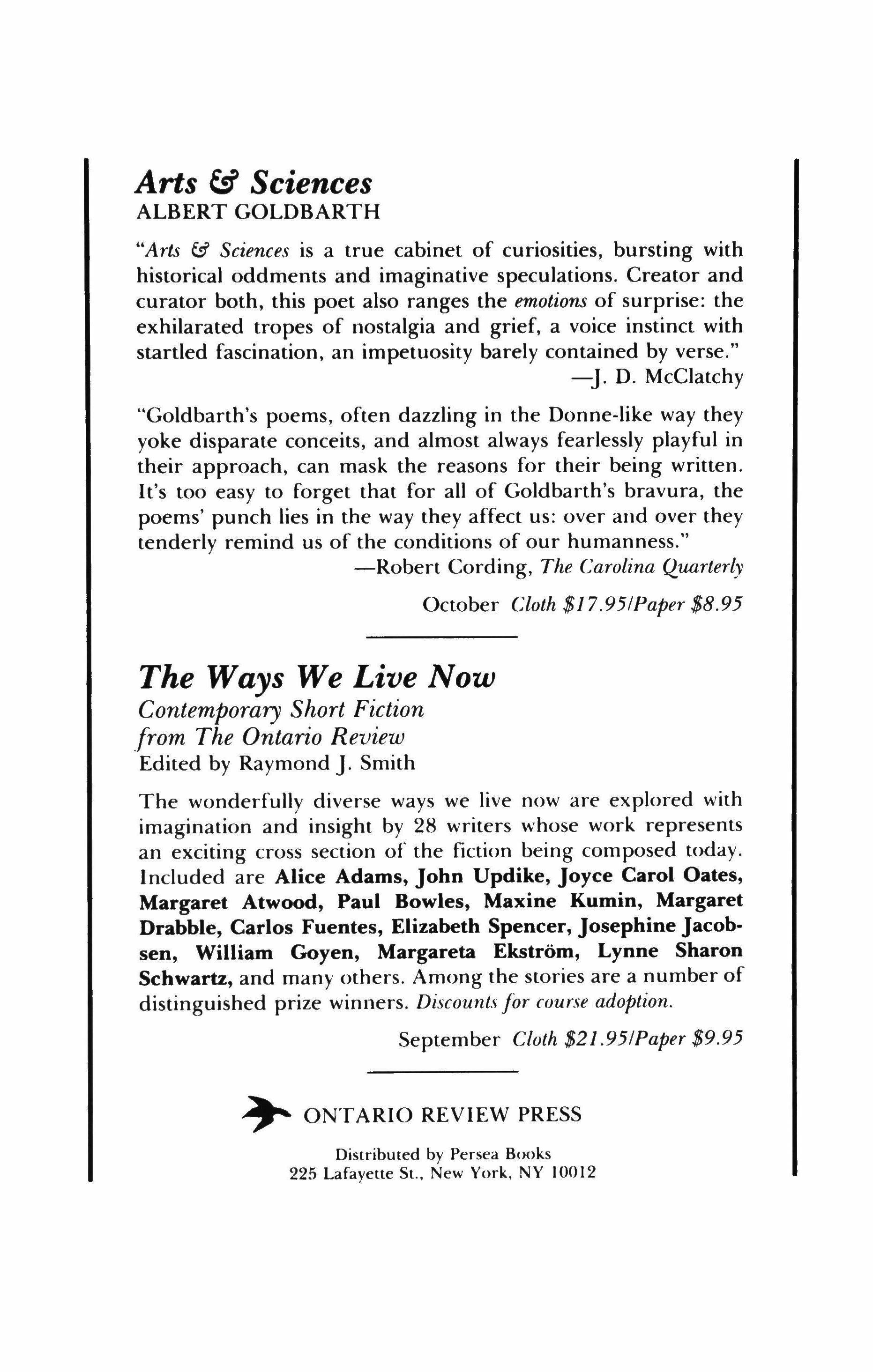
Distributed by Persea Books 225 Lafayette s., New York, NY 10012
�
ONTARIO REVIEW PRESS
The Paris Review
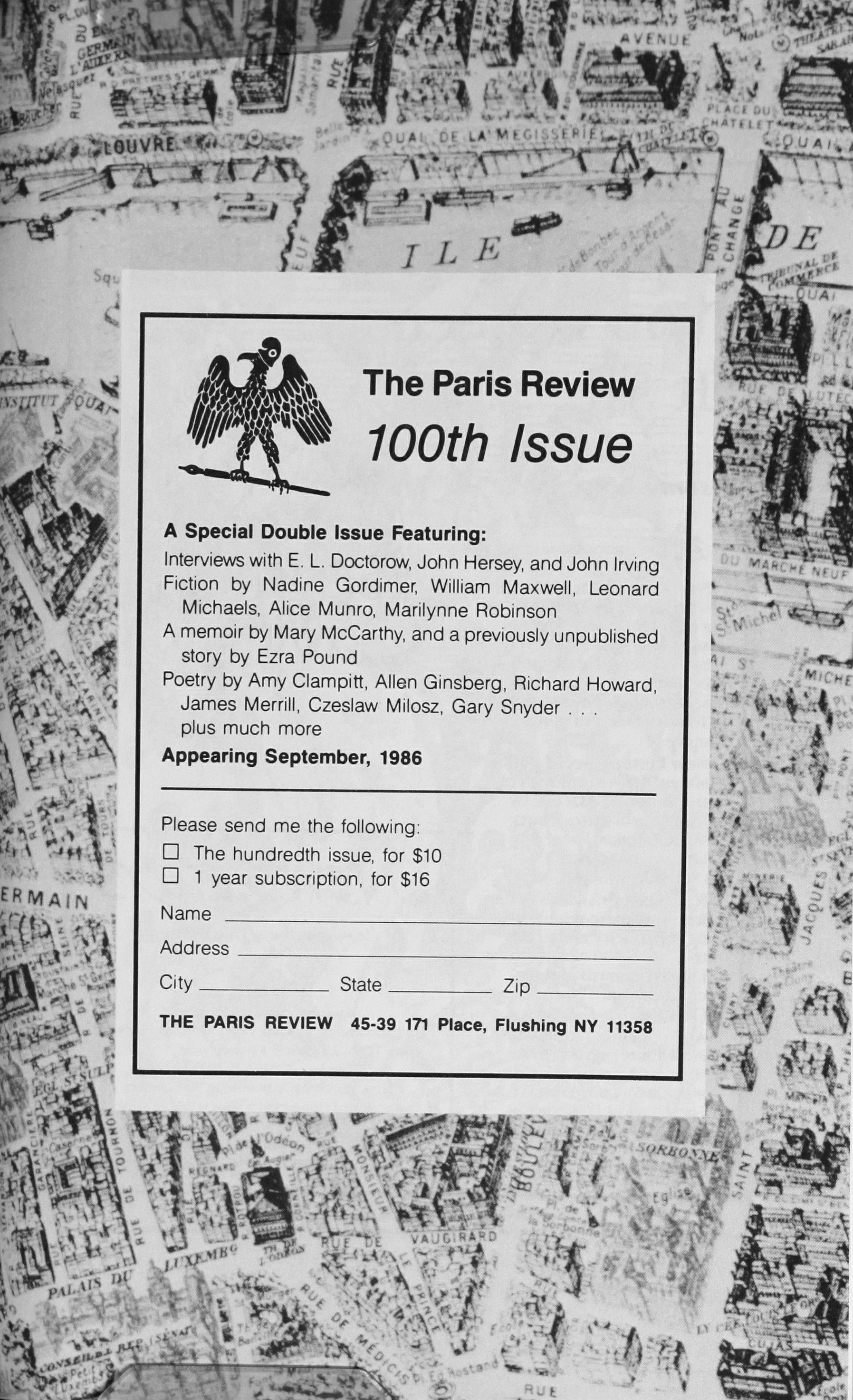
A Special Double Issue Featuring: Interviews with E. L. Doctorow, John Hersey, and John Irving Fiction by Nadine Gordimer, William Maxwell, Leonard Michaels, Alice Munro, Marilynne Robinson A memoir by Mary McCarthy, and a previously unpublished story by Ezra Pound Poetry by Amy Clampitt, Allen Ginsberg, Richard Howard, James Merrill, Czeslaw Milosz, Gary Snyder plus much more
Appearing September, 1986
Please send me the following:
o The hundredth issue, for $10
o 1 year subscription, for $16
Name
..." fT-
ssue
Address City State Zip THE PARIS REVIEW 45-39 171 Place, Flushing NY 11358 '. f I to/ c 0. '. *'_-y
Just When You Think You've Seen
It All there's something new
New Letters double issue, with fiction by Daniel Stern, a memoir by Lise! Mueller and "The Crossbow Cycle" by Pulitzer-Prize winner Peter Viereck; memorial sections to John Ciardi and Tom McMee and much more.
New Letters special fiction issue: Delightful Stories of Deception and Decay, by Joyce Carol Oates, Harry Mark Petrakis, Speer Morgan and others (Summer 1986)
New Letters Awards Issue, featuring prize-winning fiction, poetry and essays from the 1986 New Letters Literary Awards national competition, (Fall 1986)
And remember, tune in New Letters on the Air, the best writers on radio, weekly on your local National Public Radio station (half-hour cassettes available at '7.50 each. Catalogue free ).
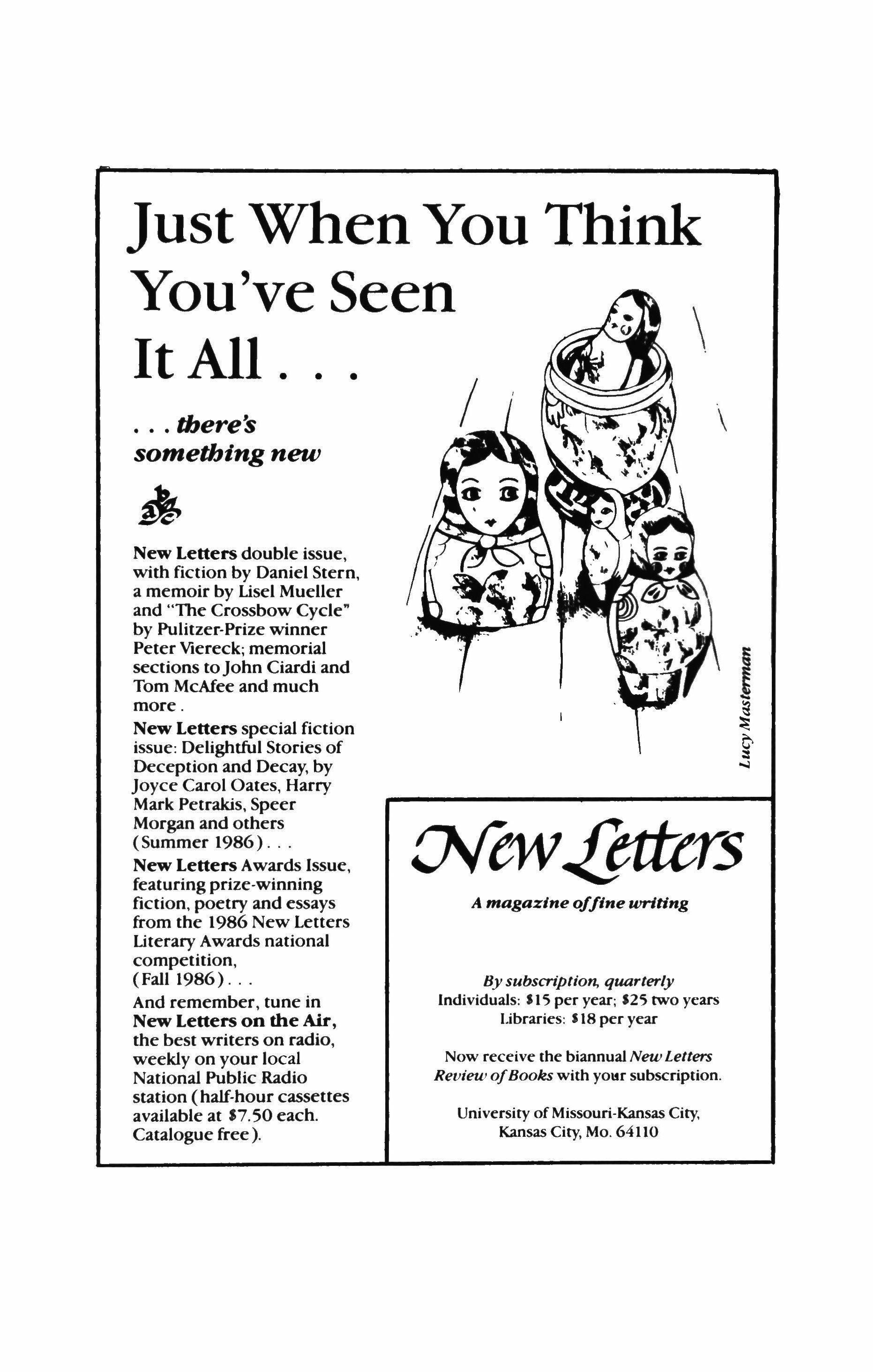
A magazine affine writing
By subscription, quarterly
Individuals: S 15 per year; S25 two years
Libraries: S 18 per year
Now receive the biannual New Leiters Review ofBooks with your subscription.
University of Missouri-Kansas City. Kansas City, Mo. 64110
\
\

HAWAII REVIEW c/o Department of English 1733 Donaghho Road Honolulu, Hawaii 96822 A one-year subscription IS $6.00: single copies $3.00
POE TRY FICTION

ESSAYS TRANSLATIONS
Michelle Huneven, "The Foot," issue #11 1984 GE Foundation Award Winner
Recent Contributors:
Kay Boyle, Olga Broumas, Hayden Carruth, Madeline DeFrees, Patricia Goedicke, Sam Hamill, Allen Hoey, Michelle Huneven, Richard Jones, Carolyn Kizer, Konstantinos Lardas, David Lee, Denise Levertov, Thomas McGrath, Gregory McNamee, Lisel Mueller, Susan Wheeler, AI Young
Semi-Annual Publication
Subscriptions: $8/1 Year $1512 Years $4/Single Copy S25/Patron
Willow Springs PUB P.O. Box 1063, Eastern Washingron University, Cheney, WA 99004

Twentieth Anniversary Issue
James T. Farrell
Anne Sexton
Thorn Gunn
Jorge Luis Borges
Thomas McGuane
Vladimir Nabokov
Cynthia Ozick
Robert Coover
William Gass
Stanley Elkin
Raymond Carver
Robert Stone
c.x Williams
Lorraine Hansberry
William Goyen
Saul Bellow
Maxine Kumin
John Ashbery and more than sixty others 20
688 pages, softcover, $12.95
Order from TriQuarterly, Northwestern University, 1735 Benson Ave., Evanston, IL 60201
Perhaps the preeminent journalfor literary fiction
The New York Times
One of the most exciting literary magazines in the country
Studs Terkel, WFMT-FM, Chicago
-
Subscribe toThe Review everyone is talking about!

The New York Review is offering an introductory subscription which brings you a full year of issues (22 issues in all) for only $17 - a considerable savings off the newsstand price. The Review is noted for its brilliant reviews and essays by Gore Vidal, John Updike, Elizabeth Hardwick, Milan Kundera, Susan Sontag, Joan Didion, Felix Rohatyn, John Kenneth Galbraith, V. S. Naipaul, Murray Kempton, V. S. Pritchett, Nadine Gordimer, and countless other writers and scholars who are themselves a major influence in world literature and thought. So subscribe today and find out why Esquire calls The Review "the premier literary-intellectual magazine in the English language."
�----------------------------I ne "'IbdlB.eriewolBoolul I I I I I Name I Address I City I I 0 $17.00 enclosed. o Bill me. Offer good for new subscribers within U.S. only. Please allow 6-8 weeks for receipt I of your first copy. I L � Subscriber Service Dept., P.O. Box 940, Farmingdale, N.Y. 11737 Please enter my subscription to The New York Review ofBooks for a full year, 22 issues, at the special introductory rate of $17 - 50% off the regular subscription price and a savings of $25 on the newsstand price. State Zip TOOl
STUART DYBEK
CHILDHOOD AND OTHER NEIGHBORHOODS
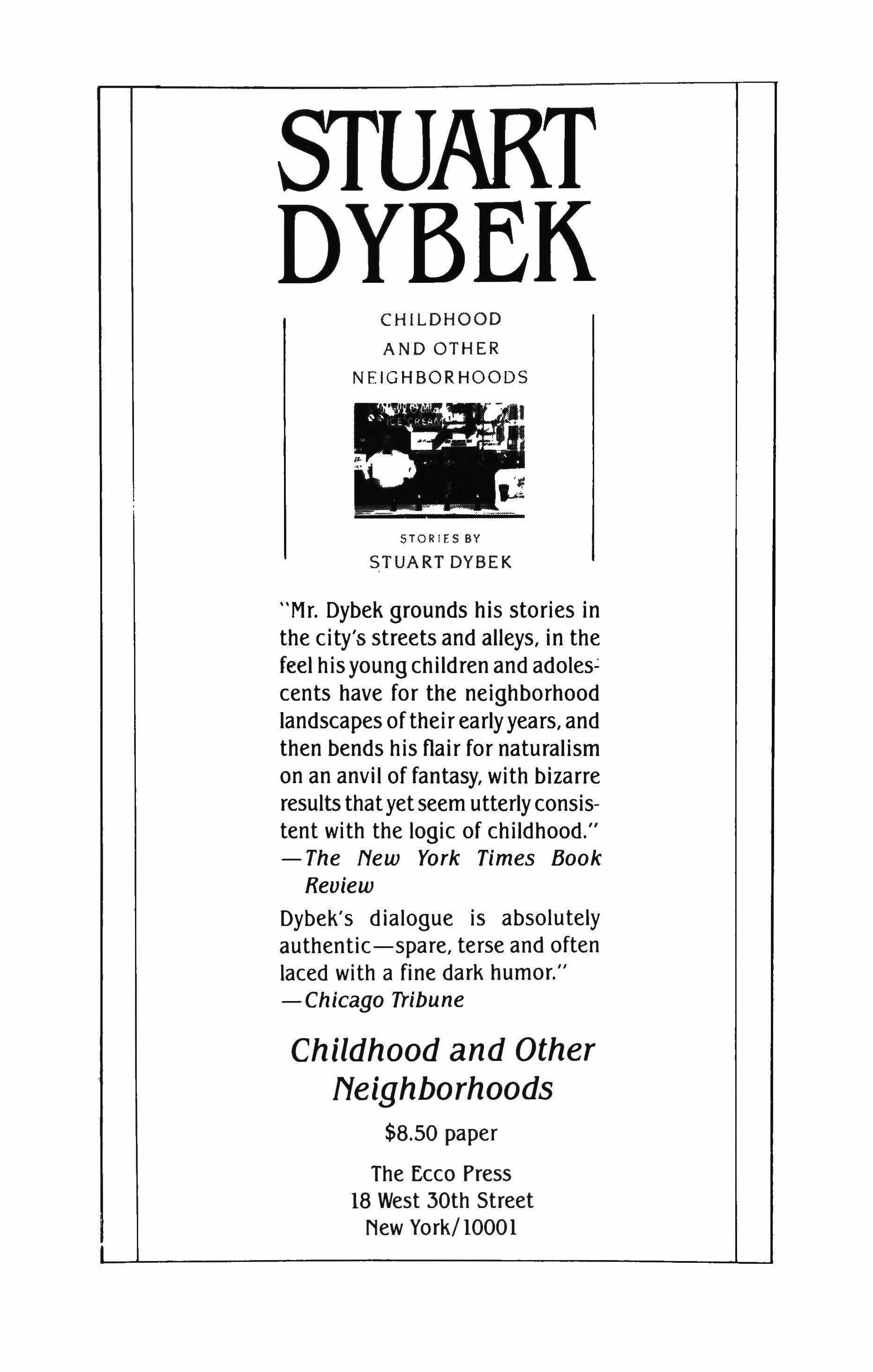
"Mr. Dybek grounds his stories in the city's streets and alleys, in the feel his young children and adolescents have for the neighborhood landscapes oftheir earlyyears, and then bends his flair for naturalism on an anvil of fantasy, with bizarre results thatyet seem utterly consistent with the logic of childhood."
- The New York Times Book Review
Dybek's dialogue is absolutely authentic-spare, terse and often laced with a fine dark humor."
-Chicago Tribune
Childhood and Other Neighborhoods
$8.50 paper
The Ecco Press 18 West 30th Street New York/WOOl
STORIES BY STUART DYBEK
A must for collectors, researchers and anyone else who wants to be amused and amazed a rich source for dating and documenting antiques - Anita Gold, Chicago Tribune A fascinating and humorous collection quite a cavalcade of Americana - Yesteryear Not only fun to read but informative graphically - Upper & lower case The Golden Age of Yankee hucksterism just take a look - Lerner Newspapers

a collection of over 270 fascinating, often hilarious antique specimens from the golden-olden age of American print advertising, 1799-19241 at bookstores or direct from Art Direction Book Co., 10 K 39th St., NYC 10016
paperback (add 51.50 for mail orders)
WHAT
THEY'RE SAYING ABOUT EARLY AMERICAN ADVERTISING:
OOOODOOOOOOOOOOOOOOOOOOOOOOOOOOOOOOOOOOOOOOO
$7.95,
TriQuarterly thanks the following individual donors and life subscribers:
Mr. and Mrs. Solway F. Firestone
Mrs. Larry Shindelman
David C. Abercrombie
Amin Alimard
Sandy Anderson
Richard H. Anderson
Univ. of Arizona Poetry Center
Gayle Arnzen
Tom G. Bell
Robert Boruch
Van K. Brock
Timothy Browne
Paul Bundy
Eric O. Cahn
Stephen Chapman
Anthony Chase
Andrew Cvr
Kenneth Day
Mark W. DeBree
Alan Distler
Christopher English
Carol Erickson
Steven Finch
David R. Fine
Paul Fjelstad
Torrence Fossland
Dr. Scott C. Fraser
Mrs. Angela M. Gannon
Kathy M. Garness
Lawrence J. Gorman
Maxine Groffskv
Rev. Dr. Elliott Hagle
Jack Hagstrom
Ross B. Heath
Charles Hedde
Donald Hey
Donald A. Hillel
Irwin L. Hoffman
Irwin T. Holtzman
P. Hosier
Helen Jacob
Dr. Alfred D. Klinger
Loy E. Knapp
Sydney Knowlton
Judy Kunz
Conrad A. Langenberg
Isaac Lassiter
Dorothy Latiak
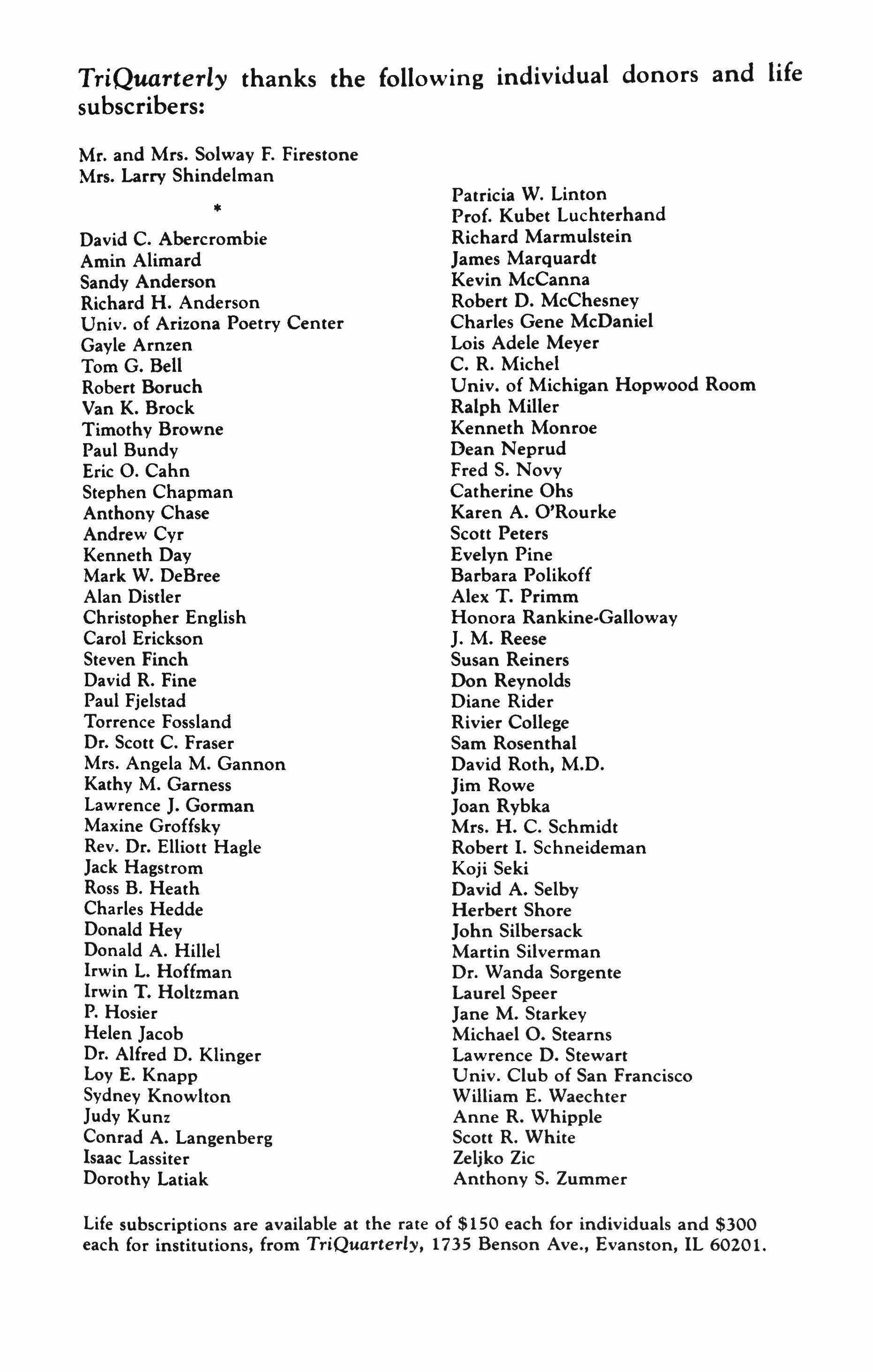
Patricia W. Linton
Prof. Kubet Luchterhand
Richard Marmulstein
James Marquardt
Kevin McCanna
Robert D. McChesney
Charles Gene McDaniel
Lois Adele Meyer
C. R. Michel
Univ. of Michigan Hopwood Room
Ralph Miller
Kenneth Monroe
Dean Neprud
Fred S. Novy
Catherine Ohs
Karen A. O'Rourke
Scott Peters
Evelyn Pine
Barbara Polikoff
Alex T. Primm
Honora Rankine-Galloway
J. M. Reese
Susan Reiners
Don Reynolds
Diane Rider
Rivier College
Sam Rosenthal
David Roth, M.D.
Jim Rowe
Joan Rybka
Mrs. H. C. Schmidt
Robert 1. Schneideman
Koji Seki
David A. Selby
Herbert Shore
John Silbersack
Martin Silverman
Dr. Wanda Sorgente
Laurel Speer
Jane M. Starkey
Michael O. Stearns
Lawrence D. Stewart
Univ. Club of San Francisco
William E. Waechter
Anne R. Whipple
Scott R. White
Zeljko Zic
Anthony S. Zummer
Life subscriptions are available at the rate of $150 each for individuals and $300 each for institutions, from TriQuarterly, 1735 Benson Ave., Evanston, IL 60201.
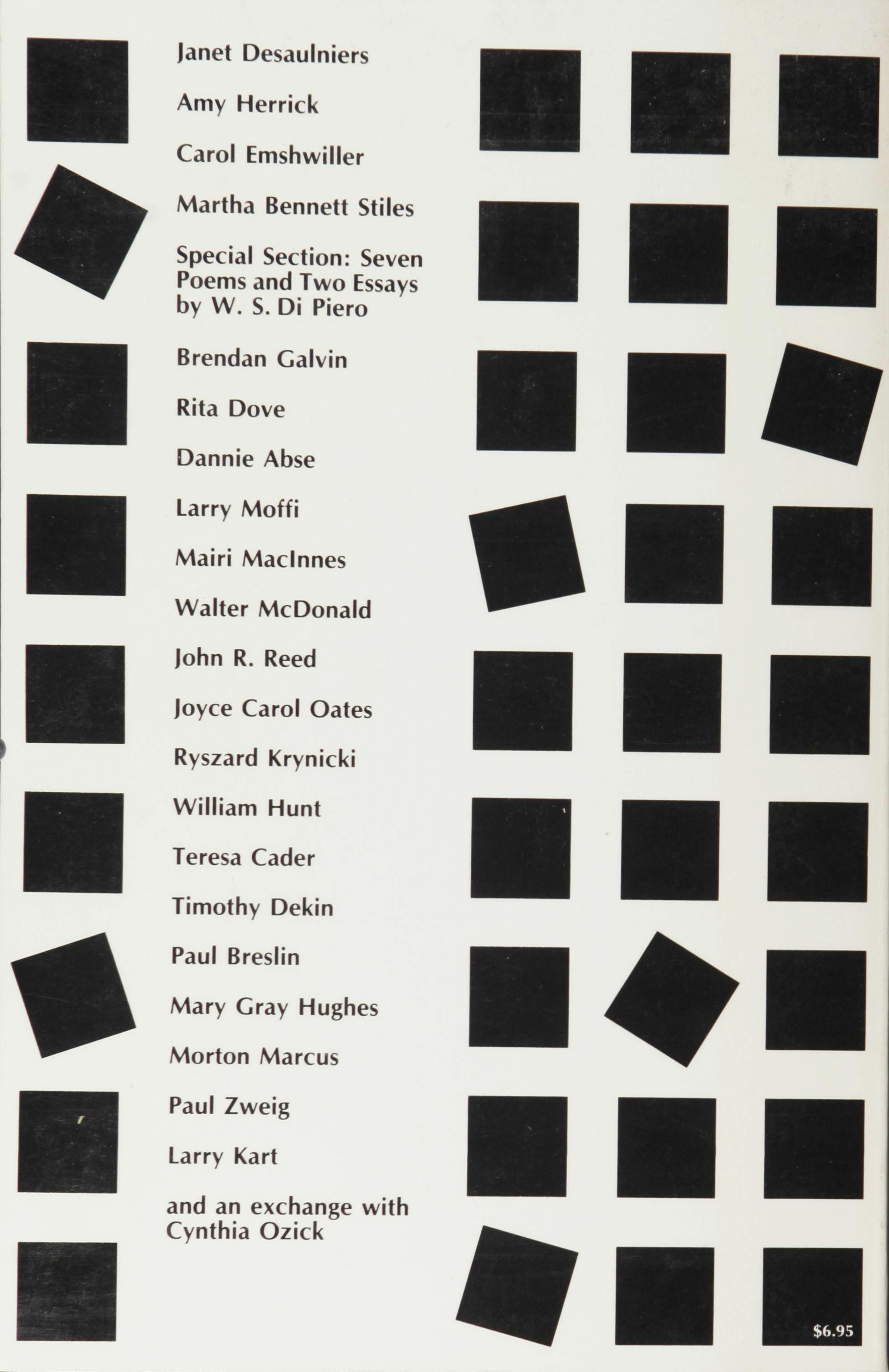
janet Desaulniers
Amy Herrick
Carol Emshwiller
Martha Bennett Stiles
Special Section: Seven Poems and Two Essays by W. S. Di Piero
Brendan Galvin
Rita Dove
Dannie Abse
larry Moffi
Mairi Macinnes
Walter McDonald
john R. Reed
joyce Carol Oates
Ryszard Krynicki
William Hunt
Teresa Cader
Timothy Dekin
Paul Breslin
Mary Gray Hughes
Morton Marcus
Paul Zweig
larry Kart and an exchange with Cynthia Ozick















































































































 for Michael S. Harper
for Michael S. Harper































































































